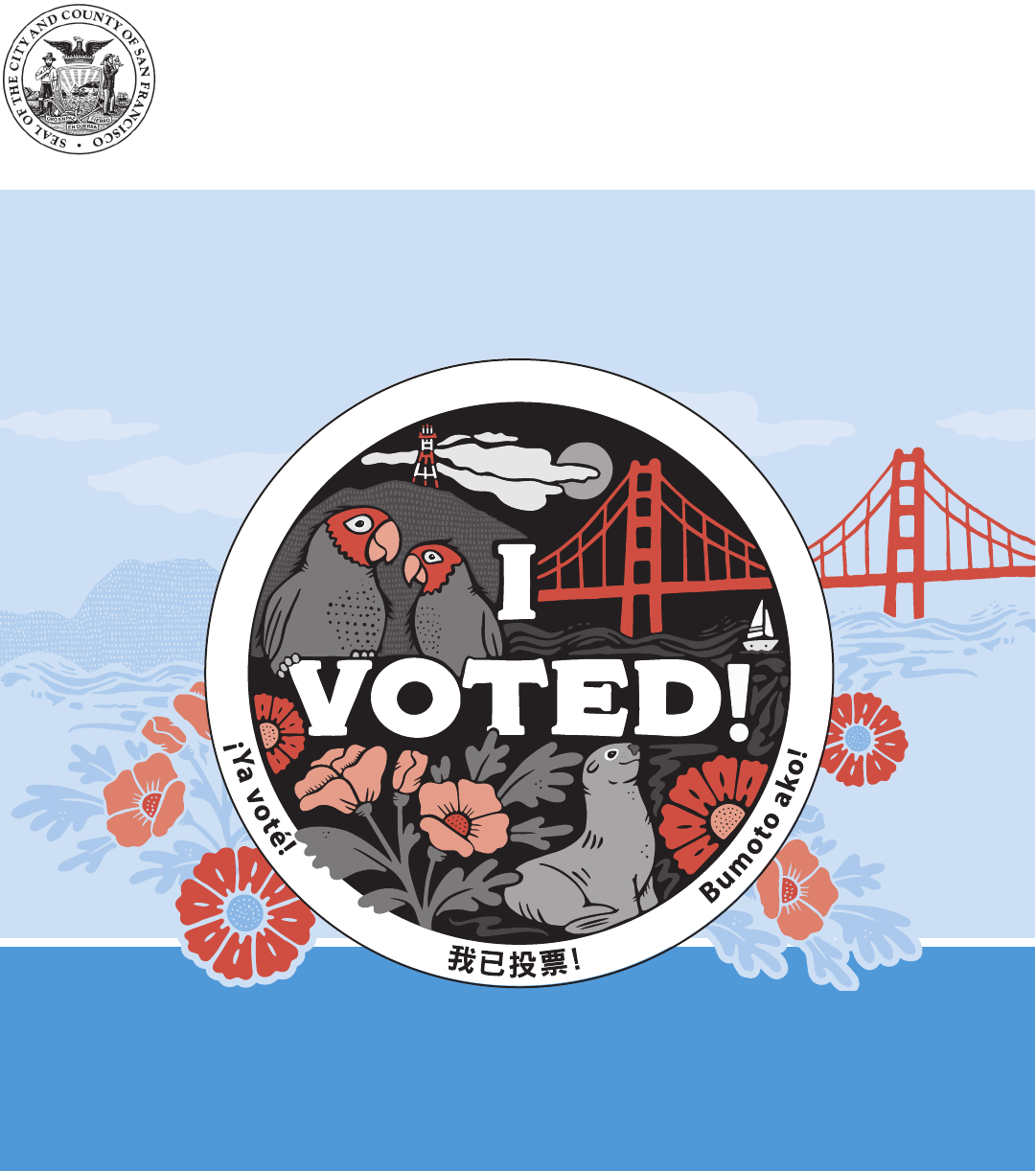
Las boletas ociales, boletas de muestra y otros materiales electorales están disponibles en español.
Para más información, visite la página Asistencia en español.
選務處提供中文版正式選票、選票樣本和其他選舉資料。欲知詳情,請查閱「中文選民服務」。
Makakukuha ng opisyal na mga balota, halimbawang mga balota at iba pang mga materyales para sa
eleksyon sa Filipino. Para sa impormasyon, tingnan ang pahinang Tulong sa Filipino.
Your vote goes a long way!
Cast your ballot by election day.
City and County of San Francisco
Department of Elections
Voter Information Pamphlet
S
a
n
F
r
a
n
c
i
s
c
o
E
l
e
c
t
i
o
n
s
C
o
n
s
o
l
i
d
a
t
e
d
P
r
e
s
i
d
e
n
t
i
a
l
P
r
i
m
a
r
y
E
l
e
c
t
i
o
n
M
a
r
c
h
5
,
2
0
2
4

• All registered voters receive
ballots by mail.
• To be counted, ballots returned
by mail must be postmarked by
Election Day, March 5. Ballots
returned in person must be hand-
delivered by 8 p.m. on Election
Day, March 5.
• Presidential and County Central
Committee contests listed on the
ballots reect the voters’ registered
political party preference.
(See pages 4–6 of this Pamphlet
for information on how to get
a different ballot or follow the
instructions in your ballot packet.)
• Any voter may choose to vote or
receive help at the City Hall Voting
Center or their polling place.
• Any voter may opt to access,
mark, and print an accessible,
screen-readable ballot at
sfelections.org/access.
March 5, 2024 Election
Election Highlights
Cast your ballot to help determine the future of your city, state, and country!
Please remind your friends and family to do the same.
Important Dates
Sign up to Serve as a Poll Worker!
February 5
The voting period begins with ballot mailing and the
opening of the City Hall Voting Center for registration
and voting services. 37 ofcial ballot drop boxes
are open in neighborhoods across San Francisco.
Accessible Vote-by-Mail (AVBM) portal is open at
sfelections.org/access.
February 20
Last day to register to vote or update registration
in time to receive a ballot by mail. After this
date, eligible residents can still register, update
registration, and vote in person at the City Hall
Voting Center or a polling place.
February 24/25 and March 2/3
The City Hall Voting Center is open on the two
weekends before Election Day from 10 a.m. to 4 p.m.
Election Day, March 5
The City Hall Voting Center and 501 neighborhood
polling places are open from 7 a.m. to 8 p.m.
In every election, we hire over 2,000 poll workers –
many bilingual – to administer voting at city’s polling
places on Election Day. You can help your community
and earn up to $295! To apply, go to sfelections.org/pwa
or call (415) 554-4395.
Be a
Poll Worker

Please recycle
this pamphlet.
Candidate Statements of Qualifications
Candidate Information ..................................16
Voluntary Spending Limits...............................16
Party Endorsements ....................................17
Candidates for United States Representative ..............18
Candidates for State Senator ............................23
Candidates for State Assembly ..........................24
Candidates for Judge of the Superior Court, Seat 1 ........26
Candidates for Judge of the Superior Court, Seat 13 .......27
Local Ballot Measures
Words You Need to Know ...............................31
Local Ballot Measure and Argument Information ..........33
An Overview of San Francisco's Debt ....................34
A Affordable Housing Bonds ..........................36
Digest .........................................36
Proponent's, Opponent's, and Rebuttal Arguments ..38
Paid Arguments.................................40
B Police Officer Staffing Levels Conditioned
on Amending Existing or Future Tax Funding..........48
Digest .........................................48
Proponent's, Opponent's, and Rebuttal Arguments ..50
Paid Arguments.................................52
C Real Estate Transfer Tax Exemption and
Office Space Allocation ............................56
Digest .........................................56
Proponent's, Opponent's, and Rebuttal Arguments ..58
Paid Arguments.................................60
D Changes to Local Ethics Laws.......................68
Digest .........................................68
Proponent's, Opponent's, and Rebuttal Arguments ..70
E Police Department Policies and Procedures ..........72
Digest .........................................72
Proponent's, Opponent's, and Rebuttal Arguments ..74
Paid Arguments.................................76
F Illegal Substance Dependence Screening and
Treatment for Recipients of City Public Assistance ....84
Digest .........................................84
Proponent's, Opponent's, and Rebuttal Arguments ..86
Paid Arguments.................................88
G Offering Algebra 1 to Eighth Graders .................92
Digest .........................................92
Proponent's Argument...........................93
Paid Arguments.................................94
Legal Text of Local Ballot Measures.....................100
Ballot Worksheet . . . . . . . . . . . . . . . . . . . . . . . . . . . . . . . . . . . . 127
General Information
Election Highlights and Dates ........... (inside front cover)
Letter from the Director..................................2
Official Local and State Voter Guides ......................3
Ballot Simplification Committee...........................3
Elections Commission ...................................3
California Presidential Primaries ..........................4
Your March 5 Election Ballot .......................... 5–6
How to Request a Replacement Ballot.................. 5–6
Marking Your Ballot .................................. 5–6
Voter Bill of Rights ......................................7
Your Voter Record ......................................7
Ways to Vote by Mail ....................................8
Ways to Vote in Person ..................................9
San Francisco's Voting System ...........................9
Official Ballot Drop Boxes in San Francisco ...............10
Accessible Voting Resources............................12
Multilingual Voter Services..............................14
中文選民服務.........................................14
Asistencia en español para los electores .................14
Tulong para sa botante sa wikang Filipino.................14
မန္မာဘာသာျဖင့္ မ
ဲ
ေပးသူအတြက္ အကူအည............14
日本語による投票支援 ................................14
유권자를 위한 한국어 지원 .............................15
ความช
่
วยเหลือเป็นภาษาไทยแก่ผู้ลงคะแนนเสียง ............15
Dịch vụ/tài liệu hỗ trợ cử tri bằng tiếng Việt ................15
Frequently Asked Questions (FAQs) about Registration
and Voting in San Francisco .............................28
Registration FAQs ......................................28
Vote-by-Mail Ballot Delivery FAQs .......................29
Vote-by-Mail Ballot Return FAQs.........................29
In-Person Voting FAQs..................................30
Information About Prohibited Election Activities ..........122
Index . . . . . . . . . . . . . . . . . . . . . . . . . . . . . . . . . . . . . . . . . . . . . . . .126
Be a Poll Worker....................... (inside front cover)
Contact the Department of Elections ..... (inside front cover)
Website of the Department of Elections.........(back cover)
Address of Your Polling Place .................(back cover)
Table of Contents
San Francisco Voter Information Pamphlet
Published by the Department of Elections
City and County of San Francisco
1 Dr. Carlton B. Goodlett Place
City Hall, Room 48
San Francisco, CA 94102-4634
sfelections.org
Translations and layout/typesetting by InterEthnica
Printing by Toppan Merrill LLC
Voter Information Pamphlet – Consolidated Presidential Primary Election – March 5, 2024

2
General Information
38-EN-M24-CP2
sfelections.org
1 Dr. Carlton B. Goodlett Place
City Hall, Room 48, San Francisco, CA 94102
John Arntz, Director
Dear San Francisco Voter, January 10, 2024
A trusted source of information for all San Francisco voters regarding the March 5, 2024, Presidential Primary Election is this Voter
Information Pamphlet (VIP). Reviewing the VIP allows voters to determine whether their ballots will include candidates for president
and the options available to obtain ballots that list presidential candidates. The VIP also provides useful guidance for considering how
to vote on the local ballot measures.
Information on Voting for Candidates for President
Your voter registration record determines whether your ballot will include candidates for president. If your registration record includes
a preference for a qualied political party, your ballot will list that party’s candidates for president. If you declined to state a preference
for a political party, your ballot will not show candidates for president.
Voters can update their registration record online at registertovote.ca.gov or with a paper form to select a preference for a political
party and receive a ballot with that party’s candidates for president.
Voters with no party preference have additional options to receive ballots listing candidates for president for either the American
Independent, Democratic, or Libertarian parties. Voters need to request what is often called a “cross-over ballot” from the Department.
The VIP includes details on voters’ options to receive a cross-over ballot, as does the Department’s website at sfelections.org/primary.
Regardless of your party preference, your ballot will list contests for U.S. Senator, U.S. Representative, State Senator, State Assembly
Member, Judges of the Superior Court, and state and local measures.
Information on Local Measures
Digests, or short summaries, of each local ballot appear in sections specic to each measure. The digests are reviewed and approved
by a group named the Ballot Simplication Committee. The Committee is a panel of volunteers with professional writing or teaching
experience who must use language that is clearly stated and impartial.
Each VIP also includes the legislative or legal text associated with each local measure. This means voters can read for themselves
how the measures would change local laws if the measures receive the necessary number of votes.
The VIP also includes “arguments” authored by other San Francisco voters and organizations. Each measure allows for one ofcial
supporting argument and one ofcial opposing argument, with accompanying rebuttal arguments. The VIP also includes “paid
arguments” which any San Francisco voter can submit for publication for and against local measures when paying specied fees.
Information on Candidates
You can review candidate qualication statements printed in the VIP that most federal, state, and judicial candidates submitted directly
to the Department. However, the VIP does not provide qualication statements from candidates for county central committees. Seats
on the committees are not considered elective ofces and instead determine the leadership of political parties on a local level.
Information on Voting
The Department’s website provides voters with reliable information on voting. To learn more about voting in this upcoming primary
election, visit sfelections.org/primary. Our website also provides a tool called the “Voter Portal” that guides voters with an easy way
to check their party preference, the status of your vote-by-mail ballot, the location of your polling place and ballot drop-off boxes, and
much more election information can be found at sfelections.org/voterportal.
You can also email us at [email protected], or call us at (415) 554-4375. If you write or call, someone from the Department will be
personally attentive to your questions and concerns. Our personnel are ready to answer your questions and provide election-related
information in English, Chinese, Spanish, and Filipino, as well as in hundreds of other languages via a telephone translation service.
Everyone in the Department is looking forward to providing you with the support and information you need to successfully participate in
the upcoming March 5, 2024, Presidential Primary Election!
Respectfully,
John Arntz, Director
English (415) 554-4375
Fax (415) 554-7344
TTY (415) 554-4386
中文 (415) 554-4367
Español (415) 554-4366
Filipino (415) 554-4310
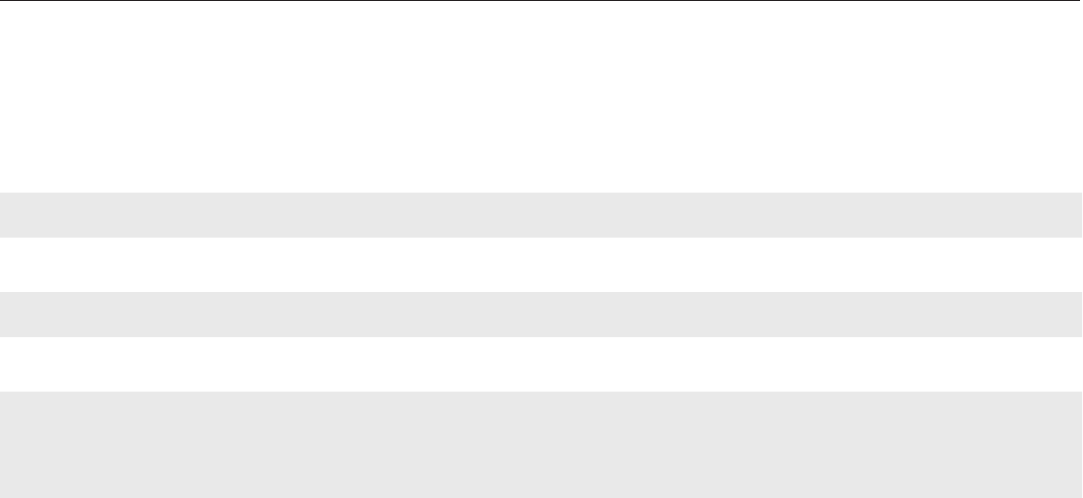
3
General Information
38-EN-M24-CP3
The Ballot Simplification Committee
Local voters created this Committee in 1997. The Committee holds public meetings before every election. In these
meetings, its volunteer members write summaries of local ballot measures. These summaries are then printed
in the Voter Information Pamphlet. They also write the Words You Need to Know and the Frequently Asked
Questions for the Voter Information Pamphlet. Current members of this Committee include:
Betty Packard, Chair
Nominated by the National Academy of
Television Arts and Sciences
Ruth Grace Wong
Nominated by the League of Women Voters
Christine Unruh
Nominated by the National Academy of
Television Arts and Sciences
Michele Anderson
Nominated by Pacic Media Workers Guild
Ana Flores, ex ofcio*
Deputy City Attorney
Jaime Huling Delaye, ex ofcio*
Deputy City Attorney
Bradley Russi, ex ofcio*
Deputy City Attorney
*By law, the City Attorney can speak at the Committee meetings but
cannot vote.
The Voter Information Pamphlet The Voter Information Guide
Ocial Local and State Voter Guides
At the start of every voting period, all local voters receive a Voter Information Pamphlet & Sample Ballot.
For statewide elections, voters also receive a Voter Information Guide. Here is how these guides compare:
Publishing Source San Francisco Department of Elections California Secretary of State
Guide Topics
Registration and voting methods,
local contests on the ballot
Registration and voting methods,
statewide contests on the ballot
Sample Ballot Included Not included
Language Options English, Chinese, Spanish, and Filipino
English, Spanish, Chinese, Hindi, Japanese, Khmer,
Korean, Tagalog, Thai, Vietnamese
Format Options
• Regular/large print
• Audio on CD, USB, or National Library Service
cartridge by request
• PDF/HTML/XML/MP3 at sfelections.org/vip
• Regular/large print
• Audio (recording)/PDF/American Sign Language
(video) at voterguide.sos.ca.gov
Elections Commission
Local voters created this Commission in 2001. The Commission oversees public elections in San Francisco
and sets general policies for the Department of Elections. It also approves and assesses our election plans
for each election. Current members of this Commission include:
Robin M. Stone, President
Appointed by the District Attorney
Michelle Parker, Vice President
Appointed by the Board of Education
Lucy Bernholz
Appointed by the Treasurer
Cynthia Dai
Appointed by the City Attorney
Renita LiVolsi
Appointed by the Public Defender
Christopher Jerdonek (Hold-over member)
Appointed by the Board of Supervisors
Vacant
Appointed by the Mayor

4
General Information
38-EN-M24-CP4
California Presidential Primaries
There are six qualified political parties in California: the American Independent, Democratic, Green, Libertarian,
Peace and Freedom, and Republican parties. All six parties will hold their presidential primaries on March 5, 2024.
Each political party will allow voters who stated a preference for that party on their registration form to vote in its
presidential primary contest.
The American Independent, Democratic, and Libertarian parties will also allow voters who declined to provide a
political party preference to vote in their presidential primary contests.
Impact of Party Preference on March 5 Election Ballot Contests
If you registered to vote with a preference for a political party, you will automatically receive a ballot with that
party’s presidential primary candidates and County Central Committee candidates, if any. To receive a different
party’s ballot in this election, you must re-register to vote with a new party preference.
If you declined to provide a preference for a political party or you registered with an unqualified political party,
your default ballot will list neither presidential primary candidates nor County Central Committee candidates.
To receive a different ballot this election, you can do either of the following:
• Request a ballot with the presidential candidates of the American Independent, Democratic, or Libertarian parties.
• Re-register with a qualified political party preference to receive a ballot with that party’s presidential primary
candidates and County Central Committee candidates, if any.
Your March 5 ballot, regardless of your party preference, will list the following contests:
• U.S. Senator (full term beginning January 3, 2025,
through January 3, 2031)
• U.S. Senator (remainder of the current term ending
on January 3, 2025)
• U.S. Representative, District 11 or District 15
• State Senator, District 11
• State Assembly Member, District 17 or District 19
• Judge of the Superior Court, Seat 1 and Seat 13
• 1 State Ballot Measure
• 7 Local Ballot Measures
If you are registered with a preference for… then your March 5 ballot will also list:
The Democratic Party
• Democratic Presidential candidates
• Democratic County Central Committee candidates
The Republican Party
• Republican Presidential candidates
• Republican County Central Committee candidates
The American Independent Party* • American Independent Presidential candidates
The Green Party* • Green Presidential candidates
The Libertarian Party* • Libertarian Presidential candidates
The Peace and Freedom Party* • Peace and Freedom Presidential candidates
No Party or an Unqualified Party
• No presidential candidates, unless you request a
ballot with Presidential candidates from American
Independent, Democratic, or Libertarian parties
• No County Central Committee candidates
*March 5 ballots for voters registered with a preference for the American Independent, Green, Libertarian, or Peace and Freedom parties will not
include a county central committee or county council contest. Such contests will not appear on these ballots either because the number of seats
exceeds the number of candidates or because the party has chosen to hold meetings in lieu of using a public ballot.

5
General Information
38-EN-M24-CP5
Your March 5 Election Ballot
(for voters registered with a qualified political party)
Your voter record indicates you registered to vote with a preference for one of the qualified political parties. Your
ballot will list the presidential primary contest and county central committee contest, if any, of the political party
you selected when you registered to vote.
To receive a dierent ballot, you can:
If you want to vote for another party's presidential candidates, you must re-register to vote with a preference for
that party.
February 20, 2024 is the last day to re-register in time to receive a different ballot reflecting your new party
preference by mail. You can re-register online at registertovote.ca.gov or using a paper registration form.
Through Election Day, March 5, you can change your party preference and receive a different ballot at any
in-person voting site.
Need to request a replacement ballot?
If you make a mistake while marking your official ballot, you can request a replacement at sfelections.org/voterportal,
by calling (415) 554-4375, or asking a poll worker or a Voting Center representative.
Steps to marking your ballot
1. Before you mark any contest, review the instructions printed on each ballot card.
2. To ensure your selections will be readable and countable, use a pencil, or a pen with black or blue ink.
3. Fill in the oval to the right of your choice for the contest or measure.
4. If you do not want to vote on a certain contest or measure, leave it blank. Your votes for the other contests and
measures will still count.
5. If you want to vote for a qualified write-in candidate*, write the candidate’s name in the space at the end of the
candidate list and fill in the oval next to the space.
*A qualified write-in candidate is a person who has submitted the required documentation to run for office, but whose name does not appear on the
ballot. A list of qualified write-in candidates will be available at sfelections.org/writein and the City Hall Voting Center starting February 23, 2024 as well
as all polling places on Election Day, March 5, 2024.

6
General Information
38-EN-M24-CP6-NPP
Your March 5 Election Ballot
(for voters registered with no party preference or with a preference
for an unqualified party)
Your voter record indicates you registered to vote either with no party preference or with a preference for an
unqualified political party. Your ballot will not list a presidential contest, unless you take action to receive a
different ballot.
To receive a dierent ballot, you can:
1. Request a ballot with presidential candidates of the American Independent, Democratic, or Libertarian
parties. There are several ways to make this request:
• Log into sfelections.org/voterportal
• Use the form at sfelections.org/ballotrequest
• Use the form on the back cover of this Pamphlet
• Call (415) 554-4375
• Text “START” to (415) 941-5495 followed by your name, date of birth, address, and ballot request
• Access your ballot at sfelections.org/access, or
• Request your ballot at an in-person voting site
2. Register with any qualified political party preference to receive a ballot with that party’s presidential and
County Central Committee candidates, if any.
February 20, 2024 is the last day to re-register in time to receive a ballot reflecting your new party preference by
mail. You can re-register online at registertovote.ca.gov or using a paper registration form.
Through Election Day, March 5, you can change your party preference and receive a different ballot at any
in-person voting site.
Note: If you have already requested a ballot with presidential candidates or re-registered to vote with a
qualified political party preference, you do not need to do anything more. You can track your new ballot at
sfelections.org/voterportal or by calling (415) 554-4375.
Need to request a replacement ballot?
If you make a mistake while marking your official ballot, you can request a replacement at sfelections.org/voterportal,
by calling (415) 554-4375, or asking a poll worker or a Voting Center representative.
Steps to marking your ballot
1. Before you mark any contest, review the instructions printed on each ballot card.
2. To ensure your selections will be readable and countable, use a pencil, or a pen with black or blue ink.
3. Fill in the oval to the right of your choice for the contest or measure.
4. If you do not want to vote on a certain contest or measure, leave it blank. Your votes for the other contests
and measures will still count.
5. If you want to vote for a qualified write-in candidate*, write the candidate’s name in the space at the end of
the candidate list and fill in the oval next to the space.
*A qualified write-in candidate is a person who has submitted the required documentation to run for office, but whose name does not appear on the
ballot. A list of qualified write-in candidates will be available at sfelections.org/writein and the City Hall Voting Center starting February 23, 2024 as
well as all polling places on Election Day, March 5, 2024.

7
General Information
38-EN-M24-CP7
Voter Bill of Rights
You have the following rights:
1. The right to vote if you are a registered voter.
You are eligible to vote if you are:
• a U.S. citizen living in California
• at least 18 years old
• registered where you currently live
• not currently serving a state or federal prison
term for the conviction of a felony, and
• not currently found mentally incompetent to
vote by a court
2. The right to vote if you are a registered voter even
if your name is not on the list.
You will vote using a provisional ballot. Your vote
will be counted if elections officials determine that
you are eligible to vote.
3. The right to vote if you are still in line when the
polls close.
4. The right to cast a secret ballot without anyone
bothering you or telling you how to vote.
5. The right to get a new ballot if you have made
a mistake, if you have not already cast your
ballot. You can:
• Ask an elections official at a polling place for a
new ballot; or
• Exchange your vote-by-mail ballot for a new
one at an elections office, or at your polling
place; or
• Vote using a provisional ballot, if you do not
have your original vote-by-mail ballot.
6. The right to get help casting your ballot from
anyone you choose, except from your employer
or union representative.
7. The right to drop off your completed vote-by-mail
ballot at any polling place in California.
8. The right to get election materials in a language
other than English if enough people in your
voting precinct speak that language.
9. The right to ask questions to elections officials
about election procedures and watch the election
process. If the person you ask cannot answer your
questions, they must send you to the right person
for an answer. If you are disruptive, they can stop
answering you.
10. The right to report any illegal or fraudulent
election activity to an elections official or the
Secretary of State’s office.
• On the web at www.sos.ca.gov
• By phone at (800) 345-VOTE (8683)
Your Voter Record
This February, we will mail a ballot to the address in your voter record. To ensure your address is current,
check it at voterstatus.sos.ca.gov. If necessary, you can update your address at registertovote.ca.gov.
It is illegal for anyone to use voter registration information for prot. But it is legal for people to use it for
certain other purposes. The California Secretary of State makes these rules. If you have questions about
this topic, call 800-345-8683.
Voters in dangerous situations may qualify for the Safe at Home program. This program is run by the
Secretary of State. Under this program, voters can use a condential address to receive elections mail.
For details, call 877-322-5227 or visit sos.ca.gov/registries/safe-home.
If you believe you have been denied any of these
rights, call the Secretary of State’s confidential
toll-free Voter Hotline at (800) 345-VOTE (8683).
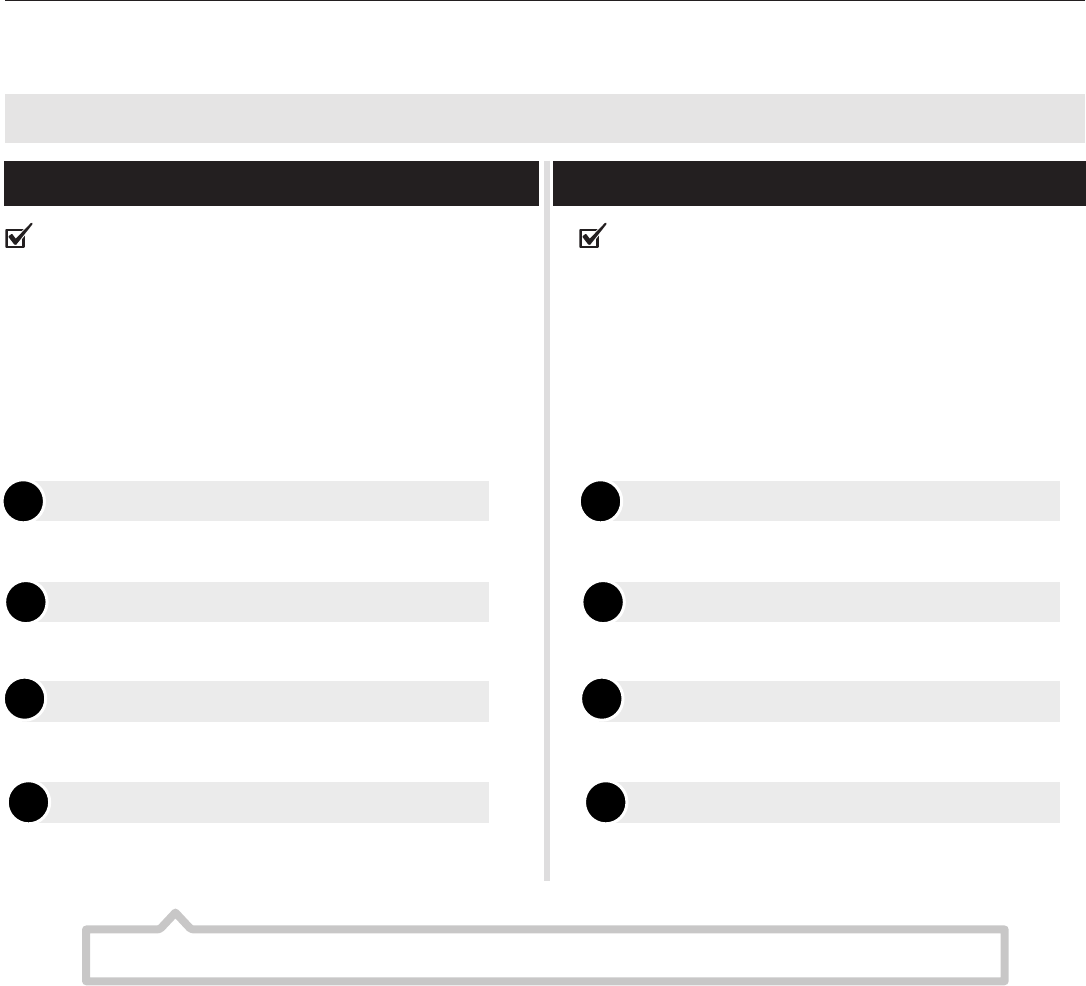
8
General Information
38-EN-M24-CP8
Ways to Vote
There are two ways to vote by mail:
Here are important things to keep in mind:
• If you return your ballot by mail on Election Day, you
must make sure the last pickup time on the mailbox
is before the close of polls at 8 p.m.
• If you return your ballot to a polling place, the City
Hall Voting Center, or a ballot drop off box on Election
Day, you must do so by the close of polls at 8 p.m.
• You can find a list of the city’s polling places at
sfelections.org/myvotinglocation.
• You can find a map of local ballot drop off boxes at
sfelections.org/ballotdropoff or on page 10 of this
pamphlet.
• You can track your ballot along its journey to you
and back to the Department of Elections. Go to
sfelections.org/voterportal to see where it is and
whether we have counted it. Or sign up for tracking
notifications at wheresmyballot.sos.ca.gov.
• You can request a replacement mail ballot. If you do
not receive, lose, damage, or mismark your original
ballot, you can request a replacement. Call us at
(415) 554-4375 or go to sfelections.org/voterportal
by 7 days before Election Day to make your request.
You can also choose to vote in person. (If, after we
mail your ballot, you update your home or mailing
address or your party or language preference, we will
automatically mail you a replacement.)
We can only count your ballot if you return it by Election Day, March 5, 2024!
1
2
3
4
Use the ballot we mail you.
About a month before Election Day, the Department
of Elections will mail ballot packets to all local
voters. Each packet will include an official ballot, a
postage-paid return envelope, voting instructions
and an “I Voted”sticker. You can mark and return
your ballot by mail or in person. To return your
ballot, follow these four steps:
Go to sfelections.org/access to download
an accessible ballot.
29 days before Election Day, we will open the
Accessible Vote-By-Mail portal. Here, you can use
a screen-reader, head-pointer, sip and puff, or a
similar tool to mark your ballot. For security, you
cannot return your ballot online. You must print
it out and return it by mail or in person. To return
your ballot, follow these four steps:
(there are two ways to vote by mail)
Mail ballot Accessible ballot
Mark your ballot
Enclose your ballot
Prepare your envelope
Return your ballot
Complete and sign the voter section
of the return envelope, then seal it.
Drop your envelope into a mailbox or bring
it to a voting site or ballot drop off box.
Make selections after reading
all online instructions.
Follow prompts to print your ballot
and place it into a return envelope.
Mark your ballot
Enclose your ballot
Prepare your envelope
Return your ballot
Complete and sign the voter section
of the return envelope, then seal it.
Drop your envelope into a mailbox or bring
it to a voting site or ballot drop off box.
Make selections after reading
instructions on each ballot card.
Remove receipts, fold each card, and
place them into a return envelope.
1
2
3
4

9
General Information
38-EN-M24-CP9
There are two ways to vote in person:
Starting February 5, any local voter can cast their
ballot at the City Hall Voting Center. The Voting Center
will be open 8 a.m. to 5 p.m. every weekday between
February 5 and March 4 (except February 19 holiday).
The Voting Center will also be open 10 a.m. to 4 p.m.
on the weekends of February 24–25 and March 2–3.
On Election Day, March 5, the Voting Center will be
open 7 a.m. to 8 p.m.
On Election Day, 501 polling places will be open
between 7 a.m. and 8 p.m. It is important to vote at
your assigned polling place.
Your name will only be on the roster of voters at
your assigned polling place. If you go to another
polling place instead, your name will not be on
the roster. You can still vote a provisional ballot
there, but it may not list all the contests as the
ballot at your assigned polling place.
Find your assigned polling place on the back cover of
this pamphlet or at sfelections.org/myvotinglocation.
San Francisco’s Voting System
Here are some facts about the voting system:
Voters mark their ballots by filling in ovals next to their selections.
All voting sites have machines that scan ballots. Ballot-marking devices with
touchscreen and audio ballots are also available.
The Department of Elections tests all voting equipment before each election.
This ensures that the equipment works correctly and produces accurate results.
Anyone can observe this testing.
The voting system is not connected to the internet or any other
computer network.
Vote at the City Hall Voting Center Vote at your assigned polling place

10
General Information
38-EN-M24-CP10
7
2
4
1
10
8
9
6
3
5
11
6
1
18
8
9
10
13
12
14
15
16
17
19
20
22
21
23
24
26
27
29
28
30
31
32
33
34
35
37
25
36
2
3
4
5
7
6
11
Beginning February 5, you can drop off your ballot at any of the City’s 37 ofcial drop boxes.
Every drop box shows the City seal and the American ag, is accessible and outdoors, and is
open 24/7 until 8 p.m. on Election Day, March 5.
Ocial Ballot Drop Boxes in San Francisco
Ballot Drop Box
Supervisorial District Boundaries

11
General Information
38-EN-M24-CP11
Supervisorial
District
Ballot
Drop Box
Location Address
1
1 Cabrillo Playground 853 38th Ave
2 Richmond/Senator Milton Marks Branch Library 351 9th Ave
2
3 Golden Gate Valley Branch Library 1801 Green St
4 Presidio Branch Library 3150 Sacramento St
3
5 City College of San Francisco - Chinatown Center 808 Kearny St
6 Huntington Park
California St and Taylor St
7 North Beach Branch Library 850 Columbus Ave
4
8 Ortega Branch Library 3223 Ortega St
9 Parkside Branch Library 1200 Taraval St
5
10 City Hall
1 Dr Carlton B Goodlett Pl
11 Father Alfred E. Boeddeker Park 246 Eddy St
12 Park Branch Library 1833 Page St
13 UC Law San Francisco 200 McAllister St
14 Western Addition Branch Library 1550 Scott St
6
15 City College of San Francisco - Downtown Center 88 4th St
16 Mission Bay Branch Library 960 4th St
17 Ship Shape Community Center 850 Avenue I
7
18 Forest Hill Station (Muni Metro) 380 Laguna Honda Blvd
19 Ingleside Branch Library 1298 Ocean Ave
20 Merced Branch Library 155 Winston Dr
21 Sunset Branch Library 1305 18th Ave
22 San Francisco State - Mashouf Wellness Center 755 Font Blvd
23 UCSF Medical Center - Millberry Union Plaza 500 Parnassus Ave
8
24 Eureka Valley Recreation Center 100 Collingwood St
25 Glen Park BART Station 2901 Diamond St
26 Harvey Milk Recreation Center 50 Scott St
27 Noe Valley/Sally Brunn Branch Library 451 Jersey St
9
28 Bernal Heights Branch Library 500 Cortland Ave
29 City College of San Francisco - Mission Center 1125 Valencia St
30
Portola Branch Library
380 Bacon St
10
31 Bayview/Linda Brooks-Burton Branch Library 5075 3rd St
32 Jackson Playground Rec Center Mariposa St and Arkansas St
33 Zuckerberg San Francisco General Hospital and Trauma Center 1001 Potrero Ave
34 Visitacion Valley Branch Library 201 Leland Ave
11
35 Crocker Amazon Playground 799 Moscow St
36 Excelsior Branch Library 4400 Mission St
37 Ocean View Branch Library 345 Randolph St

12
General Information
38-EN-M24-CP12
Accessible Voting Resources
We provide many resources to ensure all voters can vote privately
and independently.
Accessible Voter Pamphlet
You can find PDF, HTML, XML, and MP3 formats of this pamphlet
at sfelections.org/vip. You can contact us at (415) 554-4375 to
request a large print, audio flash drive, or compact disc pamphlet.
You can also get a talking book pamphlet and a free audio player
at the Talking Books and Braille Center. It is located on the second
floor of the main library at 100 Larkin Street.
Accessible ballot
Starting February 5 through 8:00 p.m. on Election Day, March 5,
you can download an accessible ballot at sfelections.org/access.
Here, you can use a screen-reader, head-pointer, sip and puff, or a
similar tool to mark your ballot. For security, you cannot return
your ballot online. When you finish voting, you must print your
ballot out and return it by mail or in person.
Accessible voting sites
You can view accessibility facts about your voting site on the
back of this pamphlet.
You can also vote early at the accessible City Hall Voting Center.
It opens on February 5.
You can move around any voting site in a wheelchair. You can
request a page magnifier, an easy-grip pen, a signature guide
with braille instructions, or a chair at any voting site.

13
General Information
38-EN-M24-CP13
Every voting site has a ballot-marking device with touchscreen
and audio ballots. On this device, you can select your ballot
format, font, background color, and language. You can navigate
through contests on your ballot using a braille keypad,
headphones, or other device.
Curbside voting
You can get a ballot delivered outside at any voting site.
Call (415) 554-4375 or ask someone to go inside and request
this service for you.
An elections worker will bring your ballot outside and explain
how to vote. When you finish voting, an elections worker will
come and collect your ballot. Your ballot will remain in its secrecy
folder until being cast.
Help with ballot marking
You can ask an elections worker for help marking your ballot. You
can also bring one or two people to help you mark your ballot.
Your helper cannot be your employer or a union representative.
Helpers cannot make voting decisions for you.
Ballot delivery and pickup
If you are unable to leave your house or are in the hospital during
the last week of the voting period, you can request a ballot
delivery or pickup. Contact us at (415) 554-4375 to request this
service.
Voting Accessibility Advisory Committee
Our Voting Accessibility Advisory Committee works to improve
access to voting in San Francisco. Call us at (415) 554-4375 to join
this committee.

14
General Information
38-EN-M24-CP14
We provide ballots, voting materials, and in-person assistance in Chinese, Spanish, and Filipino, in addition to English. Upon request,
we can also provide interpreting services in many other languages.
At all voting locations, we offer facsimile (reference) ballots in Burmese, Japanese, Korean, Thai, and Vietnamese.
Any voter can request ofcial elections materials in any language at: sfelections.org/language or by calling (415) 554-4375.
See the list of all San Francisco polling places, along with the types of language resources available at:
sfelections.org/voteatyourpollingplace.
我們可以協助您!
如果您想收到中文版的選舉資料,請在選務處網站sfelections.org/language更新您的語言偏好或致電(415) 554-4367。
¡Le podemos ayudar!
Si desea recibir los materiales electorales en español además de en inglés, actualice su preferencia de idioma en
sfelections.org/language o llame al (415) 554-4366.
Matutulungan namin kayo!
Kung gusto ninyo ng mga materyales sa wikang Filipino, bukod sa Ingles, i-update ang inyong kagustuhan sa wika sa
sfelections.org/language o tumawag sa (415) 554-4310.
ကၽြႏ္ုပ္တိ သင့္ကုိ ကူညီႏိုင္ပါသည္။
(
) Department of Elections
()
-
sfelections.org/myvotinglocation
က်sfelections.org/language
(415) 554-4375
- sfelections.org/voteatyourpollingplace
(
)၎င်း
お手伝いいたします
。
選挙管理事務所では、投票用紙のサンプル(参照用)の日本語版を提供しております。投票用紙のサンプルとは、日本語
に翻訳された公式投票用紙の完全な複製版です。
あなたが投票権を持つ選挙の投票用紙のサンプルを見るには、sfelections.org/myvotinglocationにアクセスしてください。
投票用紙のサンプルを郵便で受け取りたい場合、sfelections.org/language にアクセスするか、または(415) 554-4375に電
話して 請 求してくだ さい 。
Multilingual Voter Services

15
General Information
38-EN-M24-CP15
一部の投票所では、投票用紙のサンプルが日本語で用意されています。サンフランシスコ市内の投票所の一覧と、言語の
リソースを 見るに は 、sfelections.org/voteatyourpollingplace にアクセスしてください。
投 票 所は 選 挙当日の 午前 7 時 から午 後8 時まで開 いています。
有権者は、投票用紙のマークシートに記入するために最大2人の介助者を付けることができます(有権者の雇用主、有権
者の雇用主の代理人、または有権者が所属する組合の役員や代理人を除く)。また、有権者は投票所の係員に当該の支
援を求 めることもできます。
sfelections.org/myvotinglocation
sfelections.org/language
sfelections.org/voteatyourpollingplace
เราช
่
วยค
ุ
ณได้ !
Department of Elections
sfelections.org/myvotinglocation
sfelections.org/language(415) 554-4375
sfelections.org/voteatyourpollingplace
Chúng tôi có thể trợ giúp quý vị!
Cơ quan Bầu cử có thể cung cấp các lá phiếu mẫu (lá phiếu tham chiếu) bằng tiếng Việt. Lá phiếu mẫu là những bản sao y của lá phiếu chính
thức mà được dịch qua tiếng Việt.
Để xem một lá phiếu mẫu có các mục bầu cử mà quý vị có quyền bỏ phiếu, vui lòng truy cập trang mạng: sfelections.org/myvotinglocation.
Để yêu cầu nhận được lá phiếu mẫu qua thư, vui lòng truy cập trang mạng sfelections.org/language hoặc gọi số (415) 554-4375.
Tại một số địa điểm bỏ phiếu, Cơ quan có sẵn các mẫu lá phiếu bằng tiếng Việt. Để xem danh sách liệt kê tất cả các địa điểm bỏ phiếu ở
San Francisco cùng với các dịch vụ hỗ trợ ngôn ngữ tại từng địa điểm, xin truy cập: sfelections.org/voteatyourpollingplace
Các phòng phiếu mở cửa từ 7 giờ sáng đến 8 giờ tối vào Ngày bầu cử.
Mỗi cử tri đều có quyền yêu cầu tối đa hai người đi cùng để trợ giúp trong việc điền vào lá phiếu (người đi cùng không thể là chủ thuê lao
động, đại diện của chủ thuê lao động hoặc viên chức hay đại diện của công đoàn mà cử tri là thành viên). Cử tri cũng có thể yêu cầu nhân
viên phòng phiếu trợ giúp điền lá phiếu.

16
General Information
38-EN-M24-CP16
Candidate Information
Candidate Party Preferences
The registered political party preference, or lack thereof, of any candidate running for a voter-nominated office will
be printed beside each candidate’s name on the ballot. If a candidate is running for a non-partisan office, no party
will appear next to the candidate’s name.
Candidate Statements of Qualifications
Some candidates on the ballot have timely submitted statements of qualifications for publication in this pamphlet.
Such statements have been printed at the candidates’ expense.
Neither the Director of Elections, nor any other City agency, official, or employee, verifies the accuracy of the
information contained in any of the candidate qualification statements appearing in this pamphlet.
Candidate information can be found as follows:
California Voter Information Guide
(available at voterguide.sos.ca.gov)
Candidates running for the following offices:
United States Senator
(regular 6-year term ending January 3, 2031)
United States Senator
(remainder of the current term ending
January 3, 2025)
San Francisco Voter Information Pamphlet
Candidates running for the following offices:
United States Representative
District 11 and District 15
State Senator
District 11
State Assembly
District 17 and District 19
Judge of the Superior Court
Seat 1 and Seat 13
Voluntary Spending Limits
California Government Code (CAGC) §85600 requires the Department of Elections to publish the names of
candidates who have voluntarily agreed to abide by the spending limits set forth in CAGC §85400. In this election,
these candidates include:
State Senator, District 11
Yvette Corkrean
Scott Wiener
Jing Chao Xiong
State Assembly, District 17
Otto Duke
Matt Haney
Manuel Noris-Barrera
State Assembly, District 19
Nadia Flamenco
David E. Lee
Arjun Gustav Sodhani
Catherine Stefani

17
General Information
38-EN-M24-CP17
By law, we must send the Voter Information Pamphlet to all
local voters, except those who chose to access it online. This
choice allows us to save both trees and city funds! To opt out
from receiving your Voter Pamphlets, point your camera to the
QR code on the right, log in to sfelections.org/voterportal or
call (415) 554-4375. You can opt out of the state Voter Guide
at voterstatus.sos.ca.gov. You can opt back in at any time.
Go paperless! Go green!
Access your Voter Pamphlet on your screen.
scan
me
Party Endorsements of Candidates
State law allows political parties to endorse candidates for statewide offices. In this election, timely submitted
endorsements are as follows:
United States Senator
American Independent Party: James Bradley
Libertarian Party: Gail Lightfoot
United States Representative, District 11
Democratic Party: Nancy Pelosi
Republican Party: Bruce Lou
American Independent Party: Bruce Lou
United States Representative, District 15
Democratic Party: Kevin Mullin
Republican Party: Anna Cheng Kramer
American Independent Party: Anna Cheng Kramer
State Senator, District 11
Democratic Party: Scott Wiener
Republican Party: Yvette Corkrean
American Independent Party: Yvette Corkrean
State Assembly, District 17
Democratic Party: Matt Haney
Republican Party: Manuel Noris-Barrera
American Independent Party: Manuel Noris-Barrera
State Assembly, District 19
Democratic Party: Catherine Stefani
American Independent Party: Nadia Flamenco

18
Candidate Statements
Statements are volunteered by the candidates and have not been checked for accuracy by any official agency.
Statements are printed as submitted. Spelling and grammatical errors have not been corrected.
38-EN-M24-CP18
My occupation is Software Engineer.
My qualifications are: San Francisco, it’s time for a
change! The world around is on fire, and the people
who led us into this mess aren’t going to be the people
who lead us out of it.
If you love San Francisco like I do, then you want to
see this beautiful city THRIVE! It pains me to see our
sidewalks covered in tents, while having to avoid feces
and needles at our feet. I want people to feel safe walk-
ing around at night, attending new events like Night
Market, to help this city get out of its post-pandemic
slump. I want to see clean sidewalks so people can
enjoy themselves eating at tables outdoors, and
not worry about their cars being broken into while
they’re away.
As your representative, my goal will be to partner the
federal government with city and state governments
to clean up our streets. San Francisco’s homeless crisis
isn’t just a city crisis, it’s a national crisis spreading
across every city and state in our nation, and it’s time
we treated it with the attention it deserves. I want to
build a program that works with people, respectfully
and with dignity, to help people get back on their feet,
back to work where they can find jobs, and be self-
dependent in the future.
As Abraham Lincoln said, “The legitimate object of
government, is to do for a community of people,
whatever they need to have done, but can not do, at
all, or can not, so well do, for themselves—in their
separate, and individual capacities.” It’s time we make
our government work for us.
Thank you, and Go Giants!
Jason Boyce
My occupation is Business Owner.
My qualifications are: My name is Bruce Lou and I am
the officially endorsed San Francisco Republican Party
and California Republican Party candidate running to
represent San Francisco in Congress. I am a Bay Area
native, a UC Berkeley graduate, a business owner, and
a Jeopardy! champion.
I am young and represent the generation who will one
day inherit this country. As a political newcomer, I am
a fresh voice as opposed to Washington insiders who
only have their own interests in mind.
San Francisco represents the promise of opportu-
nity and of a new life that has attracted people for
hundreds of years, from the Forty-Niners to immi-
grants like my parents who came for a more free and
prosperous future. I still believe in the promise of
San Francisco, but it can be hard to fulfill when issues
like crime, homelessness, and surging inflation make
life seem bleak for the people of this city.
I appreciate the unique place that San Francisco has in
the world and understand the grave peril that America
is in right now. Our cherished freedoms are under
threat and we face the looming threat of global war.
I will find common-sense solutions that put people
above politics.
I will:
- direct federal funds to ensure public safety
- prevent intrusions upon our fundamental
constitutional rights
- ensure fairness for all in admissions and
under the law
- promote peace without getting entangled in
foreign conflicts
Thank you, and remember to vote Bruce Lou for a
brighter future.
For more information: www.bruceforcongress.org
Bruce Lou
Jason Boyce Bruce Lou
United States Representative, District 11

19
Candidate Statements
Statements are volunteered by the candidates and have not been checked for accuracy by any official agency.
Statements are printed as submitted. Spelling and grammatical errors have not been corrected.
38-EN-M24-CP19
My occupation is Attorney / Peace Advocate.
My qualifications are: Juris Doctor Degree from UCLA
School of Law, excelling in Constitutional Law, and
decades of fierce legal battles, I’m a grandmother dedi-
cated to Peace and saving humanity and sustaining
Life on Planet Earth for future generations.
We must STOP USA Weapons of Death and Endless
Wars!
Marjorie Mikels will:
1. Prioritize universal human security and environ-
mental preservation over corporate capital growth
supported by military might, benefiting the few at
the expense of the vast majority of humankind.
2. Support treaties for Non-proliferation and
Prohibition of Nuclear Weapons.
3. Slash the military budget, devoting money saved for
the needs of people.
We got broken promises of Medicare for all, $15 mini-
mum wage, reproductive rights, student debt relief,
and ending scourge of homelessness. Instead, over
half the budget goes to the war machine.
Innocent civilians, women and children, are slaugh-
tered in the name of “Self-Defense”, while Congress
votes billions more weapons for GENOCIDE. Those
who oppose massacres done in our name, with our
tax dollars, are stigmatized. No diplomatic resolution
is sought in Ukraine. Ever increasing pivot to War with
China. War is not green! US military is Earth’s biggest
polluter and user of fossil fuels. The world moves
closer to nuclear annihilation.
To keep the “peace” (when the gulf between the rich
and the rest of us is greater than ever in history) civil
society is increasingly surveilled, and subjected to
massive police escalation, as the war is brought home.
VOTE MARJORIE MIKELS FOR PEACE, JUSTICE AND
SECURITY FOR ALL!
Marjorie Mikels
My occupation is Retired Educator.
My qualifications are: 12 years as Paraprofessional
in SFUSD
I’m running for Congress to improve the economic
conditions of every American, stop climate change and
reduce wars. We need Medicare for All, secure retire-
ment, subsidized childcare, end to debt slavery and
make joining unions easy.
Medicare for All may raise taxes some, but no one will
have premiums or copays. If you need medical care,
you get it free. Overall costs will go down because we
eliminate insurance middlemen. No one will be denied
services or left with massive medical debt.
A secure retirement means expanding Social Security
to give everyone a livable payment. Social Security will
not run out of money if we scrap the cap so rich people
pay their fair share.
Subsidized childcare helps parents work & insures
have enough to eat as their brain & body grows.
End of debt slavery means forgiving student debts
because we want young people to have a good start in
life. Forgiving medical debt will help many to save the
homes they have.
Making it easy to join unions means less exploitation
of workers, better benefits and livible wages.
Larry Nichelson
Marjorie Mikels Larry Nichelson
United States Representative, District 11

20
Candidate Statements
Statements are volunteered by the candidates and have not been checked for accuracy by any official agency.
Statements are printed as submitted. Spelling and grammatical errors have not been corrected.
38-EN-M24-CP20
My occupation is Member of Congress.
My qualifications are: Dear Friends,
It is my honor to be your voice in Congress and repre-
sent our San Francisco values that uplift the dignity
and worth of every person. As your Representative,
I promised to help rebuild from the COVID recession
from the bottom up and the middle-class out – with
good paying union jobs, and dignity for workers —
and my office’s efforts delivered thousands of jobs and
billions in resources to our community.
We must protect our progress and do more to improve
people’s lives: extend the Biden Child Tax Credit that
cut child poverty nearly by half, invest in public educa-
tion, childcare, universal pre-K, paid leave, home
health care, and more union jobs. We must codify Roe
v Wade, pass the Equality Act and restore the Assault
Weapons Ban.
Unfortunately, extremists are working to attack our
reproductive freedoms, scapegoat immigrants and
LGTBQ Americans, repeal lower drug prices, roll
back climate action, slash Social Security, Medicare
and Medicaid, cut veterans earned benefits, repeal
the Affordable Care Act, and give obscene tax cuts
to the rich.
American Democracy itself is on the line in 2024.
As we protect our progress, we must restore voting
rights and defend our Constitution. We need strong
Democracy at home and support for diplomacy and
allies abroad to constantly show the world that our flag
is still there, with liberty and justice for all.
These are the fights we face — and why I am running
for re-election to Congress. I respectfully seek your
vote. Thank you. NANCY
Nancy Pelosi
My occupation is Actress & Media Personality.
My qualifications are: Aka BiancaForSanFrancisco.org.
You’ve all seen the iconic silhouette of this move-
ment around town. This ICON represents the faceless
masses yearning to be seen, their voices needing to
be heard. This campaign is bigger than one person; it’s
about all of us.
My family’s roots go back nearly 200 years in Northern
California to the Gold Rush. Before that the American
Revolution as a direct descendant of Augustine and
Martha Ball Washington
Prior to be being the girl you loved to hate on your
favorite TV programs, I studied computer science
and economics at Stanford and systems engineer-
ing at MIT.
Platform:
• Green New Deal (modified for the Fusion age)
• Medicare For All
• Universal Basic Income
Distinctions:
• The ONLY Democrat to sign the pledge for
term limits.
• The ONLY candidate to modify our Green New Deal
for the integration of fusion energy.
• linktr.ee/Bianca4SF for proper CV (LinkedIN)
Covenant with the people of San Francisco:
1. I will accomplish my platform or bring their
detractors to light!
2. I will not allow the agenda to be side-tracked by
political distractions or “comfort politics”. We must
eat our political vegetables!
Recently the world watched in horror and dismay as an
aging Dianne Feinstein mentally and physically dete-
riorated before our eyes. Sometimes we need to do for
others what they cannot do for themselves - retire.
Now more than ever we need to show the world that
transgender people are not focal points of hate, but
beacons of hope and light.
Xxoxox
Bianca Von Krieg
Nancy Pelosi Bianca Von Krieg
United States Representative, District 11

21
Candidate Statements
Statements are volunteered by the candidates and have not been checked for accuracy by any official agency.
Statements are printed as submitted. Spelling and grammatical errors have not been corrected.
38-EN-M24-CP21
My occupation is Data Engineer.
My qualifications are: It is my honor to represent
San Francisco.
I believe that dreams can be chased, fought for, and
achieved. There is nothing that is impossible. It doesn’t
matter if you arrive in the city with a penny; you can
earn the life you want. I believe in this pursuit of
happiness, the goodness within all people, and my
conviction of faith.
I first ran for office a decade ago, then left the city
shortly afterwards. I began my career by founding a
startup in local news, then led two others in agriculture
analytics and commercial mining. When the pandemic
struck, I was in Montana on an army grant. I dropped
out of the election there and came home that summer,
because I don’t represent the average Montanan.
As a pro-nature and conservative candidate, my first
priority is to provide parents the autonomy to best
educate their children by allowing vouchers at private
schools. Second, police officers require more flexibility
in apprehending drug suppliers which will reduce
fentanyl accessibility. Third, accredited education can
be substituted for certain work requirements. The
purpose of benefits is to help people onto their feet so
they won’t return to welfare.
Government should provide everyone with an equality
of opportunities, but also the freedom of outcomes.
Everyone should excel, if they are willing to earn it.
I humbly ask for your vote to represent San Francisco.
Thank you.
Jason Chuyuan Zeng
Jason Chuyuan Zeng
United States Representative, District 11

22
Candidate Statements
Statements are volunteered by the candidates and have not been checked for accuracy by any official agency.
Statements are printed as submitted. Spelling and grammatical errors have not been corrected.
38-EN-M24-CP22
My occupation is Housing Policy Executive /
Businesswoman.
My qualifications are: I am an immigrant from Taiwan
and became a US citizen because I love the freedom
and liberties of America. The Bay Area Peninsula has
been my home since 1976, living in San Francisco, East
Palo Alto, North Fair Oaks and San Carlos.
My involvement in public service has been local,
acting as the Chairwoman of North Fair Oaks and a
member on the Economic Development Advisory
Commission in San Carlos. After getting an MBA from
the University of Santa Clara, I built my career invest-
ing and managing housing units throughout the West
Coast and nationwide.
As Chief Operating Officer of Mid-Peninsula Housing
Coalition, I gained expertise on how nonprofit, safe
affordable housing was financed, built, and occu-
pied. Given my background, I am uniquely qualified
to address housing issues, public safety, and the
economy. We need real local solutions...not top-down
mandates from the State.
Partisan politics in Washington has brought an extreme
divisiveness that was never intended in our free
society. I will work across the aisle and find bipartisan
solutions for the border crisis and immigration reform.
Federal government expenditures should produce
measurable results, not enrich special interest groups.
A thriving economy is based on a free market system,
not excessive government spending. Congress should
reflect the will of the people and not lobbyists. I will
listen to all my constituents irrespective of political
affiliation with the goal of achieving Safety, Security
and Prosperity for everyone. It will be an honor to
serve as your US Congressional Representative.
Vote Anna Cheng Kramer
www.ackramerforcongress.org
Anna Cheng Kramer
My occupation is U.S. Representative.
My qualifications are: I was honored to be first elected
to the U.S. House of Representatives in 2022 after
representing San Mateo County in the State Assembly
for 10 years and previously as a Mayor/Councilmember
and small business owner in South San Francisco.
During my first year in Congress, my district office staff
has worked to return nearly $2 Million Social Security
and other tax dollars to constituents, resolved nearly
650 passport cases, and responded to over 43,000
letters, emails, and calls from District 15 constituents. I
regularly hold “Coffee with Kevin” and “Conversations
with Kevin” events, so I may hear directly from my
constituents.
I’ve introduced the Weatherization Resilience and
Adaptation Program (WRAP) Act to assist low-income
homeowners and affordable housing providers in
making their properties more resilient to climate
change and authored the Poverty Line Act to modern-
ize the federal poverty formula to include housing,
child care, and health care costs so that we may build
an economy that works for all. I’ve also supported
legislation tackling gun violence and protecting repro-
ductive freedoms and advocated for over $27 million in
federal funding for community projects.
I’m proud to be a leader on the Task Force on
Strengthening Democracy and have pushed for the
passage of H.R.11: the Freedom to Vote Act. I pledge
to work in a bipartisan way to rebuild public trust in
Congress and ensure we have a democracy that deliv-
ers on our biggest challenges.
I respectfully ask for your vote, so I can continue to
fight for the protection of our democracy and our
planet so this and future generations may thrive.
KevinMullinforCongress.com
Kevin Mullin
Anna Cheng Kramer Kevin Mullin
United States Representative, District 15

23
Candidate Statements
Statements are volunteered by the candidates and have not been checked for accuracy by any official agency.
Statements are printed as submitted. Spelling and grammatical errors have not been corrected.
38-EN-M24-CP23
Yvette Corkrean Jing Chao Xiong
State Senator, District 11
My occupation is Registered Nurse.
My qualifications are: Yvette Corkrean, is a single mother
of two teenagers and a registered nurse who has
served her local community for 25 years. As a long-
term resident of San Francisco, she has watched in
dismay as our City has deteriorate over the years.
Yvette’s deep love and concern for her family and
encouragement from her fellow San Francisco
neighbors has inspired Yvette Corkrean to be our next
California State Senator.
“Keeping Us Safe” is the primary goal for Yvette. As
your state senator, Yvette will work to increase pros-
ecution and penalties for violent criminals. We need to
fully fund and support local law enforcement efforts
and cease being a haven for crime. Public Safety must
come first for a civilized society. This policy includes
better support for our first responder’s, crime victims
and those suffering with severe mental illness.
Yvette Corkrean, believes that a solid education is
the best remedy for the success of our children. She
was active with the successful recall of the three
San Francisco School Board Members in 2022. Yvette
is recognized by the Moms for America organization
for her staunch support of excellence in education and
parental rights.
Reviving our state’s economy is crucial for retaining
jobs and maintaining a high quality of life. Yvette
will author legislation to reduce unfair regulations
and excessive taxation. Gas, groceries, and living
in a home should not be out of reach for average
Californians.
Former Bay Area and Independent State Senator
Quentin Kopp has endorsed Yvette Corkrean.
Please vote Yvette!
For more information; yvetteforsenate.org
Yvette Corkrean
My occupation is Delivery Driver.
My qualifications are: My work is a delivery driver and
am also the founder of Social Management Science.
Social Management has designed 24 courses that can
establish a high-quality government system. Let every-
one live an ideal life!
I am committed to serving one term as Senator and
helping to bring order to the San Francisco big family!
My main purpose:
A) is to promote California land laws, which will
ensure equal development for everyone in
California.
B) Promote California’s county system reform, which
will allow San Francisco to develop equally.
C) is to offer professional courses in social manage-
ment, which can enable human beings to
develop equally!
— I has published a book, “AUTOMATED ERA,” which
can replace Marx’s “Das Kapital” and change the
Chinese system, return U.S.-China relations to normal.
I have both a Democratic mind and a Republican
dream. I enjoy the Liberian lifestyle and have the
wisdom of the Forward Party. Therefore, I am running
as nonpartisan. If you choose me, I can make
San Francisco the most livable area in the world. If you
don’t choose me, I will turn my attention to Congress
and make the American continent a big family!
Jing Chao Xiong

24
Candidate Statements
Statements are volunteered by the candidates and have not been checked for accuracy by any official agency.
Statements are printed as submitted. Spelling and grammatical errors have not been corrected.
38-EN-M24-CP24
My occupation is State Assemblymember.
My qualifications are: In my nearly two years as your
Assemblymember, I’ve kept my promise to tackle
San Francisco’s biggest challenges.
Some of my legislative highlights:
• Led the fight against fentanyl and expanded access
to treatment and recovery with mobile pharmacies.
• Eliminated bureaucratic red tape to get desperately
needed housing built now.
• Passed first in the nation legislation to protect
patients from medication errors and increase staffing
at chain pharmacies.
• Capped security deposits at one month of rent and
lowered HOA fees to make housing more affordable
and accessible.
• Increased paid sick days and raised the minimum
wage for health care workers.
• Delivered more funding for schools, public transit,
housing and health care.
Leadership:
• Serve as Majority Whip and previously as Assistant
Majority Leader for Policy and Research.
• Chair of the Select Committee on Fentanyl, Opioid
Addiction, and Overdose Prevention, finding
innovative solutions to get fentanyl off our streets
and expand access to treatment.
• Co-founded and Chair the first-ever California
Legislative Renters’ Caucus to advocate for
pro-renter policies.
I’m proud to have a 100% score from Planned
Parenthood Affiliates of California for consistently
supporting pro-choice policies, and I received an ‘A’
rating from California Environmental Voters for always
voting in favor of environmental justice and protec-
tions. I’m continuing my commitment to improving
public safety, reducing street homelessness, ensuring
our schools and transit systems are properly funded,
and combating climate change.
Endorsed by:
• California Professional Firefighters
• California Nurses Association
• California Teachers Association
• California Environmental Voters
• Equality California
• SEIU California
• Planned Parenthood Northern California Action Fund
Learn more at MattHaney.com
Matt Haney
Matt Haney
State Assembly, District 17
My occupation is Business Owner / Realtor / Father.
My qualifications are: My Name is Manuel Noris-
Barrera, and I am honored to announce my candidacy
for the Assembly District 17seat. Our district is facing
significant challenges, and I am committed to tackling
the issues that matter most to us: mental health, drug
abuse, crime, homelessness, and unemployment.
I firmly believe that everything is intertwined, and
solving one issue will create a domino effect to fix
them. As your representative, I will work tirelessly to
implement comprehensive strategies that address
the root causes of these challenges, fostering a
safer, healthier, and more prosperous future for
San Francisco.
I am eager to leverage my diverse qualifications as
a business owner, father, and realtor. Committed to
utilizing every aspect of my experience and skills.
With a business background, I’ll promote policies
attracting new businesses, investing in job training,
and stimulating economic growth it’s vital for our
prosperity.
As a father, I understand the importance of a safe and
thriving community for our families.
As a realtor, I’ll advocate for mental health funding,
humanize homelessness, and streamline SF planning
and zoning to make the process more efficient. By
cutting red tape, I aim for swift solutions to our press-
ing housing needs
Not a career politician but a dedicated community
member, I bring fresh perspectives and effective
solutions.
If elected, I’ll actively work to repeal Prop 47 and Prop
19, the “Death-Tax”
I’m not just asking for your vote; I’m seeking your
partnership in building a safer, healthier, and more
prosperous San Francisco.
Sincerely,
Manuel Noris-Barrera
Manuel Noris-Barrera

25
Candidate Statements
Statements are volunteered by the candidates and have not been checked for accuracy by any official agency.
Statements are printed as submitted. Spelling and grammatical errors have not been corrected.
38-EN-M24-CP25
My occupation is Civil Rights Educator.
My qualifications are: San Francisco needs change now.
I was born and raised in San Francisco and our quality of
life has undeniably worsened. Politicians are too afraid to
make the hard decisions necessary to fix our city.
Not me.
As an outsider, I will fight for you. Your voice will be
heard. I will work to address the most pressing issues
facing our community:
• improve public safety,
• eliminate street homelessness,
• expand clean and reliable public transportation,
• create more affordable housing,
• secure treatment for those with mental health or
addiction issues,
• reduce greenhouse emissions, and
• fight for affordable public education for all.
As an educator, I have taught at SF State University
and Laney College. As a civil rights nonprofit leader for
20 years, I empowered the community through voter
education and outreach.
With your support, I will fight for a fair and equitable
society for all Californians and fight for change. I am
proud to have the endorsement of:
California Faculty Association
California School Employees Association
Phil Ting, Assemblymember
Anthony Rendon, Assemblymember and
Former Speaker
Mark Leno, Former State Senator
Quentin Kopp, Former State Senator
Connie Chan, Supervisor
Lena Tam, Alameda County Board of Supervisors
Norman Yee, Former President, Board of Supervisors
Matt Gonzalez, Former President, Board of Supervisors
Jane Kim, Former Supervisor
Sandra Lee Fewer, Former Supervisor
Mabel Teng, Former Supervisor
Vick Chung, CCSF Trustee
Anita Martinez, CCSF Trustee
Susan Soloman, CCSF Trustee
Judge Lillian Sing (ret.)
Judge Julie Tang (ret.)
Henry Der, Civil Rights Leader
Join us at www.davidleeforassembly.com
David E. Lee
My occupation is Supervisor, City and County of
San Francisco.
My qualifications are: I’m running for Assembly to fight
for a safer California for all of us.
This isn’t an empty promise — I have the record
to back it up. As a former prosecutor, national gun
violence prevention advocate, and mom, I have
been unwavering in my commitment to fighting for
safer neighborhoods, cleaner streets, and afford-
able housing to address our homelessness crisis. As
Supervisor, I increased police staffing, cracked down
on car break-ins, and expanded access to addiction
services. I founded the San Francisco Chapter of Moms
Demand Action and passed comprehensive gun safety
laws, including California’s first ghost gun ban. I got
approval for 1,000 mixed-use homes for low-income
families and seniors. I passed comprehensive anti-
corruption legislation and supported community-led
recalls to hold the school board and district attorney
accountable.
Now, I’m ready to take the fight to the State Assembly.
There, I will press for the resources we need to
combat the pervasive open-air drug dealing on our
streets by enforcing harsher punishments for fentanyl
dealers. I will work to streamline permitting to create
more homes for low and middle-income families,
and fight for better schools that attract and retain
talented educators and offer programs our kids need
to succeed. And I will never back down from protecting
our reproductive rights.
As your Assemblymember, I will always fight for our
values. I’m proud to have support from the California
Democratic Party, California Building and Construction
Trades Council, SEIU California, California Professional
Firefighters, Congressman Kevin Mullin, Treasurer
Fiona Ma, State Senator Scott Wiener and community
leaders in Daly City, South San Francisco, Colma, and
San Francisco.
Learn more at VoteCatherineStefani.com
Catherine Stefani
David E. Lee Catherine Stefani
State Assembly, District 19

26
Candidate Statements
Statements are volunteered by the candidates and have not been checked for accuracy by any official agency.
Statements are printed as submitted. Spelling and grammatical errors have not been corrected.
38-EN-M24-CP26
My occupation is San Francisco Superior Court Judge.
My qualifications are: I seek re-election for San Francisco
Superior Court Judge. For 13 years, I’ve presided over
civil and criminal trials, family law, juvenile depen-
dency and delinquency, traffic, appeals, and treatment
courts. I will protect public safety and respect every-
one’s dignity.
My Asian immigrant mother and 20-year US Air Force
Veteran father raised me in a small town. I attended
public schools, earned money picking berries, cleaning
construction sites, and selling hardware and children’s
shoes. As a proud father of three children, I’ve learned
to lift people up, while holding them accountable.
I’ve been assaulted, robbed, and burglarized. As the
Judge in Veterans Justice Court, CARE Court, and Drug
Court, I’ve witnessed the effects of trauma, addiction,
poverty, racism, and mental illness. These courts
provide housing, employment, and mental health/
substance use treatment which changes lives to make
San Francisco safer.
Together, let’s work for a vibrant, safe, and healthy
San Francisco.
Endorsements (partial list/ID*):
45 San Francisco Superior Court Judges
Scott Wiener, State Senator
Matt Haney, State Assemblymember
Phil Ting, State Assemblymember
Fiona Ma, State Treasurer
Paul Miyamoto, San Francisco Sheriff
Judge Lillian Sing (retired)
Judge Julie Tang (retired)
San Francisco Supervisors Aaron Peskin, Myrna
Melgar, Hillary Ronen, Connie Chan, Shamann Walton,
Dean Preston
Dennis Herrera, Former San Francisco City Attorney
Art Agnos, Former Mayor
Mark Leno, Former State Senator
Dale Minami, Co-founder Asian Law Caucus
Eva Paterson, Co-founder Equal Justice Society*
Lateefah Simon, BART Board Member*
Suzy Loftus, Former District Attorney*
Harvey Milk LGBTQ Democratic Club
California Asian Pacific American Judges
Association PAC
Please vote for Judge Begert.
www.judgebegert.com
Michael Isaku Begert
My occupation is Attorney.
My qualifications are: Chip Zecher for Superior Court
Judge
As a practicing lawyer since 1990, I know what it
means to be inside a courtroom, deliver justice and
make hard decisions. As Judge, I’ll bring accountability
to our Criminal Justice system, restore trust in our
courts, and promote public safety.
I started as a research attorney at the SF Superior
Court before working as a civil litigator across the Bay
Area. Since 2008, I have worked as a corporate attor-
ney for technology companies.
In 2019, I was appointed by Governor Newsom to the
Board of Directors of the University of California Law
SF in the Tenderloin. Our community is subjected daily
to open-air drug dealing and violent crime. I know the
devastation it brings including deaths from fentanyl
overdoses. These challenges caused me to run for
Superior Court Judge.
My experience as an attorney, university board
member, constitutional law professor, and civic leader
prepared me to serve as Judge, provide equal protec-
tion under the law, and safeguard public safety.
www.ChipforSFjudge.com
Endorsers:
Mary Jung, Former SF Democratic Party Chair
Retired Judge Quentin Kopp
Frank Noto, President of Stop Crime SF
Chip Zecher
Michael Isaku Begert Chip Zecher
Judge of the Superior Court, Seat 1

27
Candidate Statements
Statements are volunteered by the candidates and have not been checked for accuracy by any official agency.
Statements are printed as submitted. Spelling and grammatical errors have not been corrected.
38-EN-M24-CP27
My occupation is Assistant District Attorney.
My qualifications are: For 23 years, I served as a
Prosecutor in the District Attorney’s Office prosecut-
ing cases in Domestic Violence, Gang Violence, Elder
Abuse, Narcotics and General Felony crimes.
I was born in Korea and came to America when I
was one year old. I grew up in San Francisco with
my family, who worked hard every day to build a
new life. I attended West Portal Lutheran and Lowell
High School and now have my own children in local
San Francisco schools.
San Francisco faces a number of challenges and the
judicial system plays an important role in public safety
by ensuring all laws are followed, and that there
is appropriate accountability for all who touch the
system. Judges must balance public safety, account-
ability and compassion. Throughout my career, I
have reviewed thousands of cases and made tough
decisions. Every decision was made by weighing the
evidence and with careful consideration of everyone
involved. I will bring this same approach to our
Superior Court as a Judge.
I humbly ask for your vote.
Jean Myungjin Roland
www.JeanforJudge.com
Endorsers:
Mary Jung, Former San Francisco Democratic
Party Chair
Retired Judge Quentin Kopp
Frank Noto, President of Stop Crime SF
Jean Myungjin Roland
My occupation is Superior Court Judge.
My qualifications are: Well-run courts are at the founda-
tion of a safer San Francisco — which is why I run
my courtroom “by the book” focusing on the law,
never politics.
I don’t coddle defendants. I don’t coddle defense attor-
neys. I don’t coddle prosecutors. I require everyone in
my court follows the law.
I have served the community as the Chair of the
California Pacific Medical Center, working to expand
healthcare to previously underserved communities.
As a board member of Grace Cathedral I brought a
values-based pre-school education to students from
all income levels. As a litigator I handled the most
complex legal cases before being appointed Judge by
Governor Gavin Newsom.
I have experienced crime and personally understand
safety concerns. As a Black man, I have experienced
the sting of being treated unfairly. I believe the answer
to lowering crime, and lifting up every community, is
absolute fairness before the law.
I am honored to earn the support of those who believe
the law comes before politics, like former Justice
Anthony Kline, Judge Vaughn Walker, sixteen former
presidents of the Bar Association, over 30 judges and
justices, Amos Brown pastor of Third Baptist Church
and Sheriff Paul Miyamoto.
Please support putting the law before politics at
www.JudgeThompson.com
Patrick S. Thompson
Jean Myungjin Roland Patrick S. Thompson
Judge of the Superior Court, Seat 13

28
General Information
38-EN-M24-CP28
Frequently Asked Questions about Registration
and Voting in San Francisco
Answered by the Ballot Simplification Committee
Registration FAQs
Who is eligible to register and to vote in California?
To vote in California elections, you must be: 1) a
United States citizen; 2) a resident of California; 3) at
least 18 years old on Election Day; 4) not currently
found mentally incompetent to vote by a court; and 5)
not currently serving a state or federal prison term for
conviction of a felony.
Please note that the passage of Proposition 17 in the
November 2020 election amended the state Constitu-
tion to allow otherwise eligible residents who are on
parole to register to vote.
Noncitizen residents of San Francisco may register
and vote in the Board of Education elections if
they are parents, legal guardians or caregivers of
children living in San Francisco and at least one
child is under 19 years old on Election Day. The next
scheduled Board of Education election will be held on
November 5, 2024.
What is the deadline to register to vote or to update
my registration information?
The deadline to register online or by mail for the
March 5 election is February 20, 2024. After that date,
you will need to register and vote with a provisional
ballot in person at the City Hall Voting Center or a
polling place.
Can I register to vote in California before I turn 18?
If you are a 16- or 17-year-old who meets the other
state voter registration requirements, you can pre-
register to vote and your registration will become
active on your 18th birthday.
Can I register to vote in California if I just became a
new citizen?
If you become a U.S. citizen after the regular registration
deadline of February 20, you can register and vote in
person at the City Hall Voting Center or a polling place.
Can I still vote in San Francisco if I have moved
locally?
If you move within San Francisco, you can reregister
to vote at registertovote.ca.gov or update your address
at sfelections.org/voterportal or at an in-person
voting site.
Can I still vote in San Francisco if I have moved
within California?
If you move to a new California address outside
San Francisco, you can reregister to vote at
registertovote.ca.gov or contact your new county
elections official.
Can I still vote in San Francisco if I have moved to
another state?
If you move out of state, you can register with your
local elections official. You may also want to contact
the Department of Elections to cancel your registration
in San Francisco.
Can I still vote in San Francisco if I am currently
living abroad?
If you are temporarily living abroad, you may be able
to reregister and request a ballot by mail, fax, or email
by visiting registertovote.ca.gov or fvap.gov.
If you have questions about whether you can vote,
please contact the Department of Elections at (415)
554-4375 or email at SFVote@sfgov.org.

29
General Information
38-EN-M24-CP29
Vote-by-Mail Ballot Delivery FAQs
Will I receive my ballot in the mail?
Per state law, all voters will now receive ballots in the
mail for all future elections. Any voter may choose to
cast a ballot arriving in the mail or vote in person in
the March 5, 2024 election.
What if my ballot does not arrive in the mail?
You can track where your ballot is in the mailing
process at sfelections.org/voterportal. If it has been
more than three days since your ballot was mailed,
you may request a replacement vote-by-mail ballot
at sfelections.org/voterportal or by calling the
Department of Elections at (415) 554-4375.
How can I get a replacement vote-by-mail ballot?
To request a replacement vote-by-mail ballot before
February 29, go to sfelections.org/voterportal or call
the Department of Elections at (415) 554-4375. After
that date, contact the Department as soon as possible
to discuss your voting options.
Can I use the Accessible Vote-by-Mail (AVBM)
system to access my ballot?
Any voter can access and mark their ballot at
sfelections.org/access. AVBM ballots must be printed
and returned by mail or in person.
How can I track my vote-by-mail ballot?
You can track your vote-by-mail ballot from assembly
up through delivery, verification, and counting, at
sfelections.org/voterportal. Or, sign up to receive
ballot notifications via email, text, or voice message at
wheresmyballot.sos.ca.gov. Alternatively, you may call
or email the Department of Elections.
Vote-By-Mail Ballot Return FAQs
Can I return my ballot by mail on Election Day?
For your ballot to be counted, your ballot return
envelope must be postmarked by Election Day, March
5. If you mail your ballot return envelope after the last
mail collection time on Election Day, your ballot will
be postmarked too late to be counted. Find United
States Post Office box locations and pickup times at
usps.com/locator.
How should I sign the ballot return envelope?
Sign your envelope with the signature you last
provided on your voter registration application. If
your name or signature has recently changed, please
reregister at registertovote.ca.gov. If you do not
sign your ballot return envelope or if your envelope
signature does not match any signature in your voter
record, the Department will attempt to contact you by
mail, and you will need to cure the issue before your
ballot can be counted.
Where can I drop o my vote-by-mail ballot?
From February 5 to March 4, you can return your
ballot to any official ballot drop box or the City Hall
Voting Center. On Election Day, March 5, you can
return your ballot to any official ballot drop box, the
City Hall Voting Center, or any polling place in the City
no later than 8 p.m. To find a conveniently located
ballot drop box, go to sfelections.org/ballotdropoff or
call (415) 554-4375.

30
General Information
38-EN-M24-CP30
In-Person Voting FAQs
Can I vote early in person in the March 5 election?
The City Hall Voting Center will be open at these times:
• Every weekday, February 5–March 4, from 8 a.m. to
5 p.m. (the Voting Center is closed on Presidents’
Day, Monday, February 19);
• Last two weekends, February 24–25 and March 2–3,
from 10 a.m. to 4 p.m.; and
• Election Day, March 5, from 7 a.m. to 8 p.m. (same
voting hours as polling places).
Can I vote at any polling place in San Francisco?
There will be 501 polling places open for in-person
voting and vote-by-mail ballot drop off on Election
Day, March 5, from 7 a.m. to 8 p.m. You are encour-
aged to vote at your assigned polling place. If you
vote at another polling place, your name will not be
on the roster of voters and you will be asked to vote a
provisional ballot.
What kind of multilingual resources are available at
in-person voting sites?
Both the City Hall Voting Center and all San Francisco
polling places will offer bilingual ballots in English
and either Chinese, Spanish or Filipino. In addition,
voting sites will also offer facsimile (reference) ballots
in Burmese, Japanese, Korean, Thai and Vietnamese.
Finally, bilingual workers will provide multilingual
assistance at voting sites in most neighborhoods.
What kind of accessibility resources are available at
in-person voting sites?
All in-person voting sites will offer curbside voting
service as well as accessible voting equipment,
tools, and personal assistance. Any voter may ask
one or two people to assist them with marking a
ballot, provided any such assistant is not the voter’s
employer or a representative of the voter’s union and
the assistant does not attempt to influence the voter.
Can I take my Sample Ballot or my own list into the
voting booth?
Yes. Deciding your votes before you get to the polls is
helpful. You may use your Sample Ballot or the Ballot
Worksheet in this pamphlet to practice marking your
selection(s) before marking your official ballot.
Do I have to vote on every contest and measure on
the ballot?
No. The votes you cast will be counted even if you
have not voted on every contest and measure.
Have more
questions?
You can email us at
sfvote@sfgov.org,
call (415) 554-4375,
or visit our oce at
City Hall, Room 48.

31
General Information
38-EN-M24-CP31
Words You Need to Know
By the Ballot Simplification Committee
100% Affordable Housing: A building is considered
100% Affordable Housing if all of its housing units are
dedicated to Extremely low-, Very low-, Lower- and/
or Moderate-Income households and, subject to
state and/or local funding requirements, the average
income for all of the units will be no higher than 80%
of median income. (Bond)
Affordable Housing for Extremely Low-Income
Household: Housing units that households with
extremely low-income would be able to afford. A
household qualifies as extremely low-income if it
earns up to 30% of the median income. (Bond)
Affordable Housing for Very Low-Income Household:
Housing units that households with very low income
would be able to afford. A household qualifies as
very low-income if it earns up to 50% of the median
income. (Bond)
Affordable Housing for Lower-Income Household:
Housing units that households with lower income
would be able to afford. A household qualifies as
lower income if it earns up to 80% of the median
income. (Bond)
Affordable Housing for Moderate-Income Household:
Housing units that households with moderate income
would be able to afford. A household qualifies as
moderate income if it earns up to 120% of the median
income. (Bond)
Median Income: An income level published by
the Mayor’s Office of Housing and Community
Development for San Francisco based, in part, on all
incomes earned within the United States Department
of Housing and Urban Development Metro Fair
Market Rent Area that contains San Francisco, and is
adjusted based on historical income growth trends
for San Francisco. In 2023, the median income for the
following percentages and family size is as follows:
1
Person
2
Person
3
Person
4
Person
30% of Median Income
(Extremely Low-Income)
$30,250 $34,600 $38,900 $43,250
50% of Median Income
(Very Low-Income)
$50,450 $57,650 $64,850 $72,050
80% of Median
Income (Lower-Income)
$80,700 $92,250 $103,750 $115,300
120% of Median Income
(Moderate-Income)
$121,000 $138,350 $155,650 $172,900
(Bond)
Amend: To change. (Ethics, Transfer Tax, Police
Funding)
Appropriate Treatment Program: A medical treatment
program that will address the rehabilitation needs of a
patient. (CAAP)
Bond: A bond is a promise by the City to pay back
money borrowed, plus interest, by a specific date.
If the City needs to raise a large amount of money
to pay for a library, sewer line, school, hospital or
other project or program, it may borrow the money
by selling bonds. (see also “General Obligation
Bond.”). (Bond)
Bribery (current): The offering, giving or receiving
of any gift to unlawfully influence the actions of a
government official. (Ethics)
Bribery (if measure passes): The offering, giving,
receiving or soliciting any item of value to unlawfully
influence the actions of a government official. (Ethics)
Campaign Finance: The money or other resources that
people give to support a person running for political
office. (Ethics)
Charter: The Charter is the City’s Constitution adopted
by the voters of San Francisco, relating to how the City
is governed. The Charter can only be changed by a
majority of the votes cast in San Francisco. (general)
Charter Amendment: A change to the City’s Charter.
The Charter is the City’s Constitution. The Charter
can only be changed by a majority of the votes cast.
(Police Funding)
Citizens’ General Obligation Bond Oversight Committee:
A nine-member body that monitors the City's use of
funds generated by issuing general obligation bonds.
Members of this committee are appointed by the
Mayor, the Board of Supervisors, the Controller and
the Civil Grand Jury. (Bond)
County Adult Assistance Program (CAAP): A
government assistance program that requires
each county in California, including San Francisco,
to provide certain benefits to poor residents
who do not qualify for other government benefit
programs. (CAAP)
Words

32
General Information
38-EN-M24-CP32
Drone: A remote-controlled flying device equipped
with cameras or sensors that is capable of transmitting
video and photo images to people controlling the
drone in real-time and recording video and photos for
later viewing. (Police Procedures)
Early Voting: Voting in person at City Hall before
Election Day or mailing a vote-by-mail ballot before
Election Day. (general)
Ethics Commission: A five-member commission
responsible for administering, interpreting and
enforcing City ethics laws, including laws regulating
campaign contributions, conflicts of interest, lobbyists,
campaign consultants, whistleblowing, public records
and public meetings. Members are appointed by the
Mayor, the Board of Supervisors, City Attorney, District
Attorney and Assessor-Recorder. (Ethics)
Entity: An organization, such as a company,
partnership or nonprofit. (Ethics)
Facial Recognition Technology: An automated or
semi-automated process that assists in identifying or
verifying an individual based on an individual’s face.
(Police Procedures)
Fully Fund: As used in Proposition B, means the voters
amend an existing tax or pass a new tax in an amount
sufficient to fully pay for the minimum number of
full-time police officers and amount of police officer
recruitment funding required by that Proposition.
(Police Funding)
General Fund: The part of the City’s budget that can
be used for any City purpose, including general
government use. Money for the General Fund comes
from taxes and fees on properties, businesses, sales
and other sources. (Transfer tax)
General Obligation Bond: A promise issued by a
government body to pay back money borrowed, plus
interest, over time by a certain date. The government
body repays the money, plus interest, with property
taxes and can, if necessary, increase property taxes
to repay the bond. General obligation bond measures
must be approved by the voters in San Francisco by a
two-thirds vote. (Bond)
Majority Vote: For the Board of Supervisors, majority
vote in Proposition D and Proposition E means a vote
of 6 out of 11 members. For the Ethics Commission,
majority vote in Proposition D means a vote of 3 out of
5 members.
Monetary Penalty: Money, generally capped at a
certain amount, that a person can be ordered to pay as
punishment for violating a law. (Ethics)
Ordinance: A local law passed by the Board of
Supervisors or by the voters. (general)
Property Tax: A tax assessed by the City on buildings
and land. (Transfer tax)
Proposition: Any measure that is submitted to the
voters for approval or disapproval. (general)
Provisional Ballot: A ballot cast at a polling place
that will not be counted until the Department of
Elections verifies the voter’s eligibility to cast that
ballot. (general)
Qualified Write-In Candidate: A person who has
completed the required paperwork and signatures for
inclusion as a write-in candidate. Although the name
of this person will not appear on the ballot, voters
can vote for this person by writing the name of the
person in the space on the ballot provided for write-in
votes and following specific ballot instructions. The
Department of Elections counts write-in votes only for
qualified write-in candidates. (general)
Supermajority Vote: For the Board of Supervisors,
supermajority vote in Proposition D and Proposition E
means a vote of 8 out of 11 members. For the Ethics
Commission, supermajority vote in Proposition D
means a vote of 4 out of 5 members.
Surveillance Technology: Software, electronic devices,
or other electronic tools designed to collect and store
information. (Police Procedures)
Transfer Tax: A tax on the passing of property from one
person or entity to another. (Transfer tax)
Vote-By-Mail Ballot: Ballots mailed to voters or given
to voters in person at the Department of Elections.
Vote-by-mail ballots can be mailed to the Department
of Elections, turned in on or before Election Day at the
Department of Elections office in City Hall or at the
City Hall Voting Center, or turned in on Election Day at
any California polling place. They are also known as
absentee ballots. (general)

33
General Information
38-EN-M24-CP33
Local Ballot Measure and Argument Information
Pursuant to local law, this pamphlet includes the following information related to local
ballot measures:
1. The identification of each measure by letter and title,
2. The City Attorney’s statement or question,
3. The Ballot Simplification Committee’s digest (summary),
4. The Controller's financial analysis,
5. An explanation of how the measure qualified to be on the ballot,
6. Arguments submitted to the Department,
7. The legal text which begins on page 100, and
8. Any additional information required by the San Francisco Municipal Elections Code (SFMEC) §500.
The following arguments may be provided for a local ballot measure:
1. One proponent’s argument selected in accordance with SFMEC §545 and printed free of charge,
2. One opponent’s argument selected in accordance with SFMEC §545 and printed free of charge,
3. One rebuttal to each of the measure’s proponent’s or opponent’s arguments, selected in accordance with
SFMEC §550 and printed free of charge.
4. Any paid arguments, submitted in accordance with SFMEC §555-570. (All of the paid arguments in favor of
a measure are printed together, followed by all paid arguments opposed to that measure. All arguments are
strictly the opinions of their authors and are printed as submitted, including any typographical, spelling, or
grammatical errors).
Visit our
website
Visit sfelections.org or
scan the code on the right
to learn more about voting
in San Francisco!

34
38-EN-M24-CP34
Local Ballot Measures
An Overview of San Francisco’s Debt
What is Bond Financing?
Bond nancing is a long-term borrowing strategy
used to raise money for capital projects such as re
and police stations, affordable housing programs,
hospitals, libraries, parks, and other city facilities.
The City receives money upfront by selling bonds
to investors. Then, over time, the City pays those
investors back for the original amount borrowed plus
interest. Because capital projects provide a public
benet that will last many years, bond nancing
allows the City and its residents to pay for that benet
over the useful life of the capital improvement, rather
than needing to pay for potentially large dollar costs
all at once.
Types of Bonds
There are two major types of bonds —
General Obligation Bonds and Revenue Bonds.
General Obligation Bonds
General Obligation Bonds issued by the City must be
approved by two-thirds of the voters. The City issues
general obligation bonds that are used to pay for
capital projects that benefit citizens but do not raise
revenue (for example, police stations or parks are not
set up to pay for themselves). When general obliga-
tion bonds are approved and sold, they are repaid by
property taxes.
Revenue Bonds
Revenue Bonds are used to pay for capital projects,
such as major improvements to an airport, water
system, garage, or other large public facilities that
generate revenue. When revenue bonds are approved
and sold, they are generally repaid from revenues
generated by the bond-nanced projects, for example
usage fees or parking fees. Under the Charter, revenue
bonds must be approved by a majority vote, subject to
certain exceptions; for example, revenue bonds issued
to nance MTA, SFPUC, Port or Airport capital projects
and secured solely by each department’s revenues
are not subject to voter approval. There is no revenue
bond on this ballot.
What Does it Cost to Borrow?
The City’s cost to borrow money depends on the
total dollar amount borrowed, the interest rate on
the borrowed amount, and the number of years
over which the debt will be repaid. City borrowings
are typically repaid over a period of 20 to 30 years.
Assuming an average interest rate of 6%, the cost of
paying off debt over 20 years is about $1.74 for each
dollar borrowed — $1 for the amount borrowed and
74 cents for the interest. These payments, however,
are spread over the 20-year period. Therefore ination
reduces the effective cost of borrowing because the
future payments are made with cheaper dollars.
Assuming a 4% annual ination rate, the cost of
paying off debt in today’s dollars would be about
$1.18 for every $1 borrowed.
The City’s Current Debt Situation
Debt Payments
During scal year 2022–2023 property taxpayers in
the City paid approximately $597 million of principal
and interest on outstanding general obligation bonds
of the City and the other issuers of general obligation
bond debt (these are the San Francisco Community
College District, San Francisco Unied School District
and Bay Area Rapid Transit District). The net property
tax rate for the year to provide for debt and special
funds debt requirements was 17.97 cents per $100 of
assessed valuation, or an estimated $1,246 on a home
assessed at $700,000, reecting a $7,000 homeowner’s
exemption.
Legal Debt Limit
The City Charter imposes a limit on the amount
of general obligation bonds the City can have
outstanding at any given time. That limit is 3% of the
assessed value of taxable property in the City — or
currently about $10.32 billion. Voters give the City
authorization to issue bonds. Those bonds that have
been issued and not yet repaid are considered to be
outstanding. As of December 1, 2023, there was $2.58
billion in outstanding general obligation bonds, which
is equal to 0.80% of the assessed value of taxable

35
38-EN-M24-CP35
Local Ballot Measures
property. There is an additional $1.26 billion in bonds
that are authorized but unissued. If these bonds were
issued and outstanding, the total debt burden would
be 1.12% of the assessed value of taxable property.
Bonds issued by the San Francisco Community College
District, San Francisco Unied School District, and
Bay Area Rapid Transit District (BART) do not increase
the City’s debt burden for the purposes of the Charter
limit, however they are repaid by property taxes
(see Prudent Debt Management below). Part of the
City’s current debt management policy is to keep the
property tax rate from City general obligation bonds
below the 2006 rate by issuing new bonds as older
ones are retired and the tax base grows, though this
overall property tax rate may vary based on other
factors. This policy applies to the bonds of the City and
County, but not those of other governments, such as
the San Francisco Unied School District,
San Francisco City College District, or BART.
Prudent Debt Management
Even though the City is well within its legal debt limit
in issuing general obligation bonds, there are other
debt comparisons used by bond rating agencies when
they view the City’s nancial health. These agencies
look at many types of local and regional debt that are
dependent on the City’s tax base including our general
obligation bonds, lease revenue bonds, certicates of
participation, special assessment bonds, BART, and
school and community college district bonds. The
“direct debt ratio” which includes direct debt and other
long-term obligations and excludes special assessment
bonds, BART, and school and community college
district bonds, is equal to approximately 1.22% of the
assessed value of taxable property. This direct debt
ratio is considered by the bond rating agencies to be a
“moderate” debt burden relative to the size of
San Francisco’s property tax base.
While this ratio is
within the comparable benchmarks,
the City needs to
continue to set priorities for future debt issuances
to maintain good credit ratings, which are a sign of
good nancial health.
Citizen Oversight of General
Obligation Bonds
Voters must approve the purpose and amount of the
money to be borrowed through bonds. Bond money
may be spent only for the purposes approved by the
voters.
For general obligation bonds issued by the City
and County of San Francisco, the Citizens’ General
Obligation Bond Oversight Committee reviews
and reports on how bond money is spent. The
nine members of the Committee are appointed by
the Mayor, Board of Supervisors, Controller, and
Civil Grand Jury. If the Committee nds that bond
money has been spent for purposes not approved
by the voters, the Committee can require corrective
action and prohibit the sale of any authorized but
unissued bonds until such action is taken. The Board
of Supervisors can reverse the decisions of the
committee by a two-thirds vote. The Controller may
audit any of the City’s bond expenditures.
Prepared by Ben Roseneld, Controller

36
The above statement is an impartial analysis of this measure. Arguments for and against this measure immediately follow.
The full text begins on page 100. Some of the words used in the ballot digest are explained starting on page 31.
YES
NO
38-EN-M24-CP36
This measure requires 66⅔% afrmative votes to pass.
SAN FRANCISCO AFFORDABLE HOUSING BONDS. To construct,
develop, acquire, and/or rehabilitate housing, including workforce
housing and senior housing, that will be affordable to households
ranging from extremely low-income to moderate-income households;
shall the City and County of San Francisco issue $300,000,000 in
general obligation bonds, subject to independent citizen oversight
and regular audits, with a duration of up to 30 years from the time of
issuance, an estimated average tax rate of $0.0057/$100 of assessed
property value, and projected average annual revenues of $25,000,000?
Local Ballot Measures – Proposition A
A – Aordable Housing Bonds
Digest by the Ballot Simplification Committee
The Way It Is Now: The City provides funding to
acquire, build or rehabilitate affordable housing to
meet the needs of San Francisco residents, includ-
ing housing that is affordable for extremely low- to
moderate-income households. The City’s funding for
affordable housing comes from sources, including
property taxes, hotel taxes and developer fees.
The City also issues general obligation bonds
approved by the voters. The City sometimes makes
additional funding available from other public and
private sources.
State law requires San Francisco to build or allow to
be built 46,598 very low- to moderate-income housing
units by 2031, or face penalties. The state’s financial
contribution is not enough to meet this requirement,
so the City must create its own funding.
The Citizens’ General Obligation Bond Oversight
Committee audits the expenditure of these
bond proceeds.
The Proposal: Proposition A is an ordinance that would
allow the City to borrow up to $300 million by issuing
general obligation bonds. The City would use:
• Up to $240 million to construct, develop, acquire
or rehabilitate new rental housing, including
senior housing and workforce housing, for
extremely low-income, very low-income and lower-
income households;
• Up to $30 million to construct, develop, acquire
or rehabilitate existing housing to preserve it
as affordable for lower-income households and
moderate-income households; and
• Up to $30 million to construct, develop, acquire or
rehabilitate housing for extremely low-income, very
low-income and/or lower-income households who
need safe and stable housing and are experiencing
street violence, domestic violence and abuse, sexual
abuse and assault, human trafficking or other trauma
relating to homelessness.
City policy is to limit the amount of money it borrows
by issuing new bonds only as prior bonds are paid
off. An increase in the property tax would be allowed
if needed. Landlords would be permitted to pass
through up to 50% of any resulting property tax
increase to tenants.
Proposition A also would require the Citizens’ General
Obligation Bond Oversight Committee to audit the
spending of bond funds.

37
The above statement is an impartial analysis of this measure. Arguments for and against this measure immediately follow.
The full text begins on page 100. Some of the words used in the ballot digest are explained starting on page 31.
38-EN-M24-CP37
Local Ballot Measures – Proposition A
A "YES" Vote Means: If you vote "yes," you want the
City to issue $300 million in general obligation bonds
to construct, develop, acquire or rehabilitate affordable
housing in San Francisco.
A "NO" Vote Means: If you vote "no," you do not want
the City to issue these bonds.
Controller's Statement on "A"
City Controller Ben Rosenfield has issued the following
statement on the fiscal impact of Proposition A:
Should the proposed $300 million in bonds be
authorized and sold under current assumptions, the
approximate costs will be as follows:
a) In Fiscal Year (FY) 2025–2026, following issuance
of the first series of bonds, the best estimate of the
tax required to fund this bond issue would result in
a property tax rate of $0.0041 per $100 ($4.10 per
$100,000) of assessed valuation.
b) In FY 2027–2028, following issuance of the last
series of bonds, the best estimate of the tax
required to fund this bond issue would result in
a property tax rate of $0.0079 per $100 ($7.90 per
$100,000) of assessed valuation.
c) The best estimate of the average tax rate for these
bonds from FY 2025–2026 through FY 2046–2047
is $0.0057 per $100 ($5.70 per $100,000) of
assessed valuation.
d) Based on these estimates, the highest estimated
annual property tax cost for these bonds for
the owner of a home with an assessed value of
$700,000 would be approximately $55.00.
The best estimate of total debt service, including
principal and interest, that would be required to be
repaid if all proposed $300 million in bonds are issued
and sold, would be approximately $544.5 million.
These estimates are based on projections only,
which are not binding upon the City. Projections and
estimates may vary due to the timing of bond sales,
the amount of bonds sold at each sale, and actual
assessed valuation over the term of repayment of
the bonds. Hence, the actual tax rate and the years in
which such rates are applicable may vary from those
estimated above. The City’s current non-binding debt
management policy is to keep the property tax rate for
City general obligation bonds below the 2006 rate by
issuing new bonds as older ones are retired and the
tax base grows, though this property tax rate may vary
based on other factors.
How "A" Got on the Ballot
On November 14, 2023, the Board of Supervisors
voted 11 to 0 to place Proposition A on the ballot. The
Supervisors voted as follows:
Yes: Chan, Dorsey, Engardio, Mandelman, Melgar,
Peskin, Preston, Ronen, Safai, Stefani, Walton.
No: None.

Arguments are the opinions of the authors and have not been checked for accuracy by any official agency.
Arguments are printed as submitted. Spelling and grammatical errors have not been corrected.
38
38-EN-M24-CP38
Arguments are the opinions of the authors and have not been checked for accuracy by any official agency.
Arguments are printed as submitted. Spelling and grammatical errors have not been corrected.
Local Ballot Measures – Proposition A
YES ON A: SAN FRANCISCO NEEDS
AFFORDABLE HOUSING
Housing affordability is one of the most pressing chal-
lenges facing San Francisco today. Wages have not
kept up with the cost of housing and we are at risk of
losing the diverse community of firefighters, teachers,
nurses, veterans, families, and seniors who make
San Francisco a special place to live.
That's why we've come together to champion
Proposition A—a critical solution to our housing afford-
ability crisis. Proposition A will:
• Provide essential affordable housing for working
parents and families so they can continue to live and
work in San Francisco.
• Secure housing for seniors on fixed incomes who
are having to choose between paying for housing
and purchasing groceries and necessities.
• Provide affordable housing for first responders so
they can both live and work in the city and be avail-
able if an earthquake or other disaster strikes.
• Help San Francisco meet our State RHNA housing
goals which require us to approve 46,000 afford-
able housing units in the next eight years or lose
state funding.
• Implement stringent fiscal controls and robust
oversight including annual independent audits and
review of all spending to ensure that funds are used
as promised.
• Earn matching funds from state and federal afford-
able housing programs with a goal of doubling our
investment for housing.
• Not increase property tax rates, so that neither
homeowners or renters will see an increase in hous-
ing costs as a result of the bond.
On March 5th, let's take a decisive step. Join us and
vote Yes on Prop A to secure affordable housing for
San Francisco's future.
Mayor London Breed
Board of Supervisors President Aaron Peskin
San Francisco Democratic County Central Committee
San Francisco Labor Council
Council of Community Housing Organizations
San Francisco Council of District Merchants
Associations
SPUR
Senior and Disability Action
United Educators of San Francisco
San Francisco Women's Political Committee
Mission Housing Development Corporation
Stop the Big Fraud on San Francisco voters! Visit:
http://bigfraud.com
During the pandemic. 65,000 people left
San Francisco—
7.7% of the population—the worst
decline in five generations, hollowing-out our urban
center. Why build 82,000 new units regardless?
Vote NO on Proposition A to send a message: fight the
state mandates.
Already approved Bonds fully fund "Affordable
Housing" for 5 more years.
Interest rates have skyrocketed. The SF Controller now
estimates Proposition A will cost $545 million, not
$300 million.
Landlords can pass 50% of higher property taxes
on to Renters.
The Planning Department admits that Proposition A
will demolish rent-controlled units to make room for
"Affordable Housing."
This is a lottery system. The luck of the draw is
not fairness.
The political tide has turned, evaporating state and
federal money. Don't be fooled. "Grants" from above
won't prevent steep property taxes increases.
Vote NO on Proposition A
Larry S. Marso, Esq.
A Nob Hill resident, Mr. Marso is a technology execu-
tive, M&A advisor, attorney, and syndicated columnist.
As a delegate of the San Francisco Republican County
Central Committee, he represents voters in Assembly
District 17. In 2020, Mr. Marso was a candidate for
Chair of the SFGOP, a presidential campaign consul-
tant, and a nationally recognized expert on electronic
voting systems.
Vote NO on Proposition A
Stop the Big Fraud on San Francisco voters! Visit:
http://bigfraud.com
Larry S. Marso
Proponent’s Argument Rebuttal to Proponent’s Argument

Arguments are the opinions of the authors and have not been checked for accuracy by any official agency.
Arguments are printed as submitted. Spelling and grammatical errors have not been corrected.
39
38-EN-M24-CP39
Local Ballot Measures – Proposition A
Stop the Big Fraud on San Francisco voters! Visit:
http://bigfraud.com
The Mayor and Board of Supervisors have embraced
insane state mandates to build 82,000 new San Francisco
homes over 5 years. Their plan changes the character
of every neighborhood, buldozes the West Side, and
brings poverty, drugs, crime and homelessness to a
street corner near you.
Vote NO on Proposition A to stop it.
For a decade, San Francisco taxpayers poured $1.5
billion into "affordable housing" schemes, including
a $600 million bond (2019) and a $245 million bond
(2020). Why another $300 million bond now? The city's
borrowing capacity is nearly exhausted. Big trouble
ahead for infrastructure bonds: Earthquake Safety,
Healthcare and Waterfront Safety.
The Mayor's Office of Housing and Community
Development ended 2022 with $537 million in excess
funds. It doesn't need the money.
Not a penny of "affordable housing" programs benefit
existing home owners and renters. Proposition A's
radical agenda is state ownership and control of
the real estate market, the end of vacancy decontrol
("Costa Hawkins"), dismantling Proposition 13 and
dramatically higher property taxes.
I led the campaign against the 2022 MUNI bond, a
victory for taxpayers. We cut future property taxes by
$4,000 per homeowner. Let's do it again.
Larry S. Marso, Esq.
A Nob Hill resident, Mr. Marso is a technology execu-
tive, M&A advisor, attorney, and syndicated columnist.
As a delegate of the San Francisco Republican County
Central Committee, he represents voters in Assembly
District 17. In 2020, Mr. Marso was a candidate for
Chair of the SFGOP, a presidential campaign consul-
tant, and a nationally recognized expert on electronic
voting systems.
Vote NO on Proposition A
Stop the Big Fraud on San Francisco voters! Visit:
http://bigfraud.com
Larry S. Marso
YES ON A: A REAL SOLUTION FOR AFFORDABLE
HOUSING SUPPORTED BY A UNITED SAN FRANCISCO
Yes on A is supported by a diverse coalition from every
corner of San Francisco: nonprofit affordable housing
groups, educators, labor, community organizations,
pro-housing advocates, and advocates for seniors,
women and renters.
Here's why:
• Creates 1,500 new affordable homes for struggling
San Franciscans
• Does not increase property tax rates, so neither
homeowners or renters will see an increase in
housing costs
• Requires annual independent audits and review of
all spending by a citizen committee
• Secures housing for seniors on fixed incomes
• Provides affordable housing for first responders
• Creates women-focused affordable housing for
survivors of domestic abuse and assault
• Helps San Francisco meet our State RHNA housing
goals, 46,000 affordable housing units in the next
eight years or lose state funding
• Earns matching funds from state and federal afford-
able housing programs with a goal of doubling our
investment for housing
Please join our united coalition working together
for solutions to San Francisco's housing crisis.
Vote YES on A!
Mayor London Breed
Board of Supervisors President Aaron Peskin
San Francisco Democratic County Central Committee
San Francisco Labor Council
Council of Community Housing Organizations
San Francisco Council of District Merchants
Associations
SPUR
Senior and Disability Action
United Educators of San Francisco
San Francisco Women's Political Committee
Mission Housing Development Corporation
Opponent's Argument Rebuttal to Opponent’s Argument

40
38-EN-M24-CP40
Arguments are the opinions of the authors and have not been checked for accuracy by any official agency.
Arguments are printed as submitted. Spelling and grammatical errors have not been corrected.
Local Ballot Measures – Proposition A – Paid Arguments
Paid Arguments in Favor
YES ON A: ADVANCING AFFORDABLE HOUSING
Affordable housing bonds in 2015 and 2019 marked
crucial steps in addressing San Francisco’s housing
crisis, providing over 5,000 homes for teachers,
veterans, seniors, and low-income working families.
We can’t stop now.
Yes on A is the next essential move. This prop-
osition will:
• Extend affordable housing opportunities to
thousands more San Francisco families.
• Provide the vital resources to maintain progress in
moving along the over 10,000 affordable housing
units in the construction pipeline in San Francisco
• Earn matching funds from state and federal
affordable housing programs with a goal of doubling
our investment for housing.
The affordable housing crisis demands urgency. On
March 5th, your vote for Yes on A is a vote to secure
affordable housing for our community’s future.
Council of Community Housing Organizations
Bill Sorro Housing Program (BiSHOP)
Chinatown Community Development Center
Haight Ashbury Neighborhood Council
Mercy Housing California
Mission Housing Development Corporation
Non-Profit Housing Association of Northern
California (NPH)
Richmond District Democratic Club
San Francisco Housing Accelerator Fund
San Francisco Housing Development Corporation
San Francisco Human Services Network
Tenderloin Neighborhood Development Corporation
The true source(s) of funds for the printing fee of this argument:
Affordable Housing for SF, Yes on A.
The three largest contributors to the true source recipient committee:
1. Strada Investment Group II, LLC, 2. The Prado Group, Inc.,
3. Hathaway Dinwiddie Construction Company.
SAN FRANCISCO DEMOCRATS UNITE: YES ON A FOR
AFFORDABLE HOUSING
Affordable housing is a core value of the Democratic
Party at the local, state, and national level and a critical
component of our commitment to a more equitable
and inclusive San Francisco.
Proposition A is so important to San Francisco
Democrats. Here is what the proposition will provide:
• Affordable Housing for Local Workers
o San Francisco’s housing market has reached
staggering heights, with the annual income
needed to purchase an average-priced home
exceeding one million dollars. This is far beyond
what typical workers, including nurses, teachers,
and essential workers, can afford. Proposition
A is our opportunity to address this crisis and
ensure that local workers can continue to call
San Francisco home.
• Support for Working Families and Seniors
o We believe that working parents and seniors
should not only afford housing but also have
enough money for groceries and necessities.
Unfortunately, skyrocketing rents have made
this impossible for too many in our community.
Proposition A is a step toward making
San Francisco a place where all people can
afford to live.
• Accountability to taxpayers
o Yes on A follows San Francisco’s long-standing
policy of not increasing property tax rates.
Additionally, it ensures strict accountability,
with independent annual financial audits, citizen
oversight committee reviews, and a clear prohibi-
tion on using Yes on A funding for administrators’
salaries or pensions.
As Democrats, we stand united in our support for
Proposition A. On March 5th, join us in voting Yes on
Proposition A. It’s a commitment to affordable housing
and a brighter future for our city.
San Francisco Democratic County Central Committee
The true source(s) of funds for the printing fee of this argument:
Affordable Housing for SF, Yes on A.
The three largest contributors to the true source recipient committee:
1. Strada Investment Group II, LLC, 2. The Prado Group, Inc.,
3. Hathaway Dinwiddie Construction Company.
YES ON A: HELP SENIORS STRUGGLING ON
FIXED INCOMES
San Francisco’s senior citizens have given their best
years to our city, and now, in their golden years,
they deserve dignity, security, and affordability in
their housing.
The challenges are real. Seniors living on fixed
incomes are struggling to keep pace with rising

41
38-EN-M24-CP41
Arguments are the opinions of the authors and have not been checked for accuracy by any official agency.
Arguments are printed as submitted. Spelling and grammatical errors have not been corrected.
Local Ballot Measures – Proposition A – Paid Arguments
housing costs. For many low-income seniors, the
situation is dire, with some spending 75% or more of
their monthly, fixed income on rent alone. It’s a heart-
breaking reality, forcing our seniors to make impossible
choices between housing, food, and other necessities.
Here are some things that a Yes on A vote will provide:
• Secure housing for seniors on fixed incomes who
are having to choose between paying for housing
and purchasing groceries and necessities.
• Not increase property tax rates, so that neither
homeowners or renters will see an increase in
housing costs as a result of the bond.
• Implement stringent fiscal controls and robust
oversight including annual independent audits and
review of all spending to ensure that funds are used
as promised.
In short, this proposition will provide affordable
housing options for seniors that they desperately
need. It’s a beacon of hope in a city where housing
costs have spiraled out of control. As senior advocacy
organizations, we stand united in our support for
Proposition A.
Senior and Disability Action
Anni Chung, President & CEO, Self-Help for the Elderly*
*For identification purposes only; author is signing as
an individual and not on behalf of an organization.
The true source(s) of funds for the printing fee of this argument:
Affordable Housing for SF, Yes on A.
The three largest contributors to the true source recipient committee:
1. Strada Investment Group II, LLC, 2. The Prado Group, Inc.,
3. Hathaway Dinwiddie Construction Company.
YES ON A: A SOLUTION TO SOARING RENTS
The struggle is real, and we get it. Skyrocketing
rents have made it increasingly impossible to afford
housing while keeping up with the rising costs of
daily life. Many of us, including hardworking parents
and seniors, are forced to make the impossible choice
between putting a roof over our heads or putting food
on the table.
But there’s hope on the horizon. Yes on A will:
• Build thousands of truly affordable homes, help-
ing to reverse gentrification and displacement
that are tearing communities from their historic
neighborhoods.
• Dedicate $30 million for creating housing for women
and women-identified people who experience sexual
assault or violence on city streets or in coed shelters
and need housing to stabilize safely without fear of
further abuse.
• Help our communities of color and LGBTQ+ citizens
who have been badly hurt by the city’s skyrocketing
cost of housing. This measure will provide hous-
ing to support those most impacted by the rising
cost of living, to ensure they can live and thrive in
San Francisco.
On March 5th, join us in taking a stand. Vote Yes on A!
Affordable Housing Alliance
Community Tenants Association
Eviction Defense Collaborative
Housing Rights Committee, Inc
North Beach Tenants Committee
People Organized to Demand Economic and
Environmental Rights (PODER)
Public Housing Tenant Association (PHTA)
San Francisco Anti Displacement Coalition
San Francisco Tenants Union
South of Market Community Action
Network (SOMCAN)
Tenants and Owners Development
Corporation (TODCO)
The true source(s) of funds for the printing fee of this argument:
Affordable Housing for SF, Yes on A.
The three largest contributors to the true source recipient committee:
1. Strada Investment Group II, LLC, 2. The Prado Group, Inc.,
3. Hathaway Dinwiddie Construction Company.
YES ON A: HOUSING SOLUTIONS FOR EDUCATORS
AND HOMELESS YOUTH
As educators, we witness the struggles of working
families with children every day. The soaring cost of
housing in San Francisco has created a heartbreaking
reality: many of our students and their families are
grappling with homelessness, and it’s impacting their
ability to learn and thrive.
Here are the facts: San Francisco has an estimated
7,754 homeless individuals, with 1,073 of them being
homeless youth. Shockingly, 4% of San Francisco
public school students, totaling over 2,300 individual
students, are experiencing homelessness.
To address these problems, educators are supporting
Yes on A. This critical measure tackles the housing

42
38-EN-M24-CP42
Arguments are the opinions of the authors and have not been checked for accuracy by any official agency.
Arguments are printed as submitted. Spelling and grammatical errors have not been corrected.
Local Ballot Measures – Proposition A – Paid Arguments
crisis head-on, with a focus on helping educators,
families, and homeless youth.
Proposition A provides:
• Essential affordable housing for working parents
and families so they can continue to live and work in
San Francisco
• No increase in property tax rates, so that neither
homeowners or renters will see an increase in hous-
ing costs as a result of the bond
• Help for San Francisco to meet our State RHNA
housing goals which require us to approve 46,000
affordable housing units in the next eight years for
more San Francisco children and families
Our mission as educators is to empower and uplift the
next generation. Proposition A aligns perfectly with
this mission, offering hope and a path toward brighter
futures for our students and their families.
On March 5th, stand with us and vote Yes on
Proposition A. Let’s make housing solutions for
educators, working families, and homeless youth a
reality in San Francisco.
United Educators of San Francisco
Larkin Street Youth Services
Young Community Developers
Alan Wong, President, City College Board of Trustees
Susan Solomon, City College Board of Trustees
Shanell Williams, City College Board of Trustees
Alida Fisher, Commissioner, San Francisco Board
of Education
Jenny Lam, Commissioner, San Francisco Board
of Education
Lisa Weissman-Ward, Commissioner, San Francisco
Board of Education
The true source(s) of funds for the printing fee of this argument:
Affordable Housing for SF, Yes on A.
The three largest contributors to the true source recipient committee:
1. Strada Investment Group II, LLC, 2. The Prado Group, Inc.,
3. Hathaway Dinwiddie Construction Company.
YES ON A: STRICT ACCOUNTABILITY, INDEPENDENT
AUDITS, AND NO TAX RAISES
We are supporting Proposition A not only because it
funds essential affordable housing for residents, but
also because the measure includes strict accountabil-
ity rules and oversight to ensure the funds we approve
are spent on time and on budget.
Proposition A:
• Is governed by San Francisco’s Capital Plan, which
has a solid track record of fiscal accountability and
proven results
• Requires annual independent audits and review of
all spending required, ensuring that funds are used
as promised and the City’s Capital Plan continues to
deliver on the projects it outlines.
As part of the City’s Capital Plan, property tax rates
will NOT increase under Proposition A. New bonds are
only issued as previously approved bond funds are
retired, meaning our tax rates stay the same, without
any increase. That’s the kind of fiscal responsibility
we support.
Join us in support and vote yes on Proposition A!
SPUR
Building Owners and Managers Association of
San Francisco
Small Property Owners of San Francisco Institute
The true source(s) of funds for the printing fee of this argument:
Affordable Housing for SF, Yes on A.
The three largest contributors to the true source recipient committee:
1. Strada Investment Group II, LLC, 2. The Prado Group, Inc.,
3. Hathaway Dinwiddie Construction Company.
YES ON A: AFFORDABLE HOUSING FOR SURVIVORS
OF DOMESTIC ABUSE
According to the San Francisco Department on
the Status of Women, 70% of domestic violence
victims are women.
There is a significant need for safe housing for
survivors of domestic and family violence in
San Francisco, as historically less than 5% of shelter
and supportive housing has been directed to
women-only spaces.
Proposition A:
• Specifically directs funding for the preservation
and rehabilitation of existing affordable housing for
victims and survivors of trafficking and domestic
violence, helping those who are escaping abuse to
recover and stabilize in a safe, secure and peaceful
environment.
Proposition A finally begins to address the affordable
housing needs of this community, bringing women’s
issues into the light and giving the community hope
that they are valued and deserving of safe housing.

43
38-EN-M24-CP43
Arguments are the opinions of the authors and have not been checked for accuracy by any official agency.
Arguments are printed as submitted. Spelling and grammatical errors have not been corrected.
Local Ballot Measures – Proposition A – Paid Arguments
Join us in supporting Proposition A for safe, affordable
housing for survivors of domestic abuse. Vote Yes on
Proposition A!
San Francisco Women’s Political Committee
Women’s Housing Coalition
San Francisco Safehouse
Community Forward SF
Roma P. Guy, Former Health Commissioner
The true source(s) of funds for the printing fee of this argument:
Affordable Housing for SF, Yes on A.
The three largest contributors to the true source recipient committee:
1. Strada Investment Group II, LLC, 2. The Prado Group, Inc.,
3. Hathaway Dinwiddie Construction Company.
YES ON A: PROPOSITION A HELPS MEET STATE
HOUSING GOALS AND KEEP STATE FUNDING
San Francisco is required by the State to approve
46,000 affordable housing units in the next eight years.
If we don’t meet that goal we will lose state funding for
essential city services including funding for transporta-
tion and affordable housing.
Proposition A:
• Is essential to helping construct affordable housing
and help us meet those strict housing production
requirements and avoid harsh penalties.
• Qualifies our city to earn matching funds from state
and federal affordable housing programs with a
goal of doubling our investment for housing, help-
ing us reach our affordable housing requirements
even faster.
• Protects the state funding we depend on for
transportation and affordable housing, while
helping us achieve our state mandated affordable
housing goals.
• Is needed now more than ever as market rate hous-
ing, which typically funds much of our affordable
housing production, is at a standstill due to high
interest rates and construction costs.
Join us in support and vote yes on Proposition A!
Speaker Emerita Nancy Pelosi
Senator Scott Wiener
California State Treasurer Fiona Ma
California State Controller Malia Cohen
Assemblymember Phil Ting
The true source(s) of funds for the printing fee of this argument:
Affordable Housing for SF, Yes on A.
The three largest contributors to the true source recipient committee:
1. Strada Investment Group II, LLC, 2. The Prado Group, Inc.,
3. Hathaway Dinwiddie Construction Company.
SAN FRANCISCO’S ELECTED LEADERS ARE UNITED:
YES ON A
We are a diverse City with diverse opinions on diverse
issues. But we all wholeheartedly support Proposition
A to fund and build more affordable housing, without
raising anyone’s taxes.
Proposition A is the critical next step in San Francisco’s
Capital Plan that has already built thousands of
affordable housing units thanks to past housing bonds,
delivered on time and on budget.
Proposition A:
• An essential piece of our plan to meet state
mandated affordable housing goals of 46,000 units
in the next eight years, or risk losing transportation
and housing funding.
• Requires annual independent audits and review
of all spending to ensure that funds are used
as promised.
• Funding will be matched with state and federal
affordable housing dollars, doubling our invest-
ment in housing.
• Does not increase property tax rates. No one will see
an increase in taxes as a result of Proposition A.
We are working together in support of Proposition A.
Join us and let’s move our city forward!
Mayor London Breed
Board of Supervisors President Aaron Peskin
Assessor Joaquín Torres
San Francisco Public Defender Manohar Raju
Supervisor Connie Chan
Supervisor Matt Dorsey
Supervisor Joel Engardio
Supervisor Rafael Mandelman
Supervisor Myrna Melgar
Supervisor Dean Preston
Supervisor Hillary Ronen
Supervisor Ahsha Safaí
Supervisor Catherine Stefani
Supervisor Shamann Walton
The true source(s) of funds for the printing fee of this argument:
Affordable Housing for SF, Yes on A.
The three largest contributors to the true source recipient committee:
1. Strada Investment Group II, LLC, 2. The Prado Group, Inc.,
3. Hathaway Dinwiddie Construction Company.

44
38-EN-M24-CP44
Arguments are the opinions of the authors and have not been checked for accuracy by any official agency.
Arguments are printed as submitted. Spelling and grammatical errors have not been corrected.
Local Ballot Measures – Proposition A – Paid Arguments
YES ON A: HOUSING EQUITY FOR SAN FRANCISCO’S
AFRICAN AMERICAN RESIDENTS
Our community has faced housing challenges for far
too long. San Francisco’s African Americans have been
disproportionately affected by the housing crisis, and
it’s time for change. Proposition A provides a ray of
hope, not just for us but for the entire city.
Here are the facts:
• African Americans have the lowest rate of home-
ownership in San Francisco, at just 31%. Many
are burdened by the cost of homeownership, with
some spending more than 30% or even 50% of their
income on housing.
• African Americans make up 37% of the City’s
unhoused population, despite comprising only 6% of
the city’s overall population.
• Our community has suffered displacement for
decades, consistently declining in every census
count since 1970. Discriminatory practices among
landlords and property managers have made it even
harder, especially for Black women with children,
who are often denied housing opportunities.
As African American leaders, we stand united in
our support for Proposition A. On March 5th, let’s
take a stand for housing justice and vote Yes on
Proposition A.
California State Controller Malia Cohen
Mayor London Breed
Supervisor Shamann Walton
San Francisco Democratic Party Chair
Honey Mahogany
San Francisco Democratic Party Vice Chair
Leah LaCroix
City College Trustee Shanell Williams
Former Supervisor Sophie Maxwell
Reverend Amos Brown
Reverend James McCray, Tabernacle Community
Development Corporation (TCDC)
Linda Richardson, VP, Treasure Island Development
Authority (TIDA)*
*For identification purposes only; author is signing as
an individual and not on behalf of an organization.
The true source(s) of funds for the printing fee of this argument:
Affordable Housing for SF, Yes on A.
The three largest contributors to the true source recipient committee:
1. Strada Investment Group II, LLC, 2. The Prado Group, Inc.,
3. Hathaway Dinwiddie Construction Company.
YES ON A: HOUSING SOLUTIONS FOR THE ASIAN
AND PACIFIC ISLANDER COMMUNITY
Our community has been an integral part of
San Francisco’s rich tapestry, contributing to the
city’s vibrancy and cultural diversity for generations.
However, many members of our Asian American
community are facing significant challenges due to the
affordable housing crisis. Voting Yes on A will help.
Proposition A will provide:
• Housing equity for all. The annual income needed to
purchase an average-priced home in San Francisco
exceeds one million dollars. Yes on A will provide
thousands of truly affordable housing opportunities.
• Greater public safety. San Francisco’s vulnerability
to earthquakes and natural disasters requires us
to have first responders who both live and work in
the city. Yes on A provides affordable housing to
ensure that our first responders are always available
close to home.
• Accountability and Transparency. Proposition A
is subject to strict accountability requirements,
including independent annual financial audits and
citizen oversight committee reviews. It ensures that
funds are used exclusively for housing projects,
with no funding directed to administrators' salaries
or pensions.
• A Commitment to No Tax Increase. Importantly,
Proposition A aligns with the city's long-standing
policy of not increasing property tax rates. The
measure has been carefully structured to ensure that
it won't burden our community with higher taxes.
On March 5th, let’s come together and vote Yes on A!
Assemblymember Phil Ting
California State Treasurer Fiona Ma
Supervisor Connie Chan
Board of Education Commissioner Jenny Lam
Democratic Party Vice Chair Li Miao Lovett
DCCC Member Zhihan Zou
Former Supervisor Jane Kim
Former Supervisor Gordan Mar
Former Supervisor Norman Yee
Entertainment Commissioner Cyn Wang
Former MTA Board Director Sharon Lai
Marjan Philhour, Co-founder, Balboa Village
Merchants Association
Anni Chung, President & CEO, Self-Help for the Elderly*
Chinatown Community Development Center (CCDC)
Rose Pak Democratic Club
Tenderloin Chinese Rights Association

45
38-EN-M24-CP45
Arguments are the opinions of the authors and have not been checked for accuracy by any official agency.
Arguments are printed as submitted. Spelling and grammatical errors have not been corrected.
Local Ballot Measures – Proposition A – Paid Arguments
*For identification purposes only; author is signing as
an individual and not on behalf of an organization.
The true source(s) of funds for the printing fee of this argument:
Affordable Housing for SF, Yes on A.
The three largest contributors to the true source recipient committee:
1. Strada Investment Group II, LLC, 2. The Prado Group, Inc.,
3. Hathaway Dinwiddie Construction Company.
SMALL BUSINESSES SUPPORT: YES ON A
Proposition A is a smart, responsible measure that will
deliver needed affordable housing in a fiscally respon-
sible way, with strict oversight and accountability over
how funds are spent.
We are small business owners that power our city’s
economic engine, we have to be fiscally responsible
and make sound business decisions to keep our
businesses open and serving the public.
With an eye toward fiscal prudence, we’ve taken a hard
look at Proposition A and are strongly supporting this
measure that is essential in the city’s effort to build
more affordable housing.
• Proposition A is subject to strict accountability
requirements, including independent annual finan-
cial audits and citizen oversight committee reviews.
Proposition A ensures that funds will be spent
as directed on housing, not spent on administra-
tive overhead.
• Proposition A delivers desperately needed affordable
housing without raising property tax rates. As busi-
ness owners, we know firsthand that now is not the
time to raise taxes.
Proposition A delivers affordable housing in a fiscally
responsible manner. That’s a smart business proposal
we can support.
Former Small Business Commission President
Sharky Laguana
San Francisco Council of District Merchants
Associations
Golden Gate Restaurant Association
Small Business Forward
The true source(s) of funds for the printing fee of this argument:
Affordable Housing for SF, Yes on A.
The three largest contributors to the true source recipient committee:
1. Strada Investment Group II, LLC, 2. The Prado Group, Inc.,
3. Hathaway Dinwiddie Construction Company.
YES IN MY BACKYARD: YES ON A!
San Franciscans are suffering the effects of not
building enough housing for the people who want to
live in our amazing city, and for those who have lived
here for generations but who are being priced out due
to the high cost of scarce housing.
As a result of that failure to build more housing,
San Francisco is now required by the State to approve
46,000 affordable housing units in the next eight
years. If we don’t approve those units, we risk losing
essential state funding for our transportation system
and affordable housing.
Proposition A:
• Will help us meet those ambitious and needed
affordable housing goals.
• Makes fiscal sense because we can leverage state
and federal matching funds to help build more units.
• Makes San Francisco more affordable for those
struggling to get by and prevents more people from
being priced out and losing their home, potentially
ending up on the street.
• Does NOT raise taxes.
Join us in Supporting Proposition A for more housing.
Vote Yes on Proposition A!
GrowSF
Grow the Richmond
Housing Action Coalition
Northern Neighbors
SF YIMBY
Urban Environmentalists
YIMBY Action
The true source(s) of funds for the printing fee of this argument:
Affordable Housing for SF, Yes on A.
The three largest contributors to the true source recipient committee:
1. Strada Investment Group II, LLC, 2. The Prado Group, Inc.,
3. Hathaway Dinwiddie Construction Company.
YES ON A: AFFORDABLE HOUSING FOR SAN
FRANCISCO’S WORKING FAMILIES
The struggle for San Francisco’s working families
to find affordable housing has reached a breaking
point. Wages have failed to keep pace with the
soaring cost of housing, putting local workers in an
untenable position.

46
38-EN-M24-CP46
Arguments are the opinions of the authors and have not been checked for accuracy by any official agency.
Arguments are printed as submitted. Spelling and grammatical errors have not been corrected.
Local Ballot Measures – Proposition A – Paid Arguments
The reality is stark: the annual income needed to
buy an average-priced home in San Francisco is
over a million dollars, far beyond the reach of typical
workers, including essential professionals like nurses
and teachers.
Proposition A will:
• Provide essential affordable housing for working
parents and families so they can continue to live and
work in San Francisco.
• Implement stringent fiscal controls and robust
oversight including annual independent audits and
review of all spending to ensure that funds are used
as promised.
• Not increase property tax rates, so that neither
homeowners or renters will see an increase in hous-
ing costs as a result of the bond.
Yes on A is the lifeline that our working families
desperately need. It's a tangible commitment to
ensure that local workers can not only afford to live in
San Francisco but also continue to contribute to our
vibrant community.
San Francisco unions stand united in support of
Prop A. We see firsthand the daily struggles of
working families, and we recognize that this measure
represents a beacon of hope for a brighter future.
Proposition A is an opportunity to take decisive action,
offering a path towards affordable housing that is
long overdue.
Let’s stand together to secure affordable housing for
San Francisco’s working families and ensure that they
can call our city home for generations to come. Vote
Yes on Prop A!
San Francisco Labor Council
Service Employees International Union 1021
California Working Families Party
The true source(s) of funds for the printing fee of this argument:
Affordable Housing for SF, Yes on A.
The three largest contributors to the true source recipient committee:
1. Strada Investment Group II, LLC, 2. The Prado Group, Inc.,
3. Hathaway Dinwiddie Construction Company.
YES ON A: SUPPORTING SAN FRANCISCO’S LATINO
COMMUNITY THROUGH AFFORDABLE HOUSING
Our Latino community is essential to the heart and
soul of San Francisco but we are facing severe housing
challenges. While overall homelessness decreased in
San Francisco during the pandemic, there was a 55%
increase in the number of Latinos who are homeless.
We have witnessed extreme gentrification and
displacement of our community, with over
10,000 Latino residents forced out of the Mission
District since 1990.
That’s why Yes on A is crucial for our Latino
community. Prop A will:
• Provide funding to build, develop, acquire, or
rehabilitate affordable housing, offering stability to
Latino families and our community.
• Not increase taxes, ensuring that neither renters nor
homeowners will face higher housing costs.
As Latino leaders and organizations, we are united in
our support for Proposition A. On March 5th, let’s come
together and vote Yes on A!
Latino Task Force
Mission Economic Development Agency (MEDA)
Assessor Joaquín Torres
Former Supervisor John Avalos
San Francisco Democratic Party Corresponding
Secretary Anabel Ibáñez
The true source(s) of funds for the printing fee of this argument:
Affordable Housing for SF, Yes on A.
The three largest contributors to the true source recipient committee:
1. Strada Investment Group II, LLC, 2. The Prado Group, Inc.,
3. Hathaway Dinwiddie Construction Company.
YES ON A: EMPOWERING SAN FRANCISCO’S LGBTQ+
COMMUNITY THROUGH HOUSING
Our LGBTQ+ community is at the heart of what
makes San Francisco vibrant and inclusive. But we
face unique challenges, particularly when it comes to
housing. Wages have not kept up with housing costs,
causing extreme gentrification and displacement in
our community.
In the last homeless youth point-in-time count in 2022,
a staggering 38% of surveyed homeless youth identify
as LGBTQ+. These statistics are a stark reminder of

47
38-EN-M24-CP47
Arguments are the opinions of the authors and have not been checked for accuracy by any official agency.
Arguments are printed as submitted. Spelling and grammatical errors have not been corrected.
Local Ballot Measures – Proposition A – Paid Arguments
the urgent need for housing solutions tailored to our
community's specific challenges.
Proposition A will:
• Provide essential housing for the most at-risk popu-
lations and communities, ensuring safe housing for
LGBTQ+ youth and adults
• Earn matching funds from state and federal afford-
able housing programs, providing an onramp to
more affordable housing development in the future
• Not increase property tax rates, so neither renters
nor owners will see an increase in housing costs as a
result of the bond
As LGBTQ+ organizations and elected officials, we’re
uniting behind Yes on A as a crucial step toward
empowerment. On March 5th, let’s come together and
vote Yes on A.
Alice B. Toklas LGBTQ Democratic Club
Harvey Milk LGBTQ Democratic Club
Senator Scott Wiener
Former Senator Mark Leno
Former Assemblymember Tom Ammiano
Supervisor Matt Dorsey
Supervisor Joel Engardio
Supervisor Rafael Mandelman
BART Director Bevan Dufty
Luis Zamora, Co-Chair, California Democratic Party
LGBTQ+ Caucus
The true source(s) of funds for the printing fee of this argument:
Affordable Housing for SF, Yes on A.
The three largest contributors to the true source recipient committee:
1. Strada Investment Group II, LLC, 2. The Prado Group, Inc.,
3. Hathaway Dinwiddie Construction Company.
YES ON A: BUILD AFFORDABLE HOMES FOR ALL
Habitat for Humanity Greater San Francisco works
together with families, local communities, volunteers
and partners to ensure more people are able to live in
affordable and safe homes.
We are supporting Prop A because it helps address
the housing shortage we are facing in San Francisco,
a shortage that creates instability for individuals and
families who want to make San Francisco their home,
but are faced with an average home price greater than
one million dollars.
Prop A supports victims of domestic violence by
dedicating funds to women-only housing. 1 in 3
unhoused women experience sexual assault or
violence on city streets or in coed shelter and need
secure, safe housing to protect from further abuse.
Prop A helps San Francisco meet our state mandated
housing goals which require us to approve 46,000
affordable housing units in the next eight years or lose
state funding for additional affordable housing and
transportation.
Prop A does not raise taxes, and includes strict
accountability requirements, with independent annual
financial audits and citizen oversight.
Proposition A is an important element in the City’s
larger effort to build affordable homes for all, and we
urge you to support this critical measure.
Habitat for Humanity Greater San Francisco
The true source(s) of funds for the printing fee of this argument:
Affordable Housing for SF, Yes on A.
The three largest contributors to the true source recipient committee:
1. Strada Investment Group II, LLC, 2. The Prado Group, Inc.,
3. Hathaway Dinwiddie Construction Company.
No Paid Arguments Against
Proposition A Were Submitted

48
The above statement is an impartial analysis of this measure. Arguments for and against this measure immediately follow.
The full text begins on page 100. Some of the words used in the ballot digest are explained starting on page 31.
YES
NO
38-EN-M24-CP48
Local Ballot Measures – Proposition B
This measure requires 50%+1 afrmative votes to pass.
Digest by the Ballot Simplification Committee
The Way It Is Now: The City has a Police Commission
(Commission) that oversees San Francisco Police
Department (SFPD) policies and approves a proposed
budget for the department. The Chief of Police manages
the SFPD’s day-to-day operations.
As of September 2023, the SFPD had 1,578 full-duty
sworn police officers. Every two years, the Chief of Police
must recommend to the Commission the number of
officers needed. The Commission must consider the Chief
of Police’s recommendation before forwarding the SFPD's
proposed budget to the Mayor. Only the Mayor or the
Board of Supervisors (Board) may propose amendments
to the budget.
SFPD staffing and recruitment are paid through the
General Fund. The budget does not have to include
funding for the number of police officers the SFPD recom-
mends. Also, the Charter does not specify a required
minimum number of officers for the SFPD.
The Proposal: Proposition B would amend the Charter to
change the process for establishing and funding mini-
mum police staffing levels for the City, only if voters in a
future election amend an existing tax or approve a new
tax that would fully fund police staffing and recruitment.
In the future, if voters approve full funding, Proposition
B would set the minimum number of full-time police offi-
cers for the City from 1,700 to 2,074 in the first five years.
For those five years, Proposition B would require the City
to budget enough money to pay for at least the number
of police officers employed during the previous year.
If voters approve full funding, after the first five years
Proposition B would require the Police Chief to report
the recommended number of police officers to the
Shall the City amend the Charter to set minimum police officer staffing
levels, require the City to budget enough money to pay the number of police
officers employed in the previous year, allow the Police Department to
introduce amendments to its budget, and set aside funds to pay for police
recruitment, all for at least five years, but all if and only if the voters later
adopt a new tax or amend an existing tax to fund these requirements?
B – Police Ocer Stang Levels Conditioned on
Amending Existing or Future Tax Funding
Commission every five years instead of every two. The
Commission would also be required to set a minimum
number of full-time police officers, which may not be
reduced by more than 5% per year, unless two-thirds of
the Commission votes for a larger reduction.
In the future, if voters approve full funding, Proposition
B would require the Commission to propose a budget
each year that funds the minimum number of full-time
police officers. The SFPD would be authorized to submit
a budget amendment directly to the Board if it is able to
fund more than the minimum number of police officers.
In the future, if voters approve full funding, Proposition B
would create a fund for police recruitment that would last
for five to 10 years. The fund would have $16.8 million in
the first year and would change each year depending on
the number of recruits needed, but would not exceed $30
million per year. The level of funding could be frozen if
there is a budget deficit.
If the voters do not approve full funding in the future,
these changes in police staffing and recruitment would
not go into effect.
A "YES" Vote Means: If you vote "yes," you want to make
the following changes only if voters in a future election
amend an existing tax measure or approve a new tax that
would fully fund police staffing and recruitment to:
• Set minimum levels of police officer staffing in
San Francisco;
• Require the City to budget enough money for at least
five years to pay for the number of police officers
employed during the previous year;
• Change the process of establishing minimum police
staffing levels for the City, including requiring the
Commission to request enough money to pay for mini-
mum police staffing levels;

49
The above statement is an impartial analysis of this measure. Arguments for and against this measure immediately follow.
The full text begins on page 100. Some of the words used in the ballot digest are explained starting on page 31.
38-EN-M24-CP49
Local Ballot Measures – Proposition B
• Allow the SFPD to introduce amendments to its own
budget; and
• Create a fund to set aside money to pay for police
recruiting for at least five years.
A "NO" Vote Means: If you vote "no," you do not want to
make these changes.
Controller's Statement on "B"
City Controller Ben Rosenfield has issued the following
statement on the fiscal impact of Proposition B:
Should the proposed Charter amendment be approved
by the voters, in my opinion, it would have a significant
impact on the cost of government. These costs will vary
considerably depending on the operational decisions
made by the San Francisco Police Department (SFPD)
and decisions made by the Mayor and the Board of
Supervisors through the normal budget process, given
that some requirements established in the measure are
binding while others establish non-binding City policy.
The proposed Charter amendment establishes a bind-
ing required appropriation to a new Police Full Staffing
Fund (Fund) to provide resources to increase staffing
in the department in the five fiscal years after a new or
amended tax measure is passed by the voters that would
generate sufficient revenue to fund to the amendment’s
requirements. The amendment requires the City to
appropriate $16.8 million in FY 2024–2025 to the Fund and
appropriate $75,000 per officer that SFPD is below the
required number of officers each subsequent year, not to
exceed $30 million per fiscal year. Given current staffing
levels versus those required in the measure, it is likely
that future year required appropriations would be signifi-
cant. The measure freezes appropriations to the fund at
the prior year’s level if the budget deficit exceeds $250
million. The amendment would set aside these funds for
recruitment and hiring efforts, advertising, development
and administration of hiring strategies, and funding hiring
incentives for new police officers.
The SFPD currently has approximately 1,580 full-duty
sworn officers. The proposed Charter amendment would
set the required number of full-duty sworn officers to
1,700 in FY 2024–2025, 1,800 in FY 2025–2026, 1,900
in FY 2026–2027, 2,000 in FY 2027–2028, and 2,074 in
FY 2028–2029. Thereafter, staffing level determinations
would be based on an SFPD staffing needs report to the
Police Commission every five years. When compared to
currently budgeted staffing levels and if these goals are
met, this provision would require the City to increase
future fiscal year budgets by approximately $2 million
in the first fiscal year, increasing by approximately $18
million annually for each of the next four years, increas-
ing costs by a cumulative total of $200 million during
this period, assuming no increase in management ranks
needed to support the growth in line staff. This investment
may result in reductions in overtime currently employed
by the department. If these additional full-duty officers
resulted in an hour for hour reduction in overtime use,
this would reduce the estimated cumulative cost by
approximately $130 million, to approximately $70 million.
However, meeting these staffing goals will depend on the
SFPD’s ability to fill positions. Additionally, the ultimate
cost of this provision of the measure will depend on deci-
sions by the Mayor and Board through the City’s annual
budget process, as these staffing levels are not binding
on the decisions the Mayor and Board make during the
annual budget process.
If required staffing level are not achieved, the proposed
amendment requires the Mayor and Board, at a mini-
mum, to appropriate funds for the coming fiscal year
sufficient to maintain police staffing levels at the prior
year level. For context, current staffing levels for the
department would require appropriations of approxi-
mately $475 million in the coming fiscal year, adjusted
each year for changes in staffing levels and employee
wage and benefit changes.
If the Charter amendment is approved, the funding
requirements would be dependent on the Controller
certifying in writing to the Mayor and the Clerk of the
Board of Supervisors that a new or modified tax passed
by the voters will generate sufficient revenue to fund the
required number of full-duty sworn officers and to fund
the new Fund.
This proposed amendment is not in compliance with
a non-binding, voter-adopted city policy regarding set-
asides. The policy seeks to limit set-asides which reduce
General Fund dollars that could otherwise be allocated
by the Mayor and the Board of Supervisors in the annual
budget process.
The amendment will also create a requirement for the
Controller to set aside and maintain appropriations to the
Fund. Note that the proposed amendment would change
the duties of the Controller’s Office, which has prepared
this statement.
How "B" Got on the Ballot
On November 28, 2023, the Board of Supervisors voted 6
to 5 to place Proposition B on the ballot. The Supervisors
voted as follows:
Yes: Chan, Melgar, Peskin, Safai, Stefani, Walton.
No: Dorsey, Engardio, Mandelman, Preston, Ronen.

Arguments are the opinions of the authors and have not been checked for accuracy by any official agency.
Arguments are printed as submitted. Spelling and grammatical errors have not been corrected.
50
38-EN-M24-CP50
Local Ballot Measures – Proposition B
“FISCALLY RESPONSIBLE?!”
Proposition B is a misleading mess — brought to
you by supervisors who can’t find enough money
in our $14.6 billion City budget to fully staff our
police department.
That’s not fiscally responsible. That’s galling.
What Proponents’ argument above deceptively fails
to mention is that Prop B’s minimum staffing for
SFPD is “conditioned on future tax funding.” So,
when Proponents promise “by passing Prop. B, we
will achieve minimum police staffing levels,” it’s
patently false.
In fact, Prop. B could only achieve minimum
SFPD staffing…
• If voters approve some future tax…
• In some future election…
• With sufficient future funding.
Prop B is a deceptive “Cop Tax Scheme” that under-
mines public safety.
It will needlessly obstruct and delay progress on police
staffing by serving as a ploy for new tax revenue.
Leaving aside the absurdity of needing additional taxes
to fund our most basic municipal service…
• Prop B would delay voter-mandated progress on
police staffing until late 2025 — at the earliest —
and only if voters approve future taxes in the
next election.
• Prop B is a legally dubious end-run around consti-
tutional restrictions on dedicated “Special Tax”
funding, risking costly lawsuits that could delay
police funding for years.
• Prop B is emblematic of everything wrong with a
Board of Supervisors majority more interested in
performative politics than making the needed
progress San Franciscans demand.
SEND A MESSAGE TO CITY HALL: STOP PLAYING
GAMES WITH PUBLIC SAFETY!
VOTE NO ON PROP B!
Mayor London Breed
Supervisor Matt Dorsey
Vote YES on Proposition B
We can achieve minimum police staffing levels and be
fiscally responsible.
Our public safety system is severely understaffed.
A strong public safety system needs fully staffed
departments that include: San Francisco police,
911 call operators, nurses, paramedics, firefighters,
and sheriffs.
In September 2023, there were 1,578 full-duty sworn
San Francisco police officers, approximately 400 short
of our highest historical staffing levels.
Right now, there is no requirement that the City main-
tain a minimum level of police officers. Our current
police staffing levels are impacting how well and how
quickly our public safety system is able to respond
to emergency calls and coordinate a broad level of
services to residents and businesses. San Franciscans
deserve to be safe in all neighborhoods.
The existing police force is exhausting themselves
working overtime to cover the staffing shortages. The
overtime costs are also straining the Police Department
budget and the longevity of experienced officers who
are eligible for retirement.
There are currently 300 fully-funded police officer
positions that remain vacant. We can ensure our
entire public safety system is supported and includes
recruitment funds for more police officers by updat-
ing the process for establishing SFPD’s minimum
staffing levels.
By passing Prop. B, we will achieve minimum police
staffing levels and dedicate future funding to ensure
we are not pitting police officer recruitment against 911
call operators, nurses, paramedics, firefighters, and
sheriffs - all part of what’s needed for a comprehensive
public safety system.
Vote YES on Proposition B. We can achieve minimum
police staffing AND be fiscally responsible.
Supervisor Ahsha Safaí
Board of Supervisors President Aaron Peskin
Supervisor Connie Chan
Proponent’s Argument Rebuttal to Proponent’s Argument

Arguments are the opinions of the authors and have not been checked for accuracy by any official agency.
Arguments are printed as submitted. Spelling and grammatical errors have not been corrected.
51
38-EN-M24-CP51
Local Ballot Measures – Proposition B
The Prop B opponent agrees that we need more police
officers. He wants voters to believe it is simply a matter
of taking $300 million in general fund tax dollars.
Nothing is that simple.
Our City faces an enormous financial crisis over the
next few years. Our opponent's argument ignores
this reality. San Francisco is still recovering from the
economic decline from the pandemic and is facing a
deficit of nearly 1 billion dollars. In fact, Mayor London
Breed just cut 75 million dollars' worth of services that
included food security programs, senior services and
support for children and families in need.
San Francisco's tax base needs alternative funding
solutions and to amend existing tax funds to keep
vital services operative. Any change of tax funding will
require voter approval at a future election, by law.
Our public safety system needs long-term solutions to
achieve full police staffing. Prop B provides that long-
term solution by:
1. creating a mandate for minimum police staffing for
a five-year period
2. mandating that San Francisco voters decide,
at a future election, which tax funds to modify,
repurpose or create to cover the cost of new police
officers and recruitment activities.
Prop B is a transparent and fiscally responsible long-
term solution to achieve minimum police staffing and
ensure our entire public safety system is supported.
That is why the San Francisco Democratic Party is a
supporter of Proposition B.
Supervisor Ahsha Safaí
San Francisco Democratic Party
DON’T BUY THE ‘COP TAX’ LIE!
Proposition B is a confusing mess of political games-
manship that actually prevents San Francisco voters
from mandating a fully staffed police department —
unless and until they pass “a future tax measure” to
“generate sufficient additional revenue” to recruit and
hire more officers.
Originally conceived as a five-year plan to solve
San Francisco’s unprecedented police understaffing
crisis, the Charter Amendment I co-authored with
Mayor London Breed would have promptly funded
expanded police recruiting. And it would have
made needed progress on public safety challenges
robbing too many San Franciscans of the safe enjoy-
ment of their neighborhoods and hamstringing our
economic recovery.
But then, late in the Board of Supervisors’ process, an
aspiring mayoral candidate added a poison pill that
renders the whole plan ineffective. Now, instead of
being a public safety measure, Prop B is just a ploy for
new taxes: “a Cop Tax Scheme.”
Backed by public sector unions that compete with
police for limited dollars — and supported by a slim
majority of supervisors — Prop B would enshrine into
our City Charter an empty promise, devoid of meaning,
until some future election.
Prop B is craven political trickery, which…
• Aims to fool voters into believing its proponents are
solving our police staffing crisis — when they’re in
fact obstructing desperately needed progress.
• Manipulates voters’ legitimate fears about public
safety into political support for higher taxes.
• Sacrifices urgent public safety imperatives that a
fully staffed SFPD could solve for the near-term
political advantage of competing unions and aspir-
ing politicians.
San Francisco is a $14.6 billion enterprise. We can
afford a fully staffed police department. A fully staffed
SFPD should be a baseline expectation for the taxes
you already pay — not a fee-for-service add-on.
VOTE NO ON PROP B.
Learn more at StopTheCopTax.com.
Supervisor Matt Dorsey
Opponent's Argument Rebuttal to Opponent’s Argument

52
38-EN-M24-CP52
Arguments are the opinions of the authors and have not been checked for accuracy by any official agency.
Arguments are printed as submitted. Spelling and grammatical errors have not been corrected.
Local Ballot Measures – Proposition B – Paid Arguments
Paid Arguments in Favor
San Francisco residents deserve to live in a safe city.
We need more police officers and more public safety
personnel to prevent crime and respond to emergen-
cies. Prop B is a responsible ballot measure that not
only sets minimum staffing for our Police Department
but requires City leaders to show how they will pay
for additional recruitment costs. With the city facing
historic deficits, this is absolutely necessary so we can
fulfill the promise of new officers with actual results. I
urge you to join me in voting Yes on Prop B.
Assemblymember Matt Haney
The true source(s) of funds for the printing fee of this argument:
Committee To Restore Police Minimum Staffing And Public
Safety, sponsored by Labor Organizations.
The sole contributor to the true source recipient committee:
San Francisco Building and Construction Trades Council.
San Francisco Democratic Party Supports
Proposition B
A comprehensive community safety strategy is
essential to the success of our families. Prop B will
ensure we have the police needed to patrol our streets
while allowing us to make much needed investments
in prevention, deterrence and emergency response.
It is fiscally responsible and gives voters a voice. The
San Francisco Democratic Party urges voters to say
YES to Prop B.
San Francisco Democratic Party
The true source(s) of funds for the printing fee of this argument:
Committee To Restore Police Minimum Staffing And Public
Safety, sponsored by Labor Organizations.
The sole contributor to the true source recipient committee:
San Francisco Building and Construction Trades Council.
Key San Francisco public safety agencies are facing a
staffing crisis.
Prop B will allow us to address a severe police
shortage by requiring City leaders to fully and
transparently adopt new recruitment efforts while
continuing to work to recruit the 911 dispatchers,
nurses, emergency responders and other staff
critical for lasting safety. Please join us and vote
YES on Prop B.
Service Employees International Union Local 1021
The true source(s) of funds for the printing fee of this argument:
Committee To Restore Police Minimum Staffing And Public
Safety, sponsored by Labor Organizations.
The sole contributor to the true source recipient committee:
San Francisco Building and Construction Trades Council.
Our families deserve to live and work in safe neigh-
borhoods. Police staffing shortages make it difficult
for officers to effectively patrol our entire city, leading
to rising crime. Prop B addresses these shortages
without causing cuts to other critical city programs
that promote public safety. Join San Francisco city
workers who are saying Yes to Prop B!
IFPTE Local 21 is a union of healthcare professionals,
criminal forensic investigators, street inspectors,
and other employees of the City and County of
San Francisco.
IFPTE Local 21
The true source(s) of funds for the printing fee of this argument:
Committee To Restore Police Minimum Staffing And Public
Safety, sponsored by Labor Organizations.
The sole contributor to the true source recipient committee:
San Francisco Building and Construction Trades Council.
I work with the most vulnerable residents of
San Francisco and I support Prop B. Fully staffing our
police department will help keep neighborhoods safe
for those most at risk. And transparently funding all
public safety services ensures my patients can still get
the mental health counseling, health care and housing
support they need. We can do both responsibly by
voting Yes on Prop B.
Heather Bollinger, Registered Nurse
The true source(s) of funds for the printing fee of this argument:
Committee To Restore Police Minimum Staffing And Public
Safety, sponsored by Labor Organizations.
The sole contributor to the true source recipient committee:
San Francisco Building and Construction Trades Council.
As 911 dispatchers, we’re often the first call when
a crime occurs. We know we need more police to
respond to emergencies. And we need more dispatch-
ers, EMTs, mental health experts and nurses. Instead
of pitting safety personnel against each other, Prop B
allows us to fill vacancies throughout safety agencies,
so you know when you call 911, you’ll get a quick
answer AND a prompt response.
Natalie Elicetche, 911 Dispatcher

53
38-EN-M24-CP53
Arguments are the opinions of the authors and have not been checked for accuracy by any official agency.
Arguments are printed as submitted. Spelling and grammatical errors have not been corrected.
Local Ballot Measures – Proposition B – Paid Arguments
The true source(s) of funds for the printing fee of this argument:
Committee To Restore Police Minimum Staffing And Public
Safety, sponsored by Labor Organizations.
The sole contributor to the true source recipient committee:
San Francisco Building and Construction Trades Council.
Our workers help build San Francisco. On job sites,
safety comes first. But in San Francisco, safety is
falling behind. Prop B will make our streets safer by
creating a dedicated fund to fully staff our police
department - without cutting programs designed to
prevent and deter crime. We believe in safe staffing
and a strong public safety infrastructure.
Don’t take a shortcut on safety - vote YES on Prop B.
San Francisco Building & Construction Trades Council
Teamsters Local 665
International Union of Elevator Constructors Local 8
Ironworkers Local 377
The true source(s) of funds for the printing fee of this argument:
Committee To Restore Police Minimum Staffing And Public
Safety, sponsored by Labor Organizations.
The sole contributor to the true source recipient committee:
San Francisco Building and Construction Trades Council.
San Franciscans deserve honesty when it comes to
our budget. Elected leaders should be expected to
honestly and transparently explain how they will pay
for proposed programs. Under Prop B, that’s exactly
what they will have to do. We deserve fiscal responsi-
bility and increased staffing - vote Yes on B.
Former Assessor-Recorder, Mabel Teng
Former SFMTA Board of Director, Sharon Lai
Mike Casey, President of San Francisco Labor Council*
*For identification purposes only; author is signing as
an individual and not on behalf of an organization.
The true source(s) of funds for the printing fee of this argument:
Committee To Restore Police Minimum Staffing And Public
Safety, sponsored by Labor Organizations.
The sole contributor to the true source recipient committee:
San Francisco Building and Construction Trades Council.
The safety of our Chinese community has been
compromised. Prop B will require San Francisco to
acquire the funding to hire more police officers, as we
need more officers who are people of color, bilingual
and culturally competent. Other proposals just take
away from other city emergency services and are
empty promises. Join us and vote yes on Prop. B.
Former Assessor Recorder Mabel Teng
Chinatown Merchants United Association of
San Francisco
Chinatown History & Culture Association
The true source(s) of funds for the printing fee of this argument:
Committee To Restore Police Minimum Staffing And Public
Safety, sponsored by Labor Organizations.
The sole contributor to the true source recipient committee:
San Francisco Building and Construction Trades Council.
Paid Arguments Against
We’re fed up, and we’ve had enough!
NO ON PROPOSITION B
Public safety is not some frivolous amenity or
unnecessary luxury. It is a core governmental respon-
sibility. Prop B not only eschews this responsibility,
it continues the damage done by Supervisors like
Connie Chan who have worked diligently to defund
and dismantle police services in San Francisco, with
predictable and even tragic results.
Prop B claims it will achieve minimum police staffing
levels, but that will only happen if voters approve
some UNKNOWN future tax in some UNKNOWN
future election. The stakes are too high to pin our
future to UNKNOWNS.
In the Richmond District, countless residents have
reported being victims of crime under Supervisor
Connie Chan’s watch.
I live one block away from Richmond Market, where
our beloved shopkeeper was tragically killed in August
2023 by someone stealing two beers. Richmond
Market is where my kids learned how to engage
independently - it was the first place I allowed them to
walk on their own at night to buy snacks. Our neigh-
borhood market should be a safe place for all of us.
Unfortunately, extremists on the Board of Supervisors
have chosen to deprioritize public safety, leading to
tragic events like this and leaving many residents
feeling unsafe in their neighborhoods.
Prop B will do nothing to address the police staffing
shortage that we pay the price for every single day.
Enough is enough.
VOTE NO ON PROPOSITION B.

54
38-EN-M24-CP54
Arguments are the opinions of the authors and have not been checked for accuracy by any official agency.
Arguments are printed as submitted. Spelling and grammatical errors have not been corrected.
Local Ballot Measures – Proposition B – Paid Arguments
Marjan Philhour
Small Business and Community Advocate
Candidate for DCCC and Richmond District Supervisor
The true source(s) of funds for the printing fee of this argument:
Marjan Philhour.
No on B
Defunding the police was one of the most destruc-
tive policy decisions of the last 4 years. The Mayor
and the Board of Supervisors put criminals ahead of
public safety. Now they’re doing it again, with Prop
B’s proposal to require the future passage of a Future
Special Cop Tax — in order to return police staffing to
necessary levels. San Francisco’s $14 billion budget
has more than enough to fund public safety. A fully
staffed Police Department is essential.
San Francisco Republican Party
John Dennis, Chairman, Board Member CAGOP
Thomas Sleckman, Secretary, Election Integrity Officer
Joseph Bleckman, Vice-Chair Special Events
Lisa Remmer, Vice-Chair Political Affairs
Yvette Corkrean, Vice-Chair Volunteer Activities,
Endorsed Candidate for CA Senate 11
Howard Epstein, Vice-Chair Communications
Rodney Leong, Vice-Chair Digital Communications
Jacob Spangler, Executive Director
Stephanie Jeong
Bruce Lou, SFGOP & CAGOP endorsed Candidate for
U.S. Congressional 11
Jason Clark, Board Member CAGOP
SFGOP.org
The true source(s) of funds for the printing fee of this argument:
San Francisco Republican Party.
Breaking down Proposition B, the “Cop Tax,” for
Common Sense San Franciscans.
Vote NO on this misleading and purposefully destruc-
tive proposition.
There is no higher Governmental priority than public
safety and this cynical Proposition B “Cop Tax” is
nothing but a public safety roadblock. SFPD short
staffing has resulted in reduced response times,
more crime and growing SFPD overtime costs at
a time when crime and open drug markets are
ravaging our city.
Originally proposed by Supervisor Dorsey, this
ballot measure was a straightforward immediate
police staffing increase using reallocated existing
funds. But, Supervisor Safai advanced a proposed
amendment, over Supervisor Dorsey’s objections,
making the increase of police staffing contingent upon
passage of an unidentified “new or modified future
tax.” This single move by Safai will delay significantly
increasing SFPD staffing for at least 18 months, has
killed Supervisor Dorsey’s proposal to use existing
General Fund money to immediately increase SFPD
staffing and has threatened public safety. This new
gutted proposal is called Prop B and it is the excuse
some Supervisors will use to increase our taxes.
Prop B which is, in reality, a “cop tax” hopes you’ll
believe that San Francisco lacks the necessary funds
to provide the most basic public safety need of our
City: adequate police staffing. This is simply not true.
Don’t be fooled into thinking this altered proposition
is aimed at increasing staffing. This bill jeopardizes
the entire police staffing objective, perpetuating the
cycle that keeps our streets and businesses unsafe.
It creates another fiscally irresponsible government
slush fund leaving our public safety in an uncertain,
dangerous and irresponsible limbo.
Vote NO on Prop B.
SOAR
D2Unite
Iconic D3
Sunset United Neighbors
Hi5D5
Sensible D7
Activ8SF
Advocates 11
STOP CRIME ACTION
The true source(s) of funds for the printing fee of this argument:
No on B, Stop the Cop Tax.
The three largest contributors to the true source recipient committee:
1. Garry Tan, 2. Matt Dorsey for DCCC Member 2024, 3. Matt Dorsey.
VOTE NO ON PROP B
A fully staffed police force should be a baseline
obligation of local government. But if Proposition B
passes, a fully staffed SFPD would be out of reach
— until and unless voters approve a future ballot
measure for additional taxes.
Prop B is political gamesmanship that manipulates
voter concerns about safety into supporting additional
taxes. Prop B will not improve public safety, unless

55
38-EN-M24-CP55
Arguments are the opinions of the authors and have not been checked for accuracy by any official agency.
Arguments are printed as submitted. Spelling and grammatical errors have not been corrected.
Local Ballot Measures – Proposition B – Paid Arguments
voters pass a future tax for additional revenue to
recruit and hire more officers.
Small businesses, including restaurants, in
San Francisco need a fully staffed SFPD to make
progress on our public safety challenges, throughout
the city. Please join us in opposing Prop B.
Golden Gate Restaurant Association
Building Owners and Managers Association of
San Francisco
The true source(s) of funds for the printing fee of this argument:
No on B, Stop the Cop Tax.
The three largest contributors to the true source recipient committee:
1. Garry Tan, 2. Matt Dorsey for DCCC Member 2024, 3. Matt Dorsey.

56
The above statement is an impartial analysis of this measure. Arguments for and against this measure immediately follow.
The full text begins on page 100. Some of the words used in the ballot digest are explained starting on page 31.
YES
NO
38-EN-M24-CP56
Local Ballot Measures – Proposition C
This measure requires 50%+1 afrmative votes to pass.
Shall the City exempt from the real estate transfer tax the first time
a property is transferred after being converted from a commercial
to residential use, have authority to amend the transfer tax without
voter approval but not to increase it, and increase the annual limit
on office space available for development by including office space
that has been converted to a different use or demolished?
C – Real Estate Transfer Tax Exemption and Oce
Space Allocation
Digest by the Ballot Simplification Committee
The Way It Is Now: The City collects a real estate
transfer tax on most property sales and some leases
in San Francisco. The tax rate usually depends on the
total sale (or lease) price and ranges from 0.5% to 6%.
The money collected from this tax goes into the City’s
General Fund and may be spent for any purpose.
Any transfers of rent-restricted affordable housing of
$5 million or more may be partially exempt from the
tax by the Board of Supervisors (Board). Voters must
approve any other changes to the tax.
Voters have limited the amount of new office space
the City allows each year. The limit does not change
when an office space is converted to a different use
or demolished.
The Proposal: Under Proposition C, the first time a
property is transferred after being converted from
commercial to residential use, it would be exempt
from the transfer tax as long as the property owner
receives permission to convert the property before
January 1, 2030. The exemption would be available for
up to 5 million square feet of converted properties.
Proposition C would authorize the Board to amend,
reduce, suspend or repeal the transfer tax without
voter approval. Voters must approve any increase
of this tax.
Proposition C would allow the City to increase the
amount of office space available for development
by including property that has been converted
or demolished.
A "YES" Vote Means: If you vote "yes," you want to:
• Exempt from the transfer tax the first time a property
is transferred after being converted from commercial
to residential use.
• Authorize the Board to amend the transfer tax with-
out voter approval, but not to increase it.
• Allow the City to increase the amount of office space
available for development by including property that
has been converted or demolished.
A "NO" Vote Means: If you vote "no," you do not want
to make these changes.
Controller's Statement on "C"
City Controller Ben Rosenfield has issued the following
statement on the fiscal impact of Proposition C:
Should the proposed initiative ordinance be approved
by the voters, in my opinion, it would significantly
decrease the City’s transfer taxes revenues. Revenue
losses from the proposed initiative ordinance would be
dependent on the number of properties converted then
transferred and the transferred properties’ transfer tax
rates but could range from $34 million to $150 million
if 5 million square feet of converted properties are
transferred over the 30-year period. However, the reve-
nue impact to the City will likely be further affected,
depending on future decisions by office lessees and
property investors, as described below.

57
The above statement is an impartial analysis of this measure. Arguments for and against this measure immediately follow.
The full text begins on page 100. Some of the words used in the ballot digest are explained starting on page 31.
38-EN-M24-CP57
Local Ballot Measures – Proposition C
The proposed initiative ordinance would amend
the Business and Tax Regulations Code, waiving the
current real property transfer tax rate of up to 6%
for first time transfers on non-residential properties
converted to residential use. The tax exemption will
apply to the first 5 million square feet of converted
property that applies for a qualifying certificate from
the Planning Department. Additionally, the ordinance
would reduce square footage requirements on
office developments where a former office space
was demolished.
Over the 30-year period, if the 5 million square foot
cap is reached, revenue loses could range from
approximately $34 million if only condominiums
were transferred at the .68% transfer tax rate, to
approximately $150 million if only apartments were
transferred at the 6% rate. For context, in Fiscal Year
(FY) 2022–2023, revenue from the real property trans-
fer tax was $186.2 million. It is important to note that
property transfer tax revenue is the City’s most volatile
revenue source.
Additionally, the City’s revenue loss may be subse-
quently increased, or diminished, depending on the
property acquired, and the behavior of investors. These
impacts may be complex, because office and residen-
tial properties pay property tax to the City, while many
office tenants pay the gross receipts tax and other
business taxes to the City.
• If the Transfer Tax exemption makes residential
conversion of a permanently-vacant office building
financially feasible, the City would lose transfer tax,
because of the exemption, but would likely gain a
greater amount of property tax, because the new
residential property has a higher value than the
vacant office building.
• If the transfer tax exemption makes residential
conversion of an office building financially feasible,
but that building would have been eventually
occupied by future office tenants, the exemption
would most likely lead to a net negative revenue
impact for the City. The City would lose transfer tax
because of the exemption, gain property tax from
the new residential investment in the property, but
would forego business taxes from future tenants of
the office building. In this scenario, the business tax
loss would likely exceed the property tax gain, given
the comparative rates of the two taxes. The City
could additionally face foregone property taxes from
potential office investors, who are not eligible for
the exemption.
The proposed initiative ordinance would also authorize
the Board of Supervisors to amend or repeal any
aspect of the real property transfer tax, including
adding additional exemptions, without voter approval
to the extent that it’s permitted by the California
constitution.
How "C" Got on the Ballot
On November 20, 2023, the Department of
Elections received a proposed ordinance signed by
Mayor Breed.
The Municipal Elections Code allows the Mayor to
place an ordinance on the ballot in this manner.

Arguments are the opinions of the authors and have not been checked for accuracy by any official agency.
Arguments are printed as submitted. Spelling and grammatical errors have not been corrected.
58
38-EN-M24-CP58
Local Ballot Measures – Proposition C
STOP THE GIVEAWAY. VOTE NO ON C
The proponent of Prop C says that immensely wealthy
owners of downtown office buildings worth $25
million or more should get a tax break when they sell
their building.
If you oppose giving tax breaks to billionaires,
vote NO on C!
Here's what they're NOT telling you:
• A billionaire tax break for LUXURY HOUSING.
Current law already allows tax exemptions for office
conversions for AFFORDABLE HOUSING. Prop C is
for huge developers to get a tax break for building
LUXURY HOUSING.
• A billionaire tax break you're paying for. When the
wealthy don't pay their fair share, it's middle-class
and low-income San Franciscans who must make up
the difference.
• A billionaire tax break that steals from affordable
housing. The tax on mega-office buildings funds
affordable housing and rental assistance. Why
should struggling renters pay more so billionaires
can profit more?
• A billionaire tax break that allows City Hall to pass
more giveaways without voter approval. Hidden
in the fine print, Prop C allows City Hall to roll back
progressive transfer taxes on expensive buildings
that were PASSED BY VOTERS. The proponent
doesn't even mention this. Wonder why?
Real economic recovery must focus on small businesses,
neighborhoods and working families. Not just big
corporations and downtown.
Protect affordable housing funds, progressive tax
reforms and keeping voters, not City Hall, in charge.
Vote NO on C!
Council of Community Housing Organizations
San Francisco Democratic County Central Committee
Affordable Housing Alliance
San Francisco Tenants Union
Senior and Disability Action
Harvey Milk LGBTQ Democratic Club
Small Business Forward
VOTE YES ON PROP C FOR MORE HOMES AND A
VIBRANT DOWNTOWN
By removing barriers to converting office space to
housing, Prop C will take vacant space, turn it into
homes, and bring more people Downtown.
Prop C waives the City’s transfer tax on projects that
convert buildings from non-residential to residential
uses, incentivizing underused office buildings to be
converted into housing.
San Francisco’s Downtown is undergoing a period of
change – and there is a tremendous opportunity to
attract investment and excitement in the future of what
Downtown can be: a thriving, 24-hour neighborhood
filled with residents, workers, arts and culture, and
successful small businesses.
The increased repurposing of office buildings into
housing will help San Francisco meet its state
mandated requirement to build thousands of new units
of housing, reduce the vacancy rate downtown, and
bring new investment Downtown, increasing opportu-
nities to create a dynamic neighborhood where people
can live, learn, work, and play.
Here’s how Prop C works:
• The City’s current Transfer Tax – which is up to a 6%
tax rate on transactions over $25 million – would be
waived after a qualifying non-residential to residen-
tial conversion.
• The tax waiver would be limited to five million
square feet of space converted, and requires
that planning approval be complete by
December 31, 2029.
• Projects would need construction approval within
three years of planning approval, to ensure conver-
sions are moving forward.
Downtown revitalization is beginning to take off
and Prop C is a critical next step in our multi-pronged
effort.
Vote YES on Prop C.
Mayor London Breed
Proponent’s Argument Rebuttal to Proponent’s Argument

Arguments are the opinions of the authors and have not been checked for accuracy by any official agency.
Arguments are printed as submitted. Spelling and grammatical errors have not been corrected.
59
38-EN-M24-CP59
Local Ballot Measures – Proposition C
Prop C’s opponents want to stick with the status quo –
empty office buildings downtown, less revenue for city
services like parks and police, and small businesses
struggling to stay open.
Prop C is a step we can take now to revitalize
our downtown by turning empty office buildings
into housing.
The pandemic and work from home shift was a cata-
strophic event that hollowed out our downtown. Now,
formerly packed offices sit empty, streets are quiet, and
restaurants continue to close due to lack of foot traffic.
There are property owners interested in converting
our empty office buildings into housing, but the cost
to do so is extremely high. Things like plumbing
need to be entirely changed when you convert office
space into homes.
Here’s what Prop C ACTUALLY does: It temporarily
waives the City’s transfer tax to make it more afford-
able to convert office buildings into housing. This
new housing will bring investment and residents into
downtown, creating a sustainable, 24-hour neigh-
borhood that is more lively and resilient to future
economic downturns.
San Francisco needs more housing. It doesn’t need
empty office buildings that may sit vacant for decades
if we do nothing.
After auto worker jobs went elsewhere, Detroit
rebuilt its downtown by repurposing commercial
buildings into housing. After 9/11, New York City
rebuilt lower Manhattan and added housing, creating
a new urban community.
We can rebuild our downtown and create a thriving
new neighborhood.
Vote Yes on Prop C.
Supervisor Matt Dorsey
Supervisor Joel Engardio
Supervisor Rafael Mandelman
Supervisor Catherine Stefani
NO ON C: A DECEPTIVE TAX BREAK FOR BILLIONAIRES
San Francisco voters, don’t be fooled. Vote NO on C
to stop a deceptive ballot measure that takes power
away from voters and allows City Hall politicians to
hand out corporate tax breaks to billionaires and huge
property owners.
Watch out for Prop C:
• A deceptive tax break for billionaires. City law
already exempts affordable housing projects from
the transfer tax. Despite its claims, Prop C does
NOTHING to encourage affordable housing in
San Francisco.
• Allows politicians to hand out tax breaks to big
corporations. Today, only voters can decide whether
to increase or decrease the transfer tax on property
sales. But this measure would allow politicians to
reduce or even eliminate the transfer tax without
voter approval.
• Lets City Hall overturn the will of voters. Since 2008,
voters have approved ballot measures to close trans-
fer tax loopholes that allowed corporations to avoid
paying their fair share. And, we have voted for small
tax increases for properties valued over $5 million
and $10 million. These were OUR CHOICE. But if Prop
C passes, it will be the politicians’ choice instead.
• Threatens affordable housing and vital services. The
transfer tax on massive corporate property sales
over $5 million provides hundreds of units of afford-
able housing and helps fund vital services like public
safety, schools, and affordable housing. Prop C could
take those services away.
• The wrong kind of economic recovery. Our economic
recovery should focus on city neighborhoods, small
businesses, and working San Franciscans – not
downtown corporations.
Prop C is a politician’s magic trick that benefits a select
few at the expense of the rest of us. Please join us and
vote NO on C.
Council of Community Housing Organizations
San Francisco Democratic County Central Committee
Affordable Housing Alliance
San Francisco Tenants Union
Senior and Disability Action
Harvey Milk LGBTQ Democratic Club
Small Business Forward
Opponent's Argument Rebuttal to Opponent’s Argument

60
38-EN-M24-CP60
Arguments are the opinions of the authors and have not been checked for accuracy by any official agency.
Arguments are printed as submitted. Spelling and grammatical errors have not been corrected.
Local Ballot Measures – Proposition C – Paid Arguments
Paid Arguments in Favor
Vote Yes on Prop C for more housing for residents,
workers, and families
San Francisco needs more housing for our residents,
workers, and families. Prop C will help create more
homes by converting empty office space into housing.
Creating more housing in our Downtown is a golden
opportunity for San Francisco. While we also need
housing across our entire city, housing in our
Downtown is close to transit, near where people work,
and close to restaurants and businesses that we all
want to see thrive. That support requires Downtown
to be a 24/7 neighborhood, not a 9-to-5 neighborhood.
Prop C will address two problems at once – our vacant
office space that is hurting Downtown and our lack
of housing that is hurting our entire city. It will make
our Downtown more vibrant, and it will make our city
more affordable.
San Francisco’s need for housing is vast, and we need
all solutions on the table. Prop C removes a major
barrier to creating more housing and is a critical tool
to bringing more housing to our City.
Housing Action Coalition
Grow the Richmond
GrowSF
SF YIMBY
SPUR
YIMBY Action
Urban Environmentalists
The true source(s) of funds for the printing fee of this argument:
Coalition for More Housing & Revitalized Downtown
San Francisco.
The sole contributor to the true source recipient committee: Emerald
Fund Inc.
Small Businesses Want Prop C!
Downtown small businesses are struggling. Our
restaurants need more customers and our stores
need more people coming in to run errands. To have
a thriving Downtown small business community,
San Francisco must transform from a 9 to 5
Downtown to a 24/7 Downtown. This requires more
residents living in and around Downtown.
Prop C will turn empty office space into housing,
bringing more people and energy to our Downtown
streets. It will bring more people in to support our
small businesses on evenings and weekends.
Prop C will help small businesses by creating a more
stable base of customers eating in our restaurants and
supporting our stores. Prop C will make Downtown a
more resilient and dynamic area.
Prop C also helps create housing, which small
businesses support to bring more customers but
also because our workforce cannot afford to live
in this City.
Prop C is good for small businesses and for
our workers.
Sharky Laguana, Former Small Business
Commission President
Ben Bleiman, SF Bar Owners Alliance
Eva Lee, Chair, Chinatown Merchants Association*
Building Owners and Managers Association of
San Francisco
Golden Gate Restaurant Association
San Francisco Council of District Merchants
Associations
Small Property Owners of San Francisco Institute
*For identification purposes only; author is signing as
an individual and not on behalf of an organization.
The true source(s) of funds for the printing fee of this argument:
Coalition for More Housing & Revitalized Downtown
San Francisco.
The sole contributor to the true source recipient committee: Emerald
Fund Inc.
STATE AND LOCAL ELECTED OFFICIALS
SUPPORT PROP C
San Francisco is an international destination that
is known around the world for its beautiful vistas,
landmarks, and culture. More recently, our downtown
has been in the news because of the devastation
it has endured from the pandemic and the shift to
employees working from home.
We cannot let our downtown become a ghost town.
We cannot accept empty streets, storefronts, and
buildings as the norm. This city has been built and
rebuilt over and over again throughout its history —
and we can do it again by passing Prop C.
Prop C will spur a new boom in our city’s downtown
by allowing a temporary waiver of the transfer tax

61
38-EN-M24-CP61
Arguments are the opinions of the authors and have not been checked for accuracy by any official agency.
Arguments are printed as submitted. Spelling and grammatical errors have not been corrected.
Local Ballot Measures – Proposition C – Paid Arguments
to help jumpstart the conversion of vacant office
buildings into much-needed housing. Any loss
in the transfer tax will be more than offset by the
investment that will flow into downtown in the form
of new housing, new businesses, new residents, and
new nightlife.
Rebuilding our downtown requires thinking big. Prop
C is the next step on our city’s road to recovery.
For the future of our downtown and San Francisco,
please vote YES on Prop C.
Assessor Joaquín Torres
California State Treasurer Fiona Ma
Senator Scott Wiener
Supervisor Matt Dorsey
Supervisor Joel Engardio
Supervisor Rafael Mandelman
Supervisor Catherine Stefani
The true source(s) of funds for the printing fee of this argument:
Coalition for More Housing & Revitalized Downtown
San Francisco.
The sole contributor to the true source recipient committee: Emerald
Fund Inc.
Help Chinatown’s Economic Recovery —
Support Prop C!
Since the pandemic, San Francisco’s downtown has
suffered. Shops and cafés have closed, offices are
empty, and there are far fewer visitors to the area.
That lack of activity hurts Chinatown, where many
merchants and restaurants continue to feel pain from
the loss of workers and business.
Our Chinatown small businesses are very concerned
and worried that this is the new normal.
We can’t let that happen.
We have to bring people back to the area. We need a
plan that tries something new and different. That’s
why we’re supporting Prop C.
Prop C will temporarily waive the transfer tax for
companies that turn our empty downtown buildings
into housing. That will create more homes, and put
our high-rises to use in new ways.
We can reduce the number of vacant buildings and
create more places for people to live.
It’s time to re-envision our downtown and identify
new and efficient ways to use the buildings and infra-
structure we have.
For our Chinatown merchants and for a better city,
Vote Yes on C.
Vanita Louie, AAPI Leader
Cyn Wang, Entertainment Commissioner*
Sharon Lai, Former San Francisco Municipal Transit
Agency Director
Mike Chen, DCCC Candidate
Lily Ho, DCCC Candidate
Marjan Philhour, DCCC Candidate
Brian Quan, DCCC Candidate
Eva Lee, Chair, Chinatown Merchants Association*
Steven Lee, AAPI Leader
Forrest Liu, Stop Asian Hate Activist
San Francisco Filipino American Democratic Club
Stand with Asian Americans
Stand with Asians
*For identification purposes only; author is signing as
an individual and not on behalf of an organization.
The true source(s) of funds for the printing fee of this argument:
Coalition for More Housing & Revitalized Downtown
San Francisco.
The sole contributor to the true source recipient committee: Emerald
Fund Inc.
Prop C will help build the housing San Francisco needs.
By converting available office space to residential
housing, Prop C will give more people an opportunity
to live closer to downtown and bring more housing
near where people work.
Prop C will create a more sustainable neighborhood
that connects all parts of San Francisco, where people
can live, work, and enjoy nightlife, all in one area.
Downtown San Francisco needs to be reimagined as a
neighborhood for all, not just a place of employment
for some. The area already has access to local and
regional transit. By bringing more housing downtown,
we can provide people with the opportunity to walk,
bike, and easily take transit to work, instead of having
to drive long commutes.
By taking advantage of empty office space to create
new housing, Prop C will create a stronger, and
healthier downtown neighborhood, and a more
sustainable and inclusive city for all.

62
38-EN-M24-CP62
Arguments are the opinions of the authors and have not been checked for accuracy by any official agency.
Arguments are printed as submitted. Spelling and grammatical errors have not been corrected.
Local Ballot Measures – Proposition C – Paid Arguments
Mayor London Breed
Pastor Amos Brown
Dr. Veronica Hunnicutt
Dr. James McCray Jr., Executive Director,
Tabernacle CDC
David Miles Jr., Founder, Church of 8 Wheels
Meaghan Mitchell
Bayard Rustin Coalition
The true source(s) of funds for the printing fee of this argument:
Coalition for More Housing & Revitalized Downtown
San Francisco.
The sole contributor to the true source recipient committee: Emerald
Fund Inc.
LGBTQ COMMUNITY LEADERS SUPPORT PROP C
The cost of housing in San Francisco is still too high.
Something needs to be done to make owning and
renting a home more affordable.
That’s where Prop C comes into play.
Prop C is a new way to tackle our housing crisis,
while also reducing all the empty downtown
buildings leftover from the pandemic.
Prop C uses a new approach that temporarily waives
the City’s transfer tax to make it more cost-effective
to turn our empty office buildings into homes. It’s
literally a win-win: instead of starting from scratch,
we can create new housing, breathe life into vacant
buildings, and remake our downtown.
Let’s not go backwards. Let’s rebuild our downtown
to make it more vibrant and immune to the next
downturn. Let’s get creative and turn older,
commercial buildings into classy, new homes. Other
cities like New York are already adopting similar
strategies. Let’s do the same, so the naysayers that
predicted our city’s demise are proven wrong.
Vote Yes on C and stand with those that want to
see a more affordable San Francisco and a more
innovative downtown.
Alice B. Toklas LGBTQ Democratic Club
Senator Scott Wiener
Supervisor Matt Dorsey
Supervisor Rafael Mandelman
Cyn Wang, Entertainment Commissioner*
Mike Chen, DCCC Candidate
Luis Zamora, DCCC Candidate
Bayard Rustin Coalition
*For identification purposes only; author is signing as
an individual and not on behalf of an organization.
The true source(s) of funds for the printing fee of this argument:
Coalition for More Housing & Revitalized Downtown
San Francisco.
The sole contributor to the true source recipient committee: Emerald
Fund Inc.
San Francisco Democrats for Change Endorse Prop C
Everyone can agree that public safety, homeless-
ness, and the cost of housing are the main issues
concerning all San Franciscans. What if we told you
there’s a way to help address all three of those issues?
Well, there is, and it’s called Prop C.
Prop C reduces the transfer tax so buildings
currently sitting empty can be turned into housing.
Repurposing our empty buildings will mean more
housing and less vacant storefronts. It will mean less
unattended public spaces that can lead to graffiti,
crime, homelessness, and drug dealing.
Prop C will help transform our downtown from being
reliant on traditional 9-5 businesses.
By placing more people in homes downtown, Prop C
will create a new 24-hour downtown neighborhood,
with diverse nightlife, activity, businesses, and people
- all next to easily accessible public transportation.
The pandemic and shift to working from home has
dramatically changed the way many people work and
live. It’s time to build a downtown that is sustainable
and able to weather future economic downturns.
Vote Yes on Prop C to put downtown San Francisco
on the path to recovery!
Assembly District 19
Marjan Philhour
Michela Alioto-Pier
Sara Barz
Mike Chen
Lanier Coles
Parag Gupta
Brian Quan
Catherine Stefani
Jade Tu
Assembly District 17
Cedric Akbar
Carrie Elise Barnes

63
38-EN-M24-CP63
Arguments are the opinions of the authors and have not been checked for accuracy by any official agency.
Arguments are printed as submitted. Spelling and grammatical errors have not been corrected.
Local Ballot Measures – Proposition C – Paid Arguments
Trevor Chandler
Matt Dorsey
Emma Heiken
Lily Ho
Michael Lai
Laurence Lem Lee
Peter Lee
Joe Sangirardi
Nancy Tung
Luis Zamora
The true source(s) of funds for the printing fee of this argument:
Coalition for More Housing & Revitalized Downtown San Francisco.
The sole contributor to the true source recipient committee: Emerald
Fund Inc.
Prop C Will Help Create a Thriving Downtown
Big cities like San Francisco need a thriving
downtown. The pandemic and shift to working from
home has gutted our downtown.
The current situation is unsustainable. We can’t let
San Francisco become a failed city.
We need an all-hands approach that encourages
investment and a new model for our downtown.
Prop C is a major part of the strategy.
Prop C will waive the transfer tax on projects that
convert commercial buildings into homes that people
can live in.
Prop C will reduce office vacancies, help with the
city’s housing shortage, and create a more sustain-
able, lively neighborhood.
After the auto companies outsourced manufacturing
jobs, Detroit was able to come back from the brink.
After 9-11, lower Manhattan was reimagined and
rebuilt. San Francisco can do the same.
On March 5, Vote Yes on C.
TogetherSF Action
The true source(s) of funds for the printing fee of this argument:
Coalition for More Housing & Revitalized Downtown San Francisco.
The sole contributor to the true source recipient committee: Emerald
Fund Inc.
San Francisco Families Support Prop C
As parents choosing to raise our families in
San Francisco, we strongly urge you to support Prop
C this March. Prop C will temporarily waive the city’s
transfer tax to make it easier to convert downtown
office buildings into housing.
Creating more housing at all levels is vitally important
to make our city more affordable for families, renters,
and lower-income individuals.
It does not make sense to have a bunch of empty
office buildings downtown. Prop C is a creative
way to make the cost of office conversions more
enticing to the companies interested in turning the
properties into homes.
Infusing downtown with more families and young
people who are committed to raising their kids in an
urban environment will create a new, more sustain-
able downtown. That will bring life to our city, after
we have endured so much the last few years.
For those concerned about reducing the City’s influx
of taxes, there is a built-in provision that ends the
transfer tax after a few years.
Please support this temporary measure to rebuild our
downtown and make housing more affordable for all.
Please support Prop C to turn empty office buildings
into new downtown housing.
Westside Family Democratic Club
The true source(s) of funds for the printing fee of this argument: Yes on
C, Coalition for More Housing & Revitalized Downtown San Francisco.
The sole contributor to the true source recipient committee: Emerald
Fund Inc.

64
38-EN-M24-CP64
Arguments are the opinions of the authors and have not been checked for accuracy by any official agency.
Arguments are printed as submitted. Spelling and grammatical errors have not been corrected.
Local Ballot Measures – Proposition C – Paid Arguments
Paid Arguments Against
Threatens Affordable Housing
Join San Francisco’s tenant advocacy and affordable
housing organizations and vote NO on C.
Don’t be fooled. City law already gives tax breaks to
developers willing to build affordable housing for
our city. Proposition C just gives those tax breaks to
billionaire luxury developers who will build more units
no one can afford in our already empty downtown.
Every year, San Francisco exceeds its goals of creating
market-rate, luxury housing, but falls short for homes
that working people can afford. Proposition C does
nothing to change that-- it is a luxury developer
giveaway that ONLY helps build those luxury homes.
Stop the corporate giveaway -- Vote NO on C.
Affordable Housing Alliance
Council of Community Housing Organizations
Community Tenants Association
Eviction Defense Collaborative
Tenants and Owners Development Development
Corporation (TODCO)
Mission Economic Development Agency (MEDA)
San Francisco Anti Displacement Coalition
The true source(s) of funds for the printing fee of this argument:
Stop the Giveaway, NO on C.
The three largest contributors to the true source recipient committee:
1. Affordable Housing Alliance Political Action Committee, 2. Council
of Community Housing Organizations, 3. Small Business Forward.
San Francisco’s Democratic leaders ask you to
vote NO on C
For the past 15 years, San Francisco Democrats have
supported progressive tax reform that increased
transfer taxes on the most wealthy corporations and
individuals — those who are selling property valued at
$5 million or more.
These progressive tax reforms have resulted in
hundreds of millions of dollars for affordable housing,
rent assistance and other vital programs. Now they
are under attack by Prop C.
Prop C takes the power to reduce transfer taxes away
from voters and puts it in the hands of City Hall politi-
cians, many of whom are supported by the billionaires
and real estate corporations who opposed the transfer
tax in the first place. If Prop C passes, it could mean
a tax giveaway for the wealthiest, and a reduction
in vital funding for programs working families
depend upon.
Please join us as we need to stand together against
the greed of billionaires and vote NO on Proposition C.
San Francisco Democratic County Central Committee
San Francisco Democratic Party Vice Chair Li
Miao Lovett
San Francisco Democratic Party Vice Chair
Peter Gallotta
San Francisco Democratic Party Vice Chair
Leah LaCroix
San Francisco Democratic Party Corresponding
Secretary Anabel Ibáñez
DCCC Member Gloria Berry
Former Supervisor Gordon Mar
Former Supervisor John Avalos
Haight Ashbury Neighborhood Council
Richmond District Democratic Club
Alida Fisher, Commissioner, San Francisco Board
of Education
The true source(s) of funds for the printing fee of this argument:
Stop the Giveaway, NO on C.
The three largest contributors to the true source recipient committee:
1. Affordable Housing Alliance Political Action Committee, 2. Council
of Community Housing Organizations, 3. Small Business Forward.
Let small businesses recover—giant corporations
don’t need huge tax breaks. Vote NO on C.
The Real Estate Transfer Tax, approved by voters in
November 2020, has provided San Francisco with
more than $400 million year over year in additional
revenue to help fund badly needed affordable
housing. It has been a wild success.
Prop C, which would overturn this tax, is nothing
more than an enormous tax break to those who need
it the least — billionaires, downtown corporations
and big real estate investors. The proposition will risk
losing a huge source of funding for affordable housing
by taking the power away from the voters and putting
it in the hands of a simple majority of the Board of
Supervisors.
Small businesses are struggling post-pandemic as
sales have not returned to what they were pre-2020.
Due to inflation, small businesses have seen an
increase in cost of goods and services, all while
commercial rent and payroll expenses remain high.

65
38-EN-M24-CP65
Arguments are the opinions of the authors and have not been checked for accuracy by any official agency.
Arguments are printed as submitted. Spelling and grammatical errors have not been corrected.
Local Ballot Measures – Proposition C – Paid Arguments
We support programs that improve the economic
health of the community and believe that businesses
profiting the most from the current conditions should
be the ones investing the most to make our city a
better place to live— leaving behind a legacy that
allows others to economically prosper as well.
Join small business owners and vote NO on
Proposition C.
Small Business Forward
Alembic
Bar Part Time
Bisou Bisou Wines
Body Philosophy Club
Booksmith
Day Moon
Gravel & Gold
Happy House
No Shop
Mercury Cafe
Sour Cherry Comics
Yo También LLC
The true source(s) of funds for the printing fee of this argument:
Stop the Giveaway, NO on C.
The three largest contributors to the true source recipient committee:
1. Affordable Housing Alliance Political Action Committee, 2. Council
of Community Housing Organizations, 3. Small Business Forward.
Stand up for all of our communities - vote NO on C
San Francisco’s Black community has been hit hard
by our affordable housing crisis. While only 4% of the
population of San Francisco, African Americans make
up 37% of our homeless population.
As African American leaders, we oppose Prop C
because it will not deliver housing to communities like
ours who need help the most.
Instead, Prop C giveaways tax breaks to large corpora-
tions to encourage them to change commercial office
space to MARKET RATE, LUXURY HOUSING. This
hurts two ways — first, it encourages developers to
build more luxury housing rather than homes working
families can afford. Second, it reduces funding that
is currently dedicated to real affordable housing and
rental assistance that prevents more homelessness.
We need real solutions, not tax breaks for the wealthy.
Vote NO on C.
Supervisor Shamann Walton
San Francisco Democratic Party Vice Chair
Leah LaCroix
DCCC Member Gloria Berry
The true source(s) of funds for the printing fee of this argument:
Stop the Giveaway, NO on C.
The three largest contributors to the true source recipient committee:
1. Affordable Housing Alliance Political Action Committee, 2. Council
of Community Housing Organizations, 3. Small Business Forward.
Prop C is the wrong solution.
San Francisco’s Asian & Pacific Islander communities
face tough housing challenges. Our low-income senior
renters are sometimes forced to choose between
food and rent. Housing, especially in Chinatown, is
extremely overcrowded. And fewer and fewer families
can afford to purchase a home or rent an apartment
large enough for a family.
Prop C promises to address these problems, but
it’s the wrong solution. Instead of encouraging
affordable housing, it focuses on luxury housing we
can’t afford. And it gives our hard-earned tax dollars
to immensely wealthy developers and corporations
— while reducing funding for affordable housing
and other vital public services like community and
pedestrian safety.
We are united in our opposition to this measure.
Please join us and vote NO on Proposition C.
Former Supervisor Gordon Mar
Former Supervisor Jane Kim
San Francisco Democratic Party Vice Chair
Li Miao Lovett
Tenderloin Chinese Rights Association
The true source(s) of funds for the printing fee of this argument:
Stop the Giveaway, NO on C.
The three largest contributors to the true source recipient committee:
1. Affordable Housing Alliance Political Action Committee, 2. Council
of Community Housing Organizations, 3. Small Business Forward.
Prop C is a false solution, vote NO
In San Francisco, Latino renters must spend an
average of 75% of their income just to pay rent.
Homelessness in the Latino community skyrocketed
by 55% during the pandemic. Our housing challenge is
urgent, and getting worse.
We are united against Prop C because it is a FALSE
SOLUTION to our problems of housing and economic
recovery. At the end of the day, the only housing that

66
38-EN-M24-CP66
Arguments are the opinions of the authors and have not been checked for accuracy by any official agency.
Arguments are printed as submitted. Spelling and grammatical errors have not been corrected.
Local Ballot Measures – Proposition C – Paid Arguments
will be built by Prop C is downtown luxury housing
that is far out of reach for working families. And it will
be built at the expense of affordable housing programs
that, while not enough, are making a difference.
We are united in our opposition to Prop C, the wrong
direction for San Francisco.
Latino Task Force
Former Supervisor John Avalos
San Francisco Democratic Party Corresponding
Secretary Anabel Ibáñez
The true source(s) of funds for the printing fee of this argument:
Stop the Giveaway, NO on C.
The three largest contributors to the true source recipient committee:
1. Affordable Housing Alliance Political Action Committee, 2. Council
of Community Housing Organizations, 3. Small Business Forward.
Prop C hurts the LGBTQ+ community
Prop C will allow extremely wealthy developers, real
estate investors and huge corporations to escape
paying their fair share of taxes that fund vital services
for our community.
In return, it makes no requirements that they build
affordable housing — not a single unit! Instead, they
stand to pocket millions in tax-savings while working
San Franciscans continue to face an unaffordable
housing market.
Prop C will hurt LGBTQ+ community by decreasing
funds that are aimed at providing affordable housing
and rental assistance to both low-income seniors
and LGBTQ+ youth, who continue to suffer some
of the highest rates of homelessness among all
San Francisco youth.
We need critical resources for our most underserved
communities - not another giveaway to the wealthy
few. Join us and vote NO on Proposition C.
Harvey Milk LGBTQ Democratic Club
Former State Senator Mark Leno
Former Assemblymember Tom Ammiano
BART Director Bevan Dufty
San Francisco Democratic Party Vice Chair
Peter Gallotta
The true source(s) of funds for the printing fee of this argument:
Stop the Giveaway, NO on C.
The three largest contributors to the true source recipient committee:
1. Affordable Housing Alliance Political Action Committee, 2. Council
of Community Housing Organizations, 3. Small Business Forward.

Are You Having Difficulty Voting
Because of a Disability?
Call: (888) 569-7955
Disability Rights California
operates a
Voting Hotline:
7:00 a.m. to 8:00 p.m. on
March 5, 2024 (Election Day)
We also answer calls prior to and following Election Day.
The Voting Hotline is available year-round.
Ou
r goals are to help voters with disabilities have a
s
uccessful voting experience and identify issues w
e
can address in the current and future elections.
Disability
Rights
California
California’s protection & advocacy system

68
The above statement is an impartial analysis of this measure. Arguments for and against this measure immediately follow.
The full text begins on page 100. Some of the words used in the ballot digest are explained starting on page 31.
YES
NO
38-EN-M24-CP68
Local Ballot Measures – Proposition D
Digest by the Ballot Simplification Committee
The Way It Is Now: City law generally prohibits City
officers and employees from accepting gifts from
anyone doing business with their department or who
has attempted to influence them in governmental
decisions. City law also prohibits bribing City officers
and employees.
City departments must report any gifts they accept to
the Controller, to the Board of Supervisors (Board) and
on the department’s website.
Each City department sets its own policy prohibiting
its officers and employees from engaging in certain
activities that may conflict with their City duties.
City officers and employees who make governmental
decisions must formally disclose a relationship they
have with a person or entity who is the subject of a
decision or who has a financial interest in the decision.
There is no penalty for City officials who fail to make
the disclosure.
City elected officials, commissioners and department
heads must complete an annual ethics training.
Some City ethics laws were adopted by the Board
and may be amended by majority vote of the Board.
Other City ethics laws were enacted by voters and may
be amended only by voter approval. The City Ethics
This measure requires 50%+1 afrmative votes to pass.
Shall the City amend its ethics laws to further restrict the gifts City
employees and officers may accept, expand the definition of conduct by
City employees, officers and others that those laws prohibit as bribery,
require additional reporting of gifts to City departments, create a uniform
set of rules for nonwork activities of City employees and officers instead
of rules by each department, create additional penalties for some ethics
violations, require ethics training for additional City employees, and change
the requirements for making future amendments to some ethics laws?
D – Changes to Local Ethics Laws
Commission proposes and enforces City laws and
rules governing ethics and campaign finance.
The Proposal: Proposition D would tighten City
ethics laws by:
• Expanding the types and sources of gifts that
City officers and employees are prohibited
from accepting.
• Amending the definition of bribery to prohibit City
officers and employees from soliciting or accepting
anything of value for themselves or a third party
with the goal of influencing any government action.
It would also prohibit anyone from offering a bribe
to City officers and employees, including payments
to third parties.
• Requiring City department heads to report addi-
tional information about gifts to their department
and allowing discipline for failing to meet these
requirements.
• Creating a uniform set of rules for all prohibited
nonwork activities for City officers and employees.
• Allowing for monetary penalties when City officers
and employees fail to make required disclosures
about their personal, professional or business
relationships.
• Requiring all City employees with decision-making
authority to complete an annual ethics training.
• Requiring voter approval or supermajority votes by
both the Board and the City Ethics Commission to
amend most City ethics laws.

69
The above statement is an impartial analysis of this measure. Arguments for and against this measure immediately follow.
The full text begins on page 100. Some of the words used in the ballot digest are explained starting on page 31.
38-EN-M24-CP69
Local Ballot Measures – Proposition D
A "YES" Vote Means: If you vote "yes," you want to
tighten City ethics laws.
A "NO" Vote Means: If you vote "no," you do not want
to make these changes.
Controller's Statement on "D"
City Controller Ben Rosenfield has issued the following
statement on the fiscal impact of Proposition D:
Should the proposed initiative ordinance be approved
by the voters, in my opinion, it would have a minimal
impact on the cost of government. The proposed initia-
tive ordinance would cost $43,000 in Fiscal Year (FY)
2023–2024 and approximately $25,000 annually.
The proposed ordinance expands rules and prohibi-
tions on gift-giving, bribery, behested payments, and
conflicts of interest for City staff, elected officials,
departments, and lobbyists. The proposed ordinance
also requires annual ethics trainings for City employ-
ees with decision making authority. If passed, the
proposed ordinance would also require a superma-
jority approval from both the Board of Supervisors
and the Ethics Commission to amend most City
ethics laws.
The proposed ordinance would appropriate $43,000
from the General Reserve in FY23–24 consisting of
$18,000 for software system changes for ethics training
certification and an annual cost of $25,000 for soft-
ware to develop annual training and online forms for
department gift disclosures. The annual appropriation
would be adjusted annually to reflect changes in the
Consumer Price Index.
For context, the Ethics Commission has four training
and outreach staff with a budget of $788,488 in FY
23–24. Current staff would develop and administer the
new training requirements.
The cost of the proposed ordinance, should it be
approved by the voters, is dependent on decisions that
the Mayor and Board of Supervisors make through the
budget process, as an ordinance cannot bind future
Mayors and Boards of Supervisors to provide funding
for this or any other purpose.
How "D" Got on the Ballot
On August 18, 2023, the Ethics Commission voted 4 to
0 to place Proposition D on the ballot.

Arguments are the opinions of the authors and have not been checked for accuracy by any official agency.
Arguments are printed as submitted. Spelling and grammatical errors have not been corrected.
70
38-EN-M24-CP70
Local Ballot Measures – Proposition D
Proposition D is a bureaucratic "full employment act"
to justify out-of-control spending and bloated staff
at the "Ethics" Commission—one of over a hundred
commissions, advisory boards, committees, agen-
cies, panels and task forces that infest San Francisco
government.
Mayor London Breed know this. The Mayor's 2023-24
budget proposal cut 32% of "Ethics" budget and 40%
of its staff over two years, which would have brought
San Francisco spending on compliance into line with
Los Angeles. The Board of Supervisors fought back.
Meanwhile, Mayor Breed deflects her responsibility for
public corruption.
Proposition D doubles down with another toothless
rewrite of lobbying rules. Bigger words(!), longer defi-
nitions(!), more paperwork(!).
Vote NO on Proposition D. Bureaucracy won't end
corruption.
In November, let's elect a Mayor who will fire corrupt
City officials.
Larry S. Marso, Esq.
A Nob Hill resident, Mr. Marso is a technology execu-
tive, M&A advisor, attorney, and syndicated columnist.
As a delegate of the San Francisco Republican County
Central Committee, he represents voters in Assembly
District 17. In 2020, Mr. Marso was a candidate for
Chair of the SFGOP, a presidential campaign consul-
tant, and a nationally recognized expert on electronic
voting systems.
Rebuttal delegated by Official Proposition D Opponent
Eve Del Castello, Congressional Candidate, President
of the Republican Forum of San Francisco,
(415) 282-0894.
Larry S. Marso
Proposition D was placed on the ballot by a unani-
mous vote of the San Francisco Ethics Commission
in response to recent incidents involving corruption
on the part of City officials and those doing business
with the City. Proposition D addresses issues identi-
fied through anti-corruption investigations, provides
more consistent rules across City departments, and
promotes government decisions that are, and appear
to be, made on a fair and impartial basis.
Gifts and Bribery: Proposition D would clarify and
expand an existing rule that prohibits City officials
from accepting gifts from people who have attempted
to influence them and those doing business with
their departments. This is accomplished, in part, by
removing certain exceptions and applying the rule in
additional situations. Proposition D would also clarify
and expand the City's anti-bribery rule and require
department heads to disclose gifts given to City
departments.
Ethics Training: Proposition D would require annual
ethics training for all City officials who are required to
disclose their financial interests because they partici-
pate in making governmental decisions.
Incompatible Activities: Proposition D would provide
standardized rules for all City officials prohibiting
outside activities that conflict with their City duties,
including activities that are subject to their depart-
ment's control and the misuse of City resources or
positions for private gain.
Disclosure of Relationships: Proposition D would allow
a City official to be penalized for failing to disclose,
as required by law, any personal, professional, or
business relationships they have with anyone who is
the subject of a government decision being made by
the official.
Safeguarding Ethics Laws: Proposition D would amend
chapters of the Campaign and Governmental Conduct
Code to require future legislative amendments be
approved by supermajorities of both the Ethics
Commission and Board of Supervisors. The power of
voters to amend these chapters would not be affected.
Information on all aspects of Proposition D is available
at: sfethics.org/PropD
San Francisco Ethics Commission
Proponent’s Argument Rebuttal to Proponent’s Argument

Arguments are the opinions of the authors and have not been checked for accuracy by any official agency.
Arguments are printed as submitted. Spelling and grammatical errors have not been corrected.
71
38-EN-M24-CP71
Local Ballot Measures – Proposition D
Proposition D was placed on the ballot by the
San Francisco Ethics Commission in response to
multiple recent incidents of corruption by City officials
and those doing business, or seeking to do business,
with the City. The Commission developed Proposition
D to create clear, enforceable rules, that promote a City
government that provides fair, just, and equitable treat-
ment for all.
Currently, each City department has its own docu-
ment, known as a Statement of Incompatible Activities
(SIA), that contains rules for the department's officials
regarding activities that may conflict with their City
duties. Proposition D would standardize these rules
and apply them uniformly to City officials across all
departments. This would mean all City officials, regard-
less of their department, would be subject to, and
could be trained on, the same rules regarding activities
that may conflict with their City duties.
Proposition D does not limit the ability of voters to
amend City ethics laws. Currently, almost all chapters
of the City's Campaign and Governmental Conduct
Code can be amended legislatively, without voter
approval, most by a simple majority of the Board of
Supervisors. Proposition D would require that future
amendments to most chapters be either approved by
1) the voters or 2) super-majorities of both the Ethics
Commission and Boad of Supervisors. All chapters
could still be amended by the voters if Proposition D
is approved.
Information on all aspects of Proposition D is available
at: sfethics.org/PropD
San Francisco Ethics Commission
This proposition does not tighten City ethics laws.
The way it is now - Each City department sets its own
policy prohibiting its officers and employees from
engaging in certain activities that may conflict with
their City duties. This proposal would mean creating a
uniform set of rules for all prohibited nonwork activi-
ties for City officers and employees. This leaves the
rules left out regarding those that may conflict with
their city duties. The way it is now states the rules
more specifically.
Also, The Way it is Now - Some City ethics laws
were adopted by the Board and may be amended
by majority vote of the Board. Other City ethics laws
were enacted by voters and may be amended only by
voter approval. The City Ethics Commission proposes
and enforces City laws and rules governing ethics
and campaign finance. This proposition says noth-
ing regarding campaign finance enforcement and
requires voter approval to amend most City ethics
laws. This loses our voting rights regarding ethics laws
enacted by voters and may be amended only by voter
approval. Vote against this!
Submitted by Eve Del Castello
11th Congressional District Candidate
President of the Republican Forum of S.F.
For information and/or speaking at events,
call (415) 282-0894
Eve Del Castello
Opponent's Argument Rebuttal to Opponent’s Argument

72
The above statement is an impartial analysis of this measure. Arguments for and against this measure immediately follow.
The full text begins on page 100. Some of the words used in the ballot digest are explained starting on page 31.
YES
NO
38-EN-M24-CP72
Local Ballot Measures – Proposition E
Digest by the Ballot Simplification Committee
The Way It Is Now: The Police Commission (Commission)
oversees and adopts policies for the San Francisco
Police Department (SFPD). The Chief of Police manages
the SFPD’s day-to-day operations. The Board of
Supervisors (Board) may also adopt policies for the
SFPD, by a majority vote.
A policy adopted by the Commission or the Board
outlines and limits how police officers conduct law
enforcement duties.
Under the Commission’s use-of-force policy, officers
must prepare a written report when they use a firearm,
point a firearm at a person, force a resisting suspect
into handcuffs, or use force likely to cause physical
pain or injury. Officers must also record their use of
force using body-worn cameras.
Under the Commission’s vehicle-pursuit policy, an
officer may use a vehicle to pursue a person fleeing
in a vehicle only when the officer suspects the person
committed a violent felony or when the officer believes
the person poses an immediate risk to public safety.
The Board has adopted a policy governing the acquisi-
tion and use of surveillance technology by the SFPD
and other City departments. The City may install
public surveillance cameras on streets, sidewalks and
common areas of public housing upon approval of the
This measure requires 50%+1 afrmative votes to pass.
Shall the City allow the Police Department to hold community
meetings before the Police Commission can change policing policies,
reduce recordkeeping and reporting requirements for police officers,
set new policies for police officers to report use-of-force incidents
and to engage in vehicle pursuits, authorize the Police Department
to use drones and install public surveillance cameras without further
approval, and authorize the Police Department to use new surveillance
technology unless the Board of Supervisors disapproves?
E – Police Department Policies and Procedures
Commission if it finds there is substantial crime occur-
ring at the location.
Before the SFPD can use or acquire a new surveillance
technology, the Board must approve its use. The SFPD
may not use facial recognition technology except in
limited circumstances.
The Proposal: Proposition E is an ordinance that would
make these changes:
• Before the Commission changes SFPD policy, there
would be a 90-day period for the SFPD to hold one
community meeting at each district police station
to solicit feedback. The Chief of Police could waive
this process.
• The Commission and the SFPD would have to
reduce recordkeeping and reporting to the extent
allowed by law, with the goal that patrol officers
spend no more than 20% of their work time on
administrative tasks.
• Written use-of-force reports would be required
only if the officer’s use of force physically injured a
person or if the officer used a firearm or pointed it
at a person. In other use-of-force cases, the incident
could be reported by body-worn cameras.
• A vehicle pursuit would be allowed when an officer
has reasonable suspicion that a person committed,
is committing or is likely to commit a felony or
violent misdemeanor.
• The Commission has until October 1, 2024, to adopt
new policies consistent with this measure.

73
The above statement is an impartial analysis of this measure. Arguments for and against this measure immediately follow.
The full text begins on page 100. Some of the words used in the ballot digest are explained starting on page 31.
38-EN-M24-CP73
Local Ballot Measures – Proposition E
• The SFPD could use drones for vehicle pursuits and
active criminal investigations.
• With the intent to improve public safety, the Chief of
Police could authorize installing public surveillance
cameras, without Commission approval, after hold-
ing a community meeting.
• Drones and public surveillance cameras installed
under these rules could include facial recognition
technology and would not require Board approval.
The SFPD could use other surveillance technology
if it submits the policy to the Board within one year.
The Board could disapprove this policy.
• Until January 1, 2027, any changes to this new
ordinance must be approved by a supermajority
of the Board. After that date, the changes could be
approved by a majority of the Board.
A "YES" Vote Means: If you vote "yes," you want to:
• Allow the SFPD to conduct community meetings
before the Commission can change SFPD policies;
• Require the Commission and the SFPD to reduce
recordkeeping and reporting for officers;
• Set new policies regarding use-of-force reporting
and vehicle pursuit by SFPD officers and allow the
Commission to modify other policies;
• Authorize the SFPD to use drones and install
surveillance cameras without Commission or Board
approval, including those with facial recognition
technology; and
• Authorize the SFPD to use new surveillance technol-
ogy unless the Board disapproves.
A "NO" Vote Means: If you vote "no," you do not want
to make these changes.
Controller's Statement on "E"
City Controller Ben Rosenfield has issued the following
statement on the fiscal impact of Proposition E:
Should the proposed initiative ordinance be approved
by the voters, in my opinion, in and of itself it would
not affect the cost of government. Depending on the
operational decisions made by the San Francisco
Police Department (SFPD), there may be cost savings
due to decreased administrative duties for officers,
although at a level that cannot be determined.
The proposed initiative ordinance would require that
the San Francisco Police Department (SFPD) give
public notice and solicit community input on proposed
policy changes, with at least one community meeting
at each of the ten district stations.
The proposed initiative ordinance modifies SFPD’s
existing use of force and vehicle pursuit policies and
allows body-worn cameras and drones under certain
circumstances. If the ordinance is approved, officers
will only be required to write written reports if a use
of force results in injury, complaint of injury, or if a
firearm is pointed at a person. Otherwise, use of force
reporting requirements will be met through body
camera footage.
Additionally, if approved, the ordinance would change
the process to install public safety cameras. Additional
reliance on body-worn cameras, public safety cameras
and drones may increase the SFPD’s need for technol-
ogy equipment.
How "E" Got on the Ballot
On November 20, 2023, the Department of
Elections received a proposed ordinance signed by
Mayor Breed.
The Municipal Elections Code allows the Mayor to
place an ordinance on the ballot in this manner.

Arguments are the opinions of the authors and have not been checked for accuracy by any official agency.
Arguments are printed as submitted. Spelling and grammatical errors have not been corrected.
74
38-EN-M24-CP74
Local Ballot Measures – Proposition E
Proposition E weakens the police commission's ability
to provide independent oversight and accountability
for SFPD. Police Commissioners are appointed by the
Mayor and the Board of Supervisors. Proposition E
undermines the Police Commission.
Proposition E is deceptive. It strips away existing
safeguards designed to protect us from dangerous
technology and police abuse. These safeguards are in
place because SFPD has a long history of misconduct
and discrimination against communities of color.
Proposition E misleads the public by suggesting that
SFPD cannot use technology today. The truth is, SFPD
can use many technologies if they have safety rules
approved by the Board of Supervisors.
Proposition E eliminates guardrails and lets police use
invasive surveillance technology — even face scanning
drones according to the City Attorney - without safety
policies or oversight.
Proposition E makes it harder to hold police officers
accountable for racial profiling and use of force by
watering down important reporting requirements.
San Franciscans deserve more information about
police misconduct, not less.
Proposition E endorses dangerous vehicle chases for
low level offenses and will lead to more civilian deaths.
Proposition E is about politics, not public safety. To
improve community safety, San Francisco must focus
on evidence-based solutions such as affordable hous-
ing, mental health care, and substance use treatment.
San Franciscans deserve better than this cynical
Proposition. City leaders should propose real strate-
gies to address community safety instead of pushing
an unserious ballot measure that takes us backwards.
VOTE NO ON PROPOSITION E
ACLU of Northern California
VOTE YES ON E TO MAKE SAN FRANCISCO SAFER
Proposition E: Safer San Francisco puts our police offi-
cers in the best position to serve our communities by
giving them the tools and rules they need to enforce
laws, while preventing the Police Commission from
interfering in community safety efforts.
Prop E gives officers 21st-century technology tools.
Prop E changes city policies to allow police officers to
use publicly-owned cameras and public safety drones
to prevent, investigate, and solve crimes. Right now,
SFPD officers are prevented from using these tools in
real-time to help prevent and solve crimes like retail
theft, auto theft, and car break-ins.
Prop E gets more officers out on the street.
Prop E eliminates duplicative reporting requirements,
reducing the amount of time officers are behind a desk
and getting them back on the street. In most cases, the
officers can use technology like body-worn cameras
to record incident information, instead of filling out
excessive paperwork, which keeps officers from patrol-
ling our streets.
Prop E changes rules to get more officers pursuing
criminals.
Prop E changes the rules to allow officers to actively
pursue suspects of felonies and violent misdemeanors,
including retail theft, vehicle theft, and auto burglaries,
so long as the pursuit can be done safely. Right now,
our officers are restricted in the actions they can take.
Prop E prevents the Police Commission from putting
ideology before community safety.
Prop E prevents the Police Commission from micro-
managing the Chief of Police and ensures that any new
policies put in place do not require more than 20%
of an officer’s total on-duty time spent on adminis-
trative duties.
Give our police officers the TOOLS to do their jobs
with 21st-century technology, and change the RULES
to get more officers out on the street deterring crime
and pursuing criminals.
Vote YES on Prop E.
Mayor London Breed
Proponent’s Argument Rebuttal to Proponent’s Argument

Arguments are the opinions of the authors and have not been checked for accuracy by any official agency.
Arguments are printed as submitted. Spelling and grammatical errors have not been corrected.
75
38-EN-M24-CP75
Local Ballot Measures – Proposition E
Prop E opponents support the status quo – a system
that allows criminals to evade arrest and commit
brazen crime.
Prop E makes common-sense changes to rules that
make it difficult for police officers to fight crime and
make arrests.
For example, it’s easy to flee a crime scene under the
Police Commission’s rules. Prop E closes loopholes
and allows police officers to safely pursue suspects
that commit serious crimes.
Our police officers lack basic public safety tools that
other Bay Area police departments use – such as
public safety cameras in high-crime areas to deter
crime and catch criminals in the act. Prop E authorizes
use of these 21st-century technologies to prevent
car break-ins and retail theft, and gather evidence
for prosecution. Surrounding Bay Area counties use
public safety cameras, meaning criminals are currently
attracted to San Francisco where they know they’re
less likely to be caught.
Our police officers are overburdened with excessive
paperwork, spending too much time at their desks
writing reports, instead of patrolling and fighting
crime. Prop E allows officers to be more efficient with
common-sense changes such as allowing body-cam
footage to fulfill reporting requirements.
San Francisco’s Police Commission has become an
activist organization, more focused on political state-
ments than meaningful balance of oversight and public
safety. Prop E ensures new Commission rules are
vetted by the community and experts, so officers can
focus on doing their job keeping us safe.
San Francisco’s current rules enable criminal activity.
Enough is enough.
YES on Prop E to make San Francisco safer.
Supervisor Matt Dorsey
Supervisor Joel Engardio
Supervisor Rafael Mandelman
Supervisor Catherine Stefani
Prop E is a reckless measure that throws out key
reforms designed to hold police accountable and keep
people safe.
Prop E endangers pedestrians, cyclists, and other inno-
cent bystanders, along with police officers themselves,
by authorizing high-speed vehicle chases for low-level
crimes in one of the densest cities in the country.
Prop E guts key guardrails, curtails democratic
oversight, and undermines safety rules that protect
San Franciscans from new, unproven, and invasive
police surveillance. According to the City Attorney’s
Office, Prop E would allow the SFPD to use face-scan-
ning drones to pursue people, creating a disturbing
future where anyone in San Francisco could be identi-
fied and tracked from the sky.
Prop E would allow SFPD to conceal use-of-force
incidents by limiting reporting requirements despite
unacceptable racial disparities. A review of SFPD data
found that in the last quarter of 2022, the department
was 25 times more likely to use force on Black people
than on white people. This effort to lessen reporting
requirements is contrary to the U.S. Department of
Justice’s recommendations that SFPD improve and
increase its record keeping of use of force incidents.
Prop E weakens independent police oversight by
binding the hands of the Police Commission. The
community engagement process it imposes on the
Commission is redundant and burdensome, effectively
allowing the Chief of Police to stonewall any policy
changes the department opposes. By undermining the
commission’s authority, Prop E grants police the power
to police themselves, which is a recipe for disaster.
Prop E is an ill-conceived and irresponsible measure
that will make San Francisco less safe. Given SFPD’s
persistent record of racial disparities and history of
scandals, voters should let the Police Commission
fulfill its mandate of providing robust oversight and
accountability for SFPD.
We urge the people of San Francisco to vote NO on
Proposition E.
ACLU of Northern California
Opponent's Argument Rebuttal to Opponent’s Argument

76
38-EN-M24-CP76
Arguments are the opinions of the authors and have not been checked for accuracy by any official agency.
Arguments are printed as submitted. Spelling and grammatical errors have not been corrected.
Local Ballot Measures – Proposition E – Paid Arguments
Paid Arguments in Favor
STOP CRIME ACTION SUPPORTS PROP E
Public safety affects our quality of life – from tourism
to shopping to walking in your neighborhood. If you
don’t feel safe, you can’t go about your day without
worrying that something bad is going to happen.
SFPD is doing the best they can, but they need more
help. It’s time to give the police the tools they need to
combat retail theft, property crime, and car break-ins.
Prop E, Safer San Francisco will eliminate the maze of
requirements put in place by the Police Commission
and allow for commonsense changes that allow SFPD
to safely pursue criminals and better-use technology to
solve crimes.
As the department battles retirements and the loss
of officers, we need our current SFPD officers out
from behind their desks and back on our streets
fighting crime.
Prop E, Safer San Francisco will streamline excessive
bureaucratic requirements and allow officers to use
their body-worn cameras to record incident informa-
tion, instead of forcing every responding officer to
submit written reports back at the station.
The Police Commission needs to stop micromanaging
our officers and allow them to do their jobs, so our
neighborhoods and city feel safe again.
On March 5, VOTE YES ON E.
Stop Crime Action
The true source(s) of funds for the printing fee of this argument:
Committee for a Safer San Francisco 2024.
The three largest contributors to the true source recipient committee:
1. Ronald Conway, 2. Chris Larsen, 3. San Francisco Police Officers
Association PAC.
SAN FRANCISCO POLICE OFFICERS SUPPORT PROP E
Prop E is supported by the San Francisco Police
Officers who are dedicated to keeping our city safe.
Prop E gives our Police Officers the tools they need
to do their jobs. Our officers spend too much time on
paperwork, instead of being out on the street serving
the communities we were sworn to protect.
Prop E makes sure our officers are equipped with 21st-
century technology to do their jobs. We know criminals
are using the latest technology, so our officers
need access too.
Prop E makes sure that the Police Department is not
constrained by political activists who aren’t interested
in public safety.
By voting for Prop E, our residents can back up
what we hear every day – that our residents want
our officers out on the street preventing crimes and
making arrests when crimes do occur. We’ve seen
a change in San Francisco, with more of a focus on
public safety and support for our officers in doing their
jobs. Let’s keep the progress moving forward.
Prop E is good for public safety in San Francisco.
San Francisco Police Officers Association
The true source(s) of funds for the printing fee of this argument:
Committee for a Safer San Francisco 2024.
The three largest contributors to the true source recipient committee:
1. Ronald Conway, 2. Chris Larsen, 3. San Francisco Police Officers
Association PAC.
SENIORS SUPPORT PROP E
Since the start of the pandemic, crimes against seniors
have risen and our communities are less safe.
Each day, there is a viral video showing a new violent
attack, or the robbery of a local business.
We are fed up witnessing assaults and theft. We
are tired of seeing our local merchants lose their
life’s work.
Most importantly, we must ensure our elderly
neighbors and people with disabilities can travel
through their neighborhoods without fear.
That is why we are supporting Prop E.
• Prop E will untie the hands of SFPD, so they
can safely go after the criminals committing
these crimes.
• Prop E will allow more use of public safety cameras
and other technologies, to deter crime and catch
thieves and criminals in the act.
• Prop E will get our police officers back on the street
by allowing them to submit body camera footage for
incident reports, instead of sitting at a desk filling out
redundant paperwork.

77
38-EN-M24-CP77
Arguments are the opinions of the authors and have not been checked for accuracy by any official agency.
Arguments are printed as submitted. Spelling and grammatical errors have not been corrected.
Local Ballot Measures – Proposition E – Paid Arguments
• Prop E will ensure the Police Commission
stops putting ideology ahead of community
safety, by mandating that no more than 20%
of an officer’s total on-duty time be spent on
administrative paperwork.
It’s time to send a message that crime will not be
tolerated.
VOTE YES ON E.
Anni Chung, President and CEO of Self-Help for
the Elderly*
*For identification purposes only; author is signing as
an individual and not on behalf of an organization.
The true source(s) of funds for the printing fee of this argument:
Committee for a Safer San Francisco 2024.
The three largest contributors to the true source recipient committee:
1. Ronald Conway, 2. Chris Larsen, 3. San Francisco Police Officers
Association PAC.
SMALL BUSINESSES SUPPORT PROP E
Small Business owners support Prop E. We are tired of
our businesses being broken into and our storefronts
being graffitied. We want more police presence in our
neighborhoods.
• Prop E will get police officers walking foot patrols
in our merchant corridors, not sitting behind desks
filling out endless amounts of paperwork.
• Prop E will make sure officers have access to
tools like public safety cameras to address
commercial burglaries.
• Prop E will help shut down the drug markets that
make it hard for small business operators to provide
jobs and serve their communities.
Small business owners want our storefronts protected,
we want our workers to feel safe coming to and from
work, and we want our customers to feel welcome in
our neighborhoods.
Prop E will make sure that public safety comes first
and that our small businesses have more protection.
Prop E is good for small businesses and good for
San Francisco.
Vote Yes on Prop E.
San Francisco Council of District Merchants
Associations
Ben Bleiman, SF Bar Owners Alliance
Sharky Laguana, Former Small Business
Commission President
Eva Lee, Chair, Chinatown Merchants Association*
Golden Gate Restaurant Association
*For identification purposes only; author is signing as
an individual and not on behalf of an organization.
The true source(s) of funds for the printing fee of this argument:
Committee for a Safer San Francisco 2024.
The three largest contributors to the true source recipient committee:
1. Ronald Conway, 2. Chris Larsen, 3. San Francisco Police Officers
Association PAC.
DOWNTOWN BUSINESS SUPPORT PROP E
San Francisco is a beautiful city that draws visitors
from all over the world for both business and vacation.
Tourism spending in 2023 approached $9 billion a year,
supporting small businesses, jobs, and our overall
economy. This funding supports parks, libraries, street
cleaners, and all the services we provide to care
for those in need. To continue to grow our tourism
economy, people need to know that San Francisco is a
safe, clean, and welcoming city.
Prop E will make San Franciscans and visitors alike
feel safe and welcome in our city. Prop E will help
address the scourge of car break-ins in tourist areas
like Fisherman’s Wharf and the Palace of Fine Arts.
Prop E will give the police more tools to protect our
visitors and our workforce serving in our hotels, our
restaurants, and our retailers.
Prop E will send a message to everyone that
San Francisco is taking safety seriously and that this
is a city they can always feel safe in. Prop E will send
a message to conventions that we are a safe place
to plan their next events. When we are out recruiting
businesses and visitors, it will help us to send the
message that San Francisco is a city that cares
about safety.
A world-class city deserves world-class public safety.
Vote yes on Prop E.
Hotel Council of San Francisco
Building Owners and Managers Association of
San Francisco
San Francisco Council of District Merchants Association
The true source(s) of funds for the printing fee of this argument:
Committee for a Safer San Francisco 2024.

78
38-EN-M24-CP78
Arguments are the opinions of the authors and have not been checked for accuracy by any official agency.
Arguments are printed as submitted. Spelling and grammatical errors have not been corrected.
Local Ballot Measures – Proposition E – Paid Arguments
The three largest contributors to the true source recipient committee:
1. Ronald Conway, 2. Chris Larsen, 3. San Francisco Police Officers
Association PAC.
STATE AND LOCAL ELECTED OFFICIALS SUPPORT
PROP E
San Francisco is a world-class city that we are proud
to call home. Collectively, we have decades of service
representing the city. As a result, we take personal
offense when the national media and pundits take
shots at San Francisco.
Like any other major city, we face challenges — some
of which have been greatly exacerbated by the
pandemic. But despite these issues, the state of our
city remains strong.
San Francisco is making progress combating retail
theft, car break-ins, and burglaries. The city’s crime rate
continues to decline and elected officials at every level
of government are collaborating with law enforcement
to identify new ways to make the city safer.
But we can’t give up now. San Francisco police officers
need all of our help to continue this progress. That’s
why we are supporting Prop E on the March ballot.
Prop E will equip SFPD officers with 21st-century
technology to combat and solve crime, and change the
rules to allow officers to pursue suspects committing
felonies and violent misdemeanors.
Prop E uses innovative new ways to redeploy our
officers to the streets and reforms the Police
Commission process for approving new public
safety policies.
Be part of the solution and join us in voting Yes on
Prop E this March.
Senator Scott Wiener
District Attorney Brooke Jenkins
Assessor Joaquín Torres
Supervisor Matt Dorsey
Supervisor Joel Engardio
Supervisor Rafael Mandelman
Supervisor Catherine Stefani
The true source(s) of funds for the printing fee of this argument:
Committee for a Safer San Francisco 2024.
The three largest contributors to the true source recipient committee:
1. Ronald Conway, 2. Chris Larsen, 3. San Francisco Police Officers
Association PAC.
AAPI Leaders and Community Organizations Strongly
Support Prop E for a Safer San Francisco
Our AAPI community supports the hard working police
officers who have done their best to protect residents
and businesses from hate crimes and store break ins.
But officers need the ability to use modern tools to
better protect us and spend more time patrolling the
neighborhoods.
Proposition E allows more public safety cameras in
high crime areas and ensures the police can access
that footage in real time to deter criminal activity,
prevent crime, and save lives. Having immediate
access to cameras recording a burglary in progress
will more likely result in the perpetrators being caught,
arrested and prosecuted.
Prop E allows use of drones to safely relay real time
location information to the police in cases of perpetra-
tors fleeing the scene of a crime.
Prop E gets police out from behind their desks
filling out excessive paperwork, and puts them back
on the street, patrolling our neighborhoods and
merchant corridors.
We are seeing public safety improvements. Prop E
will ensure those improvements continue and our
residents and businesses feel safer and are safer.
Vanita Louie, AAPI Leader
Brian Quan, Candidate for SF DCCC
Cyn Wang, Entertainment Commissioner*
Marjan Philhour, Candidate for SF DCCC
Mike Chen, Candidate for SF DCCC
Lily Ho, AAPI Leader
Jade Tu, Stop Asian Hate Activist
San Francisco Filipino American Democratic Club
Stand with Asian Americans
Stand with Asians
Forrest Liu, Stop Asian Hate Activist
Eva Lee, Chair, Chinatown Merchants Association*
Steven Lee, AAPI Leader
*For identification purposes only; author is signing as
an individual and not on behalf of an organization.
The true source(s) of funds for the printing fee of this argument:
Committee for a Safer San Francisco 2024.
The three largest contributors to the true source recipient committee:
1. Ronald Conway, 2. Chris Larsen, 3. San Francisco Police Officers
Association PAC.

79
38-EN-M24-CP79
Arguments are the opinions of the authors and have not been checked for accuracy by any official agency.
Arguments are printed as submitted. Spelling and grammatical errors have not been corrected.
Local Ballot Measures – Proposition E – Paid Arguments
YES ON PROP E FOR SAFER NEIGHBORHOODS
Over the last few years, the role of law enforcement
has been front and center. We still have a long way to
go to rebuild the trust between the African American
community and police.
But one thing that isn’t up for debate is the fact that
our society needs a strong police department to keep
all of our neighborhoods and residents safe.
We stand united in our belief that Prop E is the next
step in making San Francisco a safer city for all.
Prop E will eliminate excessive paperwork to get
more officers on the street, where they can patrol our
neighborhoods and build stronger relationships within
our community.
Prop E embraces new technology to fight crime, so
police can use 21st-century tools like public safety
cameras and other new equipment to make arrests.
Prop E will allow police to pursue suspects committing
retail theft, auto burglaries, and other high-profile
crimes that continue to put a black-eye on our city.
Prop E makes the San Francisco Police Commission
more accountable to the community by changing the
rules and mandating that new police policies must
first be vetted by the community, merchants, and
other experts that know the real-world impacts of
the policies.
Vote Yes on Prop E.
Mayor London Breed
District Attorney Brooke Jenkins
David Miles Jr., Founder, Church of Eight Wheels
Meaghan Mitchell
Reverend Amos Brown
Cedric Akbar, Executive Director, Positive Directions
Equals Change
Bayard Rustin Coalition
The true source(s) of funds for the printing fee of this argument:
Committee for a Safer San Francisco 2024.
The three largest contributors to the true source recipient committee:
1. Ronald Conway, 2. Chris Larsen, 3. San Francisco Police Officers
Association PAC.
LGBTQ Community Leaders Support Prop E
Over the last few years, our local LGBTQ-owned
businesses, residents, and community have been
under attack. Whether it’s shops broken into at night,
car windows smashed in broad daylight, or the brazen
invasion of our garages and homes, our sense of
security has been threatened.
One bakery in the Castro was recently in the news for
being broken into for the sixth time. Enough is enough.
We meet regularly with the police department and it’s
clear they need more resources to fight crime.
That’s why it’s a no brainer to vote YES on Prop E.
Prop E will free up more officers to patrol the city.
How? By reducing the excessive amount of paperwork
officers need to fill out when they write a report.
Prop E will give officers more leeway to safely pursue
suspects when they are caught committing a crime.
Prop E will modernize our police department by giving
officers access to new technologies.
And, Prop E will mandate that the Police Commission
first meet with merchants, community leaders and
public safety experts, before making decisions that
directly affect our safety.
The choice is clear. Vote YES on E.
Alice B. Toklas LGBTQ Democratic Club
Senator Scott Wiener
Supervisor Matt Dorsey
Supervisor Rafael Mandelman
Commissioner Cyn Wang
Luis Zamora, Candidate for SF DCCC*
Joe Sangirardi, Candidate for SF DCCC
*For identification purposes only; author is signing as
an individual and not on behalf of an organization.
The true source(s) of funds for the printing fee of this argument:
Committee for a Safer San Francisco 2024.
The three largest contributors to the true source recipient committee:
1. Ronald Conway, 2. Chris Larsen, 3. San Francisco Police Officers
Association PAC.
San Francisco Democrats for Change Endorse Prop E
As candidates running for the Democratic Central
County Committee, we are working to get our local
Democratic Party back on track by championing issues
like public safety that actually fix our city’s problems.
We are supporting Prop E because it is an essential
measure that gives police officers the 21st-century

80
38-EN-M24-CP80
Arguments are the opinions of the authors and have not been checked for accuracy by any official agency.
Arguments are printed as submitted. Spelling and grammatical errors have not been corrected.
Local Ballot Measures – Proposition E – Paid Arguments
tools they need, including public safety cameras
and drones, to do their job effectively and make
our city safer.
Our city has been facing a shortage of nearly
500 officers, which hinders efforts to deter crime,
apprehend those who are committing crimes, and
solve crimes.
Police cannot be everywhere at once, especially with
our officer shortage. Allowing our officers to use
public safety cameras and drones aligns San Francisco
with other cities across the Bay Area, California,
and the world.
Prop E allows use of commonsense 21st-century tools.
It’s past time we give police the tools they need to help
get our city back on track for a Safer San Francisco.
Join San Francisco Democrats for Change in
supporting Prop
Assembly District 19
Marjan Philhour
Michela Alioto-Pier
Sara Barz
Mike Chen
Lanier Coles
Parag Gupta
Brian Quan
Catherine Stefani
Jade Tu
Assembly District 17
Cedric Akbar
Carrie Elise Barnes
Trevor Chandler
Matt Dorsey
Michael Lai
Laurence Lem Lee
Lily Ho
Peter Lee
Joe Sangirardi
Nancy Tung
Luis Zamora
The true source(s) of funds for the printing fee of this argument:
Committee for a Safer San Francisco 2024.
The three largest contributors to the true source recipient committee:
1. Ronald Conway, 2. Chris Larsen, 3. San Francisco Police Officers
Association PAC.
GROWSF SUPPORTS PROP E
San Franciscans are nearly unanimous: we want
a safer city with a more effective police force. That
means a Police Department that has the tools it needs
to work more efficiently and with more transparency
and accountability. That’s what Prop E will do.
SFPD hasn’t had the necessary tools or policies to
pursue suspects fleeing in a vehicle, but Prop E fixes
that. Police will be able to follow stolen vehicles and
suspects that just broke into parked cars, and will have
the option to use drones to ensure the speeding car
can’t get away. And now bodycam footage can be used
when filing reports for use-of-force incidents. Prop E
also sets up an accountable process to access security
camera footage, including live streams only in extreme
circumstances.
Importantly, these new tools and policies come with
the proper oversight to ensure SFPD acts responsibly.
Let’s create a safer San Francisco. Vote yes on Prop E.
GrowSF
The true source(s) of funds for the printing fee of this argument:
Committee for a Safer San Francisco 2024.
The three largest contributors to the true source recipient committee:
1. Ronald Conway, 2. Chris Larsen, 3. San Francisco Police Officers
Association PAC.
TOGETHERSF ACTION SUPPORTS PROP E
Every San Franciscan deserves a safe, functional city.
Instead of focusing on negative headlines and stereo-
types of our city, it’s time to get engaged and play a
role in its future.
Prop E gives voters an opportunity to be part of the
solution and address the public safety challenges
facing the city.
If we want safe streets, we need more officers
patrolling our streets. Prop E takes a smart approach
to redeploy the officers we have, so they are on beats,
instead of behind a desk.
If we want fewer car break-ins, police need better
policies to make arrests. Prop E reforms existing rules
to allow SFPD to safely pursue people suspected of
committing felonies and violent misdemeanors, such
as retail theft, vehicle theft, and auto burglaries.

81
38-EN-M24-CP81
Arguments are the opinions of the authors and have not been checked for accuracy by any official agency.
Arguments are printed as submitted. Spelling and grammatical errors have not been corrected.
Local Ballot Measures – Proposition E – Paid Arguments
If we want police to be more efficient, they need the
newest, state-of-the-art equipment to do so. Prop E
will change city policy to allow police to use surveil-
lance cameras and drones to prevent, investigate, and
solve crimes.
If we want city policies that make our communities
safer, we need to force the city’s Police Commission to
focus on what matters to everyday residents. Prop E
will do that.
Vote Yes on Prop E.
TogetherSF Action
The true source(s) of funds for the printing fee of this argument:
Committee for a Safer San Francisco 2024.
The three largest contributors to the true source recipient committee:
1. Ronald Conway, 2. Chris Larsen, 3. San Francisco Police Officers
Association PAC.
We strongly support this measure. It provides to SFPD
the tools it needs to keep the public safe, aligns SFPD
policies with those proven in other cities to reduce
crime without inappropriate use of force, and it limits
the power of unelected, anti-police bureaucrats.
The Briones Society
Jay Donde
Bill Jackson
Tom Rapkoch
David Cuadro
Jennie Feldman
Christian Foster
Martha Ehmann Conte
Chris Lewis
Jan Diamond
Jennifer Yan
Peter Elden
Jamie Wong
Page Chamberlain
Bill Shireman
Grazia Monares
Josh Wolff
Nick Berg
Deah Williams
Jason Clark
Jeremiah Boehner
The true source(s) of funds for the printing fee of this argument: The
Briones Society.
Westside Families Support Prop E
As concerned Westside residents, we strongly urge
you to vote YES on Prop E.
Over the last few years, crime in the Sunset and
Richmond has gotten out of control. Our police
department is understaffed and is being out-maneu-
vered by criminals. Garage break-ins and smashed car
windows are an everyday occurrence.
We need to give police the tools they need to make
arrests, stop brazen theft, and make our communi-
ties safe again.
Prop E would do exactly that. It will remove the
red-tape that keeps officers behind desks, instead of
patrolling our neighborhoods.
Prop E will allow police officers to pursue criminals if
they are caught in the act.
Prop E will update the department’s technology to
ensure our officers have access to 21st-century tools to
combat crime, like public safety cameras and drones.
The activists on the Police Commission have made our
public safety policies too extreme.
Prop E will take away some of their control and ensure
decisions are instead made after first engaging with
merchants, neighborhood leaders, and experts, like
retired officers — the people who understand the
impacts of these decisions.
To make the Westside safe, the decision is simple.
VOTE YES ON E.
Westside Family Democratic Club
The true source(s) of funds for the printing fee of this argument:
Committee for a Safer San Francisco 2024.
The three largest contributors to the true source recipient committee:
1. Ronald Conway, 2. Chris Larsen, 3. San Francisco Police Officers
Association PAC.
YES on E
The Board of Supervisors has limited the SFPD from
using modern technology such as facial recognition
and drones. Officers are too often bogged down with
unnecessary paperwork. Proposition G will bring
common sense reforms needed to allow SFPD Officers
to effectively do their jobs and allow public oversight
of the Police Commission.

82
38-EN-M24-CP82
Arguments are the opinions of the authors and have not been checked for accuracy by any official agency.
Arguments are printed as submitted. Spelling and grammatical errors have not been corrected.
Local Ballot Measures – Proposition E – Paid Arguments
San Francisco Republican Party
John Dennis, Chairman; Board Member CAGOP
Joseph Bleckman, Vice-Chair Special Events
Lisa Remmer, Vice-Chair Political Affairs
Yvette Corkrean, Vice-Chair Volunteer Activities; SFGOP
& CAGOP Endorsed Candidate for CA Senate 11
Howard Epstein, Vice-Chair Communications
Rodney Leong, Vice-Chair Digital Communications
Jacob Spangler, Executive Director
Bruce Lou, SFGOP & CAGOP Endorsed Candidate for
U.S. Congressional 11
Jason Clark, Board Member CAGOP
SFGOP.org
The true source(s) of funds for the printing fee of this argument:
San Francisco Republican Party.
Paid Arguments Against
The last time a police use of force question was put on
the ballot, Mayor Breed remarked: “I do have concerns
about taking those types of policy matters to the ballot
box.” But election season has apparently led her to
abandon those concerns. Mayor Breed’s hastily drafted
measure will endanger the public and officers alike.
Vehicle pursuits can be a matter of life and death: Just
this year, many innocent bystanders were killed or
seriously injured by police car chases. SFPD’s current
vehicle pursuit policy, which was enacted 10 years ago,
was drafted by the police department, and championed
by then-Chief Greg Suhr. The Police Commission is
already reviewing data and speaking to stakehold-
ers—including police officers—to examine whether
there are ways to increase apprehension of fleeing
criminals while protecting the public from the inherent
risks of high speed chases. The Mayor’s poorly drafted
measure, by contrast, was written without input from
officers, the public, or consultation of data and it
shows. It inserts vague, undefined, language that will
cause confusion among officers and put the public
at risk, while doing nothing to increase public safety.
This issue is too important to be used as a political
stepping stone for the Mayor’s reelection. Join us and
former Police Commissioners Petra DeJesus, Bill Hing,
and Angela Chan in opposing this measure. We urge
you to vote no.
Cindy Elias, Police Commission President*
Max Carter-Oberstone, Police Commission
Vice President*
Kevin Benedicto, Police Commissioner*
Jesus Yañez, Police Commissioner*
*For identification purposes only; author is signing as
an individual and not on behalf of an organization.
The true source(s) of funds for the printing fee of this argument: Kevin
Benedicto, Max Carter-Oberstone, Cindy Elias.
The Bar Association of San Francisco is the largest
legal organization in Northern California. Our attorneys
represent countless businesses and citizens of
San Francisco.
We believe in a strong and nimble police force and we
care deeply about public safety. But Proposition E jeop-
ardizes public safety by imposing broad brush rules on
complex and nuanced police operations, and conflicts
with Department of Justice recommendations that the
City is bound to follow.
VOTE NO ON PROPOSITION E because:
Policing is complicated. As Chief Scott stated in
2018: “it is not a national best practice to promulgate
policing operational polices...by voter majority...This
responsibility to set and make policy adjustments and
the responsibility to manage the operations of the
Department should rest with the Police Commission
and the Chief of Police respectively.” We agreed
then and now.
It makes San Francisco less safe. Proposition E allows
police to chase via vehicle anyone suspected of a
“felony or violent misdemeanor,” changing a respected
policy established in 2013. The US DOJ recommends
that vehicle pursuits should be restricted. This is
because high speed pursuit in the densely populated
City is extremely dangerous and will result in deaths
and injury to innocent bystanders. We support
other safer tools (like drones and GPS launchers)
to help SFPD.
It creates unneeded and expensive litigation.
Proposition E will jeopardize the legally required
implementation of the 272 DOJ Recommendations
for policing in San Francisco and violate our MOU
with the DOJ.
It does not help police officers. Proposition E limits
officers' own ability to document their use of force
and violates the US DOJ Recommendation to increase
documentation.

83
38-EN-M24-CP83
Arguments are the opinions of the authors and have not been checked for accuracy by any official agency.
Arguments are printed as submitted. Spelling and grammatical errors have not been corrected.
Local Ballot Measures – Proposition E – Paid Arguments
It creates redundancy. Proposition E creates redundant
rules around community involvement, already required
pursuant to the US DOJ Recommendations.
VOTE NO ON PROPOSITION E.
The Bar Association of San Francisco
The true source(s) of funds for the printing fee of this argument: The Bar
Association of San Francisco.
The last thing we need is less police oversight.
Oversight has modernized SFPD and increased
efficiency. SFPD has come a long way but massive
disparities in use of force and a long history of discrim-
ination still exists.
African Amercans, people with disabilities, and
unhoused people bear the brunt of this.
This measure will make these disparities worse by
weakening efforts to monitor police behavior to
make sure they are not engaging in racial profiling
or targeting specific communities. Not only that
it will lead to lawsuits costing this city millions of
precious dollars.
Vote No on E
Coalition on Homelessness, San Francisco
The true source(s) of funds for the printing fee of this argument:
Coalition on Homelessness.
Vote NO on Proposition E, a measure that would
trample civil rights, endanger marginalized commu-
nities, and allow police to spy on San Franciscans
without accountability.
Prop E would roll back crucial oversight of police use
of surveillance technology. It would let police deploy
any new surveillance technology for a full year without
accountability or transparency, without examining
impacts on civil rights, and without evidence that
the technology even works. The measure could hand
police a year-long blank check to track your cellphone
location data, determine policing strategy based on
faulty and racist algorithms, or place new forms of
video or audio surveillance in your community. Under
this proposition, San Francisco’s residents and elected
officials would have little ability to prevent—or even
learn about—the use of new harmful technology for
a full year.
Prop E would erode San Francisco’s landmark 2019
Surveillance Technology Ordinance, which gave
residents a necessary voice. Currently, city agencies,
including the police department, must seek approval
from the democratically-elected Board of Supervisors
before acquiring or deploying new surveillance tech-
nologies. Agencies must also release a report to the
public describing exactly how they would be used.
This promotes transparency and ensures people have
a say in protecting the privacy and civil rights of our
community. It does NOT stop police from using new
technology. They just have to follow a reasonable
democratic process to do so.
Prop E would disempower the public and remove
critical oversight. It would give the police unilateral
authority on when, where, and how to deploy new and
invasive surveillance technologies for a full year.
Technology may help police do their job, but it should
come with accountability and transparency. Don’t let
police use our city as an experiment.
Vote NO on Prop E.
Electronic Frontier Foundation
The true source(s) of funds for the printing fee of this argument:
Electronic Frontier Foundation.

84
The above statement is an impartial analysis of this measure. Arguments for and against this measure immediately follow.
The full text begins on page 100. Some of the words used in the ballot digest are explained starting on page 31.
YES
NO
38-EN-M24-CP84
Digest by the Ballot Simplification Committee
The Way It Is Now: State law requires every county
to provide public assistance programs for poor,
single adults age 65 and under. San Francisco does
so through the County Adult Assistance Programs
(CAAP). Generally, CAAP serves only single adults age
65 and under with no dependent children. CAAP recipi-
ents collect benefit packages that pay for or provide
needed services such as employment assistance,
housing, shelter, utilities and food. In 2023, housed
CAAP recipients generally received $712 per month.
CAAP recipients experiencing homelessness received
access to shelter and food through the City’s shelter
system and a cash grant of up to $109 per month.
CAAP recipients are entitled to full benefits regardless
of whether they are dependent on illegal drugs.
The Proposal: Proposition F would require anyone who
receives CAAP benefits to be screened for substance
use disorder if the City reasonably suspects the person
to be dependent on illegal drugs. When screening
indicates a recipient may be dependent on illegal
drugs, the City will provide a professional evaluation
and may refer the recipient to an appropriate treat-
ment program. If that program is available at no cost,
the recipient will be required to participate to continue
receiving CAAP benefits. The measure does not
require recipients to maintain sobriety to be eligible
for benefits.
Under Proposition F CAAP recipients who stop receiv-
ing benefits because they refuse to participate in a
required screening, evaluation or treatment would
continue to receive housing assistance for at least
30 days. The City may extend their housing benefits
beyond 30 days if necessary to avoid eviction.
This measure requires 50%+1 afrmative votes to pass.
Shall the City require single adults age 65 and under with no dependent
children who receive City public assistance benefits and whom the
City reasonably suspects are dependent on illegal drugs to participate
in screening, evaluation and treatment for drug dependency for those
adults to be eligible for most of those benefits?
F – Illegal Substance Dependence Screening and
Treatment for Recipients of City Public Assistance
Local Ballot Measures – Proposition F
Proposition F would create a City fund to support the
costs of screening, evaluation and treatment. Any cost
savings from discontinuing public assistance would go
into that fund.
A "YES" Vote Means: If you vote "yes," you want
to require single adults age 65 and under with no
dependent children who receive City public assis-
tance benefits and are reasonably suspected to be
dependent on illegal drugs to participate in screening,
evaluation and treatment to be eligible for most of
those benefits.
A "NO" Vote Means: If you vote "no," you do not want
to adopt this requirement.
Controller's Statement on "F"
City Controller Ben Rosenfield has issued the following
statement on the fiscal impact of Proposition F:
Should the proposed initiative ordinance be approved
by the voters, in my opinion, it would have a moder-
ate impact on the cost of government. Administration
of the proposed program, including screening and
assessing aid recipients, is estimated to cost between
$500,000 and $1.4 million annually. These costs would
be offset by estimated annual savings of between
$100,000 and $2 million from recipients who are no
longer eligible to receive aid, with any additional
savings available for treatment and other services
for other program recipients. The total cost of this
ordinance would be dependent on operational deci-
sions made by the Human Services Agency (HSA)
and decisions made by the Mayor and the Board of
Supervisors through the normal budget process.

85
The above statement is an impartial analysis of this measure. Arguments for and against this measure immediately follow.
The full text begins on page 100. Some of the words used in the ballot digest are explained starting on page 31.
38-EN-M24-CP85
Local Ballot Measures – Proposition F
The proposed initiative ordinance would amend the
Administrative Code, establishing screening and
treatment requirements for County Adult Assistance
Program (CAAP) recipients with drug-related substance
use disorders. In Fiscal Year 2022-2023, there were
approximately 5,700 monthly CAAP recipients in
San Francisco. If the ordinance is approved, CAAP
recipients who decline drug screening, evaluation, and
treatment will be considered non-compliant and be
ineligible for CAAP benefits. Discontinued CAAP recipi-
ents would be provided 30 days of housing support
through either rental subsidies paid directly to the
landlord or guaranteed shelter access, with potential
extensions for eviction prevention. Housing support
would be paid for by diverting the recipient’s previous
cash grant for housed recipients or provided through
the City’s existing shelter capacity already designated
for unhoused CAAP recipients.
If the proposed ordinance is approved, the cost to
administer CAAP may increase due to new drug
screening, assessment, and case management needs
for recipients who screen positive for illegal drug use.
Case management costs may be reimbursed under
Drug Medi-Cal. Increased costs will be dependent on
operational decisions made by HSA and budget deci-
sions made by the Mayor and the Board of Supervisors
through the normal budget process.
CAAP cost savings from discontinued recipients would
be diverted into a CAAP Treatment Fund (Fund), poten-
tially offsetting some costs of screening, assessments,
and treatment. Currently, CAAP recipients experiencing
homelessness receive $109 per month, with in-kind
support provided at City shelters, and housed CAAP
clients receive $712 per month. Cost savings diverted
from discontinued recipients would be diverted to
the Fund. It is unknown exactly how many clients
would be discontinued under the proposed ordinance,
savings could range from approximately $200,000 to
$4 million in the first year to approximately $100,000
to $2 million in subsequent years.
If this ordinance is approved, it may result in increased
costs if existing treatment capacity is not sufficient to
meet the increased needs under this ordinance. While
not required by the ordinance, if the City cannot meet
the demand for services with existing or planned
capacity, it may result in future costs subject to future
budget decisions made by the Mayor and the Board
of Supervisors through the normal budget process.
Services that likely have capacity to serve newly
referred CAAP clients include medication treatment,
outpatient substance use disorder treatment, and
mutual support groups. Additional capacity may be
needed for residential treatment, withdrawal manage-
ment, or residential step-down treatment programs.
Total costs for treatment will depend on the number of
CAAP clients who participate in treatment and in which
program they participate. For context, for residential
treatment programs, the treatment cost for a 90-day
stay ranges from approximately $28,000 to $40,000
per person with reimbursement rates ranging from
approximately $16,000 to approximately $28,000.
How "F" Got on the Ballot
On November 20, 2023, the Department of
Elections received a proposed ordinance signed by
Mayor Breed.
The Municipal Elections Code allows the Mayor to
place an ordinance on the ballot in this manner.

Arguments are the opinions of the authors and have not been checked for accuracy by any official agency.
Arguments are printed as submitted. Spelling and grammatical errors have not been corrected.
86
38-EN-M24-CP86
Local Ballot Measures – Proposition F
VOTE YES ON PROP F FOR TREATMENT +
ACCOUNTABILITY
Prop F, the Treatment + Accountability Measure, adds
another tool to San Francisco’s efforts to address the
deadly drug use that is creating serious public safety
hazards and fueling an overdose crisis on our streets.
Two people a day are dying of overdoses from
Fentanyl and other deadly drugs in San Francisco.
These are sons and daughters, mothers and fathers,
brothers and sisters. Offers of treatment without
accountability are not enough. We must do more to
get people into treatment and save lives.
But under current state law, San Francisco lacks tools
to compel people into treatment. The City deploys
street teams to offer voluntary services and connec-
tions to treatment. While some people do accept help,
many do not, being unwilling or unable to do so.
Prop F would allow the City to require single adults
with substance abuse to participate in treatment in
order to continue receiving cash assistance from the
City and County of San Francisco.
Applicants will be offered substance use treatment if
they are deemed to have a substance abuse condition.
These treatment programs include a range of interven-
tions, such as: residential treatment, medical detox,
medically assisted treatment, outpatient options, and
abstinence-based treatment, depending on the needs
of the client.
Right now, San Francisco serves over 4,000 people
with medication assisted treatment through medica-
tions like buprenorphine and methadone. Today,
San Francisco can sign people up the same day they
apply to one of these programs.
Prop F strikes the right balance between compassion
and accountability, to ensure that substance abuse
treatment is accepted more often than it is declined.
Vote YES on Prop F for compassion and accountability.
Mayor London Breed
No Rebuttal to the Proponent’s
Argument In Favor of
Proposition F Was Submitted
Proponent’s Argument

Arguments are the opinions of the authors and have not been checked for accuracy by any official agency.
Arguments are printed as submitted. Spelling and grammatical errors have not been corrected.
87
38-EN-M24-CP87
Local Ballot Measures – Proposition F
Prop F will increase the number of people experiencing
homelessness in San Francisco by taking away the
basic services and support systems that keep those in
greatest need off the streets.
Beyond more homelessness, Prop F will not solve
problems with crime by making vulnerable people
even more destitute.
San Francisco's government already cannot meet the
current demands of the overdose crisis. Experts agree
we simply do not have enough treatment capacity and
supportive housing available for those who want care
and need treatment.
Prop F defies accepted best practices for treating
substance use disorder and addressing homelessness,
and will have deadly results. Research by public health
experts shows indisputable evidence that proposals
such as Prop F lead to increased rates of return to
substance use, overdose deaths, and suicide.
This initiative will take away vital assistance and
employment services from low-income San Franciscans.
San Francisco city government must prioritize getting
people experiencing substance use disorder into stable
and safe housing, and supportive services that serve
as a pathway to treatment; not search for new ways
to deny them basic support and sustenance and force
them into the streets where they will grow the ranks of
the homeless population.
San Francisco city leaders have failed to fulfill their
promises to expand our public health system's
capacity to address drug use and homelessness by
not following through on their own 2022 Overdose
Prevention Plan.
Don't let City Hall off the hook.
Vote NO on Prop F and join us at
www.ReduceSFHomelessness.org.
Roma Guy, MSW and Former Public Health
Commissioner*
Diane Jones, Registered Nurse*
*For identification purposes only; author is signing as an individual and
not on behalf of an organization.
2023 is San Francisco’s deadliest year for drug over-
doses. In the United States, 2022 was the deadliest
overdose year on record. Fentanyl is a national crisis
that demands new strategies.
Prop F ensures the City isn’t subsidizing addiction and
making the crisis worse.
Prop F balances compassion and accountability to
prevent overdoses and deaths, and gets people suffer-
ing from addiction into treatment.
Prop F has built-in eviction prevention and rental
subsidies, to ensure anyone who temporarily loses
cash assistance still has a roof over their head.
Prop F has built-in guardrails that ensure NO ONE
loses cash assistance if the City doesn’t have treatment
options available.
Prop F does not mandate sobriety. It asks individuals
for good-faith efforts to seek treatment, in exchange
for City-funded cash assistance.
Prop F ensures individuals are paired with the right
treatment option, instead of mandating a one-size-fits-
all treatment plan for everyone.
San Francisco Department of Public Health serves
25,000 people annually with mental health and
addiction care, including over 4,000 people with
medication-assisted treatment like buprenorphine and
methadone. Right now, people can start treatment as
soon as they apply to one of these medication
programs.
Prop F is another tool the City can use to address the
substance abuse that is ruining lives and fueling poor
street conditions. It will create more accountability
and help San Francisco make progress fixing the
drug crisis.
Without Prop F, people will keep dying in record
numbers on San Francisco’s streets. The status quo is
unacceptable.
Vote Yes on F to save lives.
Supervisor Matt Dorsey
Supervisor Rafael Mandelman
Supervisor Catherine Stefani
Opponent's Argument Rebuttal to Opponent’s Argument

88
38-EN-M24-CP88
Arguments are the opinions of the authors and have not been checked for accuracy by any official agency.
Arguments are printed as submitted. Spelling and grammatical errors have not been corrected.
Local Ballot Measures – Proposition F – Paid Arguments
Paid Arguments in Favor
We are addicts in recovery who support Proposition F.
Two people a day in San Francisco are dying of
overdoses from Fentanyl and other deadly drugs. More
people have died from drug overdoses in our city than
COVID. This is a crisis we have been unable to address
in a significant way.
Right now under state law, San Francisco lacks tools
to compel people into drug treatment. While the City
street teams offer voluntary services and connections
to treatment, many people do not accept being
unwilling or unable to do so.
Prop F would allow the City to require single adults
with substance abuse to participate in treatment in
order to continue receiving cash assistance from the
City and County of San Francisco. Proposition F adds
another tool to San Francisco’s efforts to address the
deadly drug use that is creating serious public safety
hazards and fueling an overdose crisis on our streets.
Offers of treatment without accountability are not
enough. We must pass Proposition F to get more
people into treatment. These are sons and daughters,
mothers and fathers, brothers and sisters, we have to
try everything in our power to save lives.
Supervisor Matt Dorsey
Positive Directions Equals Change
Sister’s Circle Women’s Support Network
The true source(s) of funds for the printing fee of this argument:
Coalition for Treatment, Compassion and Accountable.
The sole contributor to the true source recipient committee:
Chris Larsen.
SMALL BUSINESSES SUPPORT PROP F
San Francisco’s small businesses are the economic
engine that power our city and that help make our
city’s neighborhoods full of character and vibrancy.
But too many of our businesses are suffering from the
impact of the drug crisis fueled by the most powerful
drugs we have ever seen or experienced. This crisis
has resulted in break ins by those looking to fund
their drug addiction, and dangerous drug fueled
behavior outside our businesses scaring employees
and customers.
We are supporting Proposition F because it’s an
essential tool the City currently lacks to be able to
compel people into treatment for drug use. The City
deploys street teams to offer voluntary services and
connections to treatment, but most people don’t
accept help, being unwilling or unable to do so.
Proposition F would allow the City to require single
adults with substance abuse to participate in treatment
in order to continue receiving cash assistance from the
City and County of San Francisco.
Proposition F is the type of strong, compassionate,
and effective action we need to help address our drug
crisis with treatment and accountability.
Ben Bleiman, SF Bar Owners Alliance
San Francisco Council of District Merchants
Associations
Golden Gate Restaurant Association
Eva Lee, Chair, Chinatown Merchants Association*
*For identification purposes only; author is signing as
an individual and not on behalf of an organization.
The true source(s) of funds for the printing fee of this argument:
Coalition for Treatment, Compassion and Accountability.
The sole contributor to the true source recipient committee:
Chris Larsen.
LOCAL ELECTED OFFICIALS SUPPORT PROP F
San Francisco is a world-class city, known for its
beautiful skyline, amazing restaurants, one-of-a-kind
culture, and tolerance. But one thing we cannot
continue to tolerate is the drug crisis happening on
our streets. People are dying everyday as a result
of fentanyl.
That’s why it’s important we all support Prop F and take
the next step in addressing the fentanyl crisis.
Prop F will give the City the power to mandate
substance treatment for people receiving cash
benefits. Now, let’s be clear. This isn’t mandating
sobriety. It’s important to recognize that getting clean
takes time and each person is unique when it comes to
receiving treatment.
That’s why, Prop F and the City will ensure that
many different types of treatment are available
for individuals. This will not be a one-size-fits-all
solution for users.

89
38-EN-M24-CP89
Arguments are the opinions of the authors and have not been checked for accuracy by any official agency.
Arguments are printed as submitted. Spelling and grammatical errors have not been corrected.
Local Ballot Measures – Proposition F – Paid Arguments
Prop F also has guard rails so if there aren’t enough
treatment slots available, people won’t lose their
cash assistance. Prop F also has a provision that
will ensure people have 30-day eviction prevention
and rental subsidies, so people won’t lose the roof
over their head.
That’s why Prop F gets our support and why you
should support it too.
Vote YES on Prop F.
Assessor Joaquín Torres
Supervisor Matt Dorsey
Supervisor Rafael Mandelman
Supervisor Catherine Stefani
The true source(s) of funds for the printing fee of this argument:
Coalition for Treatment, Compassion and Accountability.
The sole contributor to the true source recipient committee:
Chris Larsen.
AAPI COMMUNITY SUPPORTS PROP F
San Francisco is expected to have a record 800 fatal
drug overdoses by the end of 2023, with most of those
overdoses caused by Fentanyl.
We have to take action NOW to ensure more people
get into treatment, to save their life. Continuing
to allow people to die on our streets is not
compassionate.
Proposition F would allow the City to require single
adults with substance abuse to participate in treatment
in order to continue receiving cash assistance from the
City and County of San Francisco. It’s past time we take
this next step to require people to participate in some
treatment program. They have to try.
Proposition F also sends a strong message that
San Francisco is closed to those who want to come
to our city to freely do drugs on our streets. The
door is shut!
Vanita Louie, AAPI Leader
Cyn Wang, Entertainment Commissioner*
Lily Ho, DCCC Candidate
Marjan Philhour, DCCC Candidate
Brian Quan, DCCC Candidate
Jade Tu, DCCC Candidate
Steven Lee, AAPI Leader
Eva Lee, Chair, Chinatown Merchants Association*
Forrest Liu, Stop Asian Hate Activist
Filipino American Democratic Club
Stand With Asians
Stand with Asian Americans
*For identification purposes only; author is signing as
an individual and not on behalf of an organization.
The true source(s) of funds for the printing fee of this argument:
Coalition for Treatment, Compassion and Accountability.
The sole contributor to the true source recipient committee:
Chris Larsen.
PROP F CAN SAVE LIVES
The African American community is disproportionately
affected by the overdose crisis compared to other
racial or ethnic groups in San Francisco.
Too many people are dying each day from drug
overdoses – sons, daughters, brothers and sisters.
Proposition F is that extra incentive that will
help compel people into drug treatment that can
save their life.
We are a compassionate city that offers treatment on
demand for those struggling with substance use. But
many who are suffering need extra incentive to engage
those treatment options and help them on a path
to recovery.
The status quo is not working. Together, we can help
save lives by voting Yes on Proposition F.
Mayor London Breed
Cedric Akbar, Director, Positive Directions
Equals Change
Reverend Amos Brown
David Miles, Church of 8 Wheels
Meaghan Mitchell
Bayard Rustin Coalition
The true source(s) of funds for the printing fee of this argument:
Coalition for Treatment, Compassion and Accountability.
The sole contributor to the true source recipient committee:
Chris Larsen.
Democrats for Change support Prop F to ensure
Treatment and Accountability
As candidates on the SF Democrats for Change slate,
running for the San Francisco Democratic Central
County Committee, we support Proposition F.
Too many people suffer in the vise of drug addiction,
and more people in San Francisco have died from drug

90
38-EN-M24-CP90
Arguments are the opinions of the authors and have not been checked for accuracy by any official agency.
Arguments are printed as submitted. Spelling and grammatical errors have not been corrected.
Local Ballot Measures – Proposition F – Paid Arguments
overdoses than died from COVID since the start of
the pandemic.
Yet our city doesn’t have the ability to compel people
into treatment and potentially save their life.
Proposition F is the right balance between compassion
and accountability, to ensure that substance abuse
treatment is accepted by people more often than it
is declined.
Right now San Francisco treats 4,000 people with
medication assisted treatment through medications
like buprenorphine and methadone. There is treatment
available the same day someone wants to access that
treatment. Let’s help people into treatment by voting
Yes on Proposition F.
Assembly District 19
Marjan Philhour
Michela Alioto-Pier
Sara Barz
Lanier Coles
Parag Gupta
Brian Quan
Catherine Stefani
Jade Tu
Assembly District 17
Cedric Akbar
Carrie Elise Barnes
Matt Dorsey
Emma Heiken
Lily Ho
Michael Lai
Laurence Lem Lee
Peter Lee
Nancy Tung
The true source(s) of funds for the printing fee of this argument:
Coalition for Treatment, Compassion and Accountability.
The sole contributor to the true source recipient committee:
Chris Larsen.
GROWSF SUPPORTS PROP F
Proposition F is a common sense measure that will
help people get off drugs, into treatment, and back
on their feet.
According to the September 2023 GrowSF Pulse poll,
74% of San Franciscans believe that people who are
homeless and addicted to drugs should be required
to enter substance abuse treatment in order to obtain
housing and other services. We agree with regular
San Franciscans.
Prop F doesn’t require total sobriety to get assistance.
Instead, Prop F only requires that drug addicts partici-
pate in a drug treatment program. Prop F will save
lives by helping people access the treatment they need
instead of a taxpayer-funded addiction. Recovery is
possible, and we should help people get there.
GrowSF
The true source(s) of funds for the printing fee of this argument:
Coalition for Treatment, Compassion and Accountability.
The sole contributor to the true source recipient committee:
Chris Larsen.
San Francisco today is Disneyland for drug tourists,
but with free admission, food, and lodging. Society
has a responsibility to help the least fortunate become
healthy and self-sufficient. It doesn’t have a respon-
sibility to subsidize addiction and self-harm. This
measure is a step in the right direction.
The Briones Society
Jay Donde
Bill Jackson
Tom Rapkoch
David Cuadro
Jennie Feldman
Christian Foster
Martha Ehmann Conte
Chris Lewis
Jan Diamond
Jennifer Yan
Peter Elden
Jamie Wong
Page Chamberlain
Bill Shireman
Grazia Monares
Josh Wolff
Nick Berg
Deah Williams
Jason Clark
Jeremiah Boehner
The true source(s) of funds for the printing fee of this argument:
The Briones Society.

91
38-EN-M24-CP91
Arguments are the opinions of the authors and have not been checked for accuracy by any official agency.
Arguments are printed as submitted. Spelling and grammatical errors have not been corrected.
Local Ballot Measures – Proposition F – Paid Arguments
Vote Yes on Proposition F to improve street conditions
and save lives.
Too many people with substance use disorders are
deteriorating on our streets. Too many are dying every
day, despite offers of treatment many don’t accept. It
impacts our entire community, especially families.
Proposition F is a critical step we can take to incentiv-
ize those with substance use disorders to participate
in a treatment program by requiring single adults with
substance use disorder to participate in treatment in
order to continue receiving cash assistance from the
City and County of San Francisco.
San Francisco serves over 4,000 people with
medication-assisted treatment through medications
like buprenorphine and methadone. People can access
immediate treatment the same day they apply to one
of these programs.
It’s simply no longer okay to allow those who are a
danger to themselves and others to refuse treatment
without any accountability. Proposition F is part of a
multi-pronged approach to address the Fentanyl crisis,
and strikes the right balance between compassion and
accountability.
Join us in voting Yes on Proposition F to improve
street conditions and save lives.
Westside Family Democratic Club
The true source(s) of funds for the printing fee of this argument:
Yes on F, for Treatment, Compassion and Accountability.
The sole contributor to the true source recipient committee:
Chris Larsen.
Paid Arguments Against
Prop F will increase homelessness and discourage
people from seeking treatment.
Unhoused welfare recipients get a very paltry amount
of cash equal to a little over $5 a day. For housed
folks, they get a few hundred bucks to cover shelter,
food and everything else. But they have to work for it
unless they have a documented disability. There is one
exception - they get their work requirement waived if
they enter treatment.
This measure would instead discourage people from
seeking treatment who need it, because they would be
at risk of losing their housing, shelter and income.
Vote No on F
Coalition on Homelessness, San Francisco
The true source(s) of funds for the printing fee of this argument:
Coalition on Homelessness.
HEALTH AND HUMAN SERVICE NONPROFITS
OPPOSE PROP F!
Prop F will take away basic benefits from people
struggling with homelessness, disabilities and
behavioral health issues, forcing them into a treatment
system already facing a shortage of beds. By taking
away support, this measure will increase homeless-
ness and poverty. We need to address substance
use disorders with evidence-based public health
strategies, not punitive measures with unknown
consequences and costs.
San Francisco Human Services Network
The true source(s) of funds for the printing fee of this argument:
San Francisco Human Services Network.

92
The above statement is an impartial analysis of this measure. Arguments for and against this measure immediately follow.
The full text begins on page 100. Some of the words used in the ballot digest are explained starting on page 31.
YES
NO
38-EN-M24-CP92
Local Ballot Measures – Proposition G
YES
NO
Digest by the Ballot Simplification Committee
The Way It Is Now: The San Francisco Unified School
District (School District) is a public agency that is
separate from the City and operates the San Francisco
public school system. The School District previously
offered Algebra 1 courses to students in eighth grade.
The School District currently offers Algebra 1 courses
to students starting in ninth grade.
The Proposal: Proposition G would make it City policy
to encourage the School District to offer Algebra 1 to
students by their eighth-grade year and to support the
School District’s development of its math curriculum
for students at all grade levels.
A "YES" Vote Means: If you vote "yes," you want to
make it City policy to encourage the School District to
offer Algebra 1 to students by their eighth-grade year
and to support the School District’s development of its
math curriculum.
A "NO" Vote Means: If you vote "no," you do not want
to adopt this as City policy.
Controller's Statement on "G"
City Controller Ben Rosenfield has issued the following
statement on the fiscal impact of Proposition G:
Should the proposed declaration of policy be approved
by the voters, in my opinion, it would have no cost
to government.
This measure requires 50%+1 afrmative votes to pass.
Shall it be City policy to encourage the San Francisco Unified School
District to offer Algebra 1 to students by their eighth-grade year and
to support the School District’s development of its math curriculum?
G – Oering Algebra 1 to Eighth Graders
How "G" Got on the Ballot
On November 14, 2023, the Board of Supervisors
voted 10 to 1 to place Proposition G on the ballot. The
Supervisors voted as follows:
Yes: Chan, Dorsey, Engardio, Mandelman, Melgar,
Peskin, Preston, Ronen, Safai, Stefani.
No: Walton.

Arguments are the opinions of the authors and have not been checked for accuracy by any official agency.
Arguments are printed as submitted. Spelling and grammatical errors have not been corrected.
93
38-EN-M24-CP93
Local Ballot Measures – Proposition G
Proponent's Argument
VOTE YES ON PROP G TO BRING BACK ALGEBRA
San Francisco’s 8th graders have not been allowed to
take algebra the past decade.
The school board moved algebra to high school,
hoping it would make math outcomes more equitable.
But the well-intended policy had the opposite effect.
It held back the kids who love math without providing
additional help to the kids who were falling behind.
Prohibiting 8th grade Algebra made it difficult for
students interested in technology careers to advance
enough in math to satisfy college requirements.
Families left public schools over the issue. Kids who
stayed had to double up on math courses or pay for
private classes to ensure they reached calculus by
senior year. Kids without extra resources lost out.
That’s why we want all of San Francisco’s 8th graders
to have access to algebra, just like the vast majority of
8th graders in the Bay Area — without having to take
two math classes at the same time or being forced into
summer school.
Prop G calls for ending the school district’s failed alge-
bra experiment. Prop G says the City of San Francisco
will officially encourage our schools to offer algebra by
8th grade and support the development of a coherent
math curriculum at every grade level that is rooted in
educational excellence.
We need to better prepare all students for algebra —
and not punish those who are ready. If a kid likes math,
let’s encourage it!
Prop G is a consensus measure put on the ballot by 10
of the 11 city supervisors.
Please join us by voting yes,
Supervisor Joel Engardio
Supervisor Ahsha Safai
Supervisor Myrna Melgar
Supervisor Catherine Stefani
Supervisor Matt Dorsey
Supervisor Rafael Mandelman
Supervisor Hillary Ronen
No Rebuttal or Opponent’s
Argument Against Proposition G
Was Submitted

94
38-EN-M24-CP94
Arguments are the opinions of the authors and have not been checked for accuracy by any official agency.
Arguments are printed as submitted. Spelling and grammatical errors have not been corrected.
Local Ballot Measures – Proposition G – Paid Arguments
Paid Arguments in Favor
Do our kids deserve the same opportunities as other
Bay Area kids?
In SF, in the beating heart of the tech world, our public
school kids can’t take algebra until 9th grade… while
other Bay Area kids take it in 7th.
Our kids who want to learn calculus — and be on
track for science and tech careers — have to take two
years of advanced math in just one year… or leave
our schools.
Families have been leaving. 500 kids left when algebra
was removed. Today 1 in 7 leave at middle school.
They shouldn’t have to go.
You may hear it’s hard to bring algebra back — but
most Bay Area districts do it.
You may hear it’s inequitable— but removing algebra
made the equity gap worse.
You may hear it’s expensive — and there is a one-time
cost to train some 26 teachers — but you’ll bring fami-
lies back, with their funding, for years.
What’s the cost of NOT offering algebra? Not just
families and funding, but lives derailed, scientific
discoveries not made, technology not invented.
Enrollment is down and we’re talking about
closing schools.
What’s best for our kids?
Bring algebra back — to bring families back, and their
funding with them, year after year.
Bring algebra back — so disadvantaged kids can have
science and tech careers.
Bring algebra back — because it’s best for our kids.
Please help.
Vote YES on G if you expect our kids to have the same
opportunities in math as other Bay Area kids – because
our kids are JUST as capable.
Vote YES on G if you ALSO expect support for young
children who are struggling in math – because you
know they can succeed.
Vote YES on G to Bring Algebra Back.
Autumn Looijen,
Founder, SF Guardians
The true source(s) of funds for the printing fee of this argument:
Bring Algebra Back 2024.
The three largest contributors to the true source recipient committee:
1. Neighbors for a Better San Francisco Advocacy, 2. SF Guardians,
3. John Trasviña.
San Francisco Youth Leader Says YES on G
As an advocate for young San Franciscans like myself,
I urge you to vote YES on G. Our schools are out of
step with the overwhelming majority of Bay Area
schools, and it is having a detrimental impact on the
future options for San Francisco youth.
Students who do not take Algebra 1 in 8th Grade find
themselves in a predicament: when they delay taking
Algebra 1 until high school, it limits the time available
for future courses–which then reflects on their report
cards if they choose to apply to college.
Students oriented to STEM studies are especially
impacted by this, and are often forced to take expen-
sive summer classes–that only some families can
afford–to make up the difference.
At the same time, the original intention of the policy
removing 8th Grade Algebra has not produced the
results of greater math achievement and equity. In fact,
the opposite has happened.
Our schools should serve every student: those who
excel at math and those who struggle. Our education
system should be designed so that students who are
ready for Algebra 1 in 8th Grade, and those who aren’t,
are able to take classes designed for their needs and
which will challenge them at the right level.
That is what high quality education is–schools that
meet the needs of students. To help deliver this,
vote YES on G!
Ewan Barker Plummer
Chair, San Francisco Youth Commission*
*For identification purposes only; author is signing as
an individual and not on behalf of an organization.
The true source(s) of funds for the printing fee of this argument:
Bring Algebra Back 2024.
The three largest contributors to the true source recipient committee:
1. Neighbors for a Better San Francisco Advocacy, 2. SF Guardians,
3. John Trasviña.

95
38-EN-M24-CP95
Arguments are the opinions of the authors and have not been checked for accuracy by any official agency.
Arguments are printed as submitted. Spelling and grammatical errors have not been corrected.
Local Ballot Measures – Proposition G – Paid Arguments
Educators Support 8th Grade Algebra as a Choice for
Students & Preparation to Get There
As educators, we firmly believe San Francisco needs a
strong and diverse pipeline of well-prepared students
ready for college coursework and careers in science,
technology, engineering, and math (STEM) fields.
But instead of equitably and transparently building
that pipeline, the San Francisco Unified School District
has squandered ten years on a flawed and inequitable
math program by denying 8th grade Algebra to
students who were ready for it. The policy was based
on misleading data and inaccurate success metrics.
The result: Increased inequities — not increased
opportunities.
Suburban students do not need to find workarounds
to reach Calculus by 12th grade. Neither should ours.
Proposition G is San Francisco voters’ demand that
our schools’ math programs match our community’s
educational values and intentions: Algebra as a
choice in 8th grade and stronger math preparation in
earlier grades.
Please vote YES on proposition G!
Karen Arnold, Math Teacher*
Marinell Jochnowitz, Speech-Language Pathologist*
Marcia Parrott, Retired teacher and principal*
Mariclare Ballard, Retired Teacher*
*For identification purposes only; author is signing as
an individual and not on behalf of an organization.
The true source(s) of funds for the printing fee of this argument:
Bring Algebra Back 2024.
The three largest contributors to the true source recipient committee:
1. Neighbors for a Better San Francisco Advocacy, 2. SF Guardians,
3. John Trasviña.
I am the African American grandfather of a Lincoln
High School junior.
San Francisco families should not be forced to
overcome the obstacles we had to so that my grand-
daughter could take Algebra in 8th grade. That’s why
I’m asking you to support Proposition G.
Instead of the policy working for families, we were
forced to work around it. I did just that by putting my
granddaughter in a summer Algebra I class at a cost of
$860. She spent her summer studying math.
In 9th grade, she doubled up with Algebra I and
Geometry. Other parents used the same workaround.
But many parents just pulled their kids out of public
school and others were deprived of this important
gateway for their kids to have a clear path to STEM
jobs in their futures. Not every family has $860 for a
summer math class.
The School Board made a big decision that caused
a Decade of Damage when it voted in 2014 to move
Algebra to the 9th grade. The hope was that Math
Scores for Black and Brown students would improve
and we could narrow the achievement gap. It didn’t
happen. In fact, the gap just got worse.
It is a No-Brainer that Algebra I should be offered in
the 8th grade.
Vote YES on Proposition G to bring Algebra back to
8th grade, and give younger kids support so they’re
ready for it.
Rex Ridgeway
The true source(s) of funds for the printing fee of this argument:
Bring Algebra Back 2024.
The three largest contributors to the true source recipient committee:
1. Neighbors for a Better San Francisco Advocacy, 2. SF Guardians,
3. John Trasviña.
“A mind is a terrible thing to waste.” I noticed that my
7th grade son was bored doing middle school math,
because it was a repeat of what he learned in elemen-
tary. He excelled in that course, studying common
core, and had a love for Science, too. It provided
him the foundation to go forward taking advanced
problem-solving equations. Algebra in the 8th grade
will provide the tools to thrive.
I have two sons in SFUSD who excelled in math during
their elementary school years. I had not been aware
that Algebra 1 was moved out of 8th grade in 2014. My
youngest completed his math assignments within 15
minutes, because he was not challenged, and the joy
of science slowly disappeared by the end of 6th grade.
8th grade Algebra is the foundation for critical thinking.
It must return in the fall 2024.
Families are putting their kids in private schools
because Algebra 1 is not offered in the 8th grade. No
matter what class, culture, race, ethnicity or gender,
parents want what is best for their children. Too much
damage has been done since Algebra was moved in
2014. Now kids must double up in math courses in the
9th grade in order to stay on course for a STEM career.
My son should not have to do this in order to stay on

96
38-EN-M24-CP96
Arguments are the opinions of the authors and have not been checked for accuracy by any official agency.
Arguments are printed as submitted. Spelling and grammatical errors have not been corrected.
Local Ballot Measures – Proposition G – Paid Arguments
track. He should have a choice, unlike his older brother,
who did not.
I am in favor of 8th grade Algebra returning to the
classroom in the fall of 2024.
Please vote YES on proposition G
Chanel Blackwell, African American
Parent of a 7th grader, A.P. Giannini Middle School*
*For identification purposes only; author is signing as
an individual and not on behalf of an organization.
The true source(s) of funds for the printing fee of this argument:
Bring Algebra Back 2024.
The three largest contributors to the true source recipient committee:
1. Neighbors for a Better San Francisco Advocacy, 2. SF Guardians,
3. John Trasviña.
SF Parents support Prop G!
Ten years ago, S.F. Unified eliminated algebra from its
8th grade curriculum based on a well-intended desire
to “detrack” its schools and give students from under-
represented groups a better chance at taking more
advanced classes later.
Unfortunately, the results have been disastrous and
had the exact opposite of its intended effect. The
education gap in math increased as low-income Black
and Latino students no longer had access to advanced
math courses from the district, while higher-income
White and Asian students were able to supplement
with private math classes.
S.F. kids can’t wait. SFUSD needs to right this wrong
immediately and bring back algebra to 8th grade.
Fortunately, SFUSD began this process earlier this
school year and is making progress. But now that
Proposition G is in front of us, we need to show the
school board just how important it is that they give our
students the education they need. Vote yes on Prop G.
SF Parent Action
The true source(s) of funds for the printing fee of this argument:
Bring Algebra Back 2024.
The three largest contributors to the true source recipient committee:
1. Neighbors for a Better San Francisco Advocacy, 2. SF Guardians,
3. John Trasviña.
Ten years ago, SFUSD slowed down its math
curriculum and held back students from learning
more quickly, removing algebra from 8th grade in the
process. While the intentions were good, the policy
was bad: the students whom SFUSD was trying to
help did not benefit, and math instruction became less
effective and less equitable. Meanwhile San Francisco,
the world leader in tech, fell behind in teaching math.
For years, SFUSD covered up its failure, until volun-
teers at our organization published a detailed exposé
in 2021. The results of our analysis were verified two
years later by a rigorous Stanford report.
Now, SFUSD has pledged both to reform its math
instruction and to tell the truth about how students
are doing. This ballot measure says you want the City
of San Francisco to encourage and support SFUSD in
those efforts.
Please vote YES on Proposition G.
Patrick Wolff, Founder, Families for San Francisco*
*For identification purposes only; author is signing as
an individual and not on behalf of an organization.
The true source(s) of funds for the printing fee of this argument:
Bring Algebra Back 2024.
The three largest contributors to the true source recipient committee:
1. Neighbors for a Better San Francisco Advocacy, 2. SF Guardians,
3. John Trasviña.
As San Francisco public school parents, we want
students to have the choice to take Algebra in 8th
grade. Algebra is the foundation for STEM courses
and careers.
Ten years ago, SFUSD took this choice away because
some 8th graders weren’t ready, and SFUSD thought
moving Algebra to 9th
grade would help close an
equity gap. Independent analyses and SFUSD’s own
data now show the gap has actually worsened.
It’s no secret that many families have left SFUSD in
recent years or found “workarounds.” For example,
to reach Calculus before graduating, SFUSD students
have had to take costly online math courses on
their own time or double up on math at the expense
of other subjects. Most disturbingly, the algebra
policy has further disadvantaged the very kids it was
supposed to help.
Algebra should be part of SFUSD’s 8th grade offerings.
As parents of elementary, middle, and high schoolers
in SFUSD, we want all kids to have that choice.
Please vote YES to tell SFUSD to restore 8th
grade Algebra!

97
38-EN-M24-CP97
Arguments are the opinions of the authors and have not been checked for accuracy by any official agency.
Arguments are printed as submitted. Spelling and grammatical errors have not been corrected.
Local Ballot Measures – Proposition G – Paid Arguments
Supryia Ray, Victoria Carlton, Nicole Cook, Tim
Carlstedt, Susie Decker, Hannah Fairbanks, Jeff
Fairbanks, Caroline Flagiello, Alfred Nicolai (Nick)
Francis, Amy Golsong, Sarah Hammond, Luis
Hernandez, Jason Lamacchia, Frank Lee, Amanda
McDougall, Patrick McLaughlin, Bo Nierhaus, Todd
Nystul, Ssungha Park, Andrea Pollock, Karen Prince,
Celeste Sempere, Gordon Shettle, Adrian Wadley,
Katherine Wadley, Cyn Wang, Xi Wang, Lindsay West,
Alexander (Alex) Wong, Arleen Yamayoshi-Wong
The true source(s) of funds for the printing fee of this argument:
Bring Algebra Back 2024.
The three largest contributors to the true source recipient committee:
1. Neighbors for a Better San Francisco Advocacy, 2. SF Guardians,
3. John Trasviña.
Students used to take Algebra I in eighth grade. In 2014
SFUSD delayed Algebra I to ninth, making it difficult
to take calculus in twelfth, which is critical for STEM
college entry.
I paid for an Algebra I class for my daughter in eighth
so she could take calculus in twelfth. She is now a
college STEM senior.
SFUSD claimed 40% of the last class with Algebra I
in eighth grade had to repeat it. The actual data
(bit.ly/sfusdmathdata) shows only 100 out of 2,359
(4.2%, not 40%) failed Algebra I. 195 out of 2,957 (6.6%)
of the first class that took it in ninth failed. There was
no improvement.
SFUSD also incorrectly claims an increase in precalcu-
lus enrollment. They created an Algebra II + Precalculus
class so students could reach calculus in twelfth. UC
categorizes it as Algebra II because it is missing critical
content; it doesn’t count as precalculus.
A Stanford study found the delay hasn’t reduced
equity gaps despite incorrectly counting this class as
precalculus.
This ballot measure is an opportunity to show support
for SFUSD students regaining access to Algebra I in
eighth grade. Without it, under-resourced students who
want to go into STEM risk being left behind.
Please join me in voting YES on proposition G!
Maya Keshavan
Parent of two SFUSD alumni
The true source(s) of funds for the printing fee of this argument:
Bring Algebra Back 2024.
The three largest contributors to the true source recipient committee:
1. Neighbors for a Better San Francisco Advocacy, 2. SF Guardians,
3. John Trasviña.
“Yes” on Proposition G provides access to an educa-
tion that is fundamental to our future.
As Chinese American parents and community
members, we know education has always been the
gateway to freedom and success. In San Francisco,
Chinese families arriving in the 1800s fought for
schooling for our children. Fifty years ago, young
Kinney Lau went all the way to the United States
Supreme Court challenging the San Francisco School
District’s failure to provide equal educational opportu-
nity for limited English proficient students. That victory
set an important nationwide precedent for immigrant
children and families.
Today, we stand with all communities supporting
Proposition G, which is a declaration of policy that
states Algebra should once again be taught in 8th
grade. This ensures that math education will be
improved for all students, grades, schools and
communities.
As San Francisco plans to be a world leading high tech
center, we should prepare all San Francisco children
to assume their roles in that future. Since 2014, we’ve
been told “No” to have Algebra taught in 8th grade.
Proposition G says “Yes” to Algebra for students ready
for it and “Yes” to increasing math instruction opportu-
nities in all grades.
Eddie Chin, Former School Board Commissioner
The true source(s) of funds for the printing fee of this argument:
Self funded - Eddie Chin.
San Francisco Taxpayers Association says Bring
Algebra Back; Yes on G
When City Hall doesn’t listen to the citizens of
San Francisco, bad policies are born. The same is true
when the School Board ignores parents.
One of the worst decisions the School Board has made
in my 53 years of observing them was ending Algebra
in middle school in 2014. They felt that not enough
students were doing well in Algebra so instead of
improving instruction, they stopped offering it to any
student until high school. Meanwhile, suburban school
districts continued to advance their children from
middle to high school mathematics to prepare them
for competitive college majors and future careers in
science, technology, engineering and math.

98
38-EN-M24-CP98
Arguments are the opinions of the authors and have not been checked for accuracy by any official agency.
Arguments are printed as submitted. Spelling and grammatical errors have not been corrected.
Local Ballot Measures – Proposition G – Paid Arguments
Proposition G makes clear what San Francisco families
have said all along. Improve math curriculum for the
younger students so that they are better prepared to
take Algebra in middle school if they so choose. And
bring back 8th grade Algebra.
More education, not less. It’s that simple.
Judge Quentin L. Kopp (Ret.)
San Francisco Taxpayers Association
The true source(s) of funds for the printing fee of this argument:
San Francisco Taxpayers Association.
Algebra is already taught in eighth grade in
San Francisco — but only to children of wealthy
families in private schools. If SFUSD can’t competently
teach math to the middle school students it serves,
then the solution isn’t to stop teaching math, it’s to
reform SFUSD.
The Briones Society
Jay Donde
Bill Jackson
Tom Rapkoch
David Cuadro
Jennie Feldman
Christian Foster
Martha Ehmann Conte
Chris Lewis
Jan Diamond
Jennifer Yan
Peter Elden
Jamie Wong
Page Chamberlain
Bill Shireman
Grazia Monares
Josh Wolff
Nick Berg
Deah Williams
Jason Clark
Jeremiah Boehner
The true source(s) of funds for the printing fee of this argument:
The Briones Society.
As an executive at Linkedln, I built systems which
helped millions of people get jobs, and I have seen
firsthand how essential a strong education is for
success later in life. That’s why I’m advocating for
better education for our kids.
This proposition would overturn a policy created 10
years ago which currently stops students from taking
Algebra in 8th grade and makes them wait until 9th
grade. I, and many other education advocates, have
analyzed data from before and after the policy change,
and found that this policy has hurt roughly 19,000
students who would have passed Algebra in 8th
grade over the last 10 years. In other words, 53% of all
students who were in San Francisco public schools for
8th grade should be ahead of where they are.
Restore Algebra to 8th grade now. Vote yes.
John Jersin
The true source(s) of funds for the printing fee of this argument:
John Jersin.
SAN FRANCISCO DEMOCRATIC PARTY SUPPORTS
PROPOSITION G
The San Francisco Democratic Party endorses a Yes
vote on Proposition G, the declaration of city policy
that our public schools should offer Algebra in 8th
grade. Proposition G also supports the School District’s
efforts to improve math curriculum in all grades in all
schools for all communities.
Restoring Algebra to middle schools will improve the
pathway for college and STEM careers for our young
people and increase school district revenue by helping
attract and keep children in our public schools.
Vote Yes on Proposition G.
San Francisco Democratic Party
The true source(s) of funds for the printing fee of this argument:
Bring Algebra Back 2024.
The three largest contributors to the true source recipient committee:
1. Neighbors for a Better San Francisco Advocacy, 2. SF Guardians,
3. John Trasviña.
As committed Democrats working to strengthen our
public schools, we support bringing back Algebra to
8th Grade. The decision to delay advanced math to
High School created yet another institutional barrier to
learning, worsening the education gap for students of
color instead of solving it. This policy has also given
an unfair advantage to those who can afford private
tutoring or private schools. With SFUSD facing an
enrollment crisis we must do everything possible to
make SFUSD curriculum the highest quality so families
don’t feel their children will be at a disadvantage if
they attend San Francisco’s public schools.
We must look at outcomes over intent, and the
outcomes are clear: the Algebra experiment has
failed. It’s time to let our kids learn and strengthen our
public schools.

99
38-EN-M24-CP99
Arguments are the opinions of the authors and have not been checked for accuracy by any official agency.
Arguments are printed as submitted. Spelling and grammatical errors have not been corrected.
Local Ballot Measures – Proposition G – Paid Arguments
San Francisco Democrats for Change DCCC Slate
www.sfdemocratsforchange.org
Lily Ho, Democratic Leader & Activist
Laurance Lee, Democratic Leader & Activist
Peter Lee, Democratic Leader & Activist
Trevor Chandler, Democratic Leader & Activist
Carrie Elise Barnes, Democratic Leader & Activist
Luis Zamora, Democratic Leader & Activist
Parag Gupta, Democratic Leader & Activist
Jade Tu, Democratic Leader & Activist
Mike Chen, Democratic Leader & Activist
Lanier Coles, Democratic Leader & Activist
Sara Barz, Democratic Leader & Activist
Marjan Philhour, Democratic Leader & Activist
Brian Quan, Democratic Leader & Activist
The true source(s) of funds for the printing fee of this argument:
Families for a Vibrant SF.
The three largest contributors to the true source recipient committee:
1. Northern California Carpenters Regional Council, 2. Christian Larsen,
3. Emmet Shear.
Vote YES on G.
Let’s tell our school district they need to bring back 8th
grade algebra! I am a child of Chinese immigrants who
took algebra with Ms. Rueda at Presidio Middle School.
Let’s give today’s students this opportunity to prepare
for a 21st century career.
Laurance Lem Lee
The true source(s) of funds for the printing fee of this argument:
Laurance Lem Lee.
Vote “yes” to restore opportunity to all students in
San Francisco's public middle schools. Today, at least
a quarter of San Francisco’s children attend private
school, compared to only nine percent throughout
California. Public school students must be given
the option to take algebra in middle school, and the
SFUSD must develop a math curriculum that not only
competes with but exceeds the offerings of private
middle schools.
San Franciscans must resoundingly decree that we will
neither accept nor tolerate failed SFUSD policies that
have steadily led to a significant decline in enrollment,
which in turn reduces SFUSD revenue. The SFUSD
must attract families to our city by creating a stellar
public school system.
San Franciscans entrust our most precious resource,
our children, to the SFUSD. Demand that the district do
the maximum, not the minimum, to prepare students
to take the most advanced math courses they can, as
early as they can. Science, technology, engineering,
and mathematics are profoundly important for our
students, and voting “yes” opens the door of opportu-
nity to all.
Christine Linnenbach
President
Friends of Lowell Foundation*
*For identification purposes only; author is signing as
an individual and not on behalf of an organization.
The true source(s) of funds for the printing fee of this argument:
Christine A. Linnenbach.
Yes on G
For years, the Board of Education has been disman-
tling our public education in the name of equity. The
elimination of Algebra in 8th grade has handicapped
our children. Without Algebra in 8th grade, it’s nearly
impossible to take AP Calculus. Since colleges have
eliminated SAT scores, AP scores are now the only
meaningful assessment for college. Bringing Algebra
back to 8th grade is the right step!
San Francisco Republican Party
John Dennis, Chairman; Board Member CAGOP
Thomas Sleckman, Secretary, Election Integrity Officer
Joseph Bleckman, Vice-Chair Special Events
Lisa Remmer, Vice-Chair Political Affairs
Yvette Corkrean, Vice-Chair Volunteer Activities; SFGOP
& CAGOP Endorsed Candidate for CA Senate 11
Howard Epstein, Vice-Chair Communications
Rodney Leong, Vice-Chair Digital Communications
Jacob Spangler, Executive Director
Stephanie Jeong
Bruce Lou, SFGOP & CAGOP Endorsed Candidate for
U.S. Congressional 11
Jason Clark, Board Member CAGOP
SFGOP.org
The true source(s) of funds for the printing fee of this argument:
San Francisco Republican Party.
No Paid Arguments Against
Proposition G Were Submitted

100
38-EN-M24-CP100
Legal Text – Proposition A
and displacement due to loss of income related to the pandemic.
These investments included (i) establishment of the Emergency
Rental Assistance Program, (ii) expansion of the Homeowner
Emergency Loan Program, and (iii) issuance of a moratorium on
evictions due to nonpayment of rent.
D. While these policies and programs provided temporary
support, overwhelming demand far exceeded and continues to
exceed the City’s available resources. The City’s economy is still
recovering from the pandemic, and the impacts of the pandemic
will have lasting effects, particularly for families and individuals
that were disproportionately impacted by the pandemic (2022
Housing Element, Figure 33).
E. The City’s ability to produce the affordable rental
housing it needs has been signicantly impacted by the limited
availability of state and federal resources. From 2018 to 2022, for
every $1 of local funding invested by the City to create affordable
housing, the City’s affordable housing projects received $2 in
funding from state and federal sources. As detailed in the 2024
Affordable Housing Bond Report, the economic environment for
affordable housing has changed signicantly in recent years,
with state affordable housing funding programs becoming more
competitive and severely oversubscribed, including the state’s
allocation of volume cap for tax-exempt housing revenue bonds.
F. The City contributes signicant resources to ensure
project delivery. San Francisco voters have approved measures
to create local funds dedicated to the construction, preserva-
tion, and rehabilitation of affordable housing, including the 2012
Housing Trust Fund and affordable housing general obligation
bonds in 2015 and 2019. The City’s local funds from the
2015 and 2019 bonds are projected to be exhausted by 2028
(2024 Affordable Housing Bond Report). Additional sources
of affordable housing funds from the City’s impact fees have
been decreasing due to the economic environment, such as
the Jobs-Housing Linkage Fee (Planning Code, Sec. 413), the
Inclusionary Affordable Housing Program (Planning Code, Sec.
415), various development agreements, and other impact fees.
Funding from such sources decreased by 95 percent between
Fiscal Year 2019-2020 and Fiscal Year 2021-2022. Moreover, the
Ofce of the Controller’s FY 2023-2024 and 2024-2025 Revenue
Letter projects only modest tax revenue growth over the coming
years, severely limiting the amount of resources the City will have
to fund the development of affordable housing.
G. The City’s economic future and ongoing recovery will
ultimately depend on its ability to produce and preserve enough
affordable housing to ensure the City’s economically diverse
households can equitably access housing and remain stably
housed in San Francisco. Failure to meet this need will result
in the displacement of more households to areas with more
affordable housing. This displacement could result in (i) greater
disparity between above moderate-income and lower-income
households in the City with little change to the City’s median
income levels as determined by the U.S. Census Bureau; and
(ii) long commutes, road congestion, and environmental harm as
people seek affordable housing at greater distances from where
they work.
H. The City places high importance on job quality and
training opportunities in the local construction industry.
I. The City and past recipients of City funding have worked
with local stakeholders to successfully implement the City’s
longstanding policy goal that all construction projects receiving
public funds should advance, to the extent nancially feasible
and legally permissible, job quality and training opportunities.
J. It is in the best interest of the City that affordable
housing construction projects be subject to strong labor
standards and antidiscrimination protections, to the extent
feasible, to ensure that such projects are built with the highest
degree of skill and as quickly as possible, to meet the City’s
urgent need for housing.
Proposition A
Ordinance calling and providing for a special election
to be held in the City and County of San Francisco on
Tuesday, March 5, 2024, for the purpose of submitting to
San Francisco voters a proposition to incur bonded indebt-
edness of not-to-exceed $300,000,000, subject to indepen-
dent citizen oversight and regular audits, to nance the
construction, development, acquisition, and/or rehabilitation
of rental affordable housing, including workforce housing
and senior housing, for households ranging from extremely
low-income to moderate-income households; and related
costs necessary or convenient for the foregoing purposes;
authorizing landlords to pass-through 50% of the resulting
property tax increase, if any, to residential tenants under
Administrative Code Chapter 37; providing for the levy
and collection of taxes to pay both principal and interest
on such Bonds; incorporating the provisions of the Admin-
istrative Code relating to the Citizens’ General Obligation
Bond Oversight Committee’s review of Affordable Housing
Bond expenditures; setting certain procedures and require-
ments for the election; afrming a determination under the
California Environmental Quality Act; and nding that the
proposed Bond is consistent with the General Plan, and with
the eight priority policies of Planning Code, Section 101.1.
NOTE: Unchanged Code text and uncodied text are in
plain Arial font.
Additions to Codes are in single-underline italics
Times New Roman font.
Deletions to Codes are in strikethrough italics Times
New Roman font.
Board amendment additions are in double-under-
lined Arial font.
Board amendment deletions are in strikethrough
Arial font.
Asterisks (* * * *) indicate the omission of
unchanged Code subsections or parts of tables.
Be it ordained by the People of the City and County of
San Francisco:
Section 1. Findings.
A. The General Plan 2022 Housing Element (“2022
Housing Element”) of the City and County of San Francisco
(“City”) details the City’s goals, objectives, and correspond-
ing policies and programs to meet the housing needs of all
San Francisco residents, with a focus on racial and social equity.
This includes the objective to substantially expand the amount
of affordable housing for extremely low- to moderate-income
households and expand housing opportunities for middle-in-
come households (as dened in Section 3 below) (2022 Housing
Element, Objectives 4.A and 4.B), as well as the requirement for
San Francisco to plan for and support the production of 46,598
affordable housing units over the next eight years as mandated
by the Regional Housing Needs Allocation Plan.
B. The U.S. Department of Housing and Urban Devel-
opment (HUD) considers housing to be “affordable” when a
household spends 30 percent or less of their income on housing
costs, including rent and utilities. In 2022, the median rent for
a 2-bedroom apartment was $3,800, affordable to a household
earning $137,000; less than 40 percent of San Francisco
households earn this income. (2022 Housing Element, Goal 4).
C. The need for affordable housing was severely exacer-
bated during the COVID-19 pandemic, when the City’s unem-
ployment rate rose to 13 percent in April 2020 from 2.2 percent
in February 2020. As a result, the City invested in policies and
programs to support residents at risk of eviction, foreclosure,

101
38-EN-M24-CP101
Legal Text – Proposition A
K. It is in the best interest of the City that project
developers of affordable housing projects work with local worker
representatives and advocates to develop health and safety
standards and protections, to the extent feasible, that will allow
workers to construct essential affordable housing quickly and
safely.
L. The Mayor’s Ofce of Housing and Community
Development (“MOHCD”) and recipients of funding from bond
proceeds authorized by this measure are strongly encouraged
to work collaboratively with local stakeholders during the project
development process, to adopt and implement strong labor
standards, antidiscrimination protections, health and safety
standards, and protections, on all projects nanced with bond
proceeds authorized by this measure, to the extent feasible.
M. In 2021, the City adopted its San Francisco Climate
Action Plan (“CAP”), which identies that one of the most
effective ways to reduce greenhouse gas emissions is to ensure
San Francisco has dense and affordable inll housing, with not
less than 30% of its projected goals of 5,000 new housing units
affordable to low- and lower-income households.
N. The CAP states that providing more housing in
San Francisco affordable to workers will make it easier for the
City’s rst-responders, service industry workforce, teachers
and medical workers to live close to where they work, instead
of commuting long distances by car and generating more
greenhouse gas emissions.
O. This Board of Supervisors (“Board”) unanimously
approved the CLEE Report (Center for Law, Energy and the
Environment at UC Berkeley), which outlined potential funding
sources for the CAP, and unanimously recommended to the
Ofce of Resilience and Capital Planning that a Climate Bond be
incorporated into the City’s 10 year Capital Plan.
P. It is in the best interest of the City that all construction
projects, including affordable housing construction projects, incor-
porate strong climate protections, to the extent feasible, to ensure
that such projects are built with the strongest possible climate
standards.
Q. New construction of affordable housing built on
City-owned land will be subject to the green building standards
under Environment Code Chapter 7.
R. It is in the best interest of the City that project
developers of affordable housing projects work with local climate
advocates to develop appropriate climate standards and protec-
tions, to the extent feasible.
S. MOHCD and recipients of funding from bond proceeds
authorized by this measure are strongly encouraged to work
collaboratively with local climate advocates and the Department
of the Environment, during the project development process, to
adopt and implement strong climate standards and protections
on all projects nanced with bond proceeds authorized by this
measure, to the extent feasible.
T. According to the Department of Homelessness and
Supportive Housing (“HSH”), cisgender women and women-iden-
tied individuals make up 31% of the total number of homeless
or marginally-housed individuals documented by the City, yet an
exhaustive survey conducted by the Women’s Housing Coalition
of HSH and MOHCD shelter and housing inventory found only 92
out of 23,500 units of permanent affordable housing and 101 out
of 3,084 total shelter beds dedicated for cisgender women and
women-identied individuals, making up less than one percent
and 3.27% of the need for women-specic safe permanent
housing and shelter respectively.
U. According to HSH, over 75% of women and wom-
en-identied homeless have experienced violence on the streets
or in shelters, with over 43% experiencing sexual violence, with
a 2019 statewide study by the CA Policy Lab documenting that
80% of unsheltered women reporting sexual or violent abuse as
the cause of their homelessness.
V. According to HSH, 24% of homeless women have had
to voluntarily give up primary caretaking responsibilities due
to housing instability or homelessness, and 26% have been
pregnant while homeless.
W. Between 2019-2020, while 900 women survivors were
reported to have received placement in victim-specic shelter
and permanent housing programs, over 2,684 women survivors
of street violence, sexual exploitation and/or domestic violence
were turned away from Victim Service Provider-Emergency and
Transitional Housing, demonstrating that for every survivor who
received safe housing that year, at least another three did not.
X. According to HSH’s 2022/2023 survey of women expe-
riencing homelessness, 56% indicated they had been homeless
for over one year, including 11% who conrmed they were
homeless with their children with them and 21% who conrmed
they could be with their children if they had different housing.
Y. HSH, the Department on the Status of Women, the
Department of Public Health, MOHCD, and the Board convened
a half-day retreat with the Women’s Housing Coalition and
affordable housing providers who made recommendations
on addressing the plight of unhoused and marginally housed
cisgender and women-identied survivors of violence and abuse,
including implementing easier and quicker access to housing,
women-only safe and secure shelter and long-term housing.
Z. MOHCD will work with HSH and relevant stakeholders to
ensure that up to $30,000,000 of Bond proceeds will be allocated
to construct, develop, acquire, and/or rehabilitate housing for
extremely-low income households, very low-income households,
and/or lower-income households who need safe and stable
housing, and are experiencing (i) trauma-informed homelessness,
(ii) street violence, (iii) domestic violence and abuse, (iv) sexual
abuse and assault, and/or (v) human trafcking, which population
is overwhelming cisgender women and women-identied.
AA According to the State’s Homeless Data Integration
System, between 2017 and 2021, while California’s senior
population over the age of 55 years of age grew by 7%,
the number of seniors who became homeless as a result of
increased housing and healthcare costs, job loss or displacement
increased by 84%, a national trend that is particularly exacerbat-
ed in the Bay Area, which is one of the most expensive areas to
live in the United States.
BB. The California Department of Finance released a
population forecast in 2023 showing that San Francisco’s
population of seniors 80 years of age or older is expected to
triple in the next four decades, going from 48,000 seniors in
2020 to nearly 137,000 seniors by 2060, while at the same time,
the City’s overall population is expected to decline from about
870,000 people in 2020 to 845,000 in 2060, highlighting a signi-
cant need for affordable housing for seniors.
CC. San Francisco’s Department of Aging and Adult
Services’ (DAAS) 2021 Overview Report on Affordable Housing
for Seniors and People with Disabilities conrms that seniors
aging in place in San Francisco are spending 75% or more of
their monthly, xed income on rent each month, and struggling to
pay for other necessities like food and bills.
DD. It is in the best interest of the City that housing for
low-income seniors be prioritized in the City’s work to meet the
state-mandated Housing Element requirement to build 46,000
new affordable housing units in the next eight years.
EEH. The proposed Bond is recommended in the City’s
10-year capital plan, approved each odd-numbered year by the
Mayor and this Board of Supervisors (“BOARD”).
FFI. The proposed Bond will provide a portion of the critical
funding necessary to construct, develop, acquire, and/or reha-
bilitate rental affordable housing projects in the City (as further
dened in Section 3 below).
Section 2. A special election is called and ordered to
be held in the City on Tuesday, March 5, 2024, for the purpose

102
38-EN-M24-CP102
Legal Text – Proposition A
of submitting to the electors of the City a proposition to incur
bonded indebtedness of the City for the programs described in
the amount and for the purposes stated (herein collectively, the
“Project”):
“SAN FRANCISCO AFFORDABLE HOUSING BONDS.
$300,000,000 to construct, develop, acquire, and/or rehabilitate
housing, including workforce housing and senior housing, that will
be affordable to households ranging from extremely low-income
to moderate-income households, subject to independent citizen
oversight and regular audits; with a duration of up to 30 years
from the time of issuance, an estimated average tax rate of
$0.0057/$100 of assessed property value, and projected average
annual revenues of $25,000,000; and authorizing landlords to
pass-through to residential tenants in units subject to Adminis-
trative Code Chapter 37,as such Chapter may be amended (the
“Residential Rent Stabilization and Arbitration Ordinance”) 50
percent of the resulting increase, if any, in the real property taxes
attributable to the cost of the repayment of such Bonds, as set
forth in Administrative Code Chapter 37, as it may be amended
from time to time.”
The special election called and ordered to be held hereby
shall be referred to in this ordinance as the “Bond Special
Election.”
Section 3. PROPOSED PROGRAM. The City intends
to allocate the Bond proceeds described below to provide
to extremely low-, very low-, lower-, and moderate-income
households in San Francisco affordable housing rental and
homeownership opportunities in accordance with policies and
programs set forth by the 2022 Housing Element. “Median
Income” is the median income for the City and County of
San Francisco determined annually by the Mayor’s Ofce of
Housing and Community Development (“MOHCD”), adjusted
solely for household size, and derived in part from the income
limits and area median income determined by HUD for the
San Francisco Metro Fair Market Rent Area, but not adjusted
for a high housing cost area. For this Bond, income levels are
dened as follows: households earning up to 30 percent of
Median Income are “extremely low-income”; households earning
up to 50 percent of Median Income are “very low-income”;
households earning up to 80 percent of Median Income are
“lower-income households”; and households earning up to 120
percent of Median Income are “moderate-income households”.
Contractors and City departments shall comply with all applicable
City laws when awarding contracts or performing work funded
with the proceeds of Bonds authorized by this measure.
A. CONSTRUCTION: Up to $240,000,000 of Bond
proceeds will be allocated to construct, develop, acquire, and/
or rehabilitate new affordable rental housing, including senior
housing and workforce housing, serving extremely low-income
households, very low-income households, and lower-income
households.
B. PRESERVATION: Up to $30,000,000 of Bond proceeds
will be allocated to construct, develop, acquire, and/or rehabilitate
rental housing, so as to preserve it as affordable for lower-income
households and moderate-income households.
C. VICTIMS AND SURVIVORS HOUSING: Up to
$30,000,000 of Bond proceeds will be allocated to construct,
develop, acquire, and/or rehabilitate housing for extremely-low
income households, very low-income households, and/or low-
er-income households who need safe and stable housing, and
are experiencing (i) trauma-informed homelessness, (ii) street
violence, (iii) domestic violence and abuse, (iv) sexual abuse and
assault, and/or (v) human trafcking.
D. CITIZENS’ OVERSIGHT COMMITTEE. A portion of
the Bond shall be used to perform audits of the Bond, as further
described in Section 4 and Section 16 below.
Section 4. BOND ACCOUNTABILITY MEASURES.
The Bonds shall include the following administrative rules
and principles:
A. OVERSIGHT. The proposed Bond funds shall be
subject to approval processes and rules described in the
San Francisco Charter and Administrative Code. Pursuant to Ad-
ministrative Code Section 5.31, the Citizens’ General Obligation
Bond Oversight Committee shall conduct an annual review of
Bond spending, and shall provide an annual report of the Bond
program to the Mayor and the Board.
B. TRANSPARENCY. The City shall create and maintain a
web page outlining and describing the bond program, progress,
and activity updates. The City shall also hold an annual public
hearing and review on the bond program and its implementation
before the Capital Planning Committee and the Citizens’ General
Obligation Bond Oversight Committee.
Section 5. The estimated cost of the bond-nanced
portion of the project described in Section 2 above was xed by
the Board by the following Resolution and in the amount specied
below:
Resolution No. 528-23, on le with the Clerk of the
Board in File No. 230972 $300,000,000.
Such resolution was passed by two-thirds or more of the
Board and approved by the Mayor. In such resolution it was
recited and found by the Board that the sum of money specied
is too great to be paid out of the ordinary annual income and
revenue of the City in addition to the other annual expenses or
other funds derived from taxes levied for those purposes and
will require expenditures greater than the amount allowed by the
annual tax levy.
The method and manner of payment of the estimated costs
described in this ordinance are by the issuance of Bonds by the
City not exceeding the principal amount specied.
Such estimate of costs as set forth in such resolution is
adopted and determined to be the estimated cost of such bond--
nanced improvements and nancing, respectively.
Section 6. The Bond Special Election shall be held and
conducted and the votes received and canvassed, and the
returns made and the results ascertained, determined, and
declared as provided in this ordinance and in all particulars not
recited in this ordinance such election shall be held according to
the laws of the State of California (“State”) and the Charter of the
City (“Charter”) and any regulations adopted under State law or
the Charter, providing for and governing elections in the City, and
the polls for such election shall be and remain open during the
time required by such laws and regulations.
Section 7. The Bond Special Election is consolidated with
the Presidential Primary Election scheduled to be held in the City
on Tuesday, March 5, 2024 (“Presidential Primary Election”). The
voting precincts, polling places, and ofcers of election for the
Presidential Primary Election are hereby adopted, established,
designated, and named, respectively, as the voting precincts,
polling places, and ofcers of election for the Bond Special
Election called, and reference is made to the notice of election
setting forth the voting precincts, polling places, and ofcers
of election for the Presidential Primary Election by the City’s
Director of Elections to be published in the ofcial newspaper of
the City on the date required under the laws of the State.
Section 8. The ballots to be used at the Bond Special
Election shall be the ballots to be used at the Presidential
Primary Election. The word limit for ballot propositions imposed
by Municipal Elections Code Section 510 is waived. On the
ballots to be used at the Bond Special Election, in addition to any
other matter required by law to be printed thereon, shall appear
the following as a separate proposition:
“SAN FRANCISCO AFFORDABLE HOUSING BONDS. To
construct, develop, acquire, and/or rehabilitate housing, including
workforce housing and senior housing, that will be affordable to
households ranging from extremely low-income to moderate-in-
come households; shall the City and County of San Francisco

103
38-EN-M24-CP103
Legal Text – Proposition A
Section 16. The Bonds are subject to, and incorporate
by reference, the applicable provisions of Administrative Code
Sections 5.30-5.36 (the “Citizens’ General Obligation Bond
Oversight Committee”). Consistent with Administrative Code
Section 5.31, to the extent permitted by law, 0.1% of the gross
proceeds of the Bonds shall be deposited in a fund established
by the Controller’s Ofce and appropriated by the Board of Su-
pervisors at the direction of the Citizens’ General Obligation Bond
Oversight Committee to cover the costs of such committee.
Section 17. The time requirements specied in Administra-
tive Code Section 2.34 are waived.
Section 18. The City hereby declares its ofcial intent to
reimburse prior expenditures of the City incurred or expected to
be incurred prior to the issuance and sale of any series of the
Bonds in connection with the Project. The Board hereby declares
the City’s intent to reimburse the City with the proceeds of the
Bonds for expenditures with respect to the Project (the “Expen-
ditures” and each, an “Expenditure”) made on and after that
date that is no more than 60 days prior to the passage of this
ordinance. The City reasonably expects on the date hereof that it
will reimburse the Expenditures with the proceeds of the Bonds.
Each Expenditure was and will be either (a) of a type
properly chargeable to a capital account under general federal
income tax principles (determined in each case as of the date
of the Expenditure), (b) a cost of issuance with respect to the
Bonds, or (c) a nonrecurring item that is not customarily payable
from current revenues. The maximum aggregate principal
amount of the Bonds expected to be issued for the Project is
$300,000,000. The City shall make a reimbursement allocation,
which is a written allocation by the City that evidences the City’s
use of proceeds of the applicable series of Bonds to reimburse
an Expenditure, no later than 18 months after the later of the
date on which the Expenditure is paid or the related portion of
the Project is placed in service or abandoned, but in no event
more than three years after the date on which the Expenditure is
paid. The City recognizes that exceptions are available for certain
“preliminary expenditures,” costs of issuance, certain de minimis
amounts, expenditures by “small issuers” (based on the year of
issuance and not the year of expenditure) and Expenditures for
construction projects of at least ve years.
Section 19. Landlords may pass through to residen-
tial tenants under the Residential Stabilization and Arbitration
Ordinance (Administrative Code Chapter 37), as such Chapter
may be amended, 50 percent of any property tax increase
that may result from the issuance of Bonds authorized by this
ordinance, as set forth in Administrative Code Chapter 37, as
it may be amended from time to time. The City may enact
ordinances authorizing tenants to seek waivers from the pass
through based on nancial hardship.
Section 20. The appropriate ofcers, employees, represen-
tatives, and agents of the City are hereby authorized and directed
to do everything necessary or desirable to accomplish the calling
and holding of the Bond Special Election, and to otherwise carry
out the provisions of this ordinance.
Section 21. Documents referenced in this ordinance are on
le with the Clerk of the Board of Supervisors in File No. 230971,
which is hereby declared to be a part of this ordinance as if set
forth fully herein.
issue $300,000,000 in general obligation bonds, subject to inde-
pendent citizen oversight and regular audits, with a duration of up
to 30 years from the time of issuance, an estimated average tax
rate of $0.0057/$100 of assessed property value, and projected
average annual revenues of $25,000,000?”
The City’s current debt management policy is to maintain the
property tax rate for City general obligation bonds below the 2006
rate by issuing new general obligation bonds as older ones are
retired and the tax base grows, though this property tax rate may
vary based on other factors.”
Each voter to vote in favor of the foregoing bond proposition
shall mark the ballot in the location corresponding to a “YES”
vote for the proposition, and to vote against the proposition shall
mark the ballot in the location corresponding to a “NO” vote for
the proposition.
Section 9. If at the Bond Special Election it shall appear
that two-thirds of all the voters voting on the proposition voted
in favor of and authorized the incurring of bonded indebtedness
for the purposes set forth in such proposition, then such propo-
sition shall have been accepted by the electors, and the Bonds
authorized shall be issued upon the order of the Board. Such
Bonds shall bear interest at a rate not exceeding that permitted
by law.
The votes cast for and against the proposition shall be
counted separately and when two-thirds of the qualied electors,
voting on the proposition, vote in favor, the proposition shall be
deemed adopted.
Section 10. The actual expenditure of Bond proceeds
provided for in this ordinance shall be net of nancing costs.
Section 11. For the purpose of paying the principal and
interest on the Bonds, the Board shall, at the time of xing the
general tax levy and in the manner for such general tax levy
provided, levy and collect annually each year until such Bonds
are paid, or until there is a sum in the Treasury of the City, or
other account held on behalf of the Treasurer of the City, set
apart for that purpose to meet all sums coming due for the
principal and interest on the Bonds, a tax sufcient to pay the
annual interest on such Bonds as the same becomes due and
also such part of the principal thereof as shall become due before
the proceeds of a tax levied at the time for making the next
general tax levy can be made available for the payment of such
principal.
Section 12. This ordinance shall be published in
accordance with any State law requirements, and such publica-
tion shall constitute notice of the Bond Special Election and no
other notice of the Bond Special Election hereby called need be
given.
Section 13. The Planning Department has determined
that the actions contemplated in this ordinance comply with the
California Environmental Quality Act (California Public Resources
Code Section 21000 et seq.). Said determination is on le with
the Clerk of the Board of Supervisors in File No. 230971 and is
incorporated herein by reference. The Board afrms this determi-
nation.
Section 14. On September 22, 2023, the Planning
Department issued its General Plan Referral Report nding that
the actions contemplated in this ordinance are consistent, on
balance, with the City’s General Plan and eight priority policies of
Planning Code Section 101.1. The Board adopts these ndings
as its own. A copy of said General Plan Referral Report is on le
with the Clerk of the Board of Supervisors in File No. 230971,
and is incorporated herein by reference.
Section 15. Under Section 53410 of the California
Government Code, the Bonds shall be for the specic purpose
authorized in this ordinance and the proceeds of such Bonds will
be applied only for such specic purpose. The City will comply
with the requirements of Sections 53410(c) and 53410(d) of the
California Government Code.

104
38-EN-M24-CP104
Legal Text – Proposition B
Proposition B
Describing and setting forth a proposal to the voters at an election
to be held on March 5, 2024, to amend the Charter of the City and
County of San Francisco to dene “Full-Duty Sworn Ofcers” for
purposes of establishing minimum stafng levels for sworn ofcers
of the Police Department; and, contingent upon the Controller’s
certication that a future tax measure passed by the voters will
generate sufcient additional revenue to fund the cost of employing
Full-Duty Sworn Ofcers at specied minimum stafng levels and
the minimum amount necessary to implement a police stafng
fund: 1) set the Minimum Stafng Number for ve scal years
beginning with 1,700 full-duty sworn ofcers in year one, with
increases each year such that by the fth scal year, the Minimum
Stafng Number shall be 2,074; 2) require for a period of ve years
that the Mayor and Board of Supervisors appropriate funds to pay
for at least the number of sworn ofcers as of February 1 of the
prior scal year; 3) establish a Police Full Stafng Fund (“Fund”)
for a period of ve scal years to facilitate minimum police stafng;
4) require that $16.8 million be appropriated into the Fund in the
rst year, and varying amounts in years two through ve, calculated
based on stafng shortages, but allowing for a temporary freeze of
appropriations to the Fund after the rst year in a budgetary or
economic emergency.
Section 1. Findings.
(a) For nearly three decades, San Franciscans have been denied
the benets of a fully-staffed police force. Although policymakers have
made important progress in recent years to develop a workload-based,
data-driven methodology for establishing the number of full-duty
ofcers required to meet the City’s public safety needs, the Police
Department has not been able to hire at a pace that would allow for full
stafng.
(b) Despite considerable efforts over the last several years
to remedy the chronic shortage in stafng of full-duty ofcers, the
San Francisco Police Department faces a worsening police under-
stafng crisis. As of September 2023, there were 1,578 full-duty
sworn members in the Police Department, which is an unprecedented
low point in recent history. This is approximately 600 fewer ofcers
than required to staff the Department at a level that would meet the
City’s public safety needs, according to the Department’s assessment.
Compounding this problem is that police retirements are far outpacing
the combined annual total of new recruits and lateral transfers that the
Department has been able to hire from other law enforcement agencies.
As of September 2023, nearly 350 of the City’s current sworn ofcers
were eligible for retirement, having reached 50 years of age with 20
years or more of service.
(c) San Francisco is competing for ofcers amid a nationwide
crisis in police understafng and in the most competitive environment
for law enforcement personnel in recent history. The City’s failure to
keep up with the pace of needed hiring is resulting in mounting public
safety challenges, which involve myriad harms suffered by our residents
and visitors, in our neighborhoods and all areas of the City, and which
threaten our City’s economic wellbeing. Additionally, chronic under-
stafng in the Police Department creates needlessly expensive and
wasteful inefciencies, including overtime. In the most recent scal year,
overtime accounted for nearly 20% of the Department’s salary budget.
(d) Efforts thus far to recruit the number of full-duty sworn
ofcers required to meet the City’s public safety needs have failed.
San Francisco has been unsuccessful in competing with other law en-
forcement agencies for a limited pool of qualied candidates. Our com-
petitors offer hiring bonuses and other incentives for new recruits and
lateral transfers that San Francisco has been unable to match or exceed.
For example, the City of Alameda recently began offering $75,000 new
hire recruiting bonuses, which has allowed it to reduce its police stafng
shortage by two-thirds within ve months.
(e) This Charter amendment aims to guarantee San Franciscans
have a fully-staffed police force to ensure maximum public safety.
The amendment would establish, upon the Controller’s certication
that a future tax measure passed by the voters will generate sufcient
additional revenue to fund the cost of employing Full-Duty Sworn
Ofcers at specied minimum stafng levels and the minimum
amount necessary to implement a police stafng fund, a minimum
stafng number for full-time sworn police ofcers in San Francisco
for a ve-year period, with the goal of reaching full stafng within
that time frame. The amendment makes it possible to meet this goal
by mandating sufcient funding for the Police Department to hire the
needed number of new recruits and lateral transfers and establishing a
Police Full Stafng Fund to be used to enable the Police Department to
adequately compete with other local jurisdictions for new hires.
Section 2. The Board of Supervisors hereby submits to the
qualied voters of the City and County, at an election to be held on
March 5, 2024, a proposal to amend the Charter of the City and County
by revising Section 4.127 and adding Section 16.132, to read as follows:
NOTE: Unchanged Charter text and uncodied text are in plain
font.
Additions are single-underline italics Times New Roman
font.
Deletions are strike-through italics Times New Roman font.
Asterisks (* * * *) indicate the omission of unchanged
Charter subsections.
SEC. 4.127. POLICE DEPARTMENT.
The Police Department shall preserve the public peace, prevent and
detect crime, and protect the rights of persons and property by enforcing
the laws of the United States, the State of California, and the City and
County.
The Chief of Police may appoint and remove at pleasure special
police ofcers.
The Chief of Police shall have all powers which are now or that
may be conferred upon a sheriff by state law with respect to the sup-
pression of any riot, public tumult, disturbance of the public peace, or
organized resistance against the laws or public authority.
DISTRICT POLICE STATIONS. The Police Department shall
maintain and operate district police stations. The Police Commission,
subject to the approval by the Board of Supervisors, may establish
additional district stations, abandon or relocate any district station, or
consolidate any two or more district stations.
BUDGET. Monetary awards and settlements disbursed by the
City and County as a result of police action or inaction shall be taken
exclusively from a specic appropriation listed as a separate line item in
the Police Department budget for that purpose.
POLICE STAFFING. For purposes of the Police Stafng provi-
sions in this Section 4.127, the following denitions apply:
(a) The Full Funding Date means, as certied by the Controller
in writing to the Mayor and Clerk of the Board of Supervisors, the rst
day of August of the rst scal year for which the Controller estimates
that a new or modied tax passed by the voters will generate sufcient
additional general fund or dedicated revenues available both (1) to fund
the cost of employing Full-Duty Sworn Ofcers at the Minimum Stafng
Number, set pursuant to this Section 4.127, and also (2) to make depos-
its into the Police Full Stafng Fund at the minimum amount necessary
to implement Section 16.132.
(b) The Minimum Stafng Number means the minimum number of
required Full-Duty Sworn Ofcers of the Police Department.
(c) Full-Duty Sworn Ofcers means full-time sworn members of
the Department except those assigned to the San Francisco Internation-
al Airport, those on long-term leaves of absence, and Police Academy
recruits.
(d) Police Full Stafng Fund means the fund established pursuant
to Section 16.132.

105
38-EN-M24-CP105
Legal Text – Proposition B
need for the requested funds to meet expected stafng levels for that
scal year.
Except that the Board of Supervisors may not reduce the Minimum
Stafng Number as set forth in this Section 4.127 for the ve scal years
beginning on the Full Funding Date, tThe Board of Supervisors is em-
powered to adopt ordinances necessary to effectuate the purpose of this
section regarding stafng levels including but not limited to ordinances
regulating the scheduling of police training classes.
Further, the Police Commission shall initiate an annual review to
civilianize as many positions as possible and submit that report to the
Board of Supervisors annually for review and approval.
PATROL SPECIAL POLICE OFFICERS. The Commission may
appoint patrol special police ofcers and for cause may suspend or dis-
miss patrol special police ofcers after a hearing on charges duly led
with the Commission and after a fair and impartial trial. Patrol special
police ofcers shall be regulated by the Police Commission, which
may establish requirements for and procedures to govern the position,
including the power of the Chief of Police to suspend a patrol special
police ofcer pending a hearing on charges. Each patrol special police
ofcer shall be at the time of appointment not less than 21 years of age
and must possess such physical qualications as may be required by the
Commission.
Patrol special police ofcers may be designated by the Commis-
sion as the owners of a certain beat or territory which may be estab-
lished or rescinded by the Commission. Patrol special police ofcers
designated as the owners of a certain beat or territory or the legal heirs
or representatives of the owners may dispose of their interest in the beat
or territory to a person of good moral character, approved by the Police
Commission and eligible for appointment as a patrol special police
ofcer.
Commission designation of beats or territories shall not affect the
ability of private security companies to provide on-site security services
on the inside or at the entrance of any property located in the City and
County.
SECTION 16.132. THE POLICE FULL STAFFING FUND.
(a) Establishment of Fund. There is hereby established the
Police Full Stafng Fund to be administered by the Police Department.
Monies therein shall be expended or used solely by the Department,
subject to the budgetary and scal provisions of the Charter, for the
purposes set forth in this Section 16.132.
(b) Denitions.
“Department” means the Police Department.
“Full-Duty Sworn Ofcers” has the meaning set forth in Section
4.127.
“Full Funding Date” has the meaning set forth in Section 4.127.
“Fund” means the Police Full Stafng Fund established by this
Section 16.132.
“Minimum Stafng Number” means the minimum number of
Full-Duty Sworn Ofcers as established under Section 4.127.
“Recruitment Supplement” means an amount to be calculated by
the Controller equal to $75,000 for each Full-Duty Sworn Ofcer the
Department is, as of February 1 of each year, short of the Minimum
Stafng Number.
(c) Purpose and Use of Fund. The purpose of the Fund is to pro-
vide additional resources to the Department to ensure adequate stafng
of Full-Duty Sworn Ofcers and to meet the Minimum Stafng Number
in each year. These resources shall be in addition to those amounts pre-
viously appropriated for the Department’s stafng in the biennial bud-
get for the scal year preceding the Full Funding Date. The Fund will
be used exclusively to support full stafng of Full-Duty Sworn Ofcers,
including, but not limited to, recruitment and hiring efforts, advertising,
development and administration of hiring strategies, and funding hiring
incentives for new police ofcers. In recruitment efforts, the Fund will
prioritize local hiring and diversifying applicants in accordance with
the principles of the May 2015 nal report of President Obama's Task
Force on 21st Century Policing and the recommendations of the U.S.
Department of Justice's Collaborative Reform Initiative Program.
For ve scal years beginning with the Full Funding Date, the
Police Department shall consist of no less than the number of ofcers
equal to the Minimum Stafng Number. Beginning on the Full Fund-
ing Date, and every year thereafter for a total of ve scal years, the
Minimum Stafng Number shall be: (1) 1,700 in Year 1; (2) 1,800 in
Year 2; (3) 1,900 in Year 3; (4) 2,000 in Year 4; and (5) 2,074 in Year
5. Thereafter, the Minimum Stafng Number shall be established as set
forth in the next paragraphs.
By no earlier than October 1 and no later than November 1 in
every odd-numbered calendar year until the Full Funding Date and,
following the Full Funding date, in every fth calendar year thereafter,
the Chief of Police shall transmit to the Police Commission a report
describing the Ddepartment’s current number of full-duty sworn ofcers
Full-Duty Sworn Ofcers and recommending stafng levels of full-duty
sworn ofcers Full-Duty Sworn Ofcers in the subsequent two ve scal
years. The report shall include an assessment of the Police Department’s
overall stafng, the workload handled by the dDepartment’s employees,
the dDepartment’s public service objectives, the dDepartment’s legal
duties, and other information the Chief of Police deems relevant to
determining proper stafng levels of Full-Duty Sworn Ofcers full-duty
sworn ofcers. The report shall evaluate and make recommendations
regarding stafng levels at all district stations and in all types of jobs
and services performed by full-duty sworn ofcers Full-Duty Sworn
Ofcers. To guide the Chief of Police’s report, by By no later than July 1
in every odd-numbered calendar year until the Full Funding Date and,
following the Full Funding date, in every fth calendar year thereafter,
the Police Commission shall adopt a policy prescribing the methodolo-
gies that the Chief of Police may use in evaluating stafng levels, which
may include consideration of factors such as workload metrics, the
Department’s targets for levels of service, ratios between supervisory
and non-supervisory positions in the Department, whether particular
services require a xed number of hours, and other factors the Police
Commission determines are best practices or otherwise relevant. The
Chief of Police may, but is not required by this Section 4.127 to, submit
stafng reports regarding full-duty sworn ofcers Full-Duty Sworn
Ofcers to the Police Commission more frequently than set forth above.
even-numbered years. The Police Commission shall consider the most
recent report and Minimum Stafng Number in its consideration and
approval of the Police Department’s proposed budget every scal year.
Beginning in the fth calendar year following the Full Funding
Date, tThe Police Commission shall hold a public hearing regarding the
Chief of Police’s stafng report by December 31 in every year in which
the Chief of Police submits a stafng report between October 1 and
November 1, as described above odd-numbered calendar year. At that
public hearing, the Police Commission shall consider the most recent
report and adopt a Minimum Stafng Number for the Police Depart-
ment. The Police Commission shall not reduce the Minimum Stafng
Number by more than 5% year-over-year except by a two-thirds vote of
the Police Commission. The Police Commission shall consider the most
recent report and Minimum Stafng Number in its consideration and
approval of the Police Department’s proposed budget every scal year,
but the Commission shall not be required to accept or adopt any of the
recommendations in the report The Police Commission shall approve a
budget for submission to the Mayor that includes funding for the sala-
ries required to meet at least the Minimum Stafng Number as set forth
in this Section 4.127.
For the ve scal years beginning on the Full Funding Date, the
biennial budget in Section 9.101 shall appropriate funds sufcient
to pay for at least the number of Full-Duty Sworn Ofcers actually
employed as of February 1 of the prior scal year. In any of those ve
scal years, in the event that this funding level to support Full-Duty
Sworn Ofcers is lower than the amount necessary to fund the actual or
projected Full-Duty Stafng Levels described in this Section 4.127, the
Police Department may introduce an ordinance to amend the bienni-
al budget if the Department subsequently projects that it can achieve
higher Full-Duty Sworn Ofcer stafng levels than those contained in
the adopted biennial budget. No amendment to the biennial budget may
be adopted unless the Controller certies availability of funds and the

106
38-EN-M24-CP106
Legal Text – Propositions B and C
(d) Appropriations to the Fund. For the scal year beginning
on the Full Funding Date, the City shall appropriate to the Fund
$16,800,000. On July 1 of each of the subsequent four scal years – for
a total of ve scal years – the Controller shall allocate to the Fund
an amount equal to the Recruitment Supplement, but not to exceed $30
million. The City may, at its discretion, continue to appropriate money
to the Fund for more than ve scal years. The Controller shall set
aside and maintain appropriations, together with any interest earned
thereon, in the Fund. Nothing herein is intended to limit the City’s
ability to accept private donations to satisfy the required appropriations
to the Fund.
(e) Temporary Freezes. Notwithstanding subsection (d) or Charter
Section 4.127, the City may freeze contributions to the Fund at the level
of contributions for the prior scal year for any scal year after the s-
cal year beginning on the Full Funding Date when the City’s projected
budget decit for the upcoming scal year at the time of the March Joint
Report or March Update to the Five Year Financial Plan as prepared
jointly by the Controller, the Mayor’s Budget Director, and the Board
of Supervisors’ Budget Analyst exceeds $250 million, adjusted annually
beginning with Fiscal Year 2025-2026 by the percentage increase or
decrease in aggregate City discretionary revenues, as determined by the
Controller, based on calculations consistent from year to year.
(f) Unspent Funds. All unspent amounts in the Fund on June 30
of each scal year shall be returned to the General Fund.
(g) Expiration. This Section 16.132 shall expire by operation
of law ten years after the Full Funding Date, following which the City
Attorney may cause it to be removed from the Charter unless the Section
is extended by Charter amendment.
Proposition C
Ordinance amending the Business and Tax Regulations
Code to exempt from the real property transfer tax the rst
transfer of property that has been converted from nonresi-
dential to residential use and to authorize the Board of Su-
pervisors to amend or repeal any aspect of the real property
transfer tax, including adopting additional exemptions from
the tax, without voter approval to the extent constitutionally
permitted; and amending the Planning Code to allow square
footage of ofce space that is converted to non-ofce use
or demolished to be available for allocation to ofce devel-
opments of at least 50,000 square feet in gross oor area,
and to allow demolished ofce space that is preexisting on a
site to be deducted from the required allocation for an ofce
development on that same site.
NOTE: Unchanged Code text and uncodied text are in
plain font.
Additions to Codes are in single-underline italics
Times New Roman font.
Deletions to Codes are in strikethrough italics Times
New Roman font.
Asterisks (* * * *) indicate the omission of
unchanged Code subsections or parts of tables.
Be it ordained by the People of the City and County of
San Francisco:
Section 1. Article 12-C of the Business and Tax Regulations
Code is hereby amended by adding Sections 1108.7 and 1119, to
read as follows:
SEC. 1108.7. EXEMPTION FOR CONVERSION TO RESIDEN-
TIAL USE.
(a) Denitions. For purposes of this Section 1108.7, the following
terms have the following meanings:
“Converted Residential Property” has the meaning set forth in
subsection (b) of this Section 1108.7.
“Development Application” means any application for a building
permit, site permit, conditional use authorization, variance, or for any
other authorization of a conversion of a property or portion thereof
from a Nonresidential Property to a Residential Property required to be
approved by the Planning Department, Zoning Administrator, Planning
Commission, or Historic Preservation Commission.
“Exemption Certicate” means a certicate issued by the Planning
Department showing:
(1) the square feet of gross oor area being transferred that is
a First Transfer of Converted Residential Property that falls within the
5,000,000 square foot limitation in subsection (c) of this Section 1108.7;
and
(2) the total square feet of gross oor area being transferred.
“Final Approval” means:
(1) approval of a conversion’s rst Development Application,
unless such approval is appealed;
(2) if subsection (1) does not apply and a conversion only
requires a site or building permit, issuance of the rst site or building
permit, unless such permit is appealed; or
(3) if the rst Development Application or rst site or building
permit is appealed, then the nal decision upholding the Develop-
ment Application, or rst site or building permit, on the appeal by the
relevant City board or commission.
“First Certicate of Occupancy” means the earlier of a certi-
cate of nal completion and occupancy, or a temporary certicate of
occupancy, as those terms are used in Section 109A of the Building
Code, as may be amended from time to time.
“First Construction Document” means the rst building permit,
building permit addendum, or other document that authorizes construc-
tion of the conversion, not including permits or addenda for demolition,
grading, shoring, pile driving, or site preparation work.
“First Transfer” means the rst transfer of a Converted Residen-
tial Property following issuance of its First Certicate of Occupancy
if such transfer would have been subject to the tax imposed under
this Article 12-C absent the exemption in this Section 1108.7. For
Converted Residential Properties transferred in part, the rst
taxable transfer of each portion of a Converted Residential Property
following issuance of its First Certicate of Occupancy constitutes a
“First Transfer,” but subsequent transfers of the same portion do not
constitute “First Transfers.” Notwithstanding the prior sentence, a
“First Transfer” does not include any transfer of all or a portion of a
Converted Residential Property after a transfer subject to the exemption
in this Section 1108.7 where the tax on such transfer would have been
imposed on the fair market value of the entire Converted Residential
Property absent the exemption in this Section 1108.7.
“Nonresidential Property” means any property or portion of a
property, other than a Residential Property and other than a property
that contains no buildings or other structures.
“Qualifying Certicate” means a certicate issued by the
Planning Department showing the square feet of gross oor area that
is proposed to qualify as Converted Residential Property within the
5,000,000 square foot limitation in subsection (c) of this Section 1108.7.
“Residential Property” means a property or portion of a property
with a structure or structures or portion thereof that may only be used
for housing individuals, excluding travelers, vacationers, or other
similarly transient individuals, for greater than 30 consecutive days
(including permitted incidental uses). It includes, but is not limited
to, dwelling units, student housing, group housing, residential hotels,
senior housing, nursing homes, homeless shelters, and residential care
facilities, regardless of how such uses would be considered under the
Planning Code. “Residential Property” includes 100% of the gross
oor area of a live/work unit. In properties with mixed residential and
non-residential uses, “Residential Property” includes mechanical space
and common areas including but not limited to circulation, lobbies,
storage rooms, balconies, roof terraces, laundry rooms, and other
resident amenity spaces, and including parking spaces or garages, in
the proportion that such areas serve the residential uses to the total

107
38-EN-M24-CP107
Legal Text – Proposition C
square feet of gross oor area served by such areas.
(b) Converted Residential Property.
(1) For purposes of this Section 1108.7, “Converted Residen-
tial Property” means a property or portion thereof that has received a
First Certicate of Occupancy following conversion from a Nonresiden-
tial Property to a Residential Property, including conversions involving
the demolition of Nonresidential Property to construct new Residential
Property, and that meets all of the following requirements for such
conversion:
(A) received a Final Approval before January 1, 2030;
(B) a Qualifying Certicate was requested with respect
to the property or portion thereof on or after the effective date of this
Section 1108.7, but before January 1, 2030;
(C) within three years of the later of receiving Final
Approval or the effective date of this Section 1108.7, but not before the
effective date of this Section, received a First Construction Document;
and
(D) at the time of the transfer for which the exemption in
this Section 1108.7 is claimed, the square feet of gross oor area of the
improvements on the property divided by the lot area of that property is
at least one.
(2) New square feet of Residential Property gross oor area
in excess of the square feet of gross oor area of the original Nonresi-
dential Property shall constitute Converted Residential Property only
up to the new square feet of gross oor area that equals 10% of the
square feet of gross oor area that was converted from Nonresidential
Property to Residential Property.
(3) For demolitions of Nonresidential Property to construct
new Residential Property, “Converted Residential Property” includes
only the square feet of gross oor area of Residential Property in the
new building that exceeds the square feet of gross oor area of Residen-
tial Property in the demolished building, up to a maximum square feet
of gross oor area of Converted Residential Property equal to the total
gross oor area of Non-Residential Property in the demolished building
plus 10%.
(c) Exemption from Tax. Any deed, instrument, or writing that
effects a First Transfer of Converted Residential Property, up to the
rst 5,000,000 square feet of gross oor area of Converted Residential
Property, shall be exempt from the tax imposed under this Article 12-C,
except as otherwise provided in this Section 1108.7. For purposes of
this subsection (c), the “rst 5,000,000 square feet of gross oor area”
shall be determined in the order that the Planning Department receives
each request for a Qualifying Certicate and shall be aggregated
across all Qualifying Certicates issued and outstanding. If a deed,
instrument, or writing effects a transfer of property only a portion of
which is a First Transfer of Converted Residential Property, or only
a portion of which is within the 5,000,000 square foot limitation, the
tax shall apply to the proportion of the consideration or value that the
square feet of gross oor area transferred that is not a First Transfer
of Converted Residential Property or that is not within the 5,000,000
square foot limitation bears to the total square feet of gross oor area
transferred, with the rate in Section 1102 determined based solely on
that proportional consideration or value. Land associated with gross
oor area qualifying for the exemption in this subsection (c) shall also
be exempt in the proportion that the square feet of gross oor area
transferred that is exempt under this subsection (c) bears to the total
square feet of gross oor area transferred.
(d) Requirements for Exemption. Every person claiming the
exemption under this Section 1108.7 must do all of the following:
(1) Request, at any time after Final Approval and in the
form and manner required by the Planning Department, a Qualifying
Certicate from the Planning Department. At any time after receiving
a Qualifying Certicate, a request to conrm or adjust the square feet
of gross oor area that is proposed to qualify as Converted Residential
Property may be submitted to the Planning Department in the form
and manner required by the Planning Department. Any increase in the
square feet of gross oor area requested under this subsection (d)(1)
that exceeds the qualifying square feet of gross oor area stated on the
Qualifying Certicate or any amendment thereto shall qualify for the
exemption in this Section 1108.7 only to the extent that the 5,000,000
square foot limitation in subsection (c) has not been exceeded at the time
the Planning Department approves the requested increase.
(2) After receiving the First Certicate of Occupancy and in
the form and manner required by the Planning Department, request an
Exemption Certicate from the Planning Department for each transfer
for which the person intends to claim the exemption in this Section
1108.7. Any increase in the square feet of gross oor area requested
under this subsection (d)(2) that exceeds the qualifying square feet of
gross oor area stated on the Qualifying Certicate or any amendment
thereto shall qualify for the exemption in this Section 1108.7 only to
the extent that the 5,000,000 square foot limitation in subsection (c)
has not been exceeded at the time the Planning Department issues the
Exemption Certicate.
(3) For each transfer for which the exemption in this Section
1108.7 is claimed, submit the Exemption Certicate to the County
Recorder at the time such person submits the afdavit described in
subsection (c) or (d) of Section 1111.
(4) Failure to timely satisfy the requirements of this
subsection (d) renders the transfer ineligible for the exemption in this
Section 1108.7.
(e) Effect of Exemption on Other Taxes. Any tax exempted under
this Section 1108.7 shall be deemed to have been paid for purposes of
Section 954(d) of Article 12-A-1 of the Business and Tax Regulations
Code.
(f) Regulations. The Planning Department and the County
Recorder may each issue rules, regulations, and interpretations of this
Section 1108.7 consistent with the provisions of this Section and Article
12-C of the Business and Tax Regulations Code as may be necessary or
appropriate to carry out and enforce the exemption in this Section.
(g) Sunset Date. This Section 1108.7 shall expire by operation
of law at the end of the day on December 31, 2054, and shall not apply
to any deeds, instruments, or writings delivered on or after January 1,
2055.
SEC. 1119. AMENDMENT OF ARTICLE.
The Board of Supervisors may amend or repeal this Article 12-C
by ordinance without a vote of the people except as limited by the
California Constitution.
Section 2. Article 12-C of the Business and Tax Regulations
Code is hereby amended by revising Section 1102, to read as follows:
SEC. 1102. TAX IMPOSED.
There is hereby imposed on each deed, instrument or writing
by which any lands, tenements, or other realty sold within the City
and County of San Francisco shall be granted, assigned, transferred
or otherwise conveyed to, or vested in, the purchaser or purchasers,
or any other person or persons, by his or her or their direction, when
the consideration or value of the interest or property conveyed (not
excluding the value of any lien or encumbrances remaining thereon
at the time of sale) (a) exceeds $100 but is less than or equal to
$250,000, a tax at the rate of $2.50 for each $500 or fractional part
thereof; or (b) more than $250,000 and less than $1,000,000, a tax
at the rate of $3.40 for each $500 or fractional part thereof for the
entire value or consideration, including, but not limited to, any portion
of such value or consideration that is less than $250,000; or (c) at
least $1,000,000 and less than $5,000,000, a tax at the rate of $3.75
for each $500 or fractional part thereof for the entire value or con-
sideration, including, but not limited to, any portion of such value or
consideration that is less than $1,000,000; or (d) at least $5,000,000
and less than $10,000,000, a tax at the rate of $11.25 for each
$500 or fractional part thereof for the entire value or consideration,
including, but not limited to, any portion of such value or consider-
ation that is less than $5,000,000; or (e) at least $10,000,000 and
less than $25,000,000, a tax at the rate of $27.50 for each $500 or
fractional part thereof for the entire value or consideration, including
but not limited to, any portion of such value or consideration that is
less than $10,000,000; or (f) at least $25,000,000, a tax at the rate

108
38-EN-M24-CP108
Legal Text – Proposition C
of $30 for each $500 or fractional part thereof for the entire value or
consideration, including but not limited to, any portion of such value
or consideration that is less than $25,000,000. The People of the City
and County of San Francisco authorize the Board of Supervisors to enact
ordinances, without further voter approval, that will exempt rent-restricted
affordable housing, as the Board may dene that term, from the increased
tax rate in subsections (d), (e), and (f).
Section 3. Background on Ofce Development Allocations
Under Sections 4 and 5.
(a) The City’s Ofce Allocation Program (Planning Code
Sections 320 et seq.) sets an annual limit for new ofce devel-
opment. But the Ofce Allocation Program does not increase
the annual limit to reect conversions or demolitions of existing
ofce space, which decrease the City’s preexisting supply of
ofce space. Sections 4 and 5 of this measure would allow ofce
space that is converted to a non-ofce use or demolished to be
returned to the Ofce Allocation Program and made available for
allocation to new ofce developments of at least 50,000 square
feet in gross oor area.
(b) To construct a new ofce development, a project sponsor
must obtain an allocation from the Ofce Allocation Program.
Where new ofce space is added to a site with existing ofce space,
the Ofce Allocation Program permits converted or modied, but
not demolished, ofce space to be deducted from the required
allocation. Section 4 of this measure would permit demolished ofce
space to be deducted from the required allocation.
(c) To address situations where demolished or converted
ofce space returns to the Ofce Allocation Program and ofce
space is subsequently proposed on that site, Section 5 of this
measure provides that the amount of preexisting ofce space on
the site shall be reduced by the amount of ofce space that was
returned to the Ofce Allocation Program.
Section 4. Article 3 of the Planning Code is hereby amended
by revising Sections 320 and 321, to read as follows:
SEC. 320. OFFICE DEVELOPMENT: DEFINITIONS.
When used in Sections 320–325, the following terms shall each
have the meaning indicated. See also Sections 102 and 321.4.
(a) “Additional ofce space” shall mean the number of
square feet of gross oor area of ofce space created by an
ofce development, reduced, in the case of a modication, or
conversion, or demolition, by the number of square feet of gross
oor area of preexisting ofce space which is lost.
* * * *
SEC. 321. OFFICE DEVELOPMENT: ANNUAL LIMIT.
(a) Limit.
(1) (A) No ofce development may be approved during
any approval period if the additional ofce space in that ofce de-
velopment, when added to the additional ofce space in all other
ofce developments previously approved during that approval
period, would exceed either 950,000 square feet or the any lesser
amount resulting from the calculation of available ofce development
pursuant to this Section 321 et. seq.application of Section 321.1. To
the extent the total square footage allowed in any approval period
is not allocated, the unallocated amount shall be carried over to
the next approval period.
(B) For the one-year approval period that
commences in October 2020, the Large Cap Maximum shall be
permanently reduced by a percentage equal to the percentage
by which the total of New Affordable Housing Units Produced in
the City during the ve calendar years of 2015-2019 is less than
the combined total of ve years of the Annual RHNA Affordable
Housing Goal (i.e., 10,210 units). In no case shall operation of
this Ssubsection (a)(1)(B) act to increase the ofce development
permitted pursuant to Ssubsection (a)(1)(A).
(C) Thereafter, for the one-year approval period
that commences in October 2021 and for all subsequent annual
approval periods, the Large Cap Maximum for each single year
shall be permanently reduced by a percentage equivalent to the
percentage by which New Affordable Housing Units Produced
in the City during the single complete calendar year prior to the
calendar year in which the approval period commenced is less
than the annual RHNA Affordable Housing Goal. In no case shall
operation of this Ssubsection (a)(1)(C) act to increase the ofce
development permitted pursuant to Ssubsection (a)(1)(A).
(D) For any Approval Period commencing on or after
October 17, 2024, following the completion of the calculations set forth
in subsection (a)(1)(C), the Large Cap Maximum shall be increased by
any Converted Square Footage, as provided in Section 321.4.
* * * *
Section 5. Article 3 of the Planning Code is hereby amended
by adding Section 321.4, to read as follows:
SEC. 321.4. CONVERTED SQUARE FOOTAGE; ANNUAL LIMIT
INCREASE.
(a) Denitions. For purposes of this Section 321.4, the following
terms have the following meanings:
“Converted Square Footage” means the total converted or
demolished gross oor area of Ofce Space associated with a project
that received on or after January 1, 1986: (1) a First Certicate of
Occupancy authorizing the change of use of at least 10,000 square
feet of gross oor area from Ofce Space to a non-ofce use, or (2) a
completed permit, including any nal inspections, to demolish at least
10,000 square feet of gross oor area of Ofce Space. “Converted
Square Footage” includes the gross oor area associated with any
approved Ofce Space, regardless of the type of Project Authorization
approved for the Ofce Space, or if the Ofce Space was approved prior
to November 29, 1984.
“First Certicate of Occupancy” has the meaning set forth in
Section 401, as amended from time to time.
(b) Increases to Annual Limit.
(1) For any projects that convert or demolish Ofce Space on
or after March 5, 2024, the Planning Department shall track the total
Converted Square Footage resulting from the conversions and demoli-
tions during each Approval Period, and add the total Converted Square
Footage to the Large Cap Maximum annually.
(2) For any project that converted or demolished ofce space
before March 5, 2024, the Large Cap Maximum shall be increased
by the total Converted Square Footage of such projects no later than
the Approval Period beginning October 17, 2024, consistent with the
procedures in subsection (c), including any adjustments pursuant to
subsection (c)(2).
(3) Any Converted Square Footage calculated pursuant to
subsections (b)(1)-(2) of this Section 321.4 shall be treated the same as
the newly available ofce development pursuant to Section 321(a)(1)
(A), including being carried over to the next Approval Period; however,
pursuant to Section 321(a)(1)(D), such Converted Square Footage shall
not be subject to the reductions set forth in Section 321(a)(1)(C).
(c) Administration.
(1) No later than September 1, 2024, the Zoning Admin-
istrator shall publish an inventory of projects that converted or
demolished Ofce Space between January 1, 1986 and March 5, 2024
(“Inventory”), inclusive, and the Converted Square Footage proposed
to be added to the Large Cap Maximum for the Approval Period
beginning October 17, 2024. The Zoning Administrator shall provide
the public with an opportunity for meaningful review and comment on
the Inventory. Following public review and comment, the Zoning Ad-
ministrator shall adopt the Inventory, including any revisions, pursuant
to the standard set forth in subsection (c)(3) of this Section 321.4. The
Zoning Administrator shall then update the Large Cap Maximum ac-
cordingly.
(2) Should the Zoning Administrator identify additional
Converted Square Footage after the deadlines specied in subsection
(c)(1), the Zoning Administrator shall publish an updated Inventory.
Following public review and comment, the Zoning Administrator shall
adopt the updated Inventory, including any revisions, pursuant to the

109
38-EN-M24-CP109
Legal Text – Propositions C and D
members of the public from acting as intermediaries for City
ofcers and employees with respect to certain prohibited
gifts; 5) impose personal liability on City ofcials for
failure to disclose certain relationships; 6) create generally
applicable incompatible activity rules; and 7) require
Ethics Commission and Board of Supervisors super-ma-
jority approval for amendments to certain ethics-related
ordinances; and appropriating $43,000 from the General
Reserve in Fiscal Year 2023-24 to fund administrative costs
required to implement the ordinance.
NOTE: Unchanged Code text and uncodied text are in
plain Arial font.
Additions to Codes are in single-underline italics
Times New Roman font.
Deletions to Codes are in strikethrough italics Times
New Roman font.
Board amendment additions are in double-under-
lined Arial font.
Board amendment deletions are in strikethrough
Arial font.
Asterisks (* * * *) indicate the omission of
unchanged Code subsections or parts of tables.
Be it ordained by the People of the City and County of San
Francisco:
Section 1. Article I, Chapter 5 of the Campaign and Gov-
ernmental Conduct Code is hereby amended by adding Section
1.503, to read as follows:
SEC. 1.503. AMENDMENT OR REPEAL OF THIS CHAPTER.
The voters may amend or repeal this Chapter 5. The Board of
Supervisors may amend this Chapter 5 if all of the following conditions
are met:
(a) The amendment furthers the purposes of this Chapter;
(b) The Ethics Commission approves the proposed amendment in
advance by at least a four-fths vote of all its members;
(c) The proposed amendment is available for public review at least
30 days before the amendment is considered by the Board of Supervi-
sors or any committee of the Board of Supervisors; and
(d) The Board of Supervisors approves the proposed amendment
by at least a two-thirds vote of all its members.
Section 2. The voters hereby re-authorize and re-enact in its
entirety Article II, Chapter 1 of the Campaign and Governmental
Conduct Code, in the process revising Sections 2.103, 2.115,
2.135, and 2.145, to read as follows:
Only the proposed legal text for Measure D is printed
in this section, and this proposed text is found on
page 27 of the original legislation. The remaining
text was struck-through in the original legislation
and is not included in this section. The excluded
struck-through text may include important informa-
tion that could be useful to voters. The Department
of Elections encourages voters to review those pages
as well. The full text of this measure is available
online at sfelections.org and in every public library.
If you want a copy of the full text of the measure to
be mailed to you, please contact the Department of
Elections at (415) 554-4375 or sfvote@sfgov.org and a
copy will be mailed at no cost to you.
standard set forth in subsection (c)(3) of this Section 321.4. The new
Converted Square Footage shall be added to the Large Cap Maximum
for the Approval Period following nal approval of the updated
Inventory.
(3) In determining whether Converted Square Footage was
lawfully converted or demolished for the purposes of this Section 321.4,
the Zoning Administrator shall presume that such space was lawfully
converted or demolished unless there is clear and convincing evidence
otherwise.
(4) The Zoning Administrator is authorized to adopt such
rules and regulations as the Zoning Administrator determines are ap-
propriate to carry out the purposes and provisions of this Section 321.4,
including but not limited to the process for verifying increases to the
Large Cap Maximum resulting from any Converted Square Footage.
(d) Loss of Existing Ofce Space. Upon the issuance of a First
Certicate of Occupancy or completed demolition permit for a project
that converted or demolished Ofce Space, the amount of Preexisting
Ofce Space on the site shall be reduced by the amount of Converted
Square Footage that was returned to the Large Cap Maximum.
Section 6. Scope of Ordinance. In enacting this ordinance,
the People of the City and County of San Francisco intend to
amend only those words, phrases, paragraphs, subsections,
sections, articles, numbers, punctuation marks, charts, diagrams,
or any other constituent parts of the Municipal Code that are
explicitly shown in this ordinance as additions or deletions, in
accordance with the “Note” that appears under the ofcial title of
the ordinance.
Section 7. Severability. If any section, subsection, sentence,
clause, phrase, or word of this ordinance, or any application
thereof to any person or circumstance, is held to be invalid or
unconstitutional by a decision of a court of competent jurisdic-
tion, such decision shall not affect the validity of the remaining
portions or applications of the ordinance. The People of the
City and County of San Francisco hereby declare that they
would have enacted this ordinance and each and every section,
subsection, sentence, clause, phrase, and word not declared
invalid or unconstitutional without regard to whether any other
portion of this ordinance or application thereof would be subse-
quently declared invalid or unconstitutional.
Proposition D
Motion ordering submitted to the voters, at an election
to be held on March 5, 2024, an ordinance amending the
Campaign and Governmental Conduct Code to 1) expand
gift prohibitions for City ofcers and employees; 2) expand
rules prohibiting bribery; 3) require ethics training for Form
700 lers; 4) prohibit members of the public from acting as
intermediaries for City ofcers and employees with respect
to certain prohibited gifts; 5) impose personal liability on
City ofcials for failure to disclose certain relationships; 6)
create generally applicable incompatible activity rules; and
7) require Ethics Commission and Board of Supervisors su-
per-majority approval for amendments to certain ethics-relat-
ed ordinances; and appropriating $43,000 from the General
Reserve in Fiscal Year 2023-24 to fund administrative costs
required to implement the ordinance.
MOVED, That pursuant to Charter Section 15.102, the Ethics
Commission hereby submits the following ordinance to the voters
of the City and County of San Francisco, at an election to be held
on March 5, 2024.
Ordinance amending the Campaign and Governmen-
tal Conduct Code to 1) expand gift prohibitions for City
ofcers and employees; 2) expand rules prohibiting bribery;
3) require ethics training for Form 700 lers; 4) prohibit

110
38-EN-M24-CP110
Legal Text – Proposition D
SEC. 2.100. FINDINGS.
(a) The voters nd that public disclosure of the identity and extent
of efforts of lobbyists to inuence decision-making regarding local
legislative and administrative matters is essential to protect public con-
dence in the responsiveness and representative nature of government
ofcials and institutions. It is the purpose and intent of this Chapter
1 to impose reasonable registration and disclosure requirements to
reveal information about lobbyists' efforts to inuence decision-making
regarding local legislative and administrative matters.
(b) To increase public condence in the fairness and responsive-
ness of governmental decision making, it is the further purpose and
intent of the people of the City and County of San Francisco to restrict
gifts, campaign contributions, and bundled campaign contributions
from lobbyists to City ofcers so that governmental decisions are not,
and do not appear to be, inuenced by the giving of personal benets
to City ofcers by lobbyists, or by lobbyists’ nancial support of City
ofcers’ political interests.
(c) Corruption and the appearance of corruption in the form of
campaign consultants exploiting their inuence with City ofcials on
behalf of private interests may erode public condence in the fairness
and impartiality of City governmental decisions. The City and County
of San Francisco has a compelling interest in preventing corruption
or the appearance of corruption which could result in such erosion
of public condence. Prohibitions on campaign consultants lobbying
current and former clients will protect public condence in the electoral
and governmental processes. It is the purpose and intent of the people
of the City and County of San Francisco in enacting this Chapter to
prohibit campaign consultants from exploiting or appearing to exploit
their inuence with City ofcials on behalf of private interests.
SEC. 2.103. AMENDMENT OR REPEAL OF CHAPTER.
The voters may amend or repeal this Chapter. The Board of
Supervisors may amend this Chapter if all of the following conditions
are met:
(a) The amendment furthers the purposes of this Chapter;
(b) The Ethics Commission approves the proposed amendment in
advance by at least a four-fths vote of all its members;
(c) The proposed amendment is available for public review at least
30 days before the amendment is considered by the Board of Supervi-
sors or any committee of the Board of Supervisors; and
(d) The Board of Supervisors approves the proposed amendment
by at least a two-thirds vote of all its members.
SEC. 2.105. DEFINITIONS.
Whenever used in this Chapter 1, the following words and phrases
shall be dened as provided in this Section 2.105:
"Activity expenses" means any expense incurred or payment made
by a lobbyist or a lobbyist's client at the behest of the lobbyist, or
arranged by a lobbyist or a lobbyist's client at the behest of the lobbyist,
which benets in whole or in part any: ofcer of the City and County;
candidate for City and County ofce; aide to a member of the Board
of Supervisors; or member of the immediate family or the registered
domestic partner of an ofcer, candidate, or aide to a member of
the Board of Supervisors. An expense or payment is not an "activity
expense" unless it is incurred or made within three months of a contact
with the ofcer, candidate, or Supervisor's aide who benets from the
expense or payment, or whose immediate family member or registered
domestic partner benets from the expense or payment. "Activity
expenses" include honoraria, consulting fees, salaries, and any other
thing of value totaling more than $25 in value in a consecutive three-
month period, but do not include political contributions.
“Agency” shall mean a unit of City government that submits its
own budget to the Mayor and Board of Supervisors pursuant to Article
IX of the City Charter.
"Candidate" shall have the same meaning as set forth in Section
1.104 of this Code.
"Client" means the person for whom lobbyist services are per-
formed by a lobbyist.
“Committee” shall be dened as set forth in the California Politi-
cal Reform Act, California Government Code section 81000, et seq.
"Contact lobbyist" means any individual who (1) makes ve or
more contacts in a calendar month with ofcers of the City and County
on behalf of the individual's employer; or (2) makes one or more
contacts in a calendar month with an ofcer of the City and County on
behalf of any person who pays or who becomes obligated to pay the
individual or the individual's employer for lobbyist services. An indi-
vidual is not a contact lobbyist if that individual is lobbying on behalf of
a business of which the individual owns a 20% or greater share.
“Contribution” shall have the same meaning as set forth in the
California Political Reform Act, California Government Code Section
81000, et seq.
“Controlled committee” shall have the same meaning as set forth
in Section 1.104 of this Code, but shall not include any state commit-
tees.
“Dependent child” shall mean a child or stepchild of a public of-
cial, who is under 18 years old and whom the ofcial is entitled to claim
as a dependent on his or her federal tax return.
"Economic consideration" means any payments, fees, reim-
bursement for expenses, gifts, or anything else of value, provided that
"economic consideration" does not include salary, wages or benets
furnished by a federal, state or local government agency.
"Employee" means any person who receives, reasonably expects to
receive, or whose employer is obligated to provide, an Internal Revenue
Service Form W-2 wage and tax statement.
"Employer" means any person who provides an Internal Revenue
Service Form W-2 wage and tax statement to an employee who per-
forms lobbyist services on behalf of that person.
"Expenditure lobbyist" means any person, other than any govern-
ment entity, or ofcer or employee of a government entity acting in an
ofcial capacity, who, directly or indirectly, makes payments totaling
$2,500 or more in a calendar month to solicit, request, or urge other
persons to communicate directly with an ofcer of the City and County
in order to inuence local legislative or administrative action. Exam-
ples of the types of activities the payment for which can count toward
the $2,500 threshold referred to in the previous sentence include but
are not limited to public relations, media relations, advertising, public
outreach, research, investigation, reports, analyses, and studies to the
extent those activities are used to further efforts to solicit, request or
urge other persons to communicate directly with an ofcer of the City
and County. The following types of payments shall not be considered
for the purpose of determining whether a person is an expenditure lob-
byist: payments made to a registered contact lobbyist or the registered
contact lobbyist's employer for lobbyist services; payments made to an
organization for membership dues; payments made by an organization
to distribute communications to its members; payments made by a news
media organization to develop and distribute its publications; and pay-
ments made by a client to a representative to appear in an adjudicatory
proceeding before a City agency or department.
"Gift" shall be dened as set forth in the Political Reform Act,
Government Code Section 81000 et seq., and the regulations adopted
thereunder.
“Gift of travel” shall mean payment, advance, or reimbursement
for travel, including transportation, lodging, and food and refreshment
connected with the travel.
"Lobbyist" means a contact lobbyist or expenditure lobbyist.
"Lobbyist services" means services rendered for the purpose of
inuencing local legislative or administrative action, including but not
limited to contacts with ofcers of the City and County of San Francis-
co.
"Local legislative or administrative action" includes, but is not
limited to, the drafting, introduction, consideration, modication, en-
actment, defeat, approval, veto, granting or denial by any ofcer of the
City and County of any resolution, motion, appeal, application, petition,
nomination, ordinance, amendment, approval, referral, permit, license,
entitlement to use or contract.
"Measure" shall have the same meaning as set forth in Section
1.104 of this Code.

111
38-EN-M24-CP111
Legal Text – Proposition D
"Ofcer of the City and County" means any ofcer identied in
Section 3.203 of this Code, as well as any ofcial body composed of
such ofcers. In addition, for purposes of this Chapter, "ofcer of the
City and County" includes (1) members of the Board of Education,
Community College Board, First Five Commission, Law Library Board
of Trustees, Local Agency Formation Commission, Health Authority
Board, Housing Authority Commission, Parking Authority, Reloca-
tion Appeals Board, Successor Agency to the former Redevelopment
Agency of the City and County of San Francisco, Oversight Board of
the Successor Agency, Successor Agency Commission, Transportation
Authority, Workforce Investment San Francisco Board as well as any
ofcial body composed of such ofcers, and any person appointed as
the chief executive ofcer under any such board or commission; (2) the
Zoning Administrator, (3) the City Engineer, (4) the County Surveyor,
and (5) the Bureau Chief of the Department of Public Works' Bureau of
Street Use and Mapping.
"Person" means an individual, partnership, corporation, asso-
ciation, rm, labor union or other organization or entity, however
organized.
“Public event” shall mean an event or gathering that any member
of the public may attend, has been publicly announced and publicized in
advance, and for which there is no admission cost or fee.
“Public hearing” means any open, noticed proceeding.
“State committee” shall mean a committee formed to support or
oppose candidates for state ofce or state ballot measures.
SEC. 2.106. LOBBYING CONTACTS.
(a) Whenever used in this Chapter 1, "contact" means any com-
munication, oral or written, including communication made through
an agent, associate or employee, for the purpose of inuencing local
legislative or administrative action, except as provided in Subsections
(b) and (c).
(b) The following activities are not "contacts" within the meaning
of this Chapter 1.
(1) A representative of a news media organization gathering
news and information or disseminating the same to the public, even if
the organization, in the ordinary course of business, publishes news
items, editorials or other commentary, or paid advertisements, that urge
action upon local legislative or administrative matters;
(2) A person providing oral or written testimony that be-
comes part of the record of a public hearing; provided, however, that if
the person making the appearance or providing testimony has already
qualied as a contact lobbyist under this Chapter and is appearing or
testifying on behalf of a client, the contact lobbyist's testimony shall
identify the client on whose behalf the contact lobbyist is appearing or
testifying;
(3) A person performing a duty or service that can be
performed only by an architect or a professional engineer licensed to
practice in the State of California;
(4) A person making a speech or producing any publication
or other material that is distributed and made available to the public,
through radio, television, cable television, or other medium of mass
communication;
(5) A person providing written information in response to
an oral or written request made by an ofcer of the City and County,
provided that the written information is a public record available for
public review;
(6) A person providing oral or written information pursuant
to a subpoena, or otherwise compelled by law or regulation;
(7) A person submitting a written petition for local legislative
or administrative action, provided that the petition is a public record
available for public review;
(8) A person making an oral or written request for a meeting,
or any other similar administrative request, if the request does not in-
clude an attempt to inuence local legislative or administrative action;
(9) A person appearing before an ofcer of the City and
County pursuant to any procedure established by law or regulation
for levying an assessment against real property for the construction or
maintenance of an improvement;
(10) A person providing purely technical data, analysis, or
expertise in the presence of a contact lobbyist;
(11) A person distributing to any ofcer of the City and
County any regularly published newsletter or other periodical which is
not primarily directed at inuencing local legislative or administrative
action;
(12) A person disseminating information or material on
behalf of an organization or entity to all or a signicant segment of the
organization's or entity's employees or members;
(13) A person appearing as a party or a representative of a
party in an administrative adjudicatory proceeding before a City agency
or department;
(14) A person communicating, on behalf of a labor union
representing City employees, regarding the establishment, amendment,
or interpretation of a collective bargaining agreement or memorandum
of understanding with the City, or communicating about a management
decision regarding the working conditions of employees represented by
a collective bargaining agreement or a memorandum of understanding
with the City;
(15) A party or prospective party to a contract providing oral
or written information in response to a request for proposals, request
for qualications, or other similar request, provided that the informa-
tion is directed to the department or ofcial specically designated in
the request to receive such information; negotiating the terms of the
contract with the City after being selected to enter into the contract;
or communicating in connection with the administration of an exist-
ing contract between the party and the City. For the purposes of this
subsection (b)(15):
(A) A "party or prospective party" includes that party's
ofcers or employees; a subcontractor listed in the contract, bid, or
proposal; or that subcontractor's ofcers or employees. A "party or
prospective party" does not include any other agent or associate, in-
cluding any outside consultant or independent contractor.
(B) Communication "in connection with the administra-
tion of an existing contract" includes, but is not limited to, communica-
tion regarding: insurance and bonding; contract performance and/or
default; requests for in-scope change orders; legislative mandates im-
posed on contractors by the City and County; payments and invoicing;
personnel changes; prevailing wage verication; liquidated damages
and other penalties for breach of contract; audits; assignments; and
subcontracting. Communication "in connection with the administration
of an existing contract" does not include communication regarding new
contracts, or out-of-scope change orders.
(16) An ofcer or employee of a nonprot organization or
an organization scally sponsored by such a nonprot organization
communicating on behalf of their organization. For purposes of this
subsection only, "nonprot organization" means either an organization
with tax exempt status under 26 United States Code Section 501(c)(3),
or an organization with tax exempt status under 26 United States Code
Section 501(c)(4) whose most recent federal tax ling included an IRS
Form 990-N or an IRS Form 990-EZ, or an organization whose next
federal tax ling is reasonably likely to include an IRS Form 990-N or
an IRS Form 990-EZ.
(c) The following activities are not "contacts" for the purpose of
determining whether a person qualies as a contact lobbyist, but are
"contacts" for purpose of disclosures required by this Chapter 1:
(1) A person providing oral information to an ofcer of the
City and County in response to an oral or written request made by that
ofcer;
(2) A person making an oral or written request for the status
of an action; and
(3) A person participating in a public interested persons
meeting, workshop, or other forum convened by a City agency or de-
partment for the purpose of soliciting public input.
SEC. 2.107. NO CONFLICT WITH STATE BAR ACT.
Nothing in this Chapter is intended to regulate attorneys engaged

112
38-EN-M24-CP112
Legal Text – Proposition D
(C) The date on which each contact was made.
(D) The local legislative or administrative action
that the lobbyist sought to inuence, including, if any, the title and
le number of any resolution, motion, appeal, application, petition,
nomination, ordinance, amendment, approval, referral, permit, license,
entitlement, or contract, and the outcome sought by the client.
(E) The client on whose behalf each contact was made.
(F) The amount of economic consideration received
or expected by the lobbyist or the lobbyist's employer from each client
during the reporting period.
(G) All activity expenses incurred by the lobbyist during
the reporting period, including the following information:
(i) The date and amount of each activity expense;
(ii) The full name and ofcial position, if any, of the
beneciary of each activity expense, a description of the benet, and the
amount of the benet;
(iii) The full name of the payee of each activity
expense if other than the beneciary;
(iv) Whenever a lobbyist is required to report a
salary of an individual pursuant to this subsection (c)(1), the lobby-
ist need only disclose whether the total salary payments made to the
individual during the reporting period was less than or equal to $250,
greater than $250 but less than or equal to $1,000, greater than $1,000
but less than or equal to $10,000, or greater than $10,000.
(H) All campaign contributions of $100 or more made
or delivered by the lobbyist or the lobbyist's employer, or made by a
client at the behest of the lobbyist or the lobbyist's employer during
the reporting period to an ofcer of the City and County, a candidate
for such ofce, a committee controlled by such ofcer or candidate,
or a committee primarily formed to support or oppose such ofcer or
candidate, or any committee primarily formed to support or oppose a
measure to be voted on only in San Francisco. This report shall include
such campaign contributions arranged by the lobbyist, or for which the
lobbyist acted as an agent or intermediary.
The following information regarding each campaign
contribution shall be submitted to the Ethics Commission:
(i) The amount of the contribution;
(ii) The name of the contributor;
(iii) The date on which the contribution was made;
(iv) The contributor's occupation;
(v) The contributor's employer, or if self-employed,
the name of the contributor's business; and
(vi) The committee to which the contribution was
made.
(I) For each contact at which a person providing purely
technical data, analysis, or expertise was present, as described in Sec-
tion 2.106(b)(10), the name, address, employer and area of expertise of
the person providing the data, analysis or expertise.
(J) Any other information required by the Ethics Com-
mission through regulation consistent with the purposes and provisions
of this Chapter.
(2) Expenditure lobbyists. Each expenditure lobbyist shall
report to the Ethics Commission the following information:
(A) The local legislative or administrative action
that the lobbyist sought to inuence, including, if any, the title and
le number of any resolution, motion, appeal, application, petition,
nomination, ordinance, amendment, approval, referral, permit, license,
entitlement, or contract.
(B) The total amount of payments made during the
reporting period to inuence local legislative or administrative action.
(C) Each payment of $1,000 or more made during the
reporting period, including the date of payment, the name and address
of each person receiving the payment, a description of the payment, and
a description of the consideration for which the payment was made.
(D) All campaign contributions of $100 or more made
or delivered by the lobbyist or made at the behest of the lobbyist during
the reporting period to an ofcer of the City and County, a candidate
in the practice of law under the California State Bar Act, Business and
Professions Code sections 6000 et seq.
SEC. 2.110. REGISTRATION AND DISCLOSURES; FEES;
TERMINATION OF REGISTRATION.
(a) REGISTRATION OF LOBBYISTS REQUIRED. Lobby-
ists shall register with the Ethics Commission and comply with the
disclosure requirements imposed by this Chapter 1. Such registration
shall occur no later than ve business days of qualifying as a lobbyist.
Contact lobbyists shall register prior to making any additional contacts
with an ofcer of the City and County of San Francisco and expendi-
ture lobbyists shall register prior to making any additional payments to
inuence local legislative or administrative action.
(b) REGISTRATION.
(1) Contact lobbyists. At the time of initial registration each
contact lobbyist shall report to the Ethics Commission the following
information:
(A) The name, business address, e-mail address, and
business telephone number of the lobbyist;
(B) The name, business address, and business telephone
number of each client for whom the lobbyist is performing lobbyist
services;
(C) The name, business address, and business telephone
number of the lobbyist’s employer, rm or business afliation;
(D) Each agency that the contact lobbyist has attempted,
will attempt, or may attempt to inuence on behalf of any client; and
(E) Any other information required by the Ethics Com-
mission through regulation, consistent with the purposes and provisions
of this Chapter.
(2) Expenditure lobbyists. At the time of initial registration
each expenditure lobbyist shall report to the Ethics Commission the
following information:
(A) The name, mailing address, e-mail address, and
telephone number of the lobbyist;
(B) Expenditure lobbyists that are entities shall provide:
(i) a description of their nature and purpose(s);
(ii) if the expenditure lobbyist is a corporation, the
names of the corporation's chief executive ofcer, chief nancial ofcer,
and secretary, any ofcer who authorized payments to inuence local
legislative and administrative action, and any person who owns more
than 20 percent of the corporation;
(iii) if the expenditure lobbyist is a partnership, the
name of each partner if the entity has fewer than 10, or the name of the
partner with the greatest ownership interest if the entity has 10 or more
partners;
(iv) for any other type of business entity, the name
of each person with an ownership interest if the entity has fewer than 10
owners, or the name of the person with the greatest ownership interest
in the entity, if the entity has 10 or more owners;
(C) Expenditure lobbyists that are individuals shall
provide a description of their business activities;
(D) Each agency that the expenditure lobbyist has made,
will make, or may make payments to inuence; and
(E) Any other information required by the Ethics Com-
mission through regulation, consistent with the purposes and provisions
of this Chapter.
(c) LOBBYIST DISCLOSURES. For each calendar month,
each lobbyist shall submit the following information no later than the
fteenth calendar day following the end of the month:
(1) Contact lobbyists. Each contact lobbyist shall report to
the Ethics Commission the following information:
(A) The name, business address and business telephone
number of each person from whom the lobbyist or the lobbyist's employ-
er received or expected to receive economic consideration to inuence
local legislative or administrative action during the reporting period.
(B) The name of each ofcer of the City and County
of San Francisco with whom the lobbyist made a contact during the
reporting period.

113
38-EN-M24-CP113
Legal Text – Proposition D
for such ofce, a committee controlled by such ofcer or candidate,
or a committee primarily formed to support or oppose such ofcer or
candidate, or any committee primarily formed to support or oppose a
measure to be voted on only in San Francisco. This report shall include
such campaign contributions arranged by the lobbyist, or for which the
lobbyist acted as an agent or intermediary.
The following information regarding each campaign
contribution shall be submitted to the Ethics Commission:
(i) The amount of the contribution;
(ii) The name of the contributor;
(iii) The date on which the contribution was made;
(iv) The contributor's occupation;
(v) The contributor's employer, or if self-employed,
the name of the contributor's business; and
(vi) The committee to which the contribution was
made.
(E) Any other information required by the Ethics Com-
mission through regulation, consistent with the purposes and provisions
of this Chapter 1.
(d) DUTY TO UPDATE INFORMATION. Lobbyists shall
amend any information submitted to the Ethics Commission through
registration and monthly disclosures within ve days of the changed
circumstances that require correction or updating of such information.
(e) REGISTRATION AND FILING OF DISCLOSURES BY
ORGANIZATIONS. The Ethics Commission is authorized to establish
procedures to permit the registration and ling of contact lobbyist dis-
closures by a business, rm, or organization on behalf of the individual
contact lobbyists employed by those businesses, rms, or organizations.
(f) FEES; TERMINATION OF REGISTRATION.
(1) At the time of registration each lobbyist shall pay a fee
of $500. On or before every subsequent February 1, each registered
lobbyist shall pay an additional fee of $500.
(2) Failure to pay the annual fee by February 1 shall consti-
tute a termination of a lobbyist's registration with the Ethics Commis-
sion. The Ethics Commission is also authorized to establish additional
processes for the termination of a lobbyist's registration.
(3) The Ethics Commission shall waive all registration fees
for any full-time employee of a tax-exempt organization presenting
proof of the organization's tax-exempt status under 26 U.S.C. Section
501(c)(3) or 501(c)(4).
(4) The Ethics Commission shall deposit all fees collected
pursuant to this Section in the General Fund of the City and County of
San Francisco.
SEC. 2.115. LIMITS AND PROHIBITIONS.
(a) FUTURE EMPLOYMENT. No lobbyist shall cause or inu-
ence the introduction or initiation of any local legislative or administra-
tive action for the purpose of thereafter being employed or retained to
secure its granting, denial, conrmation, rejection, passage, or defeat.
(b) FICTITIOUS PERSONS. No contact lobbyist shall contact
any ofcer of the City and County in the name of any ctitious person
or in the name of any real person, except with the consent of such real
person.
(c) EVASION OF OBLIGATIONS. No lobbyist shall attempt to
evade the obligations imposed by this Chapter through indirect efforts
or through the use of agents, associates, or employees.
(d) CAMPAIGN CONTRIBUTIONS - PROHIBITIONS.
(1) No lobbyist shall make any contribution to a City elective
ofcer or candidate for City elective ofce, including the City elective
ofcer’s or candidate’s controlled committees, if that lobbyist (A) is
registered to lobby the agency of the City elective ofcer or the agency
for which the candidate is seeking election or (B) has been registered to
lobby that agency in the previous 90 days.
(2) If a lobbyist has failed to disclose which agencies the lob-
byist attempts to inuence, as required by Section 2.110(b), the lobbyist
may not make a contribution to any City elective ofcer or candidate
for City elective ofce, or any City elective ofcer’s or candidate’s
controlled committees.
(e) BUNDLING OF CAMPAIGN CONTRIBUTIONS - PROHI-
BITIONS.
(1) No lobbyist shall deliver or transmit, or deliver or trans-
mit through a third party, any contribution made by another person to
any City elective ofcer or candidate for City elective ofce, or any City
elective ofcer’s or candidate’s controlled committees, if that lobbyist
(A) is registered to lobby the agency for which the candidate is seeking
election or the agency of the City elective ofcer or (B) has been regis-
tered to lobby that agency in the previous 90 days.
(2) If a lobbyist has failed to disclose which agencies the lob-
byist attempts to inuence, as required by Section 2.110(b), the lobbyist
may not deliver or transmit, or deliver or transmit through a third party,
any contribution made by another person to any City elective ofcer or
candidate for City elective ofce, or any City elective ofcer’s or candi-
date’s controlled committees.
(f) AGGREGATION OF AFFILIATED ENTITY CONTRIBU-
TIONS. For purposes of the contribution limits imposed by subsections
(e) and (f), the contributions of an entity whose contributions are direct-
ed and controlled by any lobbyist shall be aggregated with contribu-
tions made by that lobbyist as set forth in Section 1.114(c).
(g) REGULATIONS. The Ethics Commission may adopt regula-
tions implementing this Section 2.115, but such regulations may not es-
tablish any exceptions from the limits and prohibitions set forth therein.
SEC. 2.116. LOBBYIST TRAINING.
(a) Each contact lobbyist must complete a lobbyist training ses-
sion offered by the Ethics Commission within one year of the lobbyist's
initial registration. Thereafter, contact lobbyists shall attend additional
training sessions as required by the Executive Director, at his or her
discretion.
(b) The Ethics Commission shall make lobbyist training sessions
available on its website.
(c) On or before the deadline for completing any required lobbyist
training session, each contact lobbyist must le a signed declaration
with the Ethics Commission stating, under penalty of perjury, that the
lobbyist has completed the required training session.
SEC. 2.117. LOBBYING BY CAMPAIGN CONSULTANTS.
(a) PROHIBITION. No campaign consultant, individual who has
an ownership interest in the campaign consultant, or an employee of the
campaign consultant shall communicate with any ofcer of the City and
County who is a current or former client of the campaign consultant
on behalf of another person or entity (other than the City and County)
in exchange for economic consideration for the purpose of inuencing
local legislative or administrative action.
(b) EXCEPTIONS.
(1) This prohibition shall not apply to:
(A) an employee of a campaign consultant whose sole
duties are clerical; or
(B) an employee of a campaign consultant who did
not personally provide campaign consulting services to the ofcer of
the City and County with whom the employee seeks to communicate in
order to inuence local legislative or administrative action.
(2) The exceptions in Subsection (b)(1) shall not apply to
any person who communicates with an ofcer of the City and County in
his or her capacity as an employee of the campaign consultant who is
prohibited by Subsection (a) from making the communication.
(c) DEFINITIONS. Whenever the following words or phrases
are used in this Section, they shall mean:
(1) "Campaign consultant" shall have the same meaning as
in Article I, Chapter 5, Section 1.505 of this Code.
(2) "Campaign consulting services" shall have the same
meaning as in Article I, Chapter 5, Section 1.505 of this Code.
(3) "Current client" shall mean a person for whom the cam-
paign consultant has led a client authorization statement pursuant to
Article I, Chapter 5, Section 1.515(d) of this Code and not led a client
termination statement pursuant to Article I, Chapter 5, Section 1.515(f)
of this Code. If such person is a committee as dened by Section 82013

114
38-EN-M24-CP114
Legal Text – Propositions D and E
of the California Government Code, the current client shall be any indi-
vidual who controls such committee; any candidate that such committee
was primarily formed to support; and any proponent or opponent of
a ballot measure that the committee is primarily formed to support or
oppose.
(4) "Employee" shall mean an individual employed by a
campaign consultant, but does not include any individual who has an
ownership interest in the campaign consultant that employs them.
(5) "Former client" shall mean a person for whom the cam-
paign consultant has led a client termination statement pursuant to
Article I, Chapter 5, Section 1.515(f) of this Code within the 60 months
prior to communicating with the person.
SEC. 2.120. EMPLOYMENT OF CITY AND COUNTY OFFI-
CERS OR EMPLOYEES; APPOINTMENT OF EMPLOYEE TO
CITY AND COUNTY OFFICE.
(a) EMPLOYMENT OF CITY AND COUNTY OFFICERS OR
EMPLOYEES. If any lobbyist employs or requests, recommends or
causes a client of the lobbyist to employ, and such client does employ,
any ofcer of the City and County, any immediate family member or
registered domestic partner of an ofcer of the City and County, or any
person known by such lobbyist to be a full-time employee of the City
and County, in any capacity whatsoever, the lobbyist shall le within
10 days after such employment a statement with the Ethics Commission
setting out the name of the employee, the date rst employed, the nature
of the employment duties, and the salary or rate of pay of the employee.
(b) APPOINTMENT OF EMPLOYEE TO CITY OFFICE. If an
employee of a lobbyist is appointed to City or County ofce, the lobbyist
shall le within 10 days after such appointment a statement with the
Ethics Commission setting out the name of the employee, the date rst
employed, the nature of the employment duties, and the salary or rate of
pay of the employee.
(c) REPORT OF SALARY. Whenever a ler is required to report
the salary of an employee who is also an ofcer or employee of the City
and County pursuant to this Section, the ler need only disclose whether
the total salary payments made to the employee are less than or equal to
$250, greater than $250 but less than or equal to $1,000, greater than
$1,000 but less than or equal to $10,000, or greater than $10,000.
SEC. 2.130. EMPLOYMENT OF UNREGISTERED PER-
SONS.
It shall be unlawful knowingly to pay any contact lobbyist to con-
tact any ofcer of the City and County of San Francisco, if said contact
lobbyist is required to register under this Chapter and has not done so
by the deadlines imposed in this Chapter.
SEC. 2.135. FILING UNDER PENALTY OF PERJURY; RE-
TENTION OF DOCUMENTS; AUDITS.
(a) All information required under this Chapter shall be submitted
to the Ethics Commission, in the format designated by the Commission,
which may include an electronic format. The lobbyist shall verify,
under penalty of perjury, the accuracy and completeness of the informa-
tion provided under this Chapter.
(b) The lobbyist shall retain for a period of ve years all books,
papers and documents necessary to substantiate the registration and
disclosure reports required by this Chapter. These records shall in-
clude, but not be limited to, copies of all fundraising solicitations sent
by the lobbyist or his or her agent for an ofcer of the City and County,
a candidate for such ofce, a committee controlled by such ofcer or
candidate, or a committee primarily formed to support or oppose such
ofcer or candidate, or any committee primarily formed to support or
oppose a ballot measure to be voted on only in San Francisco.
The text above contains the rst 20 pages proposed
text in Measure D which begins on page 27 of the
legal text for this measure. The preceding pages
of legal text include the struck-through text that
this measure seeks to change. The pages with
struck-through text have been excluded and include
important information that could be useful to voters.
The Department of Elections encourages voters
to review those pages as well. The full text of this
measure is available online at sfelections.org and
in every public library. If you desire a copy of the
full text of the measure to be mailed to you, please
contact the Department of Elections at (415) 554-4375
or sfvote@sfgov.org and a copy will be mailed at no
cost to you.
Proposition E
Ordinance amending the Administrative Code to 1) require
a standardized community engagement process before
the Police Commission changes policies or procedures
regarding Police Department operations; 2) require the
Commission and Department to consider administra-
tive burdens on staff before changing such policies or
procedures, and to streamline reporting and recordkeeping
procedures; 3) modify the Department’s use of force and
vehicle pursuit policies, and establish a technology policy,
to allow ofcers to use body-worn cameras and drones
under certain circumstances; 4) limit new restrictions on
the Department’s use of technology unless approved by
the Board of Supervisors; 5) streamline the process for
the Department to install community safety cameras; and
6) permit the Department to use Surveillance Technology
for at least one year before the corresponding Surveillance
Technology Policy may be disapproved by the Board of
Supervisors.
NOTE: Unchanged Code text and uncodied text are in
plain font.
Additions to Codes are in single-underline italics
Times New Roman font.
Deletions to Codes are in strikethrough italics Times
New Roman font.
Asterisks (* * * *) indicate the omission of
unchanged Code subsections or parts of tables.
Be it ordained by the People of the City and County of
San Francisco:
Section 1. The Administrative Code is hereby amended by
adding Chapter 96I, consisting of Sections 96I.1, 96I.2, 96I.3, and
96I.4, to read as follows:
CHAPTER 96I:
POLICE DEPARTMENT POLICIES AND PROCEDURES
SEC. 96I.1. COMMUNITY ENGAGEMENT STANDARDS.
(a) Community Engagement Process. Before agendizing any
proposal to establish, modify, or abolish policies or procedures related
to Police Department operations, the Police Commission shall rst
publish a notice regarding the proposal on its website. The Department
shall then have 90 days to hold community meetings to solicit public
feedback on any existing policies or procedures that may be affected,

115
38-EN-M24-CP115
Legal Text – Proposition E
with at least one community meeting at each district station. Each
community meeting shall have a neutral facilitator selected jointly by
the Chief of Police and the Commission President. The facilitator shall
chair the meetings, encourage dialogue between community members
and the Department and Commission, and post written summaries
online before any Commission meeting where any proposed change
will be considered. The purpose of this community engagement shall
be to describe the existing policies and procedures, solicit feedback
on their implementation and impacts, and identify possible changes,
rather than to consider specic draft proposals or to advocate for
particular positions or changes. The Commission may begin holding
public meetings on proposed changes only after the Commission
President and Chief of Police have consulted each other, at the close of
the 90-day community engagement period, on whether the community
meetings are complete. If either the Commission or the Department
convene a working group to consider a change to a policy or procedure,
they may do so only after the consultation described in the foregoing
sentence, and any working group should include subject matter experts,
community members with experience in the criminal justice system,
merchants, business owners, victims of crimes, and current or former
police ofcers.
(b) Waiver by the Chief of Police. This Section 96I.1 is intended
to help the Commission and Department receive public feedback
on whether proposed changes to policies and procedures governing
Department operations will impact the Department’s ability to efcient-
ly and effectively serve the community. The Chief of Police may waive
the requirements of this section 96I.1 based on whether the proposed
changes are unlikely to have a substantial impact on the Department’s
ability to serve the community, the amount of public feedback already
received on the subject matter, the need for immediate action, and such
other factors as the Chief may deem appropriate.
(c) Other Notice Requirements. This Section 96I is not
intended to impair any other notice requirements that may apply to the
Commission, such as the 10-day notice required under Charter Section
4.104(a).
SEC. 96I.2. IMPROVING THE EFFICIENCY AND EFFEC-
TIVENESS OF THE DEPARTMENT.
(a) Administrative Time. It is essential that the Commission and
Department maximize the time that ofcers can spend performing their
core law enforcement and crime prevention functions, as opposed to
administrative tasks. When adopting or revising policies governing the
conduct of ofcers, the Commission and Department shall endeavor to
minimize imposing administrative tasks on ofcers so that ofcers can
primarily focus their time and efforts on law enforcement and crime
prevention. It shall be City policy that patrol ofcers shall spend no
more than 20% of their on-duty time conducting administrative tasks,
except for tasks required by law, such as the completion of arrest reports
and the booking of arrestees and property, and except for training and
education.
(b) Recordkeeping and Reporting. To minimize redundancy and
administrative tasks with respect to recordkeeping and reporting, the
Commission and Department shall revise their existing policies and
procedures to reduce all recordkeeping and reporting requirements to
the extent allowed by law, and shall apply this rule to all future policies
and procedures. Further, ofcers shall be authorized to comply with re-
cordkeeping and reporting requirements through the use of technologies
such as body-worn cameras. This subsection (b) is intended to ensure
accurate reporting and recordkeeping, promote trust in the Department,
and maximize the ability of ofcers to focus their time and efforts on
law enforcement and crime prevention as opposed to administrative
tasks that remove ofcers from the eld.
(c) Use of Force Policy. The Department's highest priority is to
safeguard the life, dignity, and liberty of all persons. Consistent with
this priority, in encounters with criminal suspects or others, it shall be
Department policy when feasible for ofcers to use rapport-building
communication, crisis intervention approaches, and de-escalation
tactics before they resort to using force. Ofcers shall be required to
provide a written report for uses of force only when (1) the use of force
resulted in a physical injury, including where the ofcer believes the
use of force is likely to have caused a physical injury or where a person
has complained of a physical injury; or (2) an ofcer removed a rearm
from a holster and pointed the rearm at a person or used it to compel
a person to comply. In all other instances involving a reportable use
of force, the ofcers shall satisfy these reporting requirements using
body-worn cameras, to the maximum extent possible, consistent with
subsection (b). The use of force policy shall also minimize duplicative
reporting by multiple ofcers regarding the same incident.
(d) Vehicle Pursuit Policy. An ofcer may engage in a vehicle
pursuit if the ofcer has reasonable suspicion or probable cause that a
felony or violent misdemeanor crime has occurred, is occurring, or is
about to occur. In evaluating whether to engage in a vehicle pursuit,
the ofcer must weigh the seriousness of the crime and the likelihood
that the pursuit will prevent the crime or lead to the apprehension of
a suspect against the potential dangers to the community and ofcers;
and to minimize the dangers from vehicle pursuits, ofcers shall be
authorized to use unassisted aerial vehicles (“UAVs,” also known as
“drones”) along with or in lieu of vehicle pursuits, consistent with
all applicable City policies on data and privacy and subsection (e).
The Department shall annually report to the Commission on the total
number of vehicle pursuits; the reason(s) for the pursuits; the number of
pursuits that resulted in a collision; the number of pursuits that resulted
in death or injury to an ofcer or member of the public; and the number
of pursuits that were found to be within or outside of policy.
(e) Technology Policy. The Department shall use technology to
the maximum extent possible to improve its efciency and effectiveness
in combatting crime, and to reduce dangers to the public, subject to the
City’s policies to protect privacy and civil liberties. Consistent with
these principles:
(1) ofcers shall be authorized to use technologies such
as body-worn cameras to comply with recordkeeping and reporting
requirements as set forth in subsections (b) and (c);
(2) the Department shall have the authority to use UAVs
along with or in lieu of vehicle pursuits as set forth in subsection (d),
and to assist with active criminal investigations; and
(3) the City may not adopt or impose any new restrictions on
the use of technology by the Department, unless such restrictions are
approved by the Board of Supervisors pursuant to Section 96I.4;
provided, however, that the Department must use technology for
legitimate law enforcement purposes only, rather than for the purpose
of infringing on the lawful exercise of rights protected by the First
Amendment; must not retain any public footage for longer than 30
days unless a sworn member holding the rank of Captain or higher has
determined that a longer retention period is necessary due to an open
criminal investigation; and must not allow any Department staff to
access any public footage unless a sworn member holding the rank of
Captain or higher has determined that access is necessary for an open
criminal investigation; and provided further, that the Department’s use
of UAVs under this subsection (e) shall not be subject to the require-
ments of Chapter 19B of the Administrative Code.
SEC. 96I.3. IMPLEMENTATION.
(a) The Commission and Department may adopt policies and
procedures consistent with this Chapter 96I to implement this Chapter.
(b) This Chapter 96I shall override any conicting provisions
in ordinances, regardless of the effective date of any such ordinances.
This Chapter 96I shall also override any conicting provisions in
Department General Orders, regardless of the effective date of any
such orders, including without limitation Department General Orders
3.01 (Written Communication System), 5.01 (Use of Force), 5.03
(Investigative Detentions), 5.05 (Response and Pursuit Driving),
and 5.06 (Citation Release); provided, however, that (1) conicting
provisions of Department General Orders shall remain operative
until the Commission has revised them to comply with this Chapter,
or until October 1, 2024, whichever is sooner, and (2) the community
engagement process in Section 96I.1 will not be required with respect to
these implementing revisions to existing Department General Orders.
(c) The Department shall provide appropriate training to ofcers

116
38-EN-M24-CP116
Legal Text – Proposition E
on any revisions to the policies and procedures within six months after
the revisions are adopted.
SEC. 96I.4. AMENDMENT BY THE BOARD OF SUPERVI-
SORS.
Prior to January 1, 2027, the Board of Supervisors may by
ordinance amend this Chapter 96I by supermajority of at least eight
votes. Effective January 1, 2027, the Board of Supervisors may by
ordinance amend this Chapter 96I by majority vote.
Section 2. Chapter 19 of the Administrative Code is hereby
amended by revising the title of the Chapter, revising Sections
19.1 through 19.6, adding Sections 19.7 and 19.8, and by
revising and renumbering existing Section 19.7 as Section 19.9,
to read as follows:
CHAPTER 19:
PUBLICCOMMUNITY SAFETY CAMERA ORDINANCE
SEC. 19.1. SHORT TITLE.
This ordinance shall be known and may be cited as the
PublicCommunity Safety Camera Ordinance.
SEC. 19.2. DEFINITIONS.
(a) PublicCommunity Safety Camera. For the purposes
of this Chapter, the term "publiccommunity safety camera" means
any digital recording surveillance system installed at xed
locations in an open and obvious manner by the City and County
of San Francisco to lm public streets, sidewalks, or common
areas of public housing complexes for the purpose of enhancing
public safety. It does not include surveillance cameras designed to
record the regular and ongoing operations of City departments,
including but not limited to mobile in-car video systems, jail
observation and monitoring systems, trafc reporting cameras,
and building security taping systems. In addition, it does not
include surveillance cameras installed for security purposes at
the San Francisco International Airport, the San Francisco Unied
School District or in San Francisco Municipal Railway facilities or
vehicles.
SEC. 19.3. LIMITATIONS ON PUBLICCOMMUNITY
SAFETY CAMERAS.
The City and County of San Francisco may install pub-
liccommunity safety cameras for the purpose of enhancing public
security only in locations experiencing substantial crime and where the
potential to deter criminal activity outweighs any concerns asserted by
the affected community as determined by the Police Commissiononly in
locations where the Chief of Police has determined, following a public
meeting held in accordance with subsection 19.4(b) of this Chapter, that
installation would enhance public safety. The cameras shall record
areas perceptible to the human eye from public streets and
sidewalks only. Images obtained by the publiccommunity safety
cameras may be released only to the following:
(a) Sworn members of the San Francisco Police
Department holding the rank of Sergeant Inspector or higher. Police
shall limit review of images to investigation of specic crimes,
active operations, and crimes in progress. A sworn member holding the
rank of Captain or higher may approve live monitoring of these images/
camera feeds; and
* * * *
SEC. 19.4. APPROVAL AND AUDITING OF ADDITIONAL
PUBLICCOMMUNITY SAFETY CAMERAS.
(a) Recommendation for Camera Installation by Director.
The Chief of Police may install a public safety camera in an area if the
Chief of Police nds, after holding a community meeting as set forth
below, that installing the camera is likely to improve public safety in
that area. The Chief of Police may call a meeting to discuss installation
of a public safety camera on the Chief’s own initiative, or in response
to a request from a member of the public (including but not limited to
community and business organizations).If the Director of the Mayor's
Ofce of Criminal Justice ("MOCJ") nds that a particular location is
experiencing substantial crime and that the potential to deter criminal
activity outweighs any concerns asserted by the affected community, the
Director may recommend approval of a new community safety camera
in that location to the Police Commission. The Police Commission shall
calendar consideration of the matter no sooner than 30 days and no
later than 60 days from MOCJ's notication.
(b) Public MeetingHearing Required. A community meeting
shall be held in the neighborhood(s) being considered for a public
safety camera, prior to installation. The Chief of Police may require
the attendance of the affected neighborhood’s District Captain and/or
a sworn member of the Police Department holding the rank of Captain
or higher.The Police Commission shall conduct a public hearing
to determine whether or not to install the camera. The MOCJ shall
create and distribute to the Police Commission and the public a report
justifying the camera at the particular location 20 days prior to the rst
public hearing on the proposed installation. The report shall include,
for each proposed new camera location: (1) the reason for installing the
camera at the particular location, including crime statistics for the area
and (2) the proposed area/range to be covered. The Police Commission
may continue its consideration of the proposal for up to 30 days in
order to receive more information from the Director of the MOCJ, the
Police Department, or community organizations or to further consider
the proposal. The decision of the Police Commission shall be rendered
within 30 days from the date of the rst hearing.
(c) Approval of Camera Installation by Chief of Police
Commission. After the community meeting(s) described in subsection
(b), the Chief of Police shall review a summary of community feedback,
including feedback provided at the community meeting, before making
a decision regarding the installation and/or placement of the public
safety camera. The Chief’s decision shall be based on public safety
considerations, including the nature and frequency of criminal activity
in the area and information provided by members of the impacted
community. The Department of Technology (“DT”) shall be responsible
for installing and maintaining any approved cameras. A camera instal-
lation approved by the Chief of Police under this subsection (c) is not
subject to the requirements of Chapter 19B of the Administrative Code.
The Police Commission may approve the camera's installation after a
hearing, provided that the Commission nds that the proposed location
is experiencing substantial crime, the potential to deter criminal activity
outweighs any concerns asserted by the affected community, and there
exists signicant support from the affected community for the camera.
(d) Annual Report to the Board of Supervisors and to
the Police Commission. The Police Department shall prepare
an annual report on all publiccommunity safety cameras that the
City has installed under this Chapter 19located in the City and County
of San Francisco. The report shall identify the camera locations,
the crime statistics for the vicinity surrounding each camera both
before and after the camera is installed, crime statistics from
surrounding vicinities, the number of times the Police Department
requested copies of the recorded images, the number of live
monitoring operations, and the number of times the images were
used to make an arrest bring criminal charges, the types of charges
brought, and the results of the charges. The Department shall issue
the rst reports during the rst quarter of each calendar year, starting
in 2025 no later than one year following the date of the rst camera
installation approval by the Police Commission and not less often than
once yearly thereafter. Based upon information provided in the annual
report, the Police Commission may direct the removal of any individual
camera(s).
SEC. 19.5. NOTICE REQUIREMENTS.
(a) Public Notice of Proposed Cameral Installation.
At least 3020 days before a public meeting to consider a public
safety camera at a new location, the Departmentthe Police Commission
considers a recommendation to install a new community safety camera,
the Department of Information and Telecommunications Services
("DTIS") shall post a minimum of four 4 signs, as set forth below,
within a 100-foot radius of the location at which the camera is
proposed. Signs shall remain posted through the date of approval or
disapproval of the camera installation by the Police Commission.
(1) Number of Signs. The Director of the MOCJ may approve

117
38-EN-M24-CP117
Legal Text – Proposition E
additional signs if deemed necessary to provide adequate notice to the
public.
(2) Contents and Size of Signs. Each sign shall be at
least thirty inches by thirty inches. The signs shall be entitled
NOTICE OF INTENT TO INSTALLAPPROVE A PUBLICCOMMU-
NITY SAFETY CAMERA(S) AT THIS LOCATION. The lettering of
the title shall be at least 1¼-inch capital letters. All other letters shall
be at least ¾-inch uppercase and ½-inch lowercase. Each sign and
shall include the time, and date, and location of the public meeting
regarding the camera installation, of the Police Commission's approval
hearing, a Police Commission contact person, and contact informa-
tion a telephone number where members of the public may obtain
additional information and/or submit comments. Signs shall be
posted in languages appropriate to the specic neighborhood,
and as required by the Language Access Ordinance, Chapter 91 of the
Administrative Codeas determined by the Director of the MOCJ.
(3) Production of Signs. The Director of the MOCJ shall
develop a standardized sign that meets the requirements of this Section.
(b) Additional Notice Provisions. In addition to the signposting
requirements in Section 19.5(a), the Director of the MOCJ may use
mailed notices. If the Director uses mailed notices, the Director shall
send notices to:
(1) The owner of each property within 300 feet of the
proposed camera location as reected on the latest Citywide Assessor
roll.
(2) Neighborhood associations and organizations listed
with the Planning Department as representing businesses, owners or
occupants located within 300 feet of the proposed camera location, and
(3) To the extent practicable, the occupants of each property
within 300 feet of the proposed camera location.
The mailed notice shall include, at a minimum, all of the in-
formation required in Section 19.5(a)(ii). Mailed notice shall be sent
at least 20 days prior to the Police Commission's consideration of
approval to install a community safety camera.
(b)(c) Notice for Approved Cameras. Upon approval by
the Chief of Police Commission and installation of a new publiccom-
munity safety camera, the DepartmentDirector of the DTIS shall post
a conspicuous sign within 25 feet of the location of the camera.
The sign shall statinge that the area is under camera surveillance,
unless the Chief of Police determines that the sign would reduce public
safety or undermine the effectiveness of the camera in enhancing public
safety. Additionally, the Police Department shall publish on the De-
partment's website the location of all cameras installed throughout the
City. The Department shall update the site within 30 days of each new
camera installation.
SEC. 19.6. PROTOCOLS FOR OVERSIGHT AND ACCESS
TO SURVEILLANCE INFORMATION.
(a) Access to the recorders for publiccommunity safety
cameras shall be limited to personnel from the DTIS for purposes
of installation, repair, maintenance and upgrades, and to
Custodian of Records staff from the Department of Emergency
Management ("DEM"). DEM staff shall be responsible for proper
release of the records.
* * * *
(c) (1) Members of the Police Department may obtain
copies of the recordings or access to live-feeds by presenting a
written request to DEM. The request shall be submitted by a
sworn member of the Department holding the rank of Sergeant or
higheran Inspector of the SFPD, and approved by a Captain or
higher-ranking ofcerthe Deputy Chief of Inspectors. In exigent
circumstances only, DEM may release the recordings and/or
live-feed access to the Sergeant or higher-ranking ofcer information
to an Inspector prior to receipt of a written request, but in that
circumstance the requesting ofcer Inspector must then provide DEM
a written justication for the release, including specication of
the exigent circumstances, approved by a sworn member holding the
rank of Captain or higher, . Wwithin 7seven days from the release
under exigent circumstances, the SFPD Inspector must submit, in
writing, the supervisor's and captain's approval of the Inspector's initial
request.
(d) (2) The Public Defender, other criminal defense
attorney, or an investigator appointed by the Court to assist a
pro se criminal defendant may submit a written request to obtain
copies of the recordings to DEM. A copy of the request shall be
delivered concurrently to the Ofce of the District Attorney. The
request shall include the name and court number of the charged
criminal case, the time and place of the recordings, and a decla-
ration under penalty of perjury verifying that the request is made
in connection with the investigation or defense of a charged
criminal case and further declaring under penalty of perjury that
the attorney or investigator will use any publiccommunity safety
camera recordings released by DEM only in connection with the
charged criminal case. Upon receipt of the written request, DEM
shall preserve for 180 days any recordings requested and deliver
a copy of the recordings to the Ofce of the District Attorney.
The District Attorney may review the recordings with members
of the Police Department at the rank of SergeantInspector or
higher in determining whether to seek a Ccourt order preventing
disclosure. DEM shall deliver to the requesting individual a copy
of the recordings within ve 5 court days of the disclosure to
the District Attorney, unless the District Attorney applies for a
Ccourt order to prevent disclosure of the recordings pursuant to
existing law. If the District Attorney applies for a Ccourt order to
prevent disclosure, DEM shall not produce the recordings to the
requesting individual until the court issues a decision regarding
production.
(e)(d) DEM may only release records to agencies or
individuals other than those specied in section 19.3 pursuant to
a court order. DEM must notify the Board of Supervisors within
7seven days of any release pursuant to a court order.
(f)(e) Under no circumstances may recordings from public-
community safety cameras be used for personal purposes.
(g)(f) DTIS shall ensure that the publiccommunity safety
cameras retain data for a period of at least 30 days but not longer
than 30 days, unless the Department advises that a longer retention
period is required for an active investigation.
(h) DEM, through a written agreement, may delegate its
authority and responsibility under this Chapter 19 to DT or another
non-law enforcement department.
SEC 19.7 REMOVAL OF PUBLIC SAFETY CAMERA.
The Chief of Police, or the Board of Supervisors acting by
ordinance to override this Chapter 19 pursuant to Section 19.8, may
direct the removal of a public safety camera at a specic location.
SEC 19.8 AMENDMENT BY THE BOARD OF SUPERVISORS.
Prior to January 1, 2027, the Board of Supervisors may by
ordinance amend this Chapter 19 by supermajority of at least eight
votes. Effective January 1, 2027, the Board of Supervisors may by
ordinance amend this Chapter 19 by majority vote.
SEC. 19.79. SEVERABILITY.
If any part or provision of this Chapter 19, or the application
of this Chapter to any person or circumstance, is held invalid,
the remainder of this Chapter, including the application of such
part or provisions to other persons or circumstances, shall not
be affected by such holding and shall continue in full force and
effect. To this end, the provisions of this Chapter are severable.
Section 3. Chapter 19B of the Administrative Code is hereby
amended by revising Section 19B.2, to read as follows:
SEC. 19B.2. BOARD OF SUPERVISORS APPROVAL OF
SURVEILLANCE TECHNOLOGY POLICY.
* * * *
(c) A Department is not required to obtain Board of
Supervisors approval by ordinance of a Surveillance Technology
Policy if the Department’s acquisition or use of the Surveillance
Technology complies with a Surveillance Technology Policy
previously approved by the Board by ordinance. Additionally,

118
38-EN-M24-CP118
Legal Text – Propositions E and F
(1) the Police Department may acquire and/or use a Surveillance
Technology so long as it submits a Surveillance Technology Policy to
the Board of Supervisors for approval by ordinance within one year
of the use or acquisition, and may continue to use that Surveillance
Technology after the end of that year unless the Board adopts an
ordinance that disapproves the Policy; and (2) this Chapter 19B shall
not apply to the Police Department’s use of public safety cameras
under Administrative Code Chapter 19, or unassisted aerial vehicles
(“UAVs,” also known as “drones”) under Administrative Code Chapter
96I, so long as Chapters 19 and 96I expressly exempt public safety
cameras and drones from this Chapter.
* * * *
Section 4. Scope of Ordinance. In enacting this ordinance,
the People of the City and County of San Francisco intend to
amend only those words, phrases, paragraphs, subsections,
sections, articles, numbers, punctuation marks, charts, diagrams,
or any other constituent parts of the Municipal Code that are
explicitly shown in this ordinance as additions or deletions, in
accordance with the “Note” that appears under the ofcial title of
the ordinance.
* * *
Proposition F
Ordinance amending the Administrative Code to require
recipients of aid under the County Adult Assistance Program
(CAAP) who are reasonably believed to be dependent on
illegal drugs to be screened for substance abuse, and to
participate in appropriate substance abuse treatment where
recommended by a professional evaluator; providing that
failure to comply with the drug screening, evaluation, and
treatment requirements without good cause will render
a recipient ineligible for assistance under the CAAP
program; allowing CAAP recipients who become ineligible
for assistance due to non-compliance with the screening,
evaluation, or treatment requirements to receive a housing
stipend or access to in-kind shelter for 30 days beyond the
discontinuance of their aid, with possible extensions as
necessary to prevent eviction; and establishing a special
fund to support the costs of the substance abuse screening
and treatment program, using savings realized from imple-
mentation of the program.
NOTE: Unchanged Code text and uncodied text are in
plain font.
Additions to Codes are in single-underline italics
Times New Roman font.
Deletions to Codes are in strikethrough italics Times
New Roman font.
Asterisks (* * * *) indicate the omission of
unchanged Code subsections or parts of tables.
Be it ordained by the People of the City and County of
San Francisco:
Section 1. Findings and Statement of Purpose.
(a) New, synthetic opioids like Fentanyl have hit
San Francisco – like cities across this country – hard. The
current drug epidemic is unlike anything the City has seen before.
In recent years, thousands of people overdose each year, and
hundreds of those who overdose die. In 2022, the Fentanyl crisis
took more than 700 lives in San Francisco, and as of October
2023 it was on track to take an even higher number of lives in
2023. The severity of this crisis calls for more tools to incentivize
people into treatment, rather than blindly following the status quo.
(b) San Francisco must explore every avenue to address
this overdose epidemic, including maximizing and streamlining
access to care, providing shelter and housing to those in need,
and disrupting the drug markets that fuel the epidemic. But
the City will not save lives or improve street conditions if the
substance use treatment that is offered is more often declined
than accepted. More must be done to reduce the number of
drug-related deaths occurring on our sidewalks and elsewhere
in the City every single day. The failed policies of simply offering
services to people who need treatment are not working.
(c) San Francisco offers and has available to anyone who
chooses to access it, a myriad of service options. And the City
is constantly working to add more services. Service options
include:
(1) San Francisco has made signicant invest-
ments in voluntary treatment options, adding 350 behavioral
health beds in the past few years to the 2,200 health beds that
already existed. And there are 50 more beds that will be added
in the near future. In the last ve or six years, San Francisco
has nearly doubled its investment in its county behavioral health
system and its substance use disorder treatment system of care.
(2) The San Francisco Department of Public
Health at any one time serves approximately 25,000 people
with mental health and addiction issues, through residential and
outpatient services. In addition, street outreach teams connect
people to all of the City’s programs.
(3) The City serves at any one time more than
4,000 people with Medication Assisted Treatment (MAT) by dis-
pensing medications like buprenorphine and methadone. Right
now, people who need treatment can access MAT the same day
they seek services from one of the City’s MAT programs.
(4) The City has mobile pharmacies that go to
shelters and permanent supportive housing. In addition, The City
employs workers to deliver medications directly to people who
are unhoused, so they can receive treatment and support no
matter where they are within the City’s boundaries.
(5) San Francisco has outpatient services at 14
medical clinics across the City, where people can get access to
treatment. This includes clinics like Maria X, which opened in
early 2023 with a focus on serving the South of Market Area.
Yet even with this large investment of public funds to provide
resources and help to those in need, the drug overdose epidemic
continues.
(d) This ordinance is intended to help address the overdose
epidemic by requiring individuals who receive assistance through
the City’s County Adult Assistance Program (CAAP), and who
have been professionally evaluated and determined to need
treatment, to participate in drug abuse treatment programs.
These treatment programs include numerous interventions
ranging from residential treatment, medical detox, and Medication
Assisted Treatment to outpatient options. There is no one
answer. Although reasonable participation in treatment programs
will be required, sobriety of participants will not be. What matters
is that people get into treatment and try to improve their lives.
Perfection isn’t the goal; improved health and life outcomes is.
(e) State law requires all counties in California to fund and
administer programs that provide aid and support to indigent
single adults. In San Francisco, this state requirement is met
through the CAAP program, which is administered by the City’s
Human Services Agency. In revising CAAP program eligibility
and program requirements, this ordinance does not impact the
benet eligibility of individuals other than single adults. Benet
eligibility for seniors and families is unchanged.
(f) The goals of the CAAP program are to provide
short-term nancial or in-kind assistance and other services to
City residents who are unable to support themselves; enable
and encourage participants to nd employment, if employable;
and reduce or eliminate the conditions that have led to indigency
and dependency. CAAP participants receive benet packages
that are intended to pay for or provide in-kind access to housing/
shelter, utilities, food, and other costs. As of 2023, CAAP partici-
pants who were housed received $712 per month. CAAP partici-

119
38-EN-M24-CP119
Legal Text – Proposition F
pants who were experiencing homelessness and who did not pay
rent received access to in-kind shelter and food through the City’s
shelter system, as well as a cash grant of up to $109 per month.
(g) State law expressly authorizes counties to require adult
recipients of general assistance benets to undergo screening
for substance abuse when it is determined by the county that
there is reasonable suspicion to believe that an individual is
dependent upon illegal drugs. State law further authorizes
counties to require as a condition of aid reasonable participation
in substance abuse treatment programs for persons who are
professionally evaluated to need treatment, if the services are
actually available at no charge to the applicant or recipient.
(h) In amending the eligibility and program requirements
to include substance abuse screening and treatment for indi-
viduals with an identied drug use dependency, it is the primary
goal of the City to help individuals address their substance
use and to live healthier and more productive lives. By condi-
tioning the receipt of cash assistance on compliance with drug
screening and treatment requirements, this ordinance will create
an incentive for CAAP participants who have a substance use
disorder to engage in treatment and achieve self-sufciency.
Section 2. Article VII of Chapter 20 of the Administrative
Code is hereby amended by adding Section 20.7-26.5, to read as
follows:
SEC. 20.7-26.5. SUBSTANCE ABUSE SCREENING,
EVALUATION, AND TREATMENT.
(a) Screening. The Department shall require all adult Recipients
of aid under the General Assistance, PAES, CALM, or SSIP Program
to undergo screening for substance abuse when it is determined by
the Department that there is reasonable suspicion to believe that an
individual is dependent upon illegal drugs. The Department shall
document all ndings of reasonable suspicion.
(b) Professional Evaluation. Where the screening process set
forth in subsection (a) indicates that there is reason to believe that a
Recipient is abusing or dependent on illegal drugs, such Recipient shall
undergo a professional evaluation for substance abuse. The profession-
al evaluation may be performed by the Department, the Department
of Public Health, or by an entity funded by the City to perform this
function, subject to the Charter’s restrictions regarding contracting for
personal services.
(c) Treatment. Recipients who are professionally evaluated and
determined to need treatment for substance abuse shall be referred to a
treatment program determined to meet their rehabilitation needs, and
shall be required to participate in the treatment program upon referral,
provided the program services are actually available at the time of
referral and are at no charge to the individual.
(d) Violations. It shall be a violation of this Section 20.7-26.5
for a Recipient to fail to comply with the screening, evaluation, and/
or treatment requirements set forth in subsections (a), (b), and (c)
without good cause. Recipients whose aid is discontinued for violation
of this Section 20.7-26.5 shall continue to receive housing assistance
for 30 days from the effective date of the notice of discontinuance. For
purposes of this subsection (d), “housing assistance” means eligible,
veried rent expenses and guaranteed access to in-kind shelter and
meal services. The Department may extend an individual’s eligibility
for housing assistance beyond 30 days provided the Department nds
that such extension is necessary to prevent eviction.
(e) Rules and Regulations. Pursuant to Section 20.7-5, the
Executive Director may establish rules and regulations to administer
and enforce this Section 20.7-26.5, including but not limited to rules
and regulations to:
(1) establish categorical exemptions from screening,
evaluation, and treatment requirements relating to illegal drug use
where necessary or appropriate to prioritize the allocation of scarce
treatment resources and/or ensure that Recipients are not required to
participate in multiple activities at the same time; and
(2) establish standards governing determinations
relating to a Recipient’s need for an extension of housing assistance
beyond 30 days to prevent eviction.
(f) Amendments by the Board of Supervisors. This Section
20.7-26.5 may be amended by the Board of Supervisors by a superma-
jority vote of eight or more members.
Section 3. Article XIII of Chapter 10 of the Administrative
Code is hereby amended by adding Section 10.100-45.5, to read
as follows:
SEC. 10.100-45.5. CAAP TREATMENT FUND.
(a) Establishment and Use of Fund. The CAAP Treatment
Fund is established as a category two fund to support the costs of the
substance abuse screening, evaluation, and treatment program set forth
in Section 20.7-26.5 of Article VII of Chapter 20 of the Administrative
Code.
(b) Source of Fund. Savings that result from recipient noncom-
pliance with the requirements of Section 20.7-26.5 (Substance Abuse
Screening, Evaluation, and Treatment) shall be allocated to the CAAP
Treatment Fund.
(c) Administration of Fund. The method for administering the
fund and for making deposits thereto and expenditures therefrom shall
be approved by the Executive Director of the Human Services Agency,
or the Executive Director’s designee.
Section 4. Undertaking for the General Welfare.
In enacting and implementing this ordinance, the City is
assuming an undertaking only to promote the general welfare. It is
not assuming, nor is it imposing on its ofcers and employees, an
obligation for breach of which it is liable in money damages to any
person who claims that such breach proximately caused injury.
Section 5. Severability.
If any provision of this ordinance or any application thereof
to any person or circumstance is held invalid, such invalidity shall
not affect any provision or application of this ordinance that can
be given effect without the invalid provision or application. To this
end, the provisions of this ordinance are severable.
Section 6. Conicts with Other Measures.
This ordinance is intended to establish requirements related
to the screening for and treatment of substance abuse by County
Adult Assistance Program recipients, and to address the pro-
grammatic consequences of noncompliance with those require-
ments. The ordinance shall be deemed to conict with any other
measure appearing on the same ballot if such other measure
addresses the screening for and treatment of substance abuse
by County Adult Assistance Program recipients, and the program-
matic consequences of noncompliance with those requirements.
In the event this ordinance and any other measure as described
above appearing on the same ballot are approved by the voters
at the same election, and this ordinance receives a greater
number of afrmative votes than the conicting measure, this
ordinance shall control in its entirety and the other measure shall
be rendered void and without any legal effect. If this ordinance
is approved by a majority of the voters but does not receive a
greater number of afrmative votes than any other conicting
measure, this ordinance shall take effect to the extent permitted
by law.
Section 7. Effective and Operative Dates.
(a) The effective date of this ordinance shall be ten days
after the date the ofcial vote count is declared by the Board of
Supervisors.
(b) This ordinance shall become operative on January 1,
2025.
* * *

120
38-EN-M24-CP120
Legal Text – Proposition G
Proposition G
Motion ordering submitted to the voters at an election to
be held on March 5, 2024, a Declaration of Policy urging
the San Francisco Unied School District (SFUSD) to offer
Algebra 1 to students by the eighth grade, and supporting
the SFUSD in its efforts to develop its math curriculum for
students at all grade levels.
MOVED, That the Board of Supervisors hereby submits the
following declaration of policy to the voters of the City and County
of San Francisco, at an election to be held on March 5, 2024.
Declaration of Policy declaring it the ofcial policy of the
City and County of San Francisco to urge the San Francisco
Unied School District (SFUSD) to offer Algebra 1 to
students by the eighth grade, and to support the SFUSD in
its efforts to develop its math curriculum for students at all
grade levels.
The People of the City and County of San Francisco hereby
declare:
It shall be the ofcial policy of the City and County of
San Francisco to urge the San Francisco Unied School District
(SFUSD) to offer Algebra 1 to students by the eighth grade.
It shall also be the ofcial policy of the City and County of
San Francisco to support the SFUSD in:
• developing a coherent math curriculum for elementary and
middle school students rooted in educational excellence;
• ensuring that math instruction is student-centered so
that students who are struggling get the help they need,
and students who are ready for more, can explore their
potential;
• building a rst-rate math curriculum and instruction team
that is committed to serving students in a challenging,
engaging, student-centered, culturally-responsive, and
differentiated way;
• providing a range of educational options to ensure that
elementary and middle school students have access to
courses that would qualify them for science, technology,
engineering, and math majors at colleges in the University
of California and California State University systems;
• promoting targeted approaches to math education and
career guidance for girls to address the historic under-
representation of women in certain science, technology,
engineering, and math elds;
• providing support and guidance to educators so they may
be successful in their efforts to encourage and support
students’ desire to learn algebra; and
• meaningfully addressing the California Legislature’s
ndings in the California Mathematics Placement Act
of 2015 (SB 359), that 1) all pupils, regardless of race,
ethnicity, gender, or socioeconomic background, deserve
an equal chance to advance in mathematics; 2) with the
shift towards implementation of the Common Core State
Standards for Mathematics, it is particularly important
for all pupils to have access to high-quality mathematics
programs that meet the goals and expectations of these
standards; and 3) it is crucial for educators and guidance
personnel to advise pupils and parents on the importance
of accurate mathematics course placement and its impact
on future college eligibility so pupils may take each course
in the mathematics course sequence.

Voting Rights for People
with a Criminal History and
Those Currently in Local
Detention Facilities
California law allows people with a criminal history to register
and vote. Being in any of the following situations will not impact
a person’s right to vote:
• In a local detention facility (jail):
o
Serving a misdemeanor sentence (a misdemeanor
never aects a person’s right to vote)
o
As a condition of probation
o
Serving a felony jail sentence
o
Awaiting trial
• On parole or probation
• On mandatory supervision
• On post-release community supervision
• On federal supervised release
• Having a juvenile wardship adjudication
If a person is currently serving a felony prison term, they can
register to vote upon their release.
If someone you know has a criminal history or is detained in a
local jail and has questions about registration and voting, we
can help! Call the Department of Elections at (415) 554-4375
or email sfvote@sfgov.org.

122
General Information
38-EN-M24-CP122
Information About Prohibited Election Activities
Warning: Electioneering prohibited!
Violations can lead to nes and/or imprisonment.
The following activities are prohibited within the immediate vicinity of a person
in line to cast their ballot or within 100 feet of the entrance of a polling place,
curbside voting or drop box:
• DO NOT ask a person to vote for or against any candidate or ballot measure.
• DO NOT display a candidate’s name, image, or logo.
• DO NOT block access to or loiter near any ballot drop boxes.
• DO NOT provide any material or audible information for or against any candidate or
ballot measure near any polling place, vote center, or ballot drop box.
• DO NOT circulate any petitions, including for initiatives, referenda, recall, or candidate
nominations.
• DO NOT distribute, display, or wear any clothing (hats, shirts, signs, buttons, stickers)
that include a candidate’s name, image, logo, and/or support or oppose any candidate or
ballot measure.
• DO NOT display information or speak to a voter about the voter’s eligibility to vote.
The electioneering prohibitions summarized above are set forth in Article 7 of Chapter 4 of Division 18 of the
California Elections Code.

123
General Information
38-EN-M24-CP123
Warning: Corrupting the voting process is prohibited!
Violations can lead to nes and/or imprisonment.
The following activities are prohibited:
• DO NOT commit or attempt to commit
election fraud.
• DO NOT provide any sort of compensation
or bribery to, in any fashion or by any means
induce or attempt to induce, a person to vote
or refrain from voting.
• DO NOT illegally vote.
• DO NOT attempt to vote or aid another to vote
when not entitled to vote.
• DO NOT engage in electioneering;
photograph or record a voter entering or
exiting a polling place; or obstruct ingress,
egress, or parking.
• DO NOT challenge a person’s right to vote or
prevent voters from voting; delay the process
of voting; or fraudulently advise any person
that he or she is not eligible to vote or is not
registered to vote.
• DO NOT attempt to ascertain how a voter
voted their ballot.
• DO NOT possess or arrange for someone to
possess a rearm in the immediate vicinity of
a polling place, with some exceptions.
• DO NOT appear or arrange for someone
to appear in the uniform of a peace ofcer,
guard, or security personnel in the immediate
vicinity of a polling place, with some
exceptions.
• DO NOT tamper or interfere with any
component of a voting system.
• DO NOT forge, counterfeit, or tamper with the
returns of an election.
• DO NOT alter the returns of an election.
• DO NOT tamper with, destroy, or alter any
polling list, ofcial ballot, or ballot container.
• DO NOT display any unofcial ballot
collection container that may deceive a voter
into believing it is an ofcial collection box.
• DO NOT tamper or interfere with copy of the
results of votes cast.
• DO NOT coerce or deceive a person who
cannot read or an elder into voting for or
against a candidate or measure contrary to
their intent.
• DO NOT act as an election ofcer when you
are not one.
EMPLOYERS cannot require or ask their employee to bring their vote by mail ballot to work or ask
their employee to vote their ballot at work. At the time of payment of salary or wages, employers
cannot enclose materials that attempt to inuence the political opinions or actions of their employee.
PRECINCT BOARD MEMBERS cannot attempt to determine how a voter voted their ballot or, if that
information is discovered, disclose how a voter voted their ballot.
The prohibitions on activity related to corruption of the voting process summarized above are set forth in Chapter 6 of
Division 18 of the California Elections Code.

Unable to travel to
the polls?
In the hospital or a
health care facility?
Need help returning
your ballot?
If you or someone you know is unable
to leave their home or hospitalized and
needs help with voting, the Department of
Elections can provide personalized ballot
delivery and/or pick-up service. To request
this service, please call (415) 554-4375
or email ballotdelivery@sfgov.org.
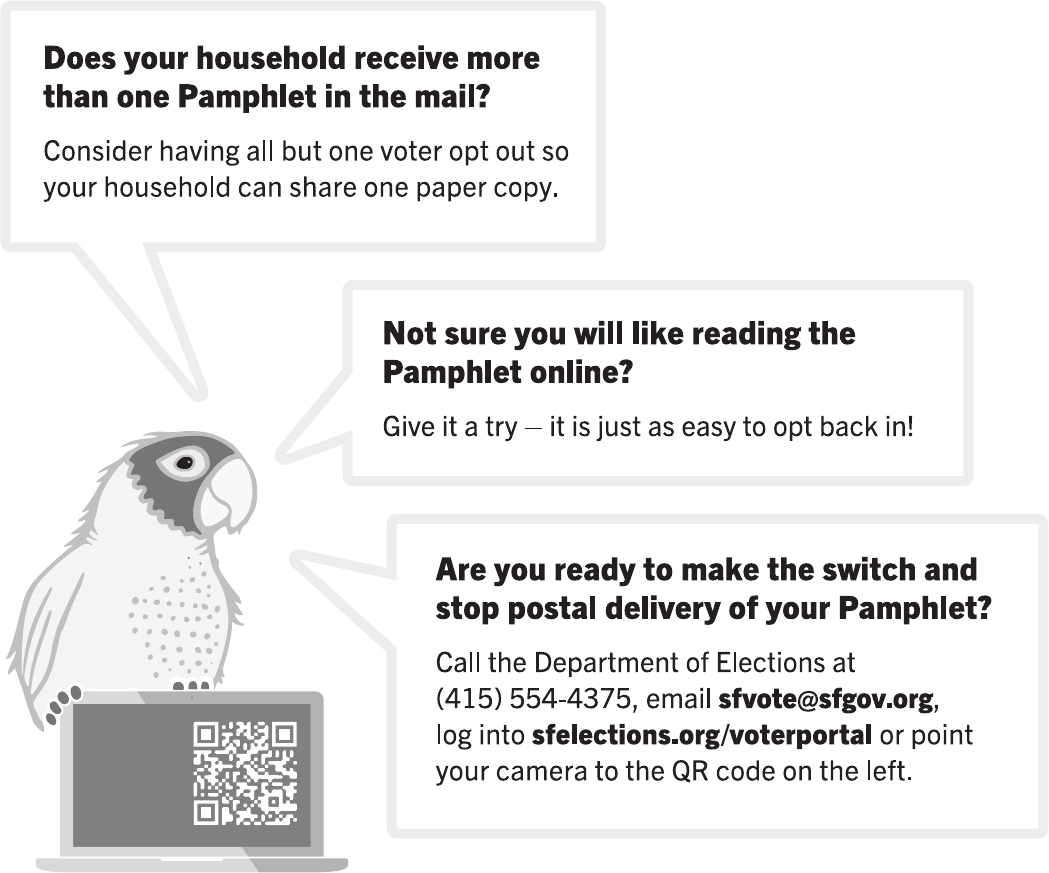
Make the switch to the digital
Voter Information Pamphlet!
We oer this Voter Information Pamphlet & Sample Ballot in digital and hard copy
formats. By law, we must mail a paper Pamphlet to every voter unless they make
the switch to the digital copy.
To save trees and city funds, consider opting out of postal delivery of your
Pamphlet for future elections!
go
paperless!

If the Department of Elections learns of any substantial errors on our part after this pamphlet has been mailed, we will publish a correction in the
Public Notices section of the San Francisco Examiner on February 21 and 22.
Prior to the publication of the Voter Information Pamphlet, any voter has the right under California Elections Code Sections 9295 and 13314 to seek a writ of mandate
or an injunction requiring any or all of the materials submitted for publication in the Pamphlet to be amended or deleted.
Index
A
Accessible voting resources ...............................12
Address of your polling place..................... (back cover)
B
Ballot drop-off boxes, map and locations .................10–11
Ballot Simplification Committee..............................3
Ballot Worksheet . . . . . . . . . . . . . . . . . . . . . . . . . . . . . . . . . . . . . . . .127
Burmese-language voter assistance
ျမန္မာဘာသာျဖင့္ မ
ဲ
ေပးသူအတြက္ အကူအည ............14
C
California Presidential Primaries .............................4
Candidate information .....................................16
Candidate statements of qualifications
Candidates for United States Representative .................18
Candidates for State Senator ...............................23
Candidates for State Assembly .............................24
Candidates for Judge of Superior Court, Seat 1 ...............26
Candidates for Judge of Superior Court, Seat 13 ..............27
Chinese-language voter assistance
中文選民服務 .........................................14
Contact the Department of Elections .........(inside back cover)
D
Dates, important ...........................(inside front cover)
Debt Overview............................................34
E
Early voting .............................................8–9
Elections Commission ......................................3
F
Filipino-language voter assistance
Tulong para sa botante sa wikang Filipino..................14
Frequently asked questions (FAQs) .......................28–30
J
Japanese-language voter assistance
日本語による投票支援 .................................14
K
Korean-language voter assistance
유권자를 위한 한국어 지원 ..............................15
L
Legal text of local ballot measures .........................100
Letter from the Director.....................................2
Local ballot measure and argument information ..............33
Local ballot measures
A Affordable Housing Bonds ............................36
B Police Officer Staffing Levels Conditioned on
Amending Existing or Future Tax Funding ...............48
C Real Estate Transfer Tax Exemption and Office
Space Allocation.....................................56
D Changes to Local Ethics Laws .........................68
E Police Department Policies and Procedures.............72
F Illegal Substance Dependence Screening and
Treatment for Recipients of City Public Assistance .......84
G Offering Algebra 1 to Eighth Graders ...................92
M
Marking your ballot ......................................5–6
Mistake while voting, how to get a new ballot ...............5–6
Multilingual voter services .................................14
O
Official local and state voter guides ..........................3
Online voter assistance tools ................(inside back cover)
P
Party endorsements .......................................17
Polling place, confirm location.................... (back cover)
Purpose of the Voter Information Pamphlet ...................3
S
Spanish-language voter assistance
Asistencia en español para los electores ..................14
T
Thai-language voter assistance
ความช
่
วยเหลือเป็นภาษาไทยแก่ผู้ลงคะแนนเสียง .............15
V
Vietnamese-language voter assistance
Dịch vụ/tài liệu hỗ trợ cử tri bằng tiếng Việt .................15
Voter Bill of Rights .........................................7
Voting by mail .............................................8
Voting in person ...........................................9
Voting instructions .......................................4–6
Voting system .............................................9
W
Website of the Department of Elections............ (back cover)
Words you need to know ..................................31
Write-in candidates, how to vote for .......................5–6

127
General Information
38-EN-M24-CP127
March 5, 2024 Ballot Worksheet
You can use this worksheet to organize your choices before marking your official ballot cards. To do so:
1. Refer to your sample ballot included in this Pamphlet or at sfelections.org/voterportal.
• If you registered with a preference for a political party, your sample ballot will list that party’s
presidential candidates.
• If you registered with no party preference, refer to one of the sample ballots that matches contests
on your official ballot.
2. You can read about the candidates and measures listed on your ballot in this Pamphlet and the
State Voter Information Guide.
• Beginning February 23, you can see all qualified write-in candidates for this election at
sfelections.org/writein.
3. As you finish researching each contest, use the relevant blank space below to note your choice(s).
4. When you are done, carefully copy your choices from this worksheet onto your official ballot cards.
If you make a mistake marking your official ballot, you may request a replacement by visiting
sfelections.org/voterportal, calling the Department of Elections at (415) 554-4375, or asking a poll worker
or Voting Center representative.
PARTY-NOMINATED OFFICES
FEDERAL (Vote for One)
President of the United States
(Party Ballots Only)
CITY AND COUNTY (See ballot card)
Members, County Central Committee
(Democratic and Republican Party Ballots Only)
VOTER-NOMINATED OFFICES
FEDERAL AND STATE (Vote for One)
United States Senator (Term Ending Jan 2031)
United States Senator (Term Ending Jan 2025)
United States Representative (District 11 or 15)
State Senator (District 11)
State Assembly Member (District 17 or 19)
NONPARTISAN OFFICES
JUDICIAL (Vote for One)
Judge of the Superior Court, Seat 1
Judge of the Superior Court, Seat 13
(The ballot worksheet continues on the next page)
✂

128
General Information
38-EN-M24-CP128
MEASURES
STATE PROPOSITION YES NO
1
Authorizes $6.38 billion in bonds to build mental health treatment facilities for those with
mental health and substance use challenges; provides housing for the homeless.
CITY AND COUNTY PROPOSITIONS YES NO
A
Affordable Housing Bonds
B
Police Officer Staffing Levels Conditioned on Amending Existing or Future Tax Funding
C
Real Estate Transfer Tax Exemption and Office Space Allocation
D
Changes to Local Ethics Laws
E
Police Department Policies and Procedures
F
Illegal Substance Dependence Screening and Treatment for Recipients of
City Public Assistance
G
Offering Algebra 1 to Eighth Graders
(Ballot worksheet, continued)
Follow us
on social
media
Follow the Department of Elections
for all the latest election updates!
@sfelections
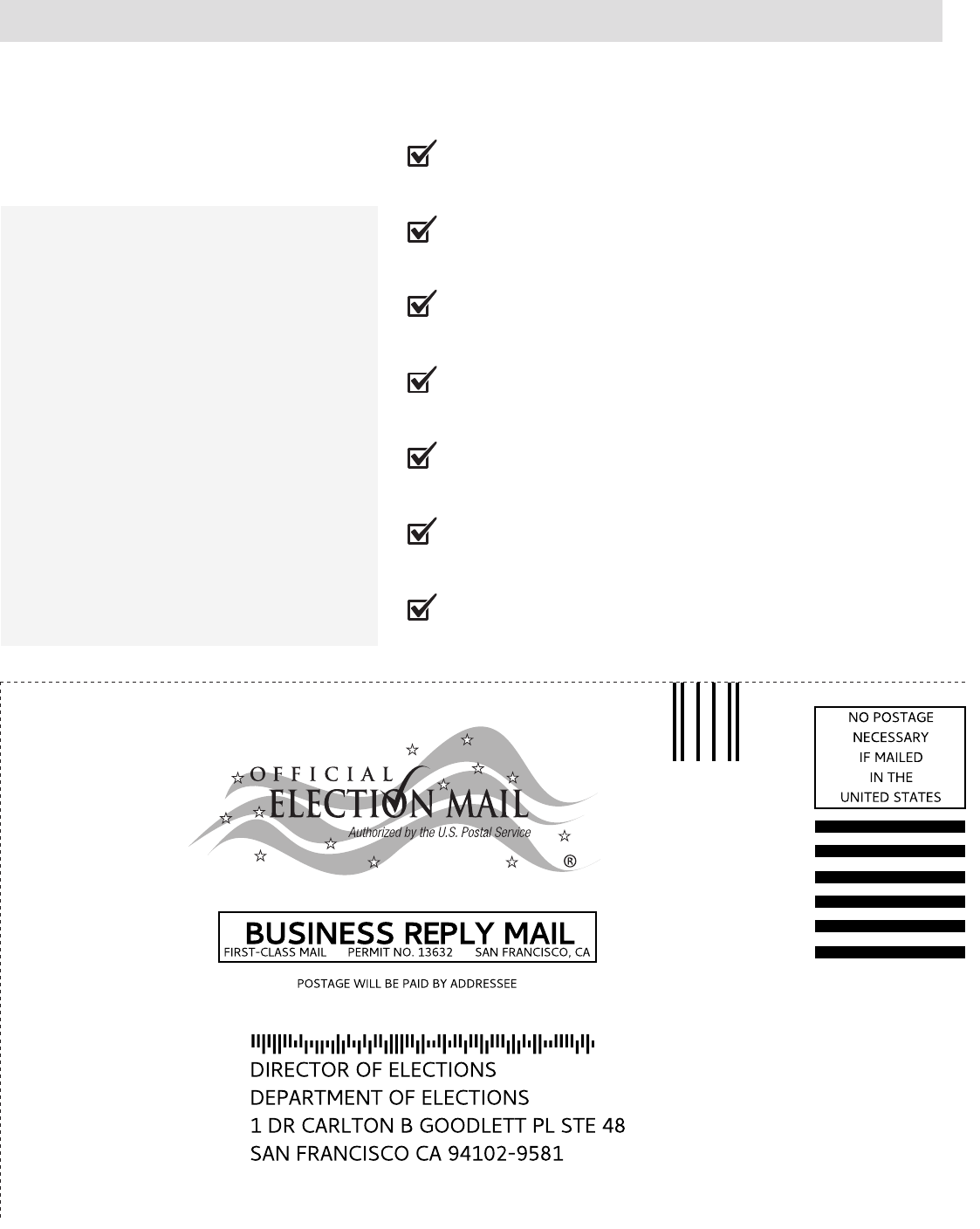
Contact one of our
multilingual sta members
or visit our oce!
Phone:
English: (415) 554-4375
TTY: (415) 554-4386
Español: (415) 554-4366
中文: (415) 554-4367
Filipino: (415) 554-4310
Mail:
Department of Elections
1 Dr. Carlton B. Goodlett Place
City Hall, Room 48
San Francisco, CA 94102
Email:
sfvote@sfgov.org
Register to vote or update your registration:
registertovote.ca.gov
Get a customized voting plan:
sfelections.org/voteready
Track your ballot or request a replacement:
sfelections.org/voterportal
Sign up to receive ballot notications:
wheresmyballot.sos.ca.gov
Find a convenient ballot drop box location:
sfelections.org/ballotdropo
Conrm your assigned polling place location:
sfelections.org/myvotinglocation
View preliminary and nal election results:
sfelections.org/results
We also have many helpful online tools!
Have questions? Need help?
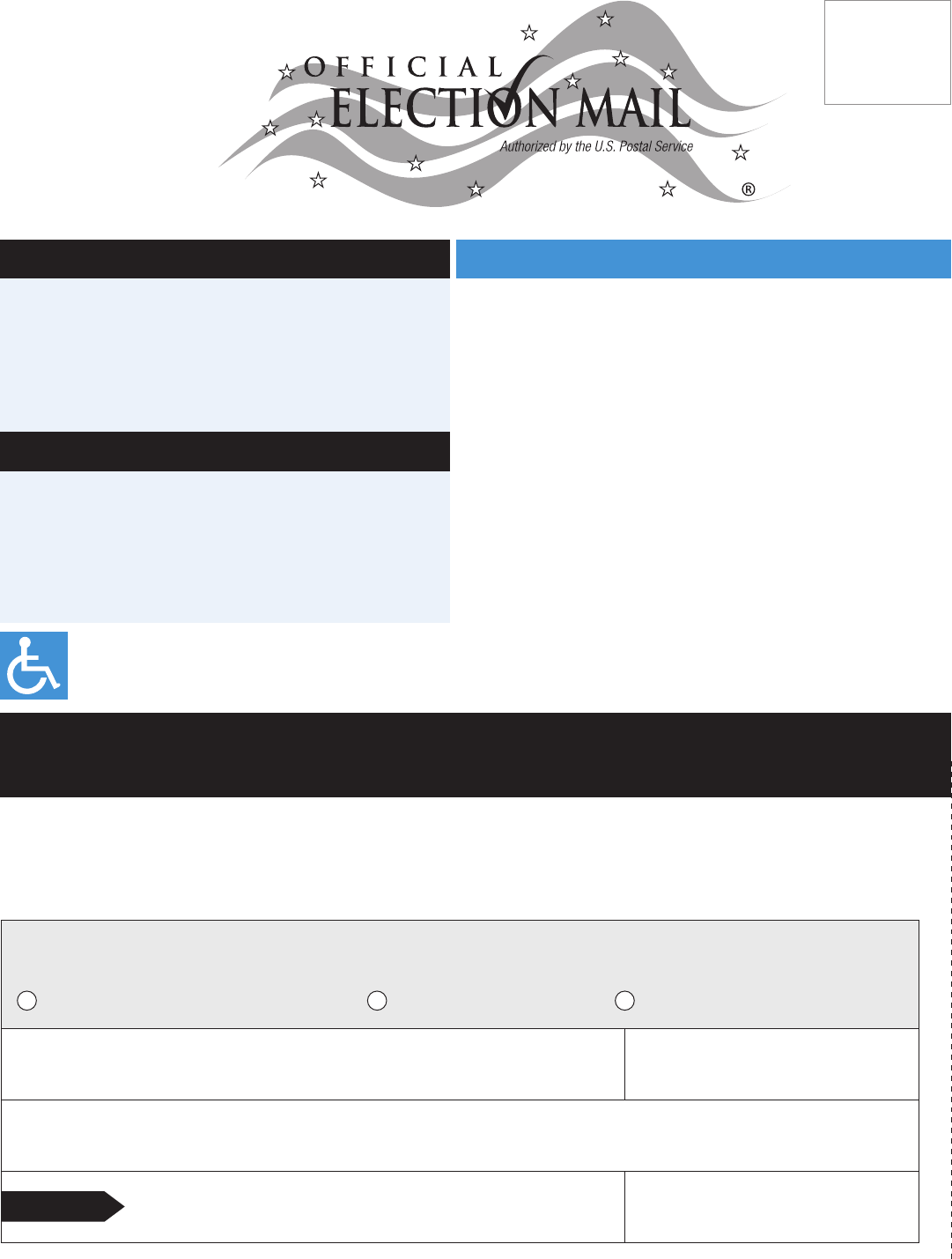
DEPARTMENT OF ELECTIONS
City and County of San Francisco
1 Dr. Carlton B. Goodlett Place
City Hall, Room 48
San Francisco, CA 94102-4608
Telephone: (415) 554-4375
TTY: (415) 554-4386
sfelections.org
NONPROFIT ORG.
U.S. POSTAGE
PAID
SAN FRANCISCO, CA
PERMIT NO. 2750
ELECTRONIC SERVICE REQUESTED
Through February 28, you can use this postage-paid postcard to request a mailed ballot with the
presidential candidates of the American Independent, Democratic, or Libertarian parties. You can
still request your preferred ballot after that date, but must do so in-person at the City Hall Voting
Center or your polling place. (See page 6 for a full explanation of your options.)
I have declined to disclose a preference for a qualied political party. However, for the March 5, 2024,
Presidential Primary Election only, I request a vote-by-mail ballot of the (choose one):
American Independent Party Democratic Party Libertarian Party
Full name: Date of birth:
Address:
Today’s date:
SIGN HERE
Notice: If the person above is not at this address, please help keep the voter rolls
current and save city funds by returning this pamphlet to your mail carrier.
Request for a Ballot with Presidential Candidates
(only for voters registered with no party preference)
Are the entryway and voting area of your polling place accessible?
Mailing Address:
Your voting precinct and districts are:
Your polling place is located at:
